UNITED STATES
SECURITIES AND EXCHANGE COMMISSION
Washington, D.C. 20549
FORM 6-K
REPORT OF
FOREIGN PRIVATE ISSUER
Pursuant to Rule 13a-16 or
15d-16
of the Securities Exchange Act of 1934
November 18, 2024
Commission File Number: 001-39363
IMMATICS N.V.
Paul-Ehrlich-Straße 15
72076 Tübingen, Federal Republic of Germany
(Address of Principal Executive Office)
Indicate by check mark whether
the registrant files or will file annual reports under cover Form 20-F or Form 40-F.
Form 20-F ☒ Form
40-F ☐
INFORMATION CONTAINED IN THIS REPORT ON FORM 6-K
On November 18, 2024, Immatics N.V. (the “Company”) issued an interim report for the three- and nine-month periods ended
September 30, 2024, which is attached hereto as Exhibit 99.1, and issued a press release announcing the third quarter 2024 financial results and business update for the Company, which is attached hereto as Exhibit 99.2. In addition, the Company
made available a presentation as well as an updated investor presentation. A copy of these presentations are attached hereto as Exhibit 99.3 and Exhibit 99.4. The fact that the presentations are being made available and furnished herewith is not an
admission as to the materiality of any information contained in the presentations. The information contained in the presentations is being provided as of November 18, 2024 and the Company does not undertake any obligation to update the
presentations in the future or to update forward-looking statements to reflect subsequent actual results.
INCORPORATION BY REFERENCE
This Report on Form 6-K (other than Exhibit 99.2, Exhibit 99.3 and Exhibit 99.4 hereto) including Exhibit
99.1 hereto, shall be deemed to be incorporated by reference into the registration statements on Form S-8 (Registration Nos. 333-249408,
333-265820 and 333-280935) and the registration statements on Form F-3 (Registration Nos.
333-240260, 333-274218 and 333-282569) of Immatics N.V. and to be a part thereof from the date on which this report is filed, to
the extent not superseded by documents or reports subsequently filed or furnished.
EXHIBITS
2
SIGNATURES
Pursuant to the requirements of the Securities Exchange Act of 1934, the registrant has duly caused this report to be signed on its behalf by the undersigned,
thereunto duly authorized.
|
|
|
|
|
|
|
|
|
|
|
IMMATICS N.V. |
|
|
|
|
| Date: November 18, 2024 |
|
|
|
by: |
|
/s/ Harpreet Singh |
|
|
|
|
|
|
Harpreet Singh |
|
|
|
|
|
|
Chief Executive Officer |
3
Exhibit 99.1
PRELIMINARY NOTE
The unaudited
interim condensed Consolidated Financial Statements for the three- and nine-month periods ended September 30, 2024, included herein, have been prepared in accordance with International Accounting Standard 34 (“Interim Financial
Reporting”), as issued by the International Accounting Standards Board (“IASB”). The Consolidated Financial Statements are presented in euros. All references in this interim report to “$,” and “U.S. dollars” mean
U.S. dollars and all references to “€” and “euros” mean euros, unless otherwise noted.
This interim report, including
“Management’s Discussion and Analysis of Financial Condition and Results of Operations,” contains statements that constitute forward-looking statements within the meaning of Section 21E of the Exchange Act and Section 27A of
the Securities Act of 1933, as amended (the “Securities Act”). All statements other than statements of historical facts, including statements regarding our future results of operations and financial position, business and commercial
strategy, potential market opportunities, products and product candidates, research pipeline, ongoing and planned preclinical studies and clinical trials, regulatory submissions and approvals, research and development costs, timing and likelihood of
success, as well as plans and objectives of management for future operations are forward-looking statements. Many of the forward-looking statements contained in this interim report can be identified by the use of forward-looking words such as
“anticipate”, “believe”, “could”, “expect”, “should”, “plan”, “intend”, “estimate”, “will” and “potential” among others. Forward-looking statements
are based on our management’s beliefs and assumptions and on information available to our management at the time such statements are made. Such statements are subject to risks and uncertainties, and actual results may differ materially from
those expressed or implied in the forward-looking statements due to various factors, including, but not limited to the macro-economic environment; inconclusive clinical trial results or clinical trials failing to achieve one or more endpoints, early
data not being repeated in ongoing or future clinical trials, failures to secure required regulatory approvals, disruptions from failures by third-parties on whom we rely in connection with our clinical trials, delays or negative determinations by
regulatory authorities, changes or increases in oversight and regulation; increased competition; manufacturing delays or problems, inability to achieve enrollment targets, disagreements with our collaboration partners or failures of collaboration
partners to pursue product candidates, legal challenges, including product liability claims or intellectual property disputes, commercialization factors, including regulatory approval and pricing determinations, disruptions to access to raw
materials or starting material, proliferation and continuous evolution of new technologies; disruptions to Immatics’ business; management changes; dislocations in the capital markets; and other important factors described under “Risk
Factors” in our Annual Report on Form 20-F for the year ended December 31, 2023, filed with the Securities and Exchange Commission on March 21, 2024 and those described in our other filings with
the Securities and Exchange Commission. Forward-looking statements speak only as of the date on which they were made. Because forward-looking statements are inherently subject to risks and uncertainties, some of which cannot be predicted or
quantified and some of which are beyond our control, you should not rely on these forward-looking statements as predictions of future events. Moreover, we operate in an evolving environment. New risk factors and uncertainties may emerge from time to
time, and it is not possible for management to predict all risk factors and uncertainties. Except as required by applicable law, we do not plan to publicly update or revise any forward-looking statements, whether as a result of any new information,
future events, changed circumstances or otherwise.
We own various trademark registrations and applications, and unregistered trademarks, including
Immatics®, XPRESIDENT®, ACTengine®, ACTallo®, ACTolog®, XCEPTOR®,
TCER®, AbsQuant®, IMADetect® and our corporate logo. All other trade
names, trademarks and service marks of other companies appearing in this interim report are the property of their respective owners. Solely for convenience, the trademarks and trade names in this interim report may be referred to without the ® and ™ symbols, but such references should not be construed as any indicator that their respective owners will not assert, to the
fullest extent under applicable law, their rights thereto. We do not intend to use or display other companies’ trademarks and trade names to imply a relationship with, or endorsement or sponsorship of us by, any other companies.
As used in this interim report, the terms “Immatics”, “we”, “our”, “us”, “the Group” and “the
Company” refer to Immatics N.V. and its subsidiaries, taken as a whole, unless the context otherwise requires. The unaudited interim condensed consolidated financial statements and Management’s Discussion & Analysis of Financial
Condition and Results of Operations in this interim report are related to Immatics N.V. and its German subsidiary Immatics Biotechnologies GmbH as well as its U.S. subsidiary Immatics US Inc.
Unaudited Interim Condensed Consolidated Statement of Loss of Immatics N.V.
|
|
|
|
|
|
|
|
|
|
|
|
|
|
|
|
|
|
|
|
|
| |
|
|
|
|
Three months ended September 30, |
|
|
Nine months ended September 30, |
|
| |
|
Notes |
|
|
2024 |
|
|
2023 |
|
|
2024 |
|
|
2023 |
|
| |
|
|
|
|
(Euros in thousands, except
per share data) |
|
|
(Euros in thousands, except
per share data) |
|
| Revenue from collaboration agreements |
|
|
5 |
|
|
|
50,559 |
|
|
|
5,926 |
|
|
|
99,583 |
|
|
|
38,076 |
|
| Research and development expenses |
|
|
|
|
|
|
(38,906 |
) |
|
|
(30,498 |
) |
|
|
(106,230 |
) |
|
|
(85,396 |
) |
| General and administrative expenses |
|
|
|
|
|
|
(11,156 |
) |
|
|
(8,881 |
) |
|
|
(32,925 |
) |
|
|
(27,825 |
) |
| Other income |
|
|
|
|
|
|
17 |
|
|
|
186 |
|
|
|
54 |
|
|
|
1,134 |
|
|
|
|
|
|
|
|
|
|
|
|
|
|
|
|
|
|
|
|
|
|
| Operating result |
|
|
|
|
|
|
514 |
|
|
|
(33,267 |
) |
|
|
(39,518 |
) |
|
|
(74,011 |
) |
| Change in fair value of liabilities for warrants |
|
|
6 |
|
|
|
3,833 |
|
|
|
(1,395 |
) |
|
|
4,228 |
|
|
|
(7,103 |
) |
| Other financial income |
|
|
6 |
|
|
|
5,889 |
|
|
|
9,748 |
|
|
|
18,707 |
|
|
|
14,414 |
|
| Other financial expenses |
|
|
6 |
|
|
|
(12,589 |
) |
|
|
(1,575 |
) |
|
|
(5,342 |
) |
|
|
(4,146 |
) |
|
|
|
|
|
|
|
|
|
|
|
|
|
|
|
|
|
|
|
|
|
| Financial result |
|
|
|
|
|
|
(2,867 |
) |
|
|
6,778 |
|
|
|
17,593 |
|
|
|
3,165 |
|
|
|
|
|
|
|
|
|
|
|
|
|
|
|
|
|
|
|
|
|
|
| Loss before taxes |
|
|
|
|
|
|
(2,353 |
) |
|
|
(26,489 |
) |
|
|
(21,925 |
) |
|
|
(70,846 |
) |
| Taxes on income |
|
|
7 |
|
|
|
(6,217 |
) |
|
|
— |
|
|
|
(7,720 |
) |
|
|
— |
|
| Net loss |
|
|
|
|
|
|
(8,570 |
) |
|
|
(26,489 |
) |
|
|
(29,645 |
) |
|
|
(70,846 |
) |
|
|
|
|
|
|
|
|
|
|
|
|
|
|
|
|
|
|
|
|
|
| Net loss per share: |
|
|
17 |
|
|
|
|
|
|
|
|
|
|
|
|
|
|
|
|
|
| Basic |
|
|
|
|
|
|
(0.08 |
) |
|
|
(0.32 |
) |
|
|
(0.29 |
) |
|
|
(0.90 |
) |
| Diluted |
|
|
|
|
|
|
(0.11 |
) |
|
|
(0.32 |
) |
|
|
(0.31 |
) |
|
|
(0.90 |
) |
The accompanying notes are an integral part of these unaudited interim condensed consolidated financial
statements.
Unaudited Interim Condensed Consolidated Statement of Comprehensive Loss of Immatics N.V.
|
|
|
|
|
|
|
|
|
|
|
|
|
|
|
|
|
|
|
|
|
| |
|
|
|
|
Three months ended
September 30, |
|
|
Nine months ended
September 30, |
|
| |
|
Notes |
|
|
2024 |
|
|
2023 |
|
|
2024 |
|
|
2023 |
|
| |
|
|
|
|
(Euros in thousands) |
|
|
(Euros in thousands) |
|
| Net loss |
|
|
|
|
|
|
(8,570 |
) |
|
|
(26,489 |
) |
|
|
(29,645 |
) |
|
|
(70,846 |
) |
| Other comprehensive income/(loss) |
|
|
|
|
|
|
|
|
|
|
|
|
|
|
|
|
|
|
|
|
| Items that may be reclassified subsequently to profit or loss |
|
|
|
|
|
|
|
|
|
|
|
|
|
|
|
|
|
|
|
|
| Currency translation differences from foreign operations |
|
|
|
|
|
|
(1,377 |
) |
|
|
429 |
|
|
|
(579 |
) |
|
|
769 |
|
|
|
|
|
|
|
|
|
|
|
|
|
|
|
|
|
|
|
|
|
|
| Total comprehensive loss for the year |
|
|
|
|
|
|
(9,947 |
) |
|
|
(26,060 |
) |
|
|
(30,224 |
) |
|
|
(70,077 |
) |
|
|
|
|
|
|
|
|
|
|
|
|
|
|
|
|
|
|
|
|
|
The accompanying notes are an integral part of these unaudited interim condensed consolidated financial
statements.
Unaudited Interim Condensed Consolidated Statement of Financial Position of Immatics N.V.
|
|
|
|
|
|
|
|
|
|
|
|
|
| |
|
|
|
|
As of |
|
| |
|
Notes |
|
|
September 30,
2024 |
|
|
December 31,
2023 |
|
| |
|
|
|
|
(Euros in thousands) |
|
| Assets |
|
|
|
|
|
|
|
|
|
|
|
|
| Current assets |
|
|
|
|
|
|
|
|
|
|
|
|
| Cash and cash equivalents |
|
|
16 |
|
|
|
189,199 |
|
|
|
218,472 |
|
| Other financial assets |
|
|
16 |
|
|
|
301,321 |
|
|
|
207,423 |
|
| Accounts receivables |
|
|
16 |
|
|
|
2,951 |
|
|
|
4,093 |
|
| Other current assets |
|
|
9 |
|
|
|
19,306 |
|
|
|
19,382 |
|
|
|
|
|
|
|
|
|
|
|
|
|
|
| Total current assets |
|
|
|
|
|
|
512,777 |
|
|
|
449,370 |
|
| Non-current assets |
|
|
|
|
|
|
|
|
|
|
|
|
| Property, plant and equipment |
|
|
10 |
|
|
|
48,424 |
|
|
|
43,747 |
|
| Intangible assets |
|
|
10 |
|
|
|
1,506 |
|
|
|
1,523 |
|
| Right-of-use
assets |
|
|
10 |
|
|
|
13,327 |
|
|
|
13,308 |
|
| Other non-current assets |
|
|
9 |
|
|
|
1,199 |
|
|
|
2,017 |
|
|
|
|
|
|
|
|
|
|
|
|
|
|
| Total non-current assets |
|
|
|
|
|
|
64,456 |
|
|
|
60,595 |
|
|
|
|
|
|
|
|
|
|
|
|
|
|
| Total assets |
|
|
|
|
|
|
577,233 |
|
|
|
509,965 |
|
|
|
|
|
|
|
|
|
|
|
|
|
|
| Liabilities and shareholders’ equity |
|
|
|
|
|
|
|
|
|
|
|
|
| Current liabilities |
|
|
|
|
|
|
|
|
|
|
|
|
| Provisions |
|
|
11 |
|
|
|
5,144 |
|
|
|
— |
|
| Accounts payables |
|
|
12 |
|
|
|
22,095 |
|
|
|
25,206 |
|
| Deferred revenue |
|
|
5 |
|
|
|
68,928 |
|
|
|
100,401 |
|
| Liabilities for warrants |
|
|
16 |
|
|
|
14,765 |
|
|
|
18,993 |
|
| Lease liabilities |
|
|
16 |
|
|
|
2,825 |
|
|
|
2,604 |
|
| Other current liabilities |
|
|
13 |
|
|
|
15,155 |
|
|
|
9,348 |
|
|
|
|
|
|
|
|
|
|
|
|
|
|
| Total current liabilities |
|
|
|
|
|
|
128,912 |
|
|
|
156,552 |
|
| Non-current liabilities |
|
|
|
|
|
|
|
|
|
|
|
|
| Deferred revenue |
|
|
5 |
|
|
|
52,597 |
|
|
|
115,527 |
|
| Lease liabilities |
|
|
16 |
|
|
|
13,198 |
|
|
|
12,798 |
|
| Other non-current liabilities |
|
|
|
|
|
|
— |
|
|
|
4 |
|
|
|
|
|
|
|
|
|
|
|
|
|
|
| Total non-current liabilities |
|
|
|
|
|
|
65,795 |
|
|
|
128,329 |
|
| Shareholders’ equity |
|
|
|
|
|
|
|
|
|
|
|
|
| Share capital |
|
|
14 |
|
|
|
1,031 |
|
|
|
847 |
|
| Share premium |
|
|
14 |
|
|
|
1,010,648 |
|
|
|
823,166 |
|
| Accumulated deficit |
|
|
14 |
|
|
|
(626,938 |
) |
|
|
(597,293 |
) |
| Other reserves |
|
|
14 |
|
|
|
(2,215 |
) |
|
|
(1,636 |
) |
|
|
|
|
|
|
|
|
|
|
|
|
|
| Total shareholders’ equity |
|
|
|
|
|
|
382,526 |
|
|
|
225,084 |
|
|
|
|
|
|
|
|
|
|
|
|
|
|
| Total liabilities and shareholders’ equity |
|
|
|
|
|
|
577,233 |
|
|
|
509,965 |
|
|
|
|
|
|
|
|
|
|
|
|
|
|
The accompanying notes are an integral part of these unaudited interim condensed consolidated financial
statements.
Unaudited Interim Condensed Consolidated Statement of Cash Flows of Immatics N.V.
|
|
|
|
|
|
|
|
|
| |
|
Nine months ended September 30, |
|
| |
|
2024 |
|
|
2023 |
|
| |
|
(Euros in thousands) |
|
| Cash flows from operating activities |
|
|
|
|
|
|
|
|
| Net loss |
|
|
(29,645 |
) |
|
|
(70,846 |
) |
| Taxes on income |
|
|
7,720 |
|
|
|
— |
|
| Loss before tax |
|
|
(21,925 |
) |
|
|
(70,846 |
) |
| Adjustments for: |
|
|
|
|
|
|
|
|
| Interest income |
|
|
(18,185 |
) |
|
|
(8,993 |
) |
| Depreciation and amortization |
|
|
9,149 |
|
|
|
5,432 |
|
| Interest expenses |
|
|
654 |
|
|
|
620 |
|
| Equity-settled share-based payment |
|
|
13,112 |
|
|
|
16,299 |
|
| Loss from disposal of fixed assets |
|
|
1 |
|
|
|
— |
|
| Net foreign exchange differences and expected credit losses |
|
|
4,018 |
|
|
|
(760 |
) |
| Change in fair value of liabilities for warrants |
|
|
(4,228 |
) |
|
|
7,103 |
|
| Changes in: |
|
|
|
|
|
|
|
|
| Decrease in accounts receivables |
|
|
1,142 |
|
|
|
596 |
|
| Decrease/(increase) in other assets |
|
|
(2,623 |
) |
|
|
658 |
|
| (Decrease) in deferred revenue, accounts payables and other liabilities |
|
|
(91,113 |
) |
|
|
(15,641 |
) |
| Interest received |
|
|
11,098 |
|
|
|
4,904 |
|
| Interest paid |
|
|
(654 |
) |
|
|
(221 |
) |
| Income tax paid |
|
|
— |
|
|
|
— |
|
|
|
|
|
|
|
|
|
|
| Net cash used in operating activities |
|
|
(99,554 |
) |
|
|
(60,849 |
) |
|
|
|
|
|
|
|
|
|
| Cash flows from investing activities |
|
|
|
|
|
|
|
|
| Payments for property, plant and equipment |
|
|
(14,598 |
) |
|
|
(21,506 |
) |
| Payments for intangible assets |
|
|
(148 |
) |
|
|
(158 |
) |
| Payments for investments classified in other financial assets |
|
|
(356,596 |
) |
|
|
(299,018 |
) |
| Proceeds from maturity of investments classified in other financial assets |
|
|
266,361 |
|
|
|
229,557 |
|
| Proceeds from disposal of property, plant and equipment |
|
|
1 |
|
|
|
— |
|
|
|
|
|
|
|
|
|
|
| Net cash used in investing activities |
|
|
(104,980 |
) |
|
|
(91,125 |
) |
|
|
|
|
|
|
|
|
|
| Cash flows from financing activities |
|
|
|
|
|
|
|
|
| Proceeds from issuance of shares to equity holders |
|
|
174,554 |
|
|
|
90,404 |
|
| Transaction costs deducted from equity |
|
|
— |
|
|
|
(2,039 |
) |
| Repayments related to lease liabilities |
|
|
(1,228 |
) |
|
|
(2,877 |
) |
|
|
|
|
|
|
|
|
|
| Net cash provided by financing activities |
|
|
173,326 |
|
|
|
85,488 |
|
|
|
|
|
|
|
|
|
|
| Net decrease in cash and cash equivalents |
|
|
(31,208 |
) |
|
|
(66,486 |
) |
|
|
|
|
|
|
|
|
|
| Cash and cash equivalents at beginning of the year |
|
|
218,472 |
|
|
|
148,519 |
|
|
|
|
|
|
|
|
|
|
| Effects of exchange rate changes, expected credit losses and accrued interest
on cash and cash equivalents |
|
|
1,935 |
|
|
|
1,413 |
|
|
|
|
|
|
|
|
|
|
| Cash and cash equivalents at end of the year |
|
|
189,199 |
|
|
|
83,446 |
|
|
|
|
|
|
|
|
|
|
The accompanying notes are an integral part of these unaudited interim condensed consolidated financial
statements.
Unaudited Interim Condensed Consolidated Statement of Changes in Shareholders’ equity of Immatics
N.V.
|
|
|
|
|
|
|
|
|
|
|
|
|
|
|
|
|
|
|
|
|
|
|
|
|
| (Euros in thousands) |
|
Notes |
|
|
Share
capital |
|
|
Share
premium |
|
|
Accumulated
deficit |
|
|
Other
reserves |
|
|
Total
share-
holders’
equity |
|
| Balance as of January 1, 2023 |
|
|
|
|
|
|
767 |
|
|
|
714,177 |
|
|
|
(500,299 |
) |
|
|
(1,481 |
) |
|
|
213,164 |
|
| Other comprehensive income/(loss) |
|
|
|
|
|
|
— |
|
|
|
— |
|
|
|
— |
|
|
|
769 |
|
|
|
769 |
|
| Net loss |
|
|
|
|
|
|
— |
|
|
|
— |
|
|
|
(70,846 |
) |
|
|
— |
|
|
|
(70,846 |
) |
| Comprehensive loss for the year |
|
|
|
|
|
|
— |
|
|
|
— |
|
|
|
(70,846 |
) |
|
|
769 |
|
|
|
(70,077 |
) |
| Equity-settled share-based compensation |
|
|
8 |
|
|
|
— |
|
|
|
16,299 |
|
|
|
— |
|
|
|
— |
|
|
|
16,299 |
|
| Share options exercised |
|
|
14 |
|
|
|
— |
|
|
|
140 |
|
|
|
— |
|
|
|
— |
|
|
|
140 |
|
| Issue of share capital – net of transaction costs |
|
|
14 |
|
|
|
80 |
|
|
|
88,145 |
|
|
|
— |
|
|
|
— |
|
|
|
88,225 |
|
|
|
|
|
|
|
|
|
|
|
|
|
|
|
|
|
|
|
|
|
|
|
|
|
|
| Balance as of September 30, 2023 |
|
|
|
|
|
|
847 |
|
|
|
818,761 |
|
|
|
(571,145 |
) |
|
|
(712 |
) |
|
|
247,751 |
|
|
|
|
|
|
|
|
|
|
|
|
|
|
|
|
|
|
|
|
|
|
|
|
|
|
| Balance as of January 1, 2024 |
|
|
|
|
|
|
847 |
|
|
|
823,166 |
|
|
|
(597,293 |
) |
|
|
(1,636 |
) |
|
|
225,084 |
|
| Other comprehensive income/(loss) |
|
|
|
|
|
|
— |
|
|
|
— |
|
|
|
— |
|
|
|
(579 |
) |
|
|
(579 |
) |
| Net loss |
|
|
|
|
|
|
— |
|
|
|
— |
|
|
|
(29,645 |
) |
|
|
— |
|
|
|
(29,645 |
) |
| Comprehensive loss for the year |
|
|
|
|
|
|
— |
|
|
|
— |
|
|
|
(29,645 |
) |
|
|
(579 |
) |
|
|
(30,224 |
) |
| Equity-settled share-based compensation |
|
|
8 |
|
|
|
— |
|
|
|
13,112 |
|
|
|
— |
|
|
|
— |
|
|
|
13,112 |
|
| Share options exercised |
|
|
14 |
|
|
|
1 |
|
|
|
1,113 |
|
|
|
— |
|
|
|
— |
|
|
|
1,114 |
|
| Issue of share capital – net of transaction costs |
|
|
14 |
|
|
|
183 |
|
|
|
173,257 |
|
|
|
— |
|
|
|
— |
|
|
|
173,440 |
|
|
|
|
|
|
|
|
|
|
|
|
|
|
|
|
|
|
|
|
|
|
|
|
|
|
| Balance as of September 30, 2024 |
|
|
|
|
|
|
1,031 |
|
|
|
1,010,648 |
|
|
|
(626,938 |
) |
|
|
(2,215 |
) |
|
|
382,526 |
|
|
|
|
|
|
|
|
|
|
|
|
|
|
|
|
|
|
|
|
|
|
|
|
|
|
The accompanying notes are an integral part of these unaudited interim condensed consolidated financial
statements.
Notes to the Unaudited Interim Condensed Consolidated Financial Statements of Immatics N.V.
1. Group information
Immatics N.V., together with its
German subsidiary Immatics Biotechnologies GmbH (“Immatics GmbH”) and its U.S. subsidiary, Immatics US Inc., (“Immatics” or “the Group”) is a biotechnology group that is primarily engaged in the research and development
of T cell redirecting immunotherapies for the treatment of cancer.
Immatics N.V. is registered with the commercial register at the Netherlands Chamber of
Commerce under RSIN 861058926 with a corporate seat in Amsterdam and is located at Paul-Ehrlich Str. 15 in 72076 Tübingen, Germany.
These unaudited
interim condensed consolidated financial statements of the Group for the three and nine months ended September 30, 2024, were authorized for issue by the Audit Committee of Immatics N.V. on November 18, 2024.
2. Significant events and changes in the current reporting period
The following significant events or transactions occurred during the three and nine months ended September 30, 2024.
On January 22, 2024, the Group closed an offering of 18,313,750 ordinary shares with a public offering price of $11.00 (€10.10) per ordinary share.
The Group received gross proceeds of €185.0 million less transaction costs of €11.6 million, resulting in an increase in share capital of €183.0 thousand and share premium of €173.2 million.
On September 13, 2024, we announced the termination of the collaboration with Bristol Myers Squibb regarding IMA401 (“BMS IMA401”). The
termination resulted in the recognition of the remaining deferred revenue of €21.0 million from the collaboration during the three and nine months ended September 30, 2024.
Macroeconomic environment
Currently, multiple global
uncertainties are existing.
The conflict between Russia and Ukraine and the conflict in the Middle East have resulted, and may further result, in
significant disruption, instability and volatility in global markets, as well as higher energy and other commodity prices. Since the Company is not currently conducting any business or receiving any material services from vendors located in Russia,
Ukraine or in the Middle East, it does not expect that the ongoing conflicts will have a direct impact on its operations in the near term. However, the Company may be indirectly affected by price increases or certain policy changes, such as new tax
legislation, economic sanctions and comparable measures. While the conflicts are currently not expected to have a direct impact on the Company, this may change in case of further expansion of the scale of the conflicts. In addition, other
geopolitical instabilities might impact the Group in the future.
3. Significant accounting policies
Basis of presentation
The unaudited interim condensed
consolidated financial statements of the Group as of September 30, 2024 and for the three and nine months ended September 30, 2024 and 2023 have been prepared on a going concern basis in accordance with International Accounting Standard 34
(“Interim Financial Reporting”), as issued by the International Accounting Standards Board (“IASB”) and have not been audited by a statutory auditor.
In accordance with IAS 34, the unaudited interim condensed consolidated financial statements do not include all the information and disclosures required in
the annual financial statements and should be read in conjunction with the Group’s annual financial statements for the year ended December 31, 2023, which have been prepared in accordance with IFRS® Accounting Standards as issued by the International Accounting Standards Board (“IASB”), taking into account the recommendations of the IFRS Interpretations Committee (“IFRIC® Interpretations”). In these notes to the unaudited condensed consolidated financial statements, information is provided primarily on the items for which there have been significant changes
compared with the consolidated financial statements of the Group for the year ended December 31, 2023.
The unaudited interim condensed consolidated
financial statements are presented in Euros, which is the functional and reporting currency of the parent, Immatics N.V. Assets and liabilities of foreign operations are translated into Euros at the rate of exchange prevailing at the reporting date.
The unaudited interim condensed consolidated statement of loss is translated at average exchange rates. The currency translation differences are recognized in other comprehensive income.
The accounting policies adopted in the preparation of the unaudited interim condensed consolidated financial
statements are consistent with those followed in the preparation of the Group’s annual consolidated financial statements for the year ended December 31, 2023. The new and amended standards and interpretations applicable for the first time
as of January 1, 2024, as disclosed in the notes to the consolidated financial statements for the year ended December 31, 2023, had no impact on the unaudited interim condensed consolidated financial statements of the Group for the three
and nine months ended September 30, 2024.
In April 2024, IFRS 18, “Presentation and Disclosure in Financial Statements” was issued to
achieve comparability of the financial performance of similar entities. The standard, which replaces IAS 1 “Presentation of Financial Statements”, impacts the presentation of primary financial statements and notes, including the statement
of earnings where companies will be required to present separate categories of income and expense for operating, investing, and financing activities with prescribed subtotals for each new category. The standard will also require management-defined
performance measures to be explained and included in a separate note within the consolidated financial statements.
The standard is effective for annual
reporting periods beginning on or after January 1, 2027, including interim financial statements, and requires retrospective application. The Company is currently assessing the impact of the new standard.
In July 2024, the IASB published an IFRIC agenda decision clarifying certain requirements for segment disclosures in accordance with IFRS 8. Since the Company
is operating as one segment, no impact of the agenda decision is expected.
Estimates and assumptions have to be made in the unaudited interim
consolidated financial statements as of September 30, 2024. These have an impact on the amounts and disclosures of the recognized assets and liabilities, income and expenses, and contingent liabilities. The estimates and judgments are
essentially unchanged from the circumstances described in the consolidated financial statements of the Group for the year ended December 31, 2023. New developments may result in amounts deviating from the original estimates. These possible
developments are outside the sphere of influence of the management.
4. Segment information
The Group manages its operations as a single segment for the purpose of assessing performance and making operating decisions. The Group’s focus is on the
research and development of T cell redirecting immunotherapies for the treatment of cancer. The Chief Executive Officer is the chief operating decision maker who regularly reviews the consolidated operating results and makes decisions about the
allocation of the Group’s resources.
5. Revenue from collaboration agreements
The Group currently earns revenue through strategic collaboration agreements with third party pharmaceutical and biotechnology companies. As of
September 30, 2024, the Group had three revenue-generating strategic collaboration agreements in place, two with Bristol-Myers-Squibb (“BMS”) and one agreement with ModernaTX, Inc. (“Moderna”), excluding BMS IMA401
collaboration for which we received the termination notice on September 13, 2024. The three remaining revenue-generating strategic collaboration agreements are in pre-clinical stage. The collaboration
with Genmab A/S, Copenhagen /Denmark (“Genmab”) was terminated in March 2024 and the Group recorded the remaining deferred revenue of €14.9 million from the Genmab collaboration during the three months ended March 31, 2024.
The collaboration BMS IMA401 was terminated in September 2024 and the Group recorded the remaining deferred revenue of €21.0 million from the collaboration during the three months ended September 30, 2024.
Revenue from collaboration agreements was realized with the following partners:
|
|
|
|
|
|
|
|
|
|
|
|
|
|
|
|
|
| |
|
Three months ended September 30, |
|
|
Nine months ended September 30, |
|
| |
|
2024 |
|
|
2023 |
|
|
2024 |
|
|
2023 |
|
| |
(Euros in thousands) |
|
|
(Euros in thousands) |
|
| Moderna, United States |
|
|
25,298 |
|
|
|
— |
|
|
|
43,601 |
|
|
|
— |
|
| BMS, United States |
|
|
25,261 |
|
|
|
8,501 |
|
|
|
41,031 |
|
|
|
40,437 |
|
| Genmab, Denmark |
|
|
— |
|
|
|
(2,575 |
) |
|
|
14,951 |
|
|
|
(2,361 |
) |
|
|
|
|
|
|
|
|
|
|
|
|
|
|
|
|
|
| Total |
|
|
50,559 |
|
|
|
5,926 |
|
|
|
99,583 |
|
|
|
38,076 |
|
|
|
|
|
|
|
|
|
|
|
|
|
|
|
|
|
|
As of September 30, 2024, the Group has not recognized any milestone revenue under the collaboration
agreements, due to the scientific uncertainty of achieving the milestones or the successful commercialization of a product. As of September 30, 2024, Immatics had not received any milestone or royalty payments in connection with the
collaboration agreements. The Group plans to recognize the remaining deferred revenue balance into revenue as it performs the related performance obligations under each contract.
The revenue for the three and nine months ended September 30, 2024 from the remaining collaboration agreements with BMS and Moderna is recognized over
time on a cost-to-cost basis. The collaboration with Moderna is effective since October 2023, therefore no revenue is recognized during the three and nine months ended
September 30, 2023. In September 2024 the collaboration agreement BMS IMA401 was terminated resulting in a recognition of the remaining deferred revenue of €21.0 million during the three and nine months ended September 30, 2024.
For the nine months ended September 30, 2023 the recognized revenue for BMS also included an Opt-in payment of €13.7 million. For the three months ended September 30, 2024 no revenue was
recognized for the collaboration with Genmab as the collaboration was terminated in March 2024. The termination resulted in a recognition of the remaining deferred revenue of €14.9 million during the nine months ended September 30,
2024.
Deferred revenue related to the collaboration agreements consists of the following:
|
|
|
|
|
|
|
|
|
| |
|
As of |
|
| |
|
September 30, 2024 |
|
|
December 31, 2023 |
|
| |
|
(Euros in thousands) |
|
| Current |
|
|
68,928 |
|
|
|
100,401 |
|
| Non-current |
|
|
52,597 |
|
|
|
115,527 |
|
|
|
|
|
|
|
|
|
|
| Total |
|
|
121,525 |
|
|
|
215,928 |
|
|
|
|
|
|
|
|
|
|
Deferred revenues are contract liabilities within the scope of IFRS 15.
6. Financial result
Financial income and financial
expenses consist of the following:
|
|
|
|
|
|
|
|
|
|
|
|
|
|
|
|
|
| |
|
Three months ended September 30, |
|
|
Nine months ended September 30, |
|
| |
|
2024 |
|
|
2023 |
|
|
2024 |
|
|
2023 |
|
| |
|
(Euros in thousands) |
|
|
(Euros in thousands) |
|
| Change in fair value of liabilities for warrants |
|
|
3,833 |
|
|
|
(1,395 |
) |
|
|
4,228 |
|
|
|
(7,103 |
) |
| Interest income |
|
|
5,526 |
|
|
|
3,994 |
|
|
|
18,185 |
|
|
|
8,993 |
|
| Foreign currency gains |
|
|
4 |
|
|
|
5,754 |
|
|
|
93 |
|
|
|
5,421 |
|
| Gains on other financial instruments |
|
|
359 |
|
|
|
— |
|
|
|
429 |
|
|
|
— |
|
|
|
|
|
|
|
|
|
|
|
|
|
|
|
|
|
|
| Other financial income |
|
|
5,889 |
|
|
|
9,748 |
|
|
|
18,707 |
|
|
|
14,414 |
|
|
|
|
|
|
|
|
|
|
|
|
|
|
|
|
|
|
| Interest expenses |
|
|
(235 |
) |
|
|
(218 |
) |
|
|
(654 |
) |
|
|
(620 |
) |
| Foreign currency losses |
|
|
(12,354 |
) |
|
|
(974 |
) |
|
|
(4,688 |
) |
|
|
(3,010 |
) |
| Losses on financial instruments |
|
|
— |
|
|
|
(383 |
) |
|
|
— |
|
|
|
(516 |
) |
|
|
|
|
|
|
|
|
|
|
|
|
|
|
|
|
|
| Other financial expenses |
|
|
(12,589 |
) |
|
|
(1,575 |
) |
|
|
(5,342 |
) |
|
|
(4,146 |
) |
| Financial result |
|
|
(2,867 |
) |
|
|
6,778 |
|
|
|
17,593 |
|
|
|
3,165 |
|
|
|
|
|
|
|
|
|
|
|
|
|
|
|
|
|
|
The fair value of the warrants decreased from €2.64 ($2.92) per warrant as of December 31, 2023 to €2.59
($2.77) as of June 30, 2024 and decreased to €2.05 ($2.30) as of September 30, 2024. The result is a decrease in fair value of liabilities for warrants of €3.8 million and a corresponding income for the three months ended
September 30, 2024 and a decrease in fair value of liabilities for warrants of €4.2 million for the nine months ended September 30, 2024.
The fair value of the warrants increased from €2.35 ($2.51) per warrant as of December 31, 2022 to €3.15 ($3.42) as of June 30, 2023 and
increased to €3.34 ($3.54) as of September 30, 2023. The result is an increase in fair value of liabilities for warrants of €1.4 million for the three months ended September 30, 2023 and an increase in fair value of
liabilities for warrants of €7.1 million for the nine months ended September 30, 2023.
Interest income mainly results from short-term
deposits as well as cash balances. Interest expenses mainly result from leases.
Foreign currency gains and losses mainly consist of realized and unrealized gains and losses in connection
with our USD holdings of cash and cash equivalents and short-term deposits by Immatics N.V. and Immatics GmbH.
Losses and gains on financial instruments
include expected credit losses on cash and cash equivalents and other financial assets for the three and nine months ended September 30, 2024 and 2023.
7. Income Tax
During the three and nine months ended
September 30, 2024, Immatics N.V. and Immatics US Inc. generated a net loss within the Group. Immatics GmbH generated a net income for the three and nine months ended September 30, 2024 due to the recognition of revenue from the
collaboration agreements with BMS, Genmab and Moderna. Correspondingly the Group recognized an income tax expense of €6.2 million for the three months ended September 30, 2024 and €7.7 million for the nine months ended
September 30, 2024.
The income tax expense is calculated based on taxable income of Immatics GmbH for the three and nine months ended
September 30, 2024. The Group applied the estimated effective tax rate for the financial year 2024 to the taxable income for the three and nine months ended September 30, 2024. The Group took into account the tax losses carried forward
that can be used to offset the taxable income generated in the three and nine months ended September 30, 2024 for the purpose of income tax calculation. In accordance with §10d para 2 EStG (German income tax code), 70% (corporate tax) /
60% (trade tax) of an income of a given year can be offset with tax losses carried forward. Accordingly, 30% / 40% of the income before tax of Immatics GmbH is subject to income tax.
As the profit generated by Immatics GmbH during the three and nine months ended September 30, 2024 is considered as a
one-time profit, no deferred tax assets exceeding the deferred tax liability for temporary differences have been recognized in respect of tax losses carried forward. The current assessment regarding the
usability of deferred tax assets may change, depending on the Group’s taxable income in future years, which could result in the recognition of deferred tax assets.
The Group continued generating losses for all other entities within the Group during the three and nine months ended September 30, 2024 as well as for
all entities during the three and nine months ended September 30, 2023.
During the three and nine months ended September 30, 2024 and 2023, the
Group’s German operations were subject to a statutory tax rate of 30.4% and the Group’s U.S. operations were subject to a federal corporate income tax rate of 21%.
Due to changes in ownership in prior periods, there are certain limitations on tax losses carried forward for net operating losses incurred by Immatics US,
Inc., under Section 382 of the U.S. Internal Revenue Code.
8. Share-based payments
Immatics N.V. has three share-based payment plans. In June 2020, Immatics N.V. established an initial equity incentive plan (“2020 Equity Plan”).
This plan was complemented by the Company’s 2022 stock option and incentive plan (“2022 Equity Plan”) which was approved by the Immatics shareholders at the Annual General Meeting on June 13, 2022. At the Annual General Meeting
on June 20, 2024, Immatics shareholders approved the Company’s 2024 stock option and incentive plan (“2024 Equity Plan”). The 2024 Equity Plan allows the company to grant additional options.
Under the 2020 Equity Plan, the 2022 Equity Plan and the 2024 Equity Plan, management and employees have been granted different types of options, all of which
are equity-settled transactions.
Service Options
Under the 2020 Equity Plan and the 2022 Equity Plan, Immatics issues employee stock options with a service requirement (“Service Options”) to acquire
shares of Immatics N.V. The service-based options for employees including management will vest on a four-year time-based vesting schedule. Under the 2022 Equity Plan, annual service options for members of the Board of Directors will vest entirely
after one year. Service Options are granted on a recurring basis. The Company granted Service Options, which were accounted for using the respective grant date fair value.
Immatics applied a Black-Scholes pricing model to estimate the fair value of the Service Options, with a
weighted average fair value of $9.37 per Service Option granted during the nine months ended September 30, 2024 and used the following weighted average assumptions:
|
|
|
|
|
|
|
|
|
| |
|
Three months ended
September 30, 2024 |
|
|
Nine months ended
September 30, 2024 |
|
| Exercise price in USD |
|
$ |
12.08 |
|
|
$ |
12.18 |
|
| Underlying share price in USD |
|
$ |
12.08 |
|
|
$ |
12.18 |
|
| Volatility |
|
|
106.66 |
% |
|
|
92.05 |
% |
| Time period (years) |
|
|
5.82 |
|
|
|
5.97 |
|
| Risk free rate |
|
|
4.03 |
% |
|
|
4.10 |
% |
| Dividend yield |
|
|
0.00 |
% |
|
|
0.00 |
% |
Service Options outstanding as of September 30, 2024:
|
|
|
|
|
|
|
|
|
| |
|
2024 |
|
| |
|
Weighted average exercise price
in USD |
|
|
Number |
|
| Service Options outstanding on January 1 |
|
|
9.87 |
|
|
|
7,757,974 |
|
| Service Options granted in 2024 |
|
|
12.18 |
|
|
|
1,337,800 |
|
| Service Options forfeited |
|
|
11.29 |
|
|
|
191,968 |
|
| Service Options exercised |
|
|
9.92 |
|
|
|
91,731 |
|
| Service Options expired |
|
|
9.94 |
|
|
|
58,550 |
|
| Service Options outstanding on September 30 |
|
|
10.19 |
|
|
|
8,753,525 |
|
| Service Options exercisable on September 30 |
|
|
10.10 |
|
|
|
4,192,166 |
|
| Weighted average remaining contract life (years) |
|
|
7.93 |
|
|
|
|
|
Performance-Based Options (“PSUs”)
In addition, at the initial listing on NASDAQ, certain executive officers and key personnel of the Group received under the 2020 Equity Plan performance-based
options (“PSUs”), vesting based on both the achievement of market capitalization milestones and satisfaction of a four-year time-based vesting schedule. The PSUs are split into three equal tranches. The performance criteria for each of the
three respective tranches requires Immatics to achieve a market capitalization of at least $1.5 billion, $2 billion and $3 billion, respectively.
The Company granted PSUs on February 7, 2024, which were accounted for by considering a weighted average fair value of $6.37. A Monte-Carlo simulation
model has been used to measure the fair value at grant date of the PSUs. This model incorporates the impact of the performance criteria regarding market capitalization in the calculation of the award’s fair value at grant date. In addition to
the probability of achieving the market capitalization performance criteria, the inputs used in the measurements of the fair value at grant date of the PSUs were as follows:
|
|
|
|
|
| |
|
As of
February 7,
2024 |
|
| Exercise price in USD |
|
$ |
11.15 |
|
| Underlying share price in USD |
|
$ |
11.15 |
|
| Volatility |
|
|
77.62 |
% |
| Time period (years) |
|
|
3.23 |
|
| Risk-free rate |
|
|
4.12 |
% |
| Dividend yield |
|
|
0.00 |
% |
PSUs outstanding as of September 30, 2024:
|
|
|
|
|
|
|
|
|
| |
|
2024 |
|
| |
|
Weighted average exercise price
in USD |
|
|
Number |
|
| PSUs outstanding on January 1 |
|
|
10.08 |
|
|
|
3,642,000 |
|
| PSUs granted in 2024 |
|
|
11.15 |
|
|
|
50,000 |
|
| PSUs forfeited |
|
|
10.00 |
|
|
|
12,000 |
|
| PSUs outstanding on September 30 |
|
|
10.09 |
|
|
|
3,680,000 |
|
| PSUs exercisable on September 30 |
|
|
— |
|
|
|
— |
|
| Weighted average remaining contract life (years) |
|
|
5.85 |
|
|
|
|
|
The Group recognized total employee-related share-based compensation expenses from all plans, during the three and nine months
ended September 30, 2024 and 2023 as set out below:
|
|
|
|
|
|
|
|
|
|
|
|
|
|
|
|
|
| |
|
Three months ended September 30, |
|
|
Nine months ended September 30, |
|
| |
|
2024 |
|
|
2023 |
|
|
2024 |
|
|
2023 |
|
| |
|
(Euros in thousands) |
|
|
(Euros in thousands) |
|
| Research and development expenses |
|
|
(2,351 |
) |
|
|
(2,644 |
) |
|
|
(7,214 |
) |
|
|
(9,459 |
) |
| General and administrative expenses |
|
|
(2,156 |
) |
|
|
(2,040 |
) |
|
|
(5,898 |
) |
|
|
(6,840 |
) |
|
|
|
|
|
|
|
|
|
|
|
|
|
|
|
|
|
| Total |
|
|
(4,507 |
) |
|
|
(4,684 |
) |
|
|
(13,112 |
) |
|
|
(16,299 |
) |
|
|
|
|
|
|
|
|
|
|
|
|
|
|
|
|
|
Additional outstanding awards fully vested
Immatics GmbH previously issued share-based awards to employees under different plans. As part of the initial listing on NASDAQ, all outstanding awards were
replaced by a combination of cash payments and share-based awards under the 2020 Equity Plan in Immatics N.V. These awards are fully vested and no additional expense is recognized.
Matching Stock Options outstanding as of September 30, 2024:
|
|
|
|
|
|
|
|
|
| |
|
2024 |
|
| |
|
Weighted average exercise price
in USD |
|
|
Number |
|
| Matching Stock Options outstanding on January 1 |
|
|
10.00 |
|
|
|
1,342,648 |
|
| Matching Stock Options forfeited |
|
|
— |
|
|
|
— |
|
| Matching Stock Options exercised |
|
|
10.00 |
|
|
|
25,938 |
|
| Matching Stock Options expired |
|
|
— |
|
|
|
— |
|
| Matching Stock Options outstanding on September 30 |
|
|
10.00 |
|
|
|
1,316,710 |
|
| Matching Stock Options exercisable on September 30 |
|
|
10.00 |
|
|
|
1,316,710 |
|
| Weighted average remaining contract life (years) |
|
|
5.75 |
|
|
|
|
|
Converted Options outstanding as of September 30, 2024:
|
|
|
|
|
|
|
|
|
| |
|
2024 |
|
| |
|
Weighted average exercise price
in USD |
|
|
Number |
|
| Converted Options outstanding on January 1 |
|
|
2.81 |
|
|
|
503,310 |
|
| Converted Options forfeited |
|
|
— |
|
|
|
— |
|
| Converted Options exercised |
|
|
1.22 |
|
|
|
23,207 |
|
| Converted Options expired |
|
|
— |
|
|
|
— |
|
| Converted Options outstanding on September 30 |
|
|
2.89 |
|
|
|
480,103 |
|
| Converted Options exercisable on September 30 |
|
|
2.89 |
|
|
|
480,103 |
|
| Weighted average remaining contract life (years) |
|
|
3.25 |
|
|
|
|
|
9. Other current and non-current assets
Other current assets consist of the following:
|
|
|
|
|
|
|
|
|
| |
|
As of |
|
| |
|
September 30, 2024 |
|
|
December 31, 2023 |
|
| |
|
(Euros in thousands) |
|
| Prepaid expenses |
|
|
13,325 |
|
|
|
10,619 |
|
| Value added tax receivables |
|
|
928 |
|
|
|
1,644 |
|
| Other assets |
|
|
5,053 |
|
|
|
7,119 |
|
|
|
|
|
|
|
|
|
|
| Total |
|
|
19,306 |
|
|
|
19,382 |
|
|
|
|
|
|
|
|
|
|
Prepaid expenses include expenses for licenses and software of €7.0 million as of September 30, 2024 and
€7.0 million as of December 31, 2023 and prepaid maintenance expenses of €1.1 million as of September 30, 2024 and €0.9 million as of December 31, 2023. The Group accrued €0.1 million as of
September 30, 2024 and €0.2 million as of December 31, 2023 of incremental cost for the successful arrangement of the BMS collaboration signed in 2019.
The remaining amount is mainly related to prepaid expenses for insurance, contract research organizations and travel expenses.
Other assets include receivables from capital gains tax of €4.5 million as of September 30, 2024 and €3.1 million as of
December 31, 2023.
Other non-current assets consist of the following:
|
|
|
|
|
|
|
|
|
| |
|
As of |
|
| |
|
September 30, 2024 |
|
|
December 31, 2023 |
|
| |
|
(Euros in thousands) |
|
| Prepaid expenses |
|
|
464 |
|
|
|
1,414 |
|
| Other assets |
|
|
735 |
|
|
|
603 |
|
|
|
|
|
|
|
|
|
|
| Total |
|
|
1,199 |
|
|
|
2,017 |
|
|
|
|
|
|
|
|
|
|
Prepaid expenses include the non-current portion of prepayments for licensing
agreements of €0.1 million as of September 30, 2024 and €0.5 million as of December 31, 2023, prepaid maintenance expenses of €0.2 million as of September 30, 2024 and €0.5 million as of
December 31, 2023 and accrued incremental cost of the BMS collaboration agreement of €0.1 million as of September 30, 2024 and €0.4 million as of December 31, 2023. Other assets include the non-current portion for prepaid deposit expenses.
10. Property, plant and equipment, intangible assets and Right-of-use assets
During the three months ended September 30, 2024
and September 30, 2023, the Group acquired property, plant and equipment and intangible assets in the amount of €2.0 million and €7.9 million, respectively.
During the nine months ended September 30, 2024 and September 30, 2023, the Group acquired property, plant and equipment and intangible assets in
the amount of €11.7 million and €23.5 million, respectively.
The acquired property, plant and equipment and intangible assets include
unpaid investments of €1.2 million and €2.5 million for the nine months ended September 30, 2024 and nine months ended September 30, 2023, respectively.
The unpaid investments decreased from €4.2 million as of December 31, 2023 to €1.2 million as of September 30, 2024 which is
accounted for in accounts payable.
The unpaid investments increased from €0.6 million as of December 31, 2022 to €2.5 million as
of September 30, 2023 which is accounted for in accounts payable.
The Group’s additions include leasehold improvements, lab equipment, office
equipment and computer equipment for the research and commercial GMP manufacturing facility construction in Houston, Texas of €7.7 million and €20.0 million for the nine months ended September 30, 2024 and nine months ended
September 30, 2023, respectively.
During the three months ended September 30, 2024, there was no material addition in right-of-use assets and corresponding lease liability.
11. Provisions
Provisions consist of the following:
|
|
|
|
|
|
|
|
|
| |
|
As of |
|
| |
|
September 30, 2024 |
|
|
December 31, 2023 |
|
| |
|
(Euros in thousands) |
|
| Provision for bonuses |
|
|
5,144 |
|
|
|
— |
|
|
|
|
|
|
|
|
|
|
| Total |
|
|
5,144 |
|
|
|
— |
|
|
|
|
|
|
|
|
|
|
These amounts include provisions for the Group’s annual employee bonuses.
Accounts payables consist of the following:
|
|
|
|
|
|
|
|
|
| |
|
As of |
|
| |
|
September 30,
2024 |
|
|
December 31,
2023 |
|
| |
|
(Euros in thousands) |
|
| Accounts payables |
|
|
8,913 |
|
|
|
7,666 |
|
| Accrued liabilities |
|
|
13,182 |
|
|
|
17,540 |
|
|
|
|
|
|
|
|
|
|
| Total |
|
|
22,095 |
|
|
|
25,206 |
|
|
|
|
|
|
|
|
|
|
13. Other current liabilities
Other current liabilities consist of the following:
|
|
|
|
|
|
|
|
|
| |
|
As of |
|
| |
|
September 30,
2024 |
|
|
December 31,
2023 |
|
| |
|
(Euros in thousands) |
|
| Income tax liability |
|
|
10,706 |
|
|
|
4,298 |
|
| Accrual for vacation and overtime |
|
|
2,197 |
|
|
|
1,277 |
|
| Payroll tax |
|
|
565 |
|
|
|
3,560 |
|
| Other liabilities |
|
|
1,687 |
|
|
|
213 |
|
|
|
|
|
|
|
|
|
|
| Total |
|
|
15,155 |
|
|
|
9,348 |
|
|
|
|
|
|
|
|
|
|
Other current liabilities are non-interest-bearing and are due within one year. The
carrying amounts of other current liabilities represent fair values due to their short-term nature.
14. Shareholders’ equity
As of September 30, 2024 and December 31, 2023, the total number of ordinary shares of Immatics N.V. outstanding is 103,114,172 and 84,657,789 with a
par value of €0.01, respectively.
On January 22, 2024, the Group closed an offering of 18,313,750 ordinary shares with a public offering price
of $11.00 (€10.10) per ordinary share. The Group received gross proceeds of €185.0 million less transaction costs of €11.6 million, resulting in an increase in share capital of €183.0 thousand and share premium of
€173.2 million.
Additionally, the number of ordinary shares increased during the three and nine months ended September 30, 2024, due to
exercised share options from the Group’s equity incentive plan, resulting in an increase in share capital of €1.0 thousand and share premium of €1.1 million.
Other reserves are related to accumulated foreign currency translation amounts associated with the Group’s U.S. operations.
15. Related party disclosures
During the three and nine months ended September 30, 2024, the Group did not enter into any new related-party transactions with its key management
personnel nor with related entities other than the granting of a total of 60,000 Service options to its new member of the Board of Directors during the three and nine months ended September 30, 2024 and the granting of a total of 280,000
Service options to the Board of Directors during the nine months ended September 30, 2024.
16. Financial Instruments
Set out below are the carrying amounts and fair values of the Group’s financial instruments that are carried in the unaudited interim condensed
consolidated financial statements.
|
|
|
|
|
|
|
|
|
|
|
|
|
|
|
|
|
|
|
|
|
|
|
|
|
| |
|
Carrying amount per measurement category |
|
|
|
|
|
|
|
| |
|
Financial assets as of
September 30, 2024 |
|
|
Financial liabilities as of
September 30, 2024 |
|
|
|
|
|
|
|
| (Euros in thousands) |
|
At fair
value
through
profit and
loss |
|
|
At
amortized
cost |
|
|
At fair
value
through
profit and
loss |
|
|
At
amortized
cost |
|
|
IFRS 7
not
applicable
and IFRS
16 |
|
|
September 30,
2024 |
|
| Current/non-current assets |
|
|
|
|
|
|
|
|
|
|
|
|
|
|
|
|
|
|
|
|
|
|
|
|
| Cash and cash equivalents |
|
|
— |
|
|
|
189,199 |
|
|
|
— |
|
|
|
— |
|
|
|
— |
|
|
|
189,199 |
|
| Short-term deposits* |
|
|
— |
|
|
|
301,321 |
|
|
|
— |
|
|
|
— |
|
|
|
— |
|
|
|
301,321 |
|
| Accounts receivables |
|
|
— |
|
|
|
2,951 |
|
|
|
— |
|
|
|
— |
|
|
|
— |
|
|
|
2,951 |
|
| Other current/non-current assets* |
|
|
— |
|
|
|
1,103 |
|
|
|
— |
|
|
|
— |
|
|
|
19,402 |
|
|
|
20,505 |
|
| Current/non-current
liabilities |
|
|
|
|
|
|
|
|
|
|
|
|
|
|
|
|
|
|
|
|
|
| Accounts payables |
|
|
— |
|
|
|
— |
|
|
|
— |
|
|
|
22,095 |
|
|
|
— |
|
|
|
22,095 |
|
| Other current liabilities |
|
|
— |
|
|
|
— |
|
|
|
— |
|
|
|
50 |
|
|
|
15,105 |
|
|
|
15,155 |
|
| Liabilities for warrants |
|
|
— |
|
|
|
— |
|
|
|
14,765 |
|
|
|
— |
|
|
|
— |
|
|
|
14,765 |
|
| Lease liabilities |
|
|
— |
|
|
|
— |
|
|
|
— |
|
|
|
— |
|
|
|
16,023 |
|
|
|
16,023 |
|
|
|
|
|
|
|
|
|
|
|
|
|
|
|
|
|
|
|
|
|
|
|
|
|
|
| Total |
|
|
— |
|
|
|
494,574 |
|
|
|
14,765 |
|
|
|
22,145 |
|
|
|
50,530 |
|
|
|
— |
|
|
|
|
|
|
|
|
|
|
|
|
|
|
|
|
|
|
|
|
|
|
|
|
|
|
|
|
|
|
|
|
|
|
|
|
|
|
|
|
|
|
|
|
|
|
|
|
|
|
|
| |
|
Carrying amount per measurement category |
|
|
|
|
|
|
|
| |
|
Financial assets as of
December 31, 2023 |
|
|
Financial liabilities as of
December 31, 2023 |
|
|
|
|
|
|
|
| (Euros in thousands) |
|
At fair
value
through
profit and
loss |
|
|
At
amortized
cost |
|
|
At fair
value
through
profit and
loss |
|
|
At
amortized
cost |
|
|
IFRS 7
not
applicable
and IFRS
16 |
|
|
December 31,
2023 |
|
| Current/non-current assets |
|
|
|
|
|
|
|
|
|
|
|
|
|
|
|
|
|
|
|
|
|
|
|
|
| Cash and cash equivalents |
|
|
— |
|
|
|
218,472 |
|
|
|
— |
|
|
|
— |
|
|
|
— |
|
|
|
218,472 |
|
| Short-term deposits* |
|
|
— |
|
|
|
207,423 |
|
|
|
— |
|
|
|
— |
|
|
|
— |
|
|
|
207,423 |
|
| Accounts receivables |
|
|
— |
|
|
|
4,093 |
|
|
|
— |
|
|
|
— |
|
|
|
— |
|
|
|
4,093 |
|
| Other current/non-current assets* |
|
|
— |
|
|
|
4,552 |
|
|
|
— |
|
|
|
— |
|
|
|
16,847 |
|
|
|
21,399 |
|
| Current/non-current
liabilities |
|
|
|
|
|
|
|
|
|
|
|
|
|
|
|
|
|
|
|
|
|
| Accounts payables |
|
|
— |
|
|
|
— |
|
|
|
— |
|
|
|
24,280 |
|
|
|
926 |
|
|
|
25,206 |
|
| Other current liabilities |
|
|
— |
|
|
|
— |
|
|
|
— |
|
|
|
50 |
|
|
|
9,298 |
|
|
|
9,348 |
|
| Liabilities for warrants |
|
|
— |
|
|
|
— |
|
|
|
18,993 |
|
|
|
— |
|
|
|
— |
|
|
|
18,993 |
|
| Lease liabilities |
|
|
— |
|
|
|
— |
|
|
|
— |
|
|
|
— |
|
|
|
15,402 |
|
|
|
15,402 |
|
|
|
|
|
|
|
|
|
|
|
|
|
|
|
|
|
|
|
|
|
|
|
|
|
|
| Total |
|
|
— |
|
|
|
434,540 |
|
|
|
18,993 |
|
|
|
24,330 |
|
|
|
42,473 |
|
|
|
— |
|
|
|
|
|
|
|
|
|
|
|
|
|
|
|
|
|
|
|
|
|
|
|
|
|
|
| * |
“Short-term deposits” are classified within the balance sheet item “Other financial
assets”. Other current/non-current assets comprise mainly of deposits. |
The book value of
financial assets and liabilities other than lease liabilities and liabilities for warrants represent a reasonable approximation of the fair value.
Liabilities for warrants are comprised of the Immatics Warrants issued to investors with a cashless exercise
mechanism as a current liability which the Company accounted for according to provisions of IAS 32. The Company measures the warrants at fair value by using the closing price of warrants at NASDAQ. The warrants are measured in each reporting period.
Changes in the fair value are recognized in the Company’s Consolidated Statement of Loss as financial income or expenses, as appropriate. The warrants are classified as Level 1 of the fair value hierarchy. The maturity of the liabilities
for warrants is dependent on the development of the share price as well as the decisions by the Immatics Warrants holders.
17. Earnings and Loss per
Share
The Group reported basic and diluted loss per share during the three and nine months ended September 30, 2024 and 2023. Basic earnings and
loss per share are calculated by dividing the net profit or loss by the weighted-average number of ordinary shares outstanding for the reporting period. Diluted earnings and loss per share are calculated by adjusting the weighted-average number of
ordinary shares outstanding for any dilutive effects resulting from equity awards granted to the Board and employees of the Group as well as from publicly traded Immatics Warrants. The Group’s equity awards and Immatics Warrants for which the
exercise price is exceeding the Group’s weighted average share price, are excluded from the calculation of diluted weighted average number of ordinary shares.
The Group was loss-making during the three and nine months ended September 30, 2024 and September 30, 2023, therefore all instruments under the 2020
and 2022 Equity Plan are anti-dilutive instruments and are excluded in the calculation of diluted weighted average number of ordinary shares outstanding. The 7,187,500 Immatics Warrants issued in 2020 and outstanding as of September 30, 2024
have a dilutive effect for the three and nine months ended September 30, 2024 as the Group’s weighted average share price is above the exercise price for the given period and their conversion to ordinary shares would have increased loss
per share. For the three and nine months ended September 30, 2023 the Group’s weighted average share price was below the exercise price for the given period. Therefore, Immatics Warrants have no dilutive effect.
|
|
|
|
|
|
|
|
|
|
|
|
|
|
|
|
|
| |
|
Three months ended September 30, |
|
|
Nine months ended September 30, |
|
| |
|
2024 |
|
|
2023 |
|
|
2024 |
|
|
2023 |
|
| |
|
(Euros in thousands, except
share and per share data) |
|
|
(Euros in thousands, except
share and per share data) |
|
| Numerator: |
|
|
|
|
|
|
|
|
|
|
|
|
|
|
|
|
| Net loss |
|
|
(8,570 |
) |
|
|
(26,489 |
) |
|
|
(29,645 |
) |
|
|
(70,846 |
) |
| Adjustment of profit or loss for change in fair value of
liabilities for warrants |
|
|
(3,833 |
) |
|
|
— |
|
|
|
(4,228 |
) |
|
|
— |
|
| Net loss available to common shareholders |
|
|
(12,403 |
) |
|
|
(26,489 |
) |
|
|
(33,873 |
) |
|
|
(70,846 |
) |
| Denominator: |
|
|
|
|
|
|
|
|
|
|
|
|
|
|
|
|
| Weighted average shares outstanding - basic |
|
|
103,107,543 |
|
|
|
83,386,502 |
|
|
|
101,655,805 |
|
|
|
79,156,642 |
|
| Effect of potentially dilutive warrants |
|
|
7,187,500 |
|
|
|
— |
|
|
|
7,187,500 |
|
|
|
— |
|
| Weighted average shares outstanding - diluted |
|
|
110,295,043 |
|
|
|
83,386,502 |
|
|
|
108,843,305 |
|
|
|
79,156,642 |
|
| Loss per share - basic |
|
|
(0.08 |
) |
|
|
(0.32 |
) |
|
|
(0.29 |
) |
|
|
(0.90 |
) |
| Loss per share - diluted |
|
|
(0.11 |
) |
|
|
(0.32 |
) |
|
|
(0.31 |
) |
|
|
(0.90 |
) |
18. Commitments and contingencies
The statements regarding contingent liabilities and other financial liabilities described in the consolidated financial statements of the Group for the year
ended December 31, 2023 are essentially unchanged.
19. Events occurring after the interim reporting period
On October 15, 2024, the Company closed an offering of 16,250,000 ordinary shares with a public offering price of $9.25 (€8.48) per ordinary share.
The Company received net proceeds of approximately $141 million (€129.3 million) after deducting the underwriting discount and fees and offering expenses and intends to use the net proceeds from this offering to fund the continued research
and development of the Group’s pipeline, the manufacturing, production and, if approved, production of product candidates and for working capital and other general corporate purposes. In addition, on November 12, 2024, the company issued
2,185,884 shares with a public offering price of $9.25 (€8.71) per ordinary share from the exercise of the option to purchase additional shares according to the underlying offering from October 15, 2024. The company received net proceeds
of approximately $19 million (€17.9 million) after deducting the underwriting discount and fees and offering expenses. The Company evaluated further subsequent events for recognition or disclosure through November 18, 2024 and did not
identify additional material subsequent events.
MANAGEMENT’S DISCUSSION AND ANALYSIS OF FINANCIAL CONDITION AND RESULTS OF OPERATIONS
The following discussion and analysis is based on the financial information of Immatics N.V, together with its German subsidiary Immatics Biotechnologies
GmbH and its U.S. subsidiary, Immatics US, Inc. (“Immatics”, the “Company”, the “Group”, “we”, “our”). You should read the following discussion and analysis of our financial condition and results of
operations together with our unaudited interim condensed consolidated financial statements for the three- and nine-month period ended September 30, 2024 and 2023 included in this interim report. You should also read our operating and financial
review and prospects and our Consolidated Financial Statements for the year ended December 31, 2023, and the notes thereto, in our Annual Report on Form 20-F for the year ended December 31, 2023,
filed with the SEC on March 21, 2024 (the “Annual Report”). The following discussion is based on the financial information of Immatics prepared in accordance with International Financial Reporting Standards (“IFRS”), which
may differ in material respects from generally accepted accounting principles in other jurisdictions, including U.S. generally accepted accounting principles.
Overview
We are a clinical-stage
biotechnology company dedicated to the development of T cell receptor (“TCR”)-based immunotherapies for the treatment of cancer. Our purpose is to deliver a meaningful impact on the lives of cancer patients by developing novel TCR-based immunotherapies that are designed to achieve effect beyond an incremental clinical benefit. Our focus is the development of product candidates for the treatment of patients with solid tumors, who are
inadequately served by existing treatment modalities. We strive to become an industry-leading, fully integrated global biopharmaceutical company engaged in developing, manufacturing and commercializing TCR immunotherapies for the benefit of cancer
patients, our employees, our shareholders and our partners.
By utilizing TCR-based therapeutics,
we are able to direct T cells to intracellular cancer targets that are not accessible through classical antibody-based or CAR-T therapies. We believe that by identifying what we call true cancer
targets and the right TCRs, we are well positioned to transform current solid tumor treatment paradigms by delivering cellular and bispecific product candidates that have the potential to substantially improve the lives of cancer patients.
We are developing our targeted immunotherapy product candidates through two distinct treatment modalities:
TCR-engineered autologous (“ACTengine”) or allogeneic (“ACTallo”) Adoptive Cell Therapies (“ACT”) and antibody-like Bispecifics, also called T cell Engaging Receptors
(“TCER”). Each modality is designed with distinct attributes and mechanisms of action to produce the desired therapeutic effect for multiple cancer patient populations with different unmet medical needs. Our current pipeline comprises
several proprietary TCR-based product candidates in clinical and preclinical development. In addition to our proprietary pipeline, we are collaborating with industry-leading partners, including Bristol Myers
Squibb (“BMS”), Moderna and Editas Medicine, to develop multiple additional therapeutic programs covering ACT and Bispecifics. In September 2023, we entered into a collaboration with Moderna, which became effective on October 12,
2023. On March 14, 2024, Genmab provided us with a termination notice relating to our collaboration, originally announced in July 2018. In September 2024, we reported that BMS was terminating the collaboration agreement relating to our BMS
IMA401 originally announced in December 2021.
Since our inception, we have focused on developing our technologies and executing our
preclinical and clinical research programs with the aim to deliver the power of T cells to cancer patients. We do not have any products approved for sale. We have funded our operations primarily through equity financing and through payments from our
collaboration partners.
We have assembled a team of 572 and 482 FTEs as of September 30, 2024 and December 31, 2023,
respectively.
Through September 30, 2024 we have raised €1.32 billion through licensing payments from our collaborators
and through private and public placements of securities. We are holding cash and cash equivalents and other financial assets of €490.5 million as of September 30, 2024. This does not include the net proceeds of $141 million
(€129.3 million) received in October 2024 from our public offering and the net proceeds of $19 million (€17.9 million) received in November 2024 from the exercise of the underwriters’ option to purchase additional shares. We
believe that we have sufficient capital resources to fund our operations through at least the next 12 months.
Since our inception, we
have incurred net losses, which have been significant in recent periods. The net profit for the year ended December 31, 2022 was due to a one-time upfront payment. We expect to continue to incur
significant expenses and increasing net losses for the foreseeable future as we continue our research and development efforts and seek to obtain regulatory approval for and commercialize our product candidates. Our future profitability will be
dependent upon the successful development, approval and commercialization of our product candidates and achieving a level of revenues adequate to support our cost structure. We may never achieve profitability and, unless and until we do, we will
continue to need to raise additional capital. Our net losses may fluctuate significantly from period to period and year to year.
Global Developments
Currently, multiple global uncertainties are existing.
The
conflict between Russia and Ukraine and the conflict in the Middle East have resulted, and may further result, in significant disruption, instability and volatility in global markets, as well as higher energy and other commodity prices. Since the
Company is not currently conducting any business or receiving any material services from vendors located in Russia, Ukraine or in the Middle East, it does not expect that the ongoing conflicts will have a direct impact on its operations in the near
term. However, the Company may be indirectly affected by price increases or certain policy changes, such as new tax legislation, economic sanctions and comparable measures. While the conflicts are currently not expected to have a direct impact on
our Company, this may change especially in case of further expansion of the scale of the conflicts. In addition, other geopolitical instabilities might impact the Group in the future.
Our Strategy
Our mission is to
deliver the power of T cells to cancer patients. We seek to execute the following strategy to develop TCR-based immunotherapies for the treatment of cancer, maximizing the value of our technology platforms and
the broad portfolio of product candidates:
| |
• |
|
Advance IMA203 to FDA approval and commercialization. We plan to commence a randomized Phase 3
registrational trial (SUPRAME) for ACTengine IMA203 in second-line or later (2L+) melanoma in December 2024. At the same time, we are continuing dose escalation of IMA203CD8 (GEN2) with the goal of defining the optimal dose for further development.
The next data update for IMA203CD8 (GEN2) is planned for 2025 with a focus on continued dose escalation data in melanoma patients. In addition to treating melanoma patients, we have also started to expand our clinical footprint for IMA203CD8 outside
of melanoma to address a broader patient population with a particular focus on ovarian and uterine cancers. |
| |
• |
|
Further enhance our cell therapy manufacturing capabilities. Our late-stage clinical cell therapy
development is supported by our manufacturing process, timeline, capabilities and facility. IMA203 and IMA203CD8 (GEN2) cell therapy products are manufactured within 7 days followed by a 7-day QC release
testing at a success rate of >95% to reach the target dose. We have also completed construction of a ~100,000 square foot R&D and GMP manufacturing facility with a modular design for efficient and cost-effective scalability to serve
early-stage and registration-enabling clinical trials, as well as commercial supply. The new site will start GMP manufacturing of cell therapy products in early 2025. Meanwhile, the existing GMP facility, which is run in collaboration with UT
Health, will remain active until YE 2025 and will also initially serve the Phase 3 registrational trial (SUPRAME). |
| |
• |
|
Advance clinical development for our next-generation, half-life extended TCR Bispecifics (TCERs). We
intend to focus on the clinical development of our two TCER lead candidates (IMA401 targeting MAGEA4/8 and IMA402 targeting PRAME) planning to finalize dose escalation in 2025. Key objectives for both candidates are (1) to further evaluate the
tolerability profile (2) to determine RP2D and optimize dosing schedule to a less frequent regimen already during dose escalation based on pharmacokinetic data and (3) to demonstrate clinical anti-tumor activity in the indications of
interest. |
| |
• |
|
Advance our preclinical pipeline of next-generation, half-life extended TCR Bispecifics. We continue the
development of several innovative preclinical TCER product candidates against so far undisclosed targets for our proprietary and/or partnered pipeline. Our next-generation, half-life extended TCER format used in all our candidates is designed to
safely apply high drug doses for activity in a broad range of tumors, even with low target density, and to achieve a patient-convenient dosing schedule. |
| |
• |
|
Advance our preclinical pipeline of innovative ACTengine candidates. Our pipeline is strengthened by
innovative cell therapy programs in development, such as ACTengine IMA204, directed against the novel tumor stroma target COL6A3. We believe IMA204 provides a promising and innovative therapeutic opportunity for a broad patient population as a
monotherapy or in combination with TCR-T cells directed against tumor targets. Given prioritization on clinical stage assets, the next step into clinical development of IMA204 is currently on hold.
Additionally, as part of our long-term strategy to expand the PRAME franchise, we have conducted preclinical studies for the potential future clinical development of next-generation
TCR-T-based cell therapies targeting PRAME to further enhance the efficacy and durability of IMA203. These efforts also include the combination of IMA203 with a Moderna
PRAME-encoding mRNA vaccine for the treatment of solid tumors. The first-in-human clinical combination study of the combination therapy is planned to commence in 2025 in
up to 15 patients with advanced or recurrent cutaneous melanoma and synovial sarcoma. |
| |
• |
|
Further enhance our cell therapy platform including the development of allogeneic off-the-shelf cell therapies. We continue to actively investigate next-generation enhancement and combination strategies to render ACTengine T cells even more potent to
combat solid tumors, enhance tolerability and further boost the usability of our product candidates. Furthermore, we aim to expedite the supply of cell therapy products to patients and lower costs with our off-the-shelf cell therapy approach, ACTallo. |
| |
• |
|
Leverage the full potential of strategic collaborations. We have entered strategic collaborations with key
industry partners to maintain our leadership position in the TCR therapeutics field and are also actively seeking to enter further strategic collaborations with industry-leading partners to strengthen our proprietary pipeline. We intend to generate
value from these strategic collaborations by developing transformative, cutting-edge therapeutics through the combination of synergistic capabilities and technologies, and we benefit from upfront payments, potential milestone payments and royalties
for product candidates that our partners successfully advance into and through clinical development and towards commercial launch. |
| |
• |
|
Enhance the competitive edge of our technology platforms. Our target and TCR discovery platforms,
XPRESIDENT, XCEPTOR and XCUBE are the foundation for the further strengthening of our product pipeline and our position in the field of TCR-based therapies. Our goal is to maintain and expand our competitive
edge with these proprietary and differentiated platform technologies. |
| |
• |
|
Strengthen our intellectual property portfolio. We intend to continuously build and maintain our
intellectual property portfolio to successfully defend and strengthen our position in the field of TCR therapies. |
Portfolio Update
During the three months ended September 30, 2024, and until the release of this report, we reported the following portfolio updates.
IMA402
On November 18, 2024, Immatics provided
clinical data from Phase 1 dose escalation of TCER® IMA402.
As of the
data cut-off on November 6, 2024, 33 heavily pretreated patients with recurrent and/or refractory solid tumors have been treated with a dose range from 0.02 mg to 4 mg of IMA402 monotherapy. The treated
patient population is composed of patients with a median of three and a maximum of five lines of prior systemic treatments. The safety population includes all 33 patients treated with IMA402, of which 21 patients were evaluable for efficacy analysis
and are PRAME-positive or were not tested for PRAME. Of these 21 patients, eight patients received at least one dose of IMA402 at dose level 7 (DL7, 3 mg) and one patient received IMA402 at dose level 8 (DL8, 4 mg). Based on preclinical in-vivo data, relevant anti-tumor efficacy was expected starting at ~3 mg human equivalent dose, which aligns with the initial clinical anti-tumor activity reported today.
Safety data: IMA402 demonstrated a favorable tolerability profile in the 33 patients treated. The most common treatment-related adverse
events (AEs) were mostly mild to moderate cytokine release syndrome (CRS) (Grade 1: 42%; Grade 2: 3%; Grade 3: 0% and Grade 4: 3%) and transient lymphopenia. One single dose-limiting toxicity (being Grade 4 CRS) was observed and it was fully
resolved. Step dosing has been implemented and dose escalation is ongoing. No treatment-related Grade 5 AEs were observed. The maximum tolerated dose has not yet been determined.

| 1 |
All treatment-emergent adverse events (TEAEs) at least possibly related to IMA402 infusion with grade 1-2
occurring in at least 9% of patients and all events with grade 3-5; CRS: Cytokine release syndrome; MTD: Maximum tolerated dose.; One AE “Rash, Intermittent” was not coded at data cut-off, but added to the preferred term
“Rash” |
Pharmacokinetics: Early pharmacokinetic data indicate a median half-life of approximately seven days,
potentially enabling bi-weekly dosing.
Initial Anti Tumor Activity: Initial signs of clinical activity
have been observed and are associated with PRAME expression and IMA402 dose levels administered.
| |
• |
|
In the PRAME-negative patient population across all doses and indications, only one patient out of seven (14%)
showed tumor shrinkage of -2.9%. |
| |
• |
|
In comparison, in the PRAME-positive or non-tested patients across all
indications treated with low dose levels (DLs 1-6), tumor shrinkage was observed in 25% (3/12) of patients, including one unconfirmed partial response in a cutaneous melanoma patient. |
| |
• |
|
Nine patients with tumors that tested PRAME-positive or were not tested for PRAME received a relevant dose (8
patients at DL7 and 1 patient at DL8). 78% (7/9) thereof experienced shrinkage of their target lesions, including several patients with significant ongoing tumor shrinkage: |
| |
• |
|
one cutaneous melanoma patient with an ongoing (at 3 months post first dose at data cut-off) confirmed partial response with -40.2% tumor shrinkage treated at DL7; |
| |
• |
|
two patients with ongoing (at 6+ weeks and 8+ months) stable diseases with significant tumor shrinkage (-27.5% in a patient with cutaneous melanoma at DL8 and at first scan; -25% in a patient with uveal melanoma deepening over time and treated at escalating doses starting at
DL4 and currently at DL7); |
| |
• |
|
one ovarian cancer patient with ongoing (at 3 months) stable disease and tumor shrinkage of -13% started at DL6 and currently at DL7. |
Early Signs of Clinical Activity
Associated with PRAME Expression and IMA402 Dose

| * |
Patients who received DL7 or higher, either from start or as part of intra-patient dose-escalation; #continuing treatment; PD: Progressive Disease; SD: Stable Disease; PR: Partial Response; cPR: confirmed Partial Response; BOR: Best Overall Response; BL: Baseline; NT: not tested or not evaluable for
PRAME expression |
Based on these initial signs of dose-dependent and PRAME target expression-dependent clinical
activity observed during dose escalation, the Company will continue to evaluate IMA402 at higher dose levels to determine the optimal therapeutic dose. The next data update on IMA402 is planned for 2025.
TCER® IMA401 (MAGEA4/8)
On September 16, 2024, Immatics announced the
proof-of-concept clinical data for the first candidate of its next-generation, half-life extended TCR Bispecifics platform, TCER® IMA401 (MAGEA4/8), during an oral presentation at the European Society for Medical Oncology (ESMO) Congress 2024.
As of data cut-off on July 23, 2024, 35 heavily pretreated patients with recurrent and/or
refractory solid tumors were treated with IMA401 monotherapy across nine escalating dose levels. The treated patient population was composed of patients with 16 different solid tumor indications who were both
HLA-A*02:01 and MAGEA4/8-positive, had received a median of four and up to eight lines of prior systemic treatments and the majority had an ECOG performance status of
≥ 1.
Proof-of-concept clinical data from the Phase
1a first-in-human dose escalation basket trial showed initial anti-tumor activity in multiple tumor types, durable objective responses, including confirmed responses
ongoing at 13+ months, a manageable tolerability profile and an half-life of 14+ days.
Treatment with IMA401 monotherapy in patients with relevant IMA401
doses and MAGEA4/8high levels (N=17) demonstrated:
| |
• |
|
Objective response rate of 29% with confirmed responses observed in 25% of patients |
| |
• |
|
Disease control rate of 53% and tumor shrinkage of 53% |
As the clinical trial progresses, the Company aims to further leverage the potential of IMA401 by focusing on the enrollment of indications
with high MAGEA4/8 target expression, such as lung and head and neck cancer patients, seeking to optimize the treatment schedule and also exploring the incremental clinical benefit available to patients through combining IMA401 with a checkpoint
inhibitor. The next data update on IMA401 is expected in 2025.
ACTengine® IMA203
On November 8, 2024, Immatics announced an expanded clinical dataset that included all infused patients in the Phase 1b dose
expansion part of the trial (N=41), consisting of the 28 melanoma patients reported on October 10, 2024, and 13 non-melanoma patients, of which 10 non-melanoma
patients were reported on November 8, 2023.
As of the data cut-off on August 23, 2024, treatment with
IMA203 monotherapy in the melanoma patient population has demonstrated:
| |
• |
|
Confirmed objective response rate of 54% and an objective response rate of 62% |
| |
• |
|
Disease control rate of 92% and tumor shrinkage in 88% of patients |
| |
• |
|
12.1 months median duration of response, 6 months median progression-free survival and >1-year median progression-free survival in patients with deep responses |
| |
• |
|
Median overall survival has not yet been reached |
IMA203 monotherapy has maintained a favorable tolerability profile with no treatment-related Grade 5 events in the entire safety population
(N=70 Phase 1a and Phase 1b patients across all dose levels and all tumor types).
Based on the Phase 1b data and discussions with the
U.S. Food and Drug Administration, Immatics is on track to commence SUPRAME, the registration-enabling Phase 3 randomized-controlled clinical trial in melanoma for IMA203, in December 2024.
SUPRAME will evaluate IMA203 targeting PRAME in 360
HLA-A*02:01-positive patients with second-line or later (2L+) unresectable or metastatic melanoma who have received prior treatment with a checkpoint inhibitor. Patients
will be randomized 1:1 for IMA203 or investigator’s choice of selected approved treatments in the 2L+ setting, including nivolumab/relatlimab, nivolumab, ipilimumab, pembrolizumab, lifileucel (U.S. only) or chemotherapy. The primary endpoint
for full approval will be median PFS and secondary endpoints will include objective response rate, safety, duration of response, no overall survival detriment and patient-reported outcomes.
Patient enrollment for SUPRAME is forecast to be completed in 2026, and a pre-specified interim analysis is planned for early 2026. Immatics aims to submit a Biologics License Application (BLA) in early 2027 for full approval.
ACTengine® IMA203CD8 (GEN2) monotherapy
On November 8, 2024, Immatics announced updated Phase 1 dose escalation clinical data on its next-generation ACTengine® IMA203CD8 TCR-T cell therapy in 44 heavily pretreated HLA-A*02:01 and PRAME-positive patients with solid tumors,
thereof 41 patients being evaluable for efficacy. Of note, these patients had been treated at substantially lower doses compared to IMA203 (GEN1), i.e. in a range of 0.2-0.48x109 TCR-T cells/m2 BSA (dose level 3) to 0.801-1.2x109 TCR-T cells/m2 BSA (dose level 4c) T cells infused.
As of the
data cut-off on September 30, 2024, treatment with IMA203CD8 monotherapy demonstrated:
| |
• |
|
Confirmed objective responses observed in 41% of patients |
| |
• |
|
Median duration of response of 9.2 months at a median follow-up of 13.1
months |
| |
• |
|
Tumor shrinkage of 84% and disease control rate at week 6 of 85% |
| |
• |
|
10 out of 17 responses were ongoing, of which three confirmed responses were ongoing at 14+, 15+ and 24+ months
|
| |
• |
|
Deep responses with ≥50% tumor size reduction were observed in 11 out of 17 responders. This group included
two patients with complete response of target lesions, of which one patient showed a complete metabolic response according to PET-CT scan |
IMA203CD8 monotherapy has maintained a manageable tolerability profile in the 44 patients treated.
Based on the enhanced pharmacology of IMA203CD8 demonstrated in this trial, the evaluation of higher doses of IMA203CD8 in the ongoing dose
escalation trial opens the possibility of addressing hard-to-treat solid tumor indications with a medium-level of PRAME copy numbers, such as ovarian cancer and
endometrial cancer.
Components of Operating Results
Revenue from Collaboration Agreements
To date, we have not generated any revenue from the sale of pharmaceutical products. Our revenue has been solely derived from our collaboration
agreements, such as with BMS, Genmab and Moderna. Our revenue from collaboration agreements consists of upfront payments as well as reimbursement of research and development expenses.
Upfront payments allocated to the obligation to perform research and development services are initially recorded on our statement of financial
position as deferred revenue and are subsequently recognized as revenue on a cost-to-cost measurement basis, in accordance with our accounting policy as described
further under “Critical Accounting Estimates.”
As part of the collaboration arrangements, we grant exclusive licensing rights
for the development and commercialization of future product candidates, developed for specified targets defined in the respective collaboration agreement. We carry out our research activities using our proprietary technology and know-how, participate in joint steering committees, and prepare data packages. In two of our four current revenue generating collaboration agreements, these commitments represent one combined performance obligation,
because the research activities are mutually dependent and the collaborator is unable to derive significant benefit from our access to these targets without our research activities, which are highly specialized and cannot be performed by other
organizations. For the collaboration signed with BMS in December 2021, we identified two separate performance obligations, because the license is a distinct obligation and the clinical trial services will not result in a modification of the license.
For the collaboration signed with Moderna in September 2023, the Group identified the following distinct performance obligations: initial early pre-clinical targets from the TCER part (“Early TCER
Activities”), one initial advanced pre-clinical target from the TCER part (“Advanced TCER Activities”) and four distinct performance obligations which, due to their identical accounting
treatment as license accesses, are jointly accounted for as one performance obligation (“Database Activities”).
All
collaboration agreements, including those that have ended, resulted in a total of €525.7 million of upfront payments through September 30, 2024. We received €113.0 million ($120.0 million) in connection with the strategic
collaboration agreement with Moderna and a €13.7 million ($15.0 million) Opt-in payment from our collaboration partner BMS in 2023. As part of the agreements, we contribute insights from XPRESIDENT
and other technologies, as well as commit to participating in joint research activities. In addition, we agree to license certain target rights and the potential product candidates developed under the collaboration.
Under each of our revenue generating collaboration agreements, we are entitled to receive
payments for certain development and commercial milestone events, in addition to royalty payments upon successful commercialization of a product. The uncertainty of achieving these milestones significantly impacts our ability to generate revenue.
Our ability to generate revenue from sales of pharmaceutical products and to become profitable depends on the successful
commercialization of product candidates by us and/or by our collaboration partners. In the foreseeable future, we do not expect revenue from product sales. To the extent that existing or potential future collaborations generate revenue, our revenue
may vary due to many uncertainties in the development of our product candidates and other factors.
Research and Development
Expenses
Research and development expenses consist primarily of personnel-related costs (including share-based compensation) for
the various research and development departments, intellectual property (“IP”) expenses, facility-related costs and amortization as well as direct expenses for clinical and preclinical programs.
Our core business is focused on the following initiatives with the goal of providing novel TCR-based
immunotherapies to cancer patients:
| |
• |
|
Advance IMA203 to FDA approval and commercialization; |
| |
• |
|
Continue clinical development of IMA203CD8; |
| |
• |
|
Further enhance our cell therapy manufacturing capabilities; |
| |
• |
|
Deliver clinical PoC for our next-generation, half-life extended TCR Bispecifics (TCERs) and further clinical
development; |
| |
• |
|
Advance our preclinical pipeline of next-generation, half-life extended TCR Bispecifics; |
| |
• |
|
Advance our preclinical pipeline of innovative ACTengine candidates; |
| |
• |
|
Further enhance our cell therapy platform including development of allogeneic off-the-shelf cell therapies; |
| |
• |
|
Leverage the full potential of strategic collaborations; |
| |
• |
|
Enhance the competitive edge of our technology platforms; and |
| |
• |
|
Strengthen our intellectual property portfolio. |
Research expenses are defined as costs incurred for current or planned investigations undertaken with the prospect of gaining new scientific
or technical knowledge and understanding. All research and development costs are expensed as incurred due to scientific uncertainty.
We
expect our research and development expenses may increase in the future as we advance existing and future proprietary product candidates into and through clinical studies and pursue regulatory approval. The process of conducting the necessary
clinical studies to obtain regulatory approval is costly and time-consuming. We expect our headcount may increase to support our continued research activities and to advance the development of our product candidates. Clinical studies generally
become larger and more costly to conduct as they advance into later stages and, in the future, we will be required to make estimates for expense accruals related to clinical study expenses. At this time, we cannot reasonably estimate or know the
nature, timing and estimated costs of the efforts that will be necessary to complete the development of any product candidates that we develop from our programs. We must demonstrate our products’ safety and efficacy through extensive clinical
testing. We may experience numerous unforeseen events during, or as a result of, the testing process that could delay or prevent commercialization of our products, including but not limited to the following:
| |
• |
|
after reviewing trial results, we or our collaborators may abandon projects previously believed to be promising;
|
| |
• |
|
we, our collaborators, or regulators may suspend or terminate clinical trials if the participating subjects or
patients are being exposed to unacceptable health risks; |
| |
• |
|
our potential products may not achieve the desired effects or may include undesirable side effects or other
characteristics that preclude regulatory approval or limit their commercial use if approved; |
| |
• |
|
contract manufacturing may not meet the necessary standards for the production of the product candidates or may
not be able to supply the product candidates in a sufficient quantity; |
| |
• |
|
regulatory authorities may find that our clinical trial design or conduct does not meet the applicable approval
requirements; and |
| |
• |
|
safety and efficacy results in various human clinical trials reported in scientific and medical literature may
not be indicative of results we obtain in our clinical trials. |
Clinical testing is very expensive, can take many years, and the outcome is uncertain. The
data collected from our clinical trials of our ACT or TCR Bispecifics candidates may not be sufficient to support approval by the FDA, the EMA or comparable regulatory authorities of our ACT or TCR Bispecific product candidates for the treatment of
solid tumors. The clinical trials for our products under development may not be completed on schedule, the FDA, EMA or regulatory authorities in other countries may not view data generated from clinical trials that we designate as
“pivotal” or “registration-enabling” as sufficient support regulatory approval, and the FDA, EMA or regulatory authorities in other countries may not ultimately approve any of our product candidates for commercial sale. If we
fail to adequately demonstrate the safety and effectiveness of any product candidate under development, we may not receive regulatory approval for those product candidates, which would prevent us from generating revenues or achieving profitability.
General and Administrative Expenses
General and administrative expenses consist primarily of personnel-related costs (including share-based compensation) for finance, legal, human
resources, business development and other administrative and operational functions, professional fees, accounting and legal services, information technology and facility-related costs. These costs relate to the operation of the business, unrelated
to the research and development function or any individual program.
Due to our planned increase in research and development activities as
explained above, we also expect that our general and administrative expenses might increase. We might incur increased accounting, audit, legal, regulatory, compliance, director and officer insurance costs. Additionally, if and when a regulatory
approval of a product candidate appears likely, we anticipate an increase in payroll and expenses as a result of our preparation for commercial operations.
Financial Result
Financial result consists of income and expenses from changes in fair value of warrant liability as well as both other financial income and
other financial expenses. Our warrants are classified as liabilities recorded at fair value through profit and loss. Other financial income results primarily from interest income and foreign exchange gains. Other financial expenses consist of
interest expenses related to lease liabilities, foreign exchange losses and expected credit losses.
Results of Operations
Comparison of the Three and Nine Months Ended September 30, 2024 and September 30, 2023
The following table summarizes our consolidated statements of operations for each period presented:
|
|
|
|
|
|
|
|
|
|
|
|
|
|
|
|
|
| |
|
Three months ended September 30, |
|
|
Nine months ended September 30, |
|
| |
|
2024 |
|
|
2023 |
|
|
2024 |
|
|
2023 |
|
| |
|
(Euros in thousands, except
per share data) |
|
|
(Euros in thousands, except
per share data) |
|
| Revenue from collaboration agreements |
|
|
50,559 |
|
|
|
5,926 |
|
|
|
99,583 |
|
|
|
38,076 |
|
| Research and development expenses |
|
|
(38,906 |
) |
|
|
(30,498 |
) |
|
|
(106,230 |
) |
|
|
(85,396 |
) |
| General and administrative expenses |
|
|
(11,156 |
) |
|
|
(8,881 |
) |
|
|
(32,925 |
) |
|
|
(27,825 |
) |
| Other income |
|
|
17 |
|
|
|
186 |
|
|
|
54 |
|
|
|
1,134 |
|
|
|
|
|
|
|
|
|
|
|
|
|
|
|
|
|
|
| Operating result |
|
|
514 |
|
|
|
(33,267 |
) |
|
|
(39,518 |
) |
|
|
(74,011 |
) |
| Change in fair value of liabilities for warrants |
|
|
3,833 |
|
|
|
(1,395 |
) |
|
|
4,228 |
|
|
|
(7,103 |
) |
| Other financial income |
|
|
5,889 |
|
|
|
9,748 |
|
|
|
18,707 |
|
|
|
14,414 |
|
| Other financial expenses |
|
|
(12,589 |
) |
|
|
(1,575 |
) |
|
|
(5,342 |
) |
|
|
(4,146 |
) |
|
|
|
|
|
|
|
|
|
|
|
|
|
|
|
|
|
| Financial result |
|
|
(2,867 |
) |
|
|
6,778 |
|
|
|
17,593 |
|
|
|
3,165 |
|
|
|
|
|
|
|
|
|
|
|
|
|
|
|
|
|
|
| Loss before taxes |
|
|
(2,353 |
) |
|
|
(26,489 |
) |
|
|
(21,925 |
) |
|
|
(70,846 |
) |
| Taxes on income |
|
|
(6,217 |
) |
|
|
— |
|
|
|
(7,720 |
) |
|
|
— |
|
| Net loss |
|
|
(8,570 |
) |
|
|
(26,489 |
) |
|
|
(29,645 |
) |
|
|
(70,846 |
) |
|
|
|
|
|
|
|
|
|
|
|
|
|
|
|
|
|
| Net loss per share: |
|
|
|
|
|
|
|
|
|
|
|
|
|
|
|
|
| Basic |
|
|
(0.08 |
) |
|
|
(0.32 |
) |
|
|
(0.29 |
) |
|
|
(0.90 |
) |
| Diluted |
|
|
(0.11 |
) |
|
|
(0.32 |
) |
|
|
(0.31 |
) |
|
|
(0.90 |
) |
Revenue from Collaboration Agreements
The following table summarizes our collaboration revenue for the periods indicated:
|
|
|
|
|
|
|
|
|
|
|
|
|
|
|
|
|
| |
|
Three months ended September 30, |
|
|
Nine months ended September 30, |
|
| |
|
2024 |
|
|
2023 |
|
|
2024 |
|
|
2023 |
|
| |
(Euros in thousands) |
|
|
(Euros in thousands) |
|
| Moderna, United States |
|
|
25,298 |
|
|
|
— |
|
|
|
43,601 |
|
|
|
— |
|
| BMS, United States |
|
|
25,261 |
|
|
|
8,501 |
|
|
|
41,031 |
|
|
|
40,437 |
|
| Genmab, Denmark |
|
|
— |
|
|
|
(2,575 |
) |
|
|
14,951 |
|
|
|
(2,361 |
) |
|
|
|
|
|
|
|
|
|
|
|
|
|
|
|
|
|
| Total |
|
|
50,559 |
|
|
|
5,926 |
|
|
|
99,583 |
|
|
|
38,076 |
|
|
|
|
|
|
|
|
|
|
|
|
|
|
|
|
|
|
Our revenue from collaboration agreements increased from €5.9 million for the three months ended
September 30, 2023 to €50.6 million for the three months ended September 30, 2024. The increase in revenue of €44.6 million is mainly due to the recognition of the remaining deferred revenue of €21.0 million
related to the termination of the BMS IMA401 collaboration in September 2024 and recognition of revenue of €25.3 million from the collaboration agreement with Moderna, effective since October 2023.
Our revenue from collaboration agreements increased from €38.1 million for the nine months ended September 30, 2023 to
€99.6 million for the nine months ended September 30, 2024. The increase in revenue of €61.5 million is mainly due to the recognition of the remaining deferred revenue of €21.0 million related to the termination of
the BMS IMA401 collaboration in September 2024, our new collaboration with Moderna, which resulted in the recognition of revenue of €43.6 million and recognition of the remaining deferred revenue of €14.9 million related to the
termination of the collaboration agreement with Genmab in March 2024. This effect is partially offset by an Opt-in payment of €13.7 million for BMS during the nine months ended September 30,
2023.
We did not achieve any milestones or receive any royalty payments in connection with our collaboration agreements during the
presented periods.
Research and Development Expenses
The following table summarizes our research and development expenses for the periods indicated:
|
|
|
|
|
|
|
|
|
|
|
|
|
|
|
|
|
| |
|
Three Months Ended
September 30, |
|
|
Nine Months Ended
September 30, |
|
| |
|
2024 |
|
|
2023 |
|
|
2024 |
|
|
2023 |
|
| |
|
(Euros in thousands) |
|
|
(Euros in thousands) |
|
| Direct external research and development expenses by program: |
|
|
|
|
|
|
|
|
|
|
|
|
|
|
|
|
| ACT Programs |
|
|
(7,984 |
) |
|
|
(6,576 |
) |
|
|
(19,590 |
) |
|
|
(15,379 |
) |
| TCR Bispecifics Programs |
|
|
(2,833 |
) |
|
|
(1,449 |
) |
|
|
(7,152 |
) |
|
|
(5,039 |
) |
| Other programs |
|
|
(2,767 |
) |
|
|
(2,237 |
) |
|
|
(6,552 |
) |
|
|
(5,268 |
) |
|
|
|
|
|
|
|
|
|
|
|
|
|
|
|
|
|
| Sub-total direct external expenses |
|
|
(13,584 |
) |
|
|
(10,262 |
) |
|
|
(33,294 |
) |
|
|
(25,686 |
) |
|
|
|
|
|
|
|
|
|
|
|
|
|
|
|
|
|
| Indirect research and development expenses: |
|
|
|
|
|
|
|
|
|
|
|
|
|
|
|
|
| Personnel related (excluding share-based compensation) |
|
|
(13,655 |
) |
|
|
(10,590 |
) |
|
|
(41,151 |
) |
|
|
(30,461 |
) |
| Share-based compensation expenses |
|
|
(2,351 |
) |
|
|
(2,644 |
) |
|
|
(7,214 |
) |
|
|
(9,459 |
) |
| IP Expenses |
|
|
(1,701 |
) |
|
|
(3,137 |
) |
|
|
(4,499 |
) |
|
|
(7,700 |
) |
| Facility and depreciation |
|
|
(3,016 |
) |
|
|
(1,876 |
) |
|
|
(8,434 |
) |
|
|
(5,608 |
) |
| Other indirect costs |
|
|
(4,599 |
) |
|
|
(1,989 |
) |
|
|
(11,638 |
) |
|
|
(6,482 |
) |
|
|
|
|
|
|
|
|
|
|
|
|
|
|
|
|
|
| Sub-total indirect expenses |
|
|
(25,322 |
) |
|
|
(20,236 |
) |
|
|
(72,936 |
) |
|
|
(59,710 |
) |
|
|
|
|
|
|
|
|
|
|
|
|
|
|
|
|
|
| Total |
|
|
(38,906 |
) |
|
|
(30,498 |
) |
|
|
(106,230 |
) |
|
|
(85,396 |
) |
|
|
|
|
|
|
|
|
|
|
|
|
|
|
|
|
|
Direct external research and development expenses for our ACT programs increased from €6.6 million
for the three months ended September 30, 2023 to €8.0 million for the three months ended September 30, 2024. This increase mainly resulted from increased activities in our clinical trials for IMA203. Direct external research and
development expenses for our TCR Bispecifics programs increased from €1.4 million for the three months ended September 30, 2023 to €2.8 million for the three months ended September 30, 2024. This increase mainly
resulted from increased activities for IMA402.
Direct external research and development expenses for our other programs such as technology
platforms and collaboration agreements increased from €2.2 million for the three months ended September 30, 2023 to €2.8 million for the three months ended September 30, 2024. This increase mainly resulted from higher
activities for the Moderna collaboration and BMS IMA401 collaboration.
Direct external research and development expenses for our ACT
programs increased from €15.4 million for the nine months ended September 30, 2023 to €19.6 million for the nine months ended September 30, 2024. This increase mainly resulted from increased activities in our clinical
trials for IMA203. Direct external research and development expenses for our TCR Bispecifics programs increased from €5.0 million for the nine months ended September 30, 2023 to €7.2 million for the nine months ended
September 30, 2024. This increase mainly resulted from additional activities for IMA402.
Direct external research and development
expenses for our other programs such as technology platforms and collaboration agreements increased from €5.3 million for the nine months ended September 30, 2023 to €6.6 million for the nine months ended September 30,
2024. This increase mainly resulted from increased activities for the Moderna collaboration and BMS IMA401 collaboration.
We do not
allocate indirect research and development expenses by program, as our research and development personnel work across programs. Our intellectual property expenses are incurred for the protection of cancer antigen targets, T cell receptors,
antibodies, bispecific molecules, and antigen discovery platforms which are beneficial to the whole research and development group rather than for specific programs. Our programs use common research and development facilities and laboratory
equipment, and we also incur other costs such as general laboratory material or maintenance expenses that are incurred for commonly used activities within the whole research and development group.
Personnel-related expenses increased from €10.6 million for the three months ended September 30, 2023 to
€13.6 million for the three months ended September 30, 2024. This increase resulted from our headcount growth due to our increased research and development activities including clinical trials. Share-based compensation expenses
decreased from €2.6 million for the three months ended September 30, 2023 to €2.4 million for the three months ended September 30, 2024. Shared-based compensation expenses decrease over time mainly due to the fact that
certain awards granted as part of the initial listing on NASDAQ have fully vested. IP expenses decreased from €3.1 million for the three months ended September 30, 2023 to €1.7 million for the three months ended
September 30, 2024 mainly due to upfront payments for licensing during the three months ended September 30, 2023. Facility and depreciation expenses increased from €1.9 million for the three months ended September 30, 2023
to €3.0 million for the three months ended September 30, 2024 due to start of depreciation of our GMP facility in Houston. Other indirect expenses increased from €2.0 million for the three months ended September 30,
2023 to €4.6 million for the three months ended September 30, 2024. This increase resulted from our expanded research and development activities.
Personnel-related expenses increased from €30.5 million for the nine months ended September 30, 2023 to €41.2 million
for the nine months ended September 30, 2024. This increase resulted from our headcount growth due to our increased research and development activities including clinical trials. Share-based compensation expenses decreased from
€9.5 million for the nine months ended September 30, 2023 to €7.2 million for the nine months ended September 30, 2024. Shared-based compensation expenses decrease over time mainly due to the fact that certain awards
granted as part of the initial listing on NASDAQ have fully vested. IP expenses decreased from €7.7 million for the nine months ended September 30, 2023 to €4.5 million for the nine months ended September 30, 2024
mainly due to upfront payments for licensing during the nine months ended September 30, 2023. Facility and depreciation expenses increased from €5.6 million for the nine months ended September 30, 2023 to €8.4 million
for the nine months ended September 30, 2024 due to start of depreciation of our GMP facility in Houston. Other indirect expenses increased from €6.5 million for the nine months ended September 30, 2023 to €11.6 million
for the nine months ended September 30, 2024. This increase resulted from our expanded research and development activities.
General and Administrative Expenses
The following table summarizes our general and administrative expenses for the periods indicated:
|
|
|
|
|
|
|
|
|
|
|
|
|
|
|
|
|
| |
|
Three Months Ended
September 30, |
|
|
Nine Months Ended
September 30, |
|
| |
|
2024 |
|
|
2023 |
|
|
2024 |
|
|
2023 |
|
| |
|
(Euros in thousands) |
|
|
(Euros in thousands) |
|
| Share-based compensation expenses |
|
|
(2,156 |
) |
|
|
(2,040 |
) |
|
|
(5,898 |
) |
|
|
(6,840 |
) |
| Personnel related (excluding share-based compensation) |
|
|
(3,668 |
) |
|
|
(2,926 |
) |
|
|
(11,371 |
) |
|
|
(9,334 |
) |
| Professional and consulting fees |
|
|
(1,909 |
) |
|
|
(1,463 |
) |
|
|
(5,212 |
) |
|
|
(4,121 |
) |
| Other external general and administrative expenses |
|
|
(3,423 |
) |
|
|
(2,452 |
) |
|
|
(10,444 |
) |
|
|
(7,530 |
) |
|
|
|
|
|
|
|
|
|
|
|
|
|
|
|
|
|
| Total |
|
|
(11,156 |
) |
|
|
(8,881 |
) |
|
|
(32,925 |
) |
|
|
(27,825 |
) |
|
|
|
|
|
|
|
|
|
|
|
|
|
|
|
|
|
General and administrative expenses increased from €8.9 million for the three
months ended September 30, 2023 to €11.2 million for the three months ended September 30, 2024.
Share-based
compensation expenses increased from €2.0 million for the three months ended September 30, 2023 to €2.2 million for the three months ended September 30, 2024. Shared-based compensation expenses increases due to newly
granted share options partially offset by the decrease over time for awards granted as part of the initial listing on NASDAQ that have fully vested.
Personnel related general and administrative expenses, excluding share-based compensation, increased from €2.9 million for the three
months ended September 30, 2023 to €3.7 million for the three months ended September 30, 2024. The increase mainly resulted from an increased headcount in our finance, IT, human resources and communications functions.
Professional and consulting fees increased from €1.5 million for the three months ended September 30, 2023 to
€1.9 million for the three months ended September 30, 2024. The increase in professional and consulting fees resulted mainly from higher consulting expenses.
Other external expenses increased from €2.5 million for the three months ended September 30, 2023 to €3.4 million for
the three months ended September 30, 2024. The increase in other expenses mainly resulted from increased insurance depreciation and facility expenses.
General and administrative expenses increased from €27.8 million for the nine months ended September 30, 2023 to
€32.9 million for the nine months ended September 30, 2024.
Share-based compensation expenses decreased from
€6.8 million for the nine months ended September 30, 2023 to €5.9 million for the nine months ended September 30, 2024. Shared-based compensation expenses decrease over time mainly due to the fact that certain awards
granted as part of the initial listing on NASDAQ have fully vested.
Personnel related general and administrative expenses, excluding
share-based compensation, increased from €9.3 million for the nine months ended September 30, 2023 to €11.4 million for the nine months ended September 30, 2024. The increase mainly resulted from an increased headcount
in our finance, IT, human resources and communications functions.
Professional and consulting fees increased from €4.1 million
for the nine months ended September 30, 2023 to €5.2 million for the nine months ended September 30, 2024. The increase in professional and consulting fees resulted mainly from higher consulting expenses.
Other external expenses increased from €7.5 million for the nine months ended September 30, 2023 to €10.4 million for
the nine months ended September 30, 2024. The increase in other expenses mainly resulted from increased depreciation and facility expenses.
Change in fair value of warrant liabilities
Subsequent to the initial listing on NASDAQ, there were 7,187,500 warrants outstanding, which were classified as financial liabilities through
profit and loss. The warrants entitle the holder to purchase one ordinary share at an exercise price of $11.50 per share. The warrants will expire five years after the completion of the Business Combination or earlier upon redemption or liquidation
in accordance with their terms.
The fair value of the warrants decreased from €2.64 ($2.92) per warrant as of December 31, 2023
to €2.59 ($2.77) as of June 30, 2024 and decreased to €2.05 ($2.30) as of September 30, 2024. The result is a decrease in fair value of liabilities for warrants of €3.8 million and a corresponding income for the three
months ended September 30, 2024 and a decrease in fair value of liabilities for warrants of €4.2 million for the nine months ended September 30, 2024.
Other Financial Income and Other Financial Expenses
Other financial income decreased from €9.7 million for the three months ended September 30, 2023 to €5.9 million for
the three months ended September 30, 2024. The decrease mainly resulted from unrealized foreign exchange gains.
Other financial
expenses increased from €1.6 million for the three months ended September 30, 2023 to €12.6 million for the three months ended September 30, 2024. The increase mainly resulted from higher unrealized foreign exchange
losses.
Other financial income increased from €14.4 million for the nine months ended September 30, 2023 to
€18.7 million for the nine months ended September 30, 2024. The increase mainly resulted from higher interest income.
Other financial expenses increased from €4.1 million for the nine months ended September 30, 2023 to €5.3 million for
the nine months ended September 30, 2024. The increase mainly resulted from higher foreign exchange losses.
Taxes on income
Taxes on income increased from €0.0 million for the three months ended September 30, 2023 to €6.2 million for
the three months ended September 30, 2024. The increase mainly resulted from a taxable profit of Immatics GmbH due to revenue recognized in conjunction with the collaboration agreements.
Taxes on income increased from €0.0 million for the nine months ended September 30, 2023 to €7.7 million for the nine
months ended September 30, 2024. The increase mainly resulted from a taxable profit of Immatics GmbH due to revenue recognized in conjunction with the collaboration agreements.
Liquidity and Capital Resources
Cash and
cash equivalents decreased from €218.5 million as of December 31, 2023 to €189.2 million as of September 30, 2024.
We believe our existing Cash, cash equivalents and Other financial assets will be sufficient to fund our operating expenses and capital
expenditure requirements through at least the next 12 months. We may consider raising additional capital to pursue strategic investments, to take advantage of financing opportunities or for other reasons.
Sources and Uses of Liquidity
We have
incurred losses since inception, with the exception of the year ended December 31, 2022. As of September 30, 2024, we had an accumulated deficit of €626.9 million.
We have funded our operations primarily from public offerings and private placements of our equity securities as well as upfront and other
payments from collaboration agreements.
In January 2024, we received €173.4 million ($188.8 million) net proceeds (after
deducting the underwriting discount, fees and offering expenses payable by the company), from an offering of 18,313,750 ordinary shares.
In the year ended December 31, 2023, we received (i) €113.0 million ($120.0 million) in connection with the strategic
collaboration agreement with Moderna; (ii) a €13.7 million ($15.0 million) Opt-in payment from our collaboration partner BMS; (iii) €31.5 million from a private placement of equity
securities; and €58.8 million from sales of 5.5 million shares under our at-the-market offering program.
On October 10, 2024, we have established a new
at-the-market (“ATM”) offering program and filed a prospectus supplement pursuant to which we may, from time to time, issue and sell shares that have an
aggregate offering price of $150 million. On October 15, 2024, we closed an offering of 16,250,000 ordinary shares with a public offering price of $9.25 (€8.48) per ordinary share and received net proceeds of approximately
$141 million (€129.3 million) after deducting the underwriting discount and fees and offering expenses. In addition, on November 12, 2024, the company issued 2,185,884 shares with a public offering price of $9.25 (€8.71) per
ordinary share from the exercise of the option to purchase additional shares according to the underlying offering from October 15, 2024. The company received net proceeds of approximately $19 million (€17.9) after deducting the
underwriting discount and fees and offering expenses.
We plan to utilize the existing Cash, cash equivalents and Other financial assets on hand
primarily to fund our operating activities associated with our research and development initiatives to continue or commence clinical trials and seek regulatory approval for our product candidates. We also expect to continue investing in laboratory
and manufacturing equipment and operations to support our anticipated development. Cash in excess of immediate requirements is invested in accordance with our investment policy with an emphasis on liquidity and capital preservation and consist
primarily of cash in banks and short-term deposits.
Cash Flows
The following table summarizes our cash flows for each period presented:
|
|
|
|
|
|
|
|
|
| |
|
Nine months ended September 30, |
|
| |
|
2024 |
|
|
2023 |
|
| |
|
(Euros in thousands) |
|
| Net cash provided by / (used in): |
|
|
|
|
|
|
|
|
| Operating activities |
|
|
(99,554 |
) |
|
|
(60,849 |
) |
| Investing activities |
|
|
(104,980 |
) |
|
|
(91,125 |
) |
| Financing activities |
|
|
173,326 |
|
|
|
85,488 |
|
|
|
|
|
|
|
|
|
|
| Total |
|
|
(31,208 |
) |
|
|
(66,486 |
) |
|
|
|
|
|
|
|
|
|
Operating Activities
We primarily derive cash from our collaboration agreements. Our cash used in operating activities is significantly influenced by our use of
cash for operating expenses and working capital to support the business. Historically we experienced negative cash flows from operating activities as we have invested in the development of our technologies and in our clinical and preclinical
development of our product candidates.
Our net cash outflow from operating activities for the nine months ended September 30, 2024
was €99.6 million. This was comprised of a loss before tax of €21.9 million, an increase in working capital of €92.6 million a non-cash income of €4.2 million related to
the change in fair value of the warrants and other effects of €7.1 million, partly offset by net foreign exchange differences and expected credit losses of €4.0 million, depreciation and amortization charge of
€9.1 million and non-cash charges from equity-settled share-based compensation expenses for employees of €13.1 million. The increase in working capital mainly resulted from a decrease in
deferred revenue, accounts payable and other liabilities of €91.1 million and an increase on in other assets and prepayments of €2.6 million, partly offset by a decrease in accounts receivable of €1.1 million.
Our net cash outflow from operating activities for the nine months ended September 30, 2023 was €60.8 million. This was
comprised of a loss of €70.8 million, an increase in working capital of €14.4 million, net foreign exchange differences and expected credit losses of €0.8 million and other effects of €3.6 million related to
accrued interest income, partly offset by non-cash expense of €7.1 million related to the change in fair value of the warrants, non-cash charges from
equity-settled share-based compensation expenses for employees of €16.3 million, depreciation and amortization charge of €5.4 million. The increase in working capital mainly resulted from a decrease in deferred revenue, accounts
payable and other liabilities of €15.7 million, partly offset by a decrease in accounts receivable of €0.6 million and a decrease in other assets and prepayments of €0.7 million.
Investing Activities
Our
net outflow of cash from investing activities for the nine months ended September, 2024 was €105.0 million. This consisted primarily of cash paid in the amount of €356.6 million for short-term deposit investments that are
classified as Other financial assets and held with financial institutions to finance the company, €14.8 million cash paid for new equipment and intangible assets, partially offset by cash received from maturity of bonds and short-term
deposits of €266.4 million.
Our net outflow of cash from investing activities for the nine months ended September 30, 2023
was €91.1 million. This consisted primarily of cash paid in the amount of €299.0 million for short-term deposit investments that are classified as Other financial assets and held with financial institutions to finance the
company, €21.7 million as payment for new equipment and intangible assets, partially offset by cash received from maturity of bonds and short-term deposits of €229.6 million.
Financing Activities
For the nine months ended September 30, 2024, net cash received from financing activities amounted to €173.3 million. On
January 22, 2024, the Company closed an offering of 18,313,750 ordinary shares with a public offering price of $11.00 (€10.10) per ordinary share. The Company received net proceeds of €173.4 million after deducting the
underwriting discount and fees and offering expenses and intends to use the net proceeds from this offering to fund the continued research and development of the Group’s pipeline, the manufacturing and production of product candidates and for
working capital. In addition, the Group received €1.1 million from option exercises under the Equity Plans and paid €1.2 million from lease agreements.
During the nine months ended September 30, 2023, net cash provided from financing activities amounted to €85.5 million. As of
September 30, 2023, 5.5 million shares had been sold under our prior ATM program and resulted in net proceeds of €57.0 million ($62.0 million). We completed a private placement transaction of 2.4 million shares with a
subscription price of $14.46 per ordinary share with BMS and received net proceeds of €31.2 million. This was partially offset by the principal portion of payments in connection with lease contracts.
Operation and Funding Requirements
Historically, we have incurred significant losses due to our substantial research and development expenses. We have an accumulated deficit of
€626.9 million as of September 30, 2024. We expect our expenses to increase in connection with our ongoing activities, particularly as we continue the research and development of, continue or commence clinical trials including GMP
manufacturing of, and seek regulatory approval for and, if approved, commercialize our product candidates. We believe that we have sufficient financial resources available to fund our projected operating requirements for at least the next twelve
months. Because the outcome of our current and planned clinical trials is highly uncertain, we cannot reasonably estimate the actual amounts necessary to successfully complete the development and commercialization of our product candidates. For
example, our costs will increase if we experience any delays in our current and planned clinical trials. Our future funding requirements will depend on many factors, including, but not limited to:
| |
1. |
progress, timing, scope and costs of our clinical trials, including the ability to timely initiate clinical
sites, enroll patients and manufacture ACT and TCR Bispecific product candidates for our ongoing, planned and potential future clinical trials; |
| |
2. |
time and cost to conduct IND- or
CTA-enabling studies for our preclinical programs; |
| |
3. |
time and costs required to perform research and development to identify and characterize new product candidates
from our research programs; |
| |
4. |
time and cost necessary to obtain regulatory authorizations and approvals that may be required by regulatory
authorities to execute clinical trials or commercialize our products; |
| |
5. |
our ability to successfully commercialize our product candidates, if approved; |
| |
6. |
our ability to have clinical and commercial products successfully manufactured consistent with FDA, the EMA and
comparable regulatory authorities’ regulations; |
| |
7. |
amount of sales and other revenues from product candidates that we may commercialize, if any, including the
selling prices for such potential products and the availability of adequate third-party coverage and reimbursement for patients; |
| |
8. |
sales and marketing costs associated with commercializing our products, if approved, including the cost and
timing of building our marketing and sales capabilities; |
| |
9. |
cost of building, staffing and validating our manufacturing processes, which may include capital expenditure;
|
| |
10. |
terms and timing of our current and any potential future collaborations, licensing or other arrangements that
we have established or may establish; |
| |
11. |
cash requirements of any future acquisitions or the development of other product candidates;
|
| |
12. |
costs of operating as a public company; |
| |
13. |
time and cost necessary to respond to technological, regulatory, political and market developments;
|
| |
14. |
costs of filing, prosecuting, defending and enforcing any patent claims and other IP rights; and
|
| |
15. |
costs associated with any potential business or product acquisitions, strategic collaborations, licensing
agreements or other arrangements that we may establish. |
Identifying potential product candidates and conducting
preclinical studies and clinical trials is a time-consuming, expensive and uncertain process that takes many years to complete, and we may never generate the necessary data or results required to obtain regulatory approval and commercialize our
product candidates. In addition, our product candidates, if approved, may not achieve commercial success. Our commercial revenues, if any, will be derived from sales of products that we do not expect to be commercially available for many years, if
at all. Accordingly, we will need to continue to rely on additional financing to achieve our business objectives. Adequate additional financing may not be available to us on acceptable terms, or at all.
Unless and until we can generate sufficient revenue to finance our cash requirements, which
may never happen, we may seek additional capital through a variety of means, including through public and private equity offerings and debt financings, credit and loan facilities and additional collaborations. If we raise additional capital through
the sale of equity or convertible debt securities, our existing shareholders’ ownership interest will be diluted, and the terms of such equity or convertible debt securities may include liquidation or other preferences that are senior to or
otherwise adversely affect the rights of our existing shareholders. If we raise additional capital through the sale of debt securities or through entering into credit or loan facilities, we may be restricted in our ability to take certain actions,
such as incurring additional debt, making capital expenditures, acquiring or licensing IP rights, declaring dividends or encumbering our assets to secure future indebtedness. Such restrictions could adversely impact our ability to conduct our
operations and execute our business plan. If we raise additional capital through collaborations with third parties, we may be required to relinquish valuable rights to our IP or product candidates or we may be required to grant licenses for our IP
or product candidates on unfavorable terms. If we are unable to raise additional capital when needed, we may be required to delay, limit, reduce or terminate our product development efforts or we may be required to grant rights to third parties to
develop and market our product candidates that we would otherwise prefer to develop and market ourselves. For more information as to the risks associated with our future funding needs, see “Risk Factors—Risks Related to Our Financial
Position” in our Annual Report.
Critical Accounting Estimates
Our unaudited interim condensed consolidated financial statements for the three- and nine-month period ended September 30, 2024 and 2023,
respectively, have been prepared in accordance with International Accounting Standard 34 (Interim Financial Reporting), as issued by the International Accounting Standards Board.
The preparation of the consolidated financial statements for the year ended December 31, 2023 and the three and nine months ended
September 30, 2024 in accordance with IFRS required the use of estimates and assumptions by the management that affect the value of assets and liabilities – as well as contingent assets and liabilities – as reported on the balance
sheet date, and revenues and expenses arising during the year. The main areas in which assumptions, estimates and the exercising of a degree of discretion are appropriate relate to the determination of revenue recognition, research and development
expenses, and share-based compensations as well as income taxes.
Our estimates are based on historical experience and other assumptions
that are considered appropriate in the circumstances, and parameters available when the consolidated financial statements were prepared. Existing circumstances and assumptions about future developments, however, may change due to market changes or
circumstances arising that are beyond our control. Hence, our estimates may vary from the actual values.
While our material accounting
policies are more fully discussed in our consolidated financial statements included in our Annual Report, we believe that the following accounting policies are critical to the process of making significant judgments and estimates in the preparation
of our unaudited interim condensed consolidated financial statements.
Revenue Recognition for Collaboration Agreements
We recognize revenue through collaboration and license agreements and reimbursement for research and development costs.
Under our collaboration and license agreements, we may receive upfront licensing payments, milestone payments and reimbursement of research
and development expenses. Such collaboration agreements also include licenses of certain of our IP to the respective collaborators. As these agreements are comprised of several commitments, it must be assessed whether these commitments are capable
of being distinct within the context of the contract. For two of our four revenue generating collaboration agreements, we determined that the commitments included in each agreement represented single combined performance obligations, with a single
measure of progress. The performance obligation is accounted for as a performance obligation satisfied over time on a cost-to-cost basis, as our collaboration partner
simultaneously receives and consumes the benefit from our performance. Upfront licensing payments and reimbursement for development expenses are initially deferred on our statement of financial position and subsequently recognized as revenue over
time as costs are incurred.
For our BMS IMA401 collaboration that was signed in December 2021, we concluded that the commitments from the
collaboration agreement represented two distinct performance obligations. The granted license is transferred at a point in time at the effective date of the agreement and we recognized the revenue allocated to the license at the effective date. The
performance obligation related to promised clinical trial services is satisfied over time. We transfer control of these agreed services over time and therefore recognize revenue over time on a cost-to-cost basis. The transaction price allocated to the commitment for clinical trial services is initially deferred on our statement of financial position and subsequently recognized as revenue as costs
are incurred. The collaboration agreement was terminated in September 2024 and the remaining deferred revenue was recognized during the three and nine months ended September 30, 2024.
For our collaboration with Moderna, the Group identified the following distinct performance
obligations: Early TCER Activities, Advanced TCER Activities and Database Activities. The most reasonable estimation method for the Early TCER Activities and the Database Activities is the adjusted market assessment approach, due to the fact that we
are able to use insights from prior collaborations as well as information implicit in the contract to estimate the stand-alone selling price. To estimate a stand-alone selling price for the performance obligation related to the Advanced TCER
Activities, we concluded to use the residual approach due to the fact that the license is a unique license and there is no available market price for the license and hence no specific stand-alone selling price apart from the residual amount was
identified. We evaluated each performance obligation to determine if it can be satisfied at a point in time or over time. The control over all performance obligations is transferred over time. We transfer control of these agreed services over time
and will therefore recognize revenue over time as costs are incurred using a cost-to-cost method. For the Database Activities, we will recognize revenue linearly over
time, as the performance obligations represent a right to access the database. At inception of the Moderna agreement, the entire upfront payment was initially deferred on our Consolidated Statement of Financial Position.
Milestone payments are generally included in the transaction price at the amount stipulated in the respective agreement and recognized to the
extent that it is highly probable that a significant reversal in the amount of cumulative revenue recognized will not occur. To date, no milestone payment has been included in the transaction price and recognized into revenue.
We provide development and manufacturing work to our collaboration partners and recognize revenue over time using an input-based method to
measure progress toward complete satisfaction of the service, because the collaboration partner simultaneously receives and consumes the benefits provided. Forecast values are used for the calculation of expected future revenue for the remaining
term of the contract. These costs estimated as part of the budgeting process must be reviewed and approved before we can use them for recognition purposes. Significant management judgment is required to determine the level of effort required under
an arrangement, and the period over which we expect to complete our performance obligations under the arrangement which includes total internal personnel costs and external costs to be incurred. Changes in these estimates can have a material effect
on revenue recognized.
Share-based Compensation
The Company offers a share-based compensation plan that includes Performance-Based Options (“PSUs”) and service options including a
conversion of previous share-based compensation arrangements entered into by Immatics GmbH.
The costs of equity-settled transactions are
determined by the fair value at grant date, using an appropriate valuation model. Share-based expenses for the respective vesting periods, are recognized in research and development expenses and general and administrative expenses, reflecting a
corresponding increase in equity.
Income Taxes
Uncertainties exist with respect to the interpretation of complex tax regulations, changes in tax laws, and the amount and timing of future
taxable income. Given the wide range and complexity of existing contractual agreements, differences arising between the actual results and the assumptions made, or future changes to such assumptions, could necessitate future adjustments to tax
income and expenses already recorded. Deferred tax assets are recognized for unused tax losses to the extent that it is probable that taxable profit will be available which can be utilized against the losses. Significant management judgement is
required to determine the amount of deferred tax assets that can be recognized, based upon the likely timing and the level of future taxable profits together with future tax planning strategies. Due to our history of loss-making over the last
several years as well as our expectation for the foreseeable future, we have not recognized any deferred tax assets on tax losses carried forward despite the net income for the year ended December 31, 2022. Changes in the estimation of our
potential to use of tax losses carried forward can have a material effect on our net income.
Recently Issued and Adopted Accounting Pronouncement
New standards and interpretations applied for the first time as of January 1, 2024 and 2023 had no material effect on the
consolidated financial statements of the Group.
In April 2024, IFRS 18, “Presentation and Disclosure in Financial Statements”
was issued to achieve comparability of the financial performance of similar entities. The standard, which replaces IAS 1 “Presentation of Financial Statements”, impacts the presentation of primary financial statements and notes, including
the statement of earnings where companies will be required to present separate categories of income and expense for operating, investing, and financing activities with prescribed subtotals for each new category. The standard will also require
management-defined performance measures to be explained and included in a separate note within the consolidated financial statements.
The standard is effective for annual reporting periods beginning on or after January 1,
2027, including interim financial statements, and requires retrospective application. The Company is currently assessing the impact of the new standard.
In July 2024, the IASB published an IFRIC agenda decision clarifying certain requirements for segment disclosures in accordance with IFRS 8. Since the Company
is operating as one segment, no impact of the agenda decision is expected.
Quantitative and Qualitative Disclosures about Market Risk
We are exposed to various risks in relation to financial instruments. Our principal financial instruments comprise cash and cash equivalents,
short-term deposits and accounts receivables. The main purpose of these financial instruments is to invest the proceeds of capital contributions and upfront payments from collaboration agreements. We have various other financial instruments such as
other receivables and trade accounts payables, which arise directly from its operations.
The main risks arising from our financial
instruments are market risk and liquidity risk. The Board of Management reviews and agrees on policies for managing these risks as summarized below. We also monitor the market price risk arising from all financial instruments.
Interest rate risk
Our exposure to
changes in interest rates relates to investments in deposits and to changes in the interest for overnight deposits. Changes in the general level of interest rates may lead to an increase or decrease in the fair value of these investments. Regarding
the liabilities shown in the Consolidated Statement of Financial Position, we are currently not subject to major interest rate risks.
Credit risk
Financial instruments that potentially subject us to concentrations of credit and liquidity risk consist primarily of cash and cash
equivalents, accounts receivables and short-term deposits. Our cash and cash equivalents and short-term deposits are denominated in Euros and US Dollars and maintained with three financial institutions in Germany and two in the United States. Our
accounts receivables are denominated in Euros.
We continually monitor our positions with, and the credit quality of, the financial
institutions and corporation, which are counterparts to our financial instruments and we are not anticipating non-performance. The maximum default risk corresponds to the carrying amount of the financial
assets shown in the statement of financial position. We monitor the risk of a liquidity shortage. The main factors considered here are the maturities of financial assets, as well as expected cash flows from equity measures.
Currency risk
Currency risk shows the
risk that the value of a financial instrument will fluctuate due to changes in foreign exchange rates. In particular it poses a threat if the value of the currency in which liabilities are priced appreciates relative to the currency of the assets.
Our business transactions are generally conducted in Euros and U.S. dollars. We aim to match EUR cash inflows with EUR cash outflows and U.S. dollar cash inflows with U.S. Dollar cash outflows where possible. Our objective of currency risk
management is to identify, manage and control currency risk exposures within acceptable parameters.
Our cash and cash equivalents were
€189.2 million as of September 30, 2024. Approximately 84% of our cash and cash equivalents were held in Germany, of which approximately 65% were denominated in Euros and 35% were denominated in U.S. Dollars. The remainder of our cash
and cash equivalents are held in the United States and denominated in U.S. Dollars. Additionally, we have short-term deposits classified as Other financial assets denominated in Euros in the amount of €94.1 million and U.S. Dollars in the
amount of €207.2 million as of September 30, 2024.
Market risk and currency risk of warrants
Our activities expose us to the financial risks of changes in price of the warrants. As the warrants are recognized at fair value on the
consolidated statement of financial position of the Group, our exposure to market risks results from the volatility of the warrants price. The Warrants are publicly traded at the NASDAQ Stock Exchange. A reasonable increase (decrease) in the warrant
price by 10%, with all other variables held constant, would lead to a (loss) gain before tax of €1.5 million with a corresponding effect in the equity as of September 30, 2024.
OTHER INFORMATION
Legal Proceedings
From time to
time, we may be subject to various legal proceedings and claims that arise in the ordinary course of our business activities. We have resolved our previously disclosed trademark matter with TaurRx. The results of litigation and claims cannot be
predicted with certainty. As of the date of this Report, we do not believe that we are party to any claim or litigation, the outcome of which would, individually or in the aggregate, be reasonably expected to have a material adverse effect on our
business.
Risk Factors
There
have been no material changes from the risk factors described in the section titled “Risk Factors” in our Annual Report.
Exhibit 99.2

PRESS RELEASE
Immatics Announces Third Quarter 2024 Financial Results, Business Update and First Clinical Data on TCER® IMA402 Targeting PRAME
The Company will now target five major cancer types
with its four clinically active compounds across both TCR-T cell therapies and TCR-based Bispecifics
| |
• |
|
Today, Company discloses first clinical data from the TCR Bispecific molecule, TCER® IMA402 targeting PRAME, in the Phase 1 dose escalation trial, demonstrating a favorable tolerability profile and signs of dose-dependent and PRAME expression-dependent clinical activity,
including first objective responses in melanoma patients; early pharmacokinetics data indicate a median half-life of 7 days, potentially enabling bi-weekly dosing; dose escalation is ongoing
|
| |
• |
|
SUPRAME, the randomized-controlled Phase 3 trial to evaluate ACTengine® IMA203 in 2L+ metastatic melanoma patients, planned to commence in December 2024; pre-specified interim data analysis planned for early 2026
|
| |
• |
|
Recently, Company presented Phase 1b clinical data on
ACTengine® IMA203 targeting PRAME that demonstrate deep and durable responses in heavily pretreated metastatic melanoma patients treated at RP2D; IMA203 continues to maintain a favorable
tolerability profile in patients treated across all dose levels |
| |
• |
|
Next-generation ACTengine® IMA203CD8 Phase 1a dose
escalation data demonstrate enhanced pharmacology and potency per cell; TCR-T candidate to be evaluated for future development in solid cancers with medium-level PRAME copy numbers, such as ovarian and
endometrial cancer |
|
|
|
| Immatics Press Release November 18, 2024 |
|
1 | 15 |

| |
• |
|
Clinical proof-of-concept data
from the ongoing Phase 1 dose escalation trial with TCER® IMA401 targeting MAGEA4/8 demonstrate initial clinical anti-tumor activity in multiple tumor types and a manageable tolerability
profile; dose escalation is ongoing |
| |
• |
|
$150 million public offering completed on October 15, 2024 |
| |
• |
|
As of September 30, 2024, cash and cash equivalents as well as other financial assets amount to
$549.2 million1 (€490.5 million), not including the cash inflow from the public offering on October 15, 2024; updated cash reach guidance into 2H 2027 |
Houston, Texas and Tuebingen, Germany, November 18, 2024 – Immatics N.V. (NASDAQ: IMTX, “Immatics” or the
“Company”), a clinical-stage biopharmaceutical company active in the discovery and development of T cell-redirecting cancer immunotherapies, today provided a business update and reported financial results for the quarter ended
September 30, 2024. The Company also reported the first clinical data update from the ongoing Phase 1 dose escalation trial evaluating its next-generation, half-life extended TCR Bispecific molecule, TCER® IMA402 targeting PRAME.
“This year, Immatics has demonstrated the strength of its pipeline by
announcing data on clinical activity for its four clinical-stage assets across two therapeutic modalities. These include ACTengine® IMA203 targeting PRAME positioned in 2L+ melanoma now moving
forward into the Phase 3 trial SUPRAME targeting BLA filing in early 2027; ACTengine® IMA203CD8 targeting
hard-to-treat solid cancers with an initial focus on ovarian and endometrial cancers; and TCER® IMA401 targeting
MAGEA4/8 demonstrating clinical proof-of-concept during dose escalation and positioned in squamous NSCLC and head and neck cancer. Today, we are very pleased to announce
first clinical data on TCER® IMA402 targeting PRAME, which shows promising signals of anti-tumor activity during early dose escalation and is initially positioned in 1L+ melanoma,” said
Harpreet Singh, Ph.D., CEO and Co-Founder of Immatics. “With our enhanced cash runway into the second half of 2027, Immatics is well positioned to advance all four candidates to highly relevant value
inflection points with a specific focus delivering meaningful clinical signals in multiple solid cancers in the coming year.”
| 1 |
All amounts translated using the exchange rate published by the European Central Bank in effect as of
September 30, 2024 (1 EUR = 1.1196 USD). |
|
|
|
| Immatics Press Release November 18, 2024 |
|
2 | 15 |

Third Quarter 2024 and Subsequent Company Progress
TCR Bispecifics Programs
TCER® IMA402 (PRAME)
Today, Immatics is providing the first clinical data update from the ongoing
Phase 1 dose escalation trial evaluating its next-generation, half-life extended TCR Bispecific molecule, TCER® IMA402 targeting PRAME.
Patient Population: As of the data cut-off on November 6, 2024, 33 heavily pretreated patients with
recurrent and/or refractory solid tumors have been treated with a dose range from 0.02 mg to 4 mg of IMA402 monotherapy. The treated patient population is composed of patients with a median of three and a maximum of five lines of prior systemic
treatments. The safety population includes all 33 patients treated with IMA402, of which 21 patients were evaluable for efficacy analysis and are PRAME-positive or were not tested for PRAME. Of these 21 patients, eight patients received at least one
dose of IMA402 at dose level 7 (DL7, 3 mg), and one patient received IMA402 at dose level 8 (DL8, 4 mg). Based on preclinical in-vivo data, relevant anti-tumor efficacy was expected starting at ~3 mg
human equivalent dose, which aligns with the initial clinical anti-tumor activity reported today.
Safety: IMA402 demonstrated a favorable
tolerability profile in the 33 patients treated. The most common treatment-related adverse events (AEs) were mostly mild to moderate cytokine release syndrome (CRS) and transient lymphopenia. Step dosing has been implemented and dose escalation is
ongoing. The maximum tolerated dose has not yet been determined.
Pharmacokinetics: Early pharmacokinetics data indicate a median half-life of
approximately seven days, potentially enabling bi-weekly dosing.
Initial Anti-Tumor Activity: Initial
signs of clinical activity have been observed and are associated with PRAME expression and IMA402 dose levels administered.
| |
• |
|
In the PRAME-negative patient population across all doses and indications, only one patient out of seven (14%)
showed tumor shrinkage of -2.9%. |
| |
• |
|
In comparison, in the PRAME-positive or non-tested patients across all
indications treated with low dose levels (DLs 1-6), tumor shrinkage was observed in 25% (3/12) of patients, including one unconfirmed partial response in a cutaneous melanoma patient. |
| |
• |
|
Nine patients with tumors that tested PRAME-positive or were not tested for PRAME received a relevant dose (8
patients at DL7 and 1 patient at DL8). 78% (7/9) thereof experienced shrinkage of their target lesions, including several patients with significant ongoing tumor shrinkage: |
|
|
|
| Immatics Press Release November 18, 2024 |
|
3 | 15 |

| |
• |
|
one cutaneous melanoma patient with an ongoing (at 3 months post first dose at data cut-off) confirmed partial response with -40.2% tumor shrinkage treated at DL7; |
| |
• |
|
two patients with ongoing (at 6+ weeks and 8+ months) stable diseases with significant tumor shrinkage (-27.5% in a patient with cutaneous melanoma at DL8 and at first scan; -25% in a patient with uveal melanoma deepening over time and treated at escalating doses starting at
DL4 and currently at DL7); |
| |
• |
|
one ovarian cancer patient with ongoing (at 3 months) stable disease and tumor shrinkage of -13% started at DL6 and currently at DL7. |
Early Signs of Clinical Activity Associated with PRAME
Expression and IMA402 Dose

| * |
Patients who received DL7 or higher, either from start or as part of intra-patient dose-escalation; #continuing treatment; PD: Progressive Disease; SD: Stable Disease; PR: Partial Response; cPR: confirmed Partial Response; BOR: Best Overall Response; BL: Baseline; NT: not tested or not evaluable for
PRAME expression |
More information and details on the IMA402 clinical data are available on the Events & Presentations page of
the Immatics corporate website: https://investors.immatics.com/events-presentations
Based on these initial signs of dose-dependent and PRAME
target expression-dependent clinical activity observed during dose escalation, the Company will continue to evaluate IMA402 at higher dose levels to determine the optimal therapeutic dose. The next data update on IMA402 is planned for 2025.
|
|
|
| Immatics Press Release November 18, 2024 |
|
4 | 15 |

TCER® IMA401 (MAGEA4/8)
On September 16, 2024, Immatics announced the proof-of-concept
clinical data for the first candidate of its next-generation, half-life extended TCR Bispecifics platform, TCER® IMA401 (MAGEA4/8), during an oral presentation at the European Society for
Medical Oncology (ESMO) Congress 2024.
As of data cut-off on July 23, 2024, 35 heavily pretreated patients
with recurrent and/or refractory solid tumors were treated with IMA401 monotherapy across nine escalating dose levels. The treated patient population was composed of patients with 16 different solid tumor indications who were both HLA-A*02:01 and MAGEA4/8-positive, had received a median of four and up to eight lines of prior systemic treatments and the majority had an ECOG performance status of ≥
1.
Proof-of-concept clinical data from the Phase 1a first-in-human dose escalation basket trial showed initial anti-tumor activity in multiple tumor types, durable objective responses, including confirmed responses ongoing at
13+ months, a manageable tolerability profile and an half-life of 14+ days.
Treatment with IMA401 monotherapy in patients with relevant IMA401 doses and
MAGEA4/8high levels (N=17) demonstrated:
| |
• |
|
Objective response rate of 29% with confirmed responses observed in 25% of patients |
| |
• |
|
Disease control rate of 53% and tumor shrinkage of 53% |
As the clinical trial progresses, the Company aims to further leverage the potential of IMA401 by focusing on the enrollment of indications with high MAGEA4/8
target expression, such as lung and head and neck cancer patients, seeking to optimize the treatment schedule and also exploring the incremental clinical benefit available to patients through combining IMA401 with a checkpoint inhibitor. The next
data update on IMA401 is expected in 2025.
ACTengine® Cell Therapy Program
ACTengine® IMA203
On November 8, 2024, Immatics announced an expanded clinical dataset that included all infused patients in the Phase 1b dose expansion part of the
trial (N=41), consisting of the 28 melanoma patients reported on October 10, 2024, and 13 non-melanoma patients, of which 10 non-melanoma patients were
reported on November 8, 2023.
|
|
|
| Immatics Press Release November 18, 2024 |
|
5 | 15 |

As of the data cut-off on August 23, 2024, treatment with IMA203
monotherapy in the melanoma patient population has demonstrated:
| |
• |
|
Confirmed objective response rate of 54% and an objective response rate of 62% |
| |
• |
|
Disease control rate of 92% and tumor shrinkage in 88% of patients |
| |
• |
|
12.1 months median duration of response, 6 months median progression-free survival and >1-year median progression-free survival in patients with deep responses |
| |
• |
|
Median overall survival has not yet been reached |
IMA203 monotherapy has maintained a favorable tolerability profile with no treatment-related Grade 5 events in the entire safety population (N=70 Phase 1a and
Phase 1b patients across all dose levels and all tumor types).
Based on the Phase 1b data and discussions with the U.S. Food and Drug Administration,
Immatics is on track to commence SUPRAME, the registration-enabling Phase 3 randomized-controlled clinical trial in melanoma for IMA203, in December 2024.
SUPRAME will evaluate IMA203 targeting PRAME in 360 HLA-A*02:01-positive
patients with second-line or later (2L+) unresectable or metastatic melanoma who have received prior treatment with a checkpoint inhibitor. Patients will be randomized 1:1 for IMA203 or investigator’s choice of selected approved treatments in
the 2L+ setting, including nivolumab/relatlimab, nivolumab, ipilimumab, pembrolizumab, lifileucel (U.S. only) or chemotherapy. The primary endpoint for full approval will be median PFS and secondary endpoints will include objective response rate,
safety, duration of response, no overall survival detriment and patient-reported outcomes.
Patient enrollment for SUPRAME is forecast to be completed in
2026, and a pre-specified interim analysis is planned for early 2026. Immatics aims to submit a Biologics License Application (BLA) in early 2027 for full approval.
ACTengine® IMA203CD8 (GEN2) monotherapy
On November 8, 2024, Immatics announced updated Phase 1 dose escalation clinical data on its next-generation ACTengine® IMA203CD8 TCR-T cell therapy in 44 heavily pretreated HLA-A*02:01 and PRAME-positive patients with solid tumors,
thereof 41 patients being evaluable for efficacy. Of note, these patients had been treated at substantially lower doses compared to IMA203 (GEN1), i.e. in a range of 0.2-0.48x109 TCR-T cells/m2 BSA (dose level 3) to 0.801-1.2x109 TCR-T cells/m2 BSA (dose level 4c) T cells infused.
|
|
|
| Immatics Press Release November 18, 2024 |
|
6 | 15 |

As of the data cut-off on September 30, 2024, treatment with
IMA203CD8 monotherapy demonstrated:
| |
• |
|
Confirmed objective responses observed in 41% of patients |
| |
• |
|
Median duration of response of 9.2 months at a median follow-up of 13.1
months |
| |
• |
|
Tumor shrinkage of 84% and disease control rate at week 6 of 85% |
| |
• |
|
10 out of 17 responses were ongoing, of which three confirmed responses were ongoing at 14+, 15+ and 24+ months
|
| |
• |
|
Deep responses with ≥50% tumor size reduction were observed in 11 out of 17 responders. This group included
two patients with complete response of target lesions, of which one patient showed a complete metabolic response according to PET-CT scan |
IMA203CD8 monotherapy has maintained a manageable tolerability profile in the 44 patients treated.
Based on the enhanced pharmacology of IMA203CD8 demonstrated in this trial, the evaluation of higher doses of IMA203CD8 in the ongoing dose escalation trial
opens the possibility of addressing hard-to-treat solid tumor indications with a medium-level of PRAME copy numbers, such as ovarian cancer and endometrial cancer.
Corporate Development
In September 2024, Immatics
regained full clinical development and commercialization rights to IMA401 due to ongoing portfolio prioritization efforts within Bristol Myers Squibb. The Phase 1 dose escalation trial with IMA401 is ongoing and will continue to be conducted by
Immatics.
Third Quarter 2024 Financial Results
Cash Position: Cash and cash equivalents as well as other financial assets total $549.2 million1
(€490.5 million) as of September 30, 2024, compared to $476.8 million1 (€425.9 million) as of December 31, 2023. The increase is mainly due to the public offering in January
2024, partly offset by ongoing research and development activities. Following the $150 million public offering in October 2024, the Company now projects a cash runway into the second half of 2027.
Revenue: Total revenue, consisting of revenue from collaboration agreements, was $56.7 million1
(€50.6 million) for the three months ended September 30, 2024, compared to $6.6 million1 (€5.9 million) for the three months ended September 30, 2023. The increase is
mainly the result of a one-time revenue associated with the termination of the IMA401 collaboration by Bristol Myers Squibb during the three months ended September 30, 2024.
|
|
|
| Immatics Press Release November 18, 2024 |
|
7 | 15 |

Research and Development Expenses: R&D expenses were $43.6 million1 (€38.9 million) for the three months ended September 30, 2024, compared to $34.1 million1 (€30.5 million) for the three months
ended September 30, 2023. The increase mainly resulted from costs associated with the advancement of the clinical pipeline candidates.
General
and Administrative Expenses: G&A expenses were $12.5 million1 (€11.2 million) for the three months ended September 30, 2024, compared to $10.0 million1 (€8.9 million) for the three months ended September 30, 2023.
Net Profit and Loss: Net
loss was $9.6 million1 (€8.6 million) for the three months ended September 30, 2024, compared to a net loss of $29.7 million1
(€26.5 million) for the three months ended September 30, 2023. The decrease in net loss results from the increase in recognized revenue in the period.
Full financial statements can be found in the 6-K filed with the Securities and Exchange Commission (SEC) on
November 18, 2024, and published on the SEC website under www.sec.gov.
Upcoming Investor Conferences
Jefferies London Healthcare Conference, London, United Kingdom – November 19 – 21, 2024
To see the full list of events and presentations, visit www.investors.immatics.com/events-presentations.
About IMA402
TCER® IMA402 is a drug candidate owned by Immatics. IMA402 is Immatics’ second TCER® molecule from the bispecifics pipeline and is directed
against an HLA-A*02-presented peptide derived from preferentially expressed antigen in melanoma (PRAME), a protein frequently expressed in a large variety of solid
cancers, thereby supporting the program’s potential to address a broad cancer patient population. Immatics’ PRAME peptide is present at a high copy number per tumor cell and is homogenously and specifically expressed in tumor tissue. The
peptide has been identified and characterized by Immatics’ proprietary mass spectrometry-based target discovery platform, XPRESIDENT®. IMA402 is part of Immatics’ strategy to
leverage the full clinical potential of targeting PRAME, one of the most promising targets for TCR-based therapies.
|
|
|
| Immatics Press Release November 18, 2024 |
|
8 | 15 |

- END -
About Immatics
Immatics combines the discovery of true
targets for cancer immunotherapies with the development of the right T cell receptors with the goal of enabling a robust and specific T cell response against these targets. This deep know-how is the foundation
for our pipeline of Adoptive Cell Therapies and TCR Bispecifics as well as our partnerships with global leaders in the pharmaceutical industry. We are committed to delivering the power of T cells and to unlocking new avenues for patients in their
fight against cancer.
Immatics intends to use its website www.immatics.com as a means of disclosing material
non-public information. For regular updates you can also follow us on X, Instagram and LinkedIn.
Forward-Looking Statements
Certain statements in this
press release may be considered forward-looking statements. Forward-looking statements generally relate to future events or the Company’s future financial or operating performance. For example, statements concerning timing of data read-outs for
product candidates, the timing, outcome and design of clinical trials, the nature of clinical trials (including whether such clinical trials will be registration-enabling), the timing of IND or CTA filing for
pre-clinical stage product candidates, estimated market opportunities of product candidates, the Company’s focus on partnerships to advance its strategy, and other metrics are forward-looking statements.
In some cases, you can identify forward-looking statements by terminology such as “may”, “should”, “expect”, “plan”, “target”, “intend”, “will”, “estimate”,
“anticipate”, “believe”, “predict”, “potential” or “continue”, or the negatives of these terms or variations of them or similar terminology. Such forward-looking statements are subject to risks,
uncertainties, and other factors which could cause actual results to differ materially from those expressed or implied by such forward-looking statements. These forward-looking statements are based upon estimates and assumptions that, while
considered reasonable by Immatics and its management, are inherently uncertain. New risks and uncertainties may emerge from time to time, and it is not possible to predict all risks and uncertainties. Factors that may cause actual results to differ
materially from current expectations include, but are not limited to, various factors beyond management’s control including general economic conditions and other risks, uncertainties and factors set forth in the Company’s Annual Report on
Form 20-F and other filings with the Securities and Exchange Commission (SEC). Nothing in this press release should be regarded as a representation by any person that the forward-looking statements set forth
herein will be achieved or that any of the contemplated results of such forward-looking statements will be achieved. You should not place undue reliance on forward-looking statements, which speak only as of the date they are made. The Company
undertakes no duty to update these forward-looking statements. All the scientific and clinical data presented within this press release are – by definition prior to completion of the clinical trial and a clinical study report – preliminary
in nature and subject to further quality checks including customary source data verification.
|
|
|
| Immatics Press Release November 18, 2024 |
|
9 | 15 |

For more information, please contact:
|
| Media |
|
| Trophic Communications |
| Phone: +49 171 3512733
immatics@trophic.eu |
|
| Immatics N.V. |
|
| Jordan Silverstein |
| Head of Strategy |
| Phone: +1 346 319-3325 |
| InvestorRelations@immatics.com |
|
|
|
| Immatics Press Release November 18, 2024 |
|
10 | 15 |

Immatics N.V. and subsidiaries
Condensed Consolidated Statement of Loss of Immatics N.V.
|
|
|
|
|
|
|
|
|
|
|
|
|
|
|
|
|
| |
|
Three months ended September 30, |
|
|
Nine months ended September 30, |
|
| |
|
2024 |
|
|
2023 |
|
|
2024 |
|
|
2023 |
|
| |
|
(Euros in thousands, except
per share data) |
|
|
(Euros in thousands, except
per share data) |
|
| Revenue from collaboration agreements |
|
|
50,559 |
|
|
|
5,926 |
|
|
|
99,583 |
|
|
|
38,076 |
|
| Research and development expenses |
|
|
(38,906 |
) |
|
|
(30,498 |
) |
|
|
(106,230 |
) |
|
|
(85,396 |
) |
| General and administrative expenses |
|
|
(11,156 |
) |
|
|
(8,881 |
) |
|
|
(32,925 |
) |
|
|
(27,825 |
) |
| Other income |
|
|
17 |
|
|
|
186 |
|
|
|
54 |
|
|
|
1,134 |
|
|
|
|
|
|
|
|
|
|
|
|
|
|
|
|
|
|
| Operating result |
|
|
514 |
|
|
|
(33,267 |
) |
|
|
(39,518 |
) |
|
|
(74,011 |
) |
| Change in fair value of liabilities for warrants |
|
|
3,833 |
|
|
|
(1,395 |
) |
|
|
4,228 |
|
|
|
(7,103 |
) |
| Other financial income |
|
|
5,889 |
|
|
|
9,748 |
|
|
|
18,707 |
|
|
|
14,414 |
|
| Other financial expenses |
|
|
(12,589 |
) |
|
|
(1,575 |
) |
|
|
(5,342 |
) |
|
|
(4,146 |
) |
|
|
|
|
|
|
|
|
|
|
|
|
|
|
|
|
|
| Financial result |
|
|
(2,867 |
) |
|
|
6,778 |
|
|
|
17,593 |
|
|
|
3,165 |
|
|
|
|
|
|
|
|
|
|
|
|
|
|
|
|
|
|
| Loss before taxes |
|
|
(2,353 |
) |
|
|
(26,489 |
) |
|
|
(21,925 |
) |
|
|
(70,846 |
) |
| Taxes on income |
|
|
(6,217 |
) |
|
|
— |
|
|
|
(7,720 |
) |
|
|
— |
|
| Net loss |
|
|
(8,570 |
) |
|
|
(26,489 |
) |
|
|
(29,645 |
) |
|
|
(70,846 |
) |
|
|
|
|
|
|
|
|
|
|
|
|
|
|
|
|
|
| Net loss per share: |
|
|
|
|
|
|
|
|
|
|
|
|
|
|
|
|
| Basic |
|
|
(0.08 |
) |
|
|
(0.32 |
) |
|
|
(0.29 |
) |
|
|
(0.90 |
) |
| Diluted |
|
|
(0.11 |
) |
|
|
(0.32 |
) |
|
|
(0.31 |
) |
|
|
(0.90 |
) |
|
|
|
| Immatics Press Release November 18, 2024 |
|
11 | 15 |

Immatics N.V. and subsidiaries
Condensed Consolidated Statement of Comprehensive Loss of Immatics N.V.
|
|
|
|
|
|
|
|
|
|
|
|
|
|
|
|
|
| |
|
Three months ended
September 30, |
|
|
Nine months ended
September 30, |
|
| |
|
2024 |
|
|
2023 |
|
|
2024 |
|
|
2023 |
|
| |
|
(Euros in thousands) |
|
|
(Euros in thousands) |
|
| Net loss |
|
|
(8,570 |
) |
|
|
(26,489 |
) |
|
|
(29,645 |
) |
|
|
(70,846 |
) |
| Other comprehensive income/(loss) |
|
|
|
|
|
|
|
|
|
|
|
|
|
|
|
|
| Items that may be reclassified subsequently to profit or loss |
|
|
|
|
|
|
|
|
|
|
|
|
|
|
|
|
| Currency translation differences from foreign operations |
|
|
(1,377 |
) |
|
|
429 |
|
|
|
(579 |
) |
|
|
769 |
|
|
|
|
|
|
|
|
|
|
|
|
|
|
|
|
|
|
| Total comprehensive loss for the year |
|
|
(9,947 |
) |
|
|
(26,060 |
) |
|
|
(30,224 |
) |
|
|
(70,077 |
) |
|
|
|
|
|
|
|
|
|
|
|
|
|
|
|
|
|
|
|
|
| Immatics Press Release November 18, 2024 |
|
12 | 15 |

Immatics N.V. and subsidiaries
Condensed Consolidated Statement of Financial Position of Immatics N.V.
|
|
|
|
|
|
|
|
|
| |
|
As of |
|
| |
|
September 30,
2024 |
|
|
December 31,
2023 |
|
| |
|
(Euros in thousands) |
|
| Assets |
|
|
|
|
|
|
|
|
| Current assets |
|
|
|
|
|
|
|
|
| Cash and cash equivalents |
|
|
189,199 |
|
|
|
218,472 |
|
| Other financial assets |
|
|
301,321 |
|
|
|
207,423 |
|
| Accounts receivables |
|
|
2,951 |
|
|
|
4,093 |
|
| Other current assets |
|
|
19,306 |
|
|
|
19,382 |
|
|
|
|
|
|
|
|
|
|
| Total current assets |
|
|
512,777 |
|
|
|
449,370 |
|
| Non-current assets |
|
|
|
|
|
|
|
|
| Property, plant and equipment |
|
|
48,424 |
|
|
|
43,747 |
|
| Intangible assets |
|
|
1,506 |
|
|
|
1,523 |
|
| Right-of-use
assets |
|
|
13,327 |
|
|
|
13,308 |
|
| Other non-current assets |
|
|
1,199 |
|
|
|
2,017 |
|
|
|
|
|
|
|
|
|
|
| Total non-current assets |
|
|
64,456 |
|
|
|
60,595 |
|
|
|
|
|
|
|
|
|
|
| Total assets |
|
|
577,233 |
|
|
|
509,965 |
|
|
|
|
|
|
|
|
|
|
| Liabilities and shareholders’ equity |
|
|
|
|
|
|
|
|
| Current liabilities |
|
|
|
|
|
|
|
|
| Provisions |
|
|
5,144 |
|
|
|
— |
|
| Accounts payables |
|
|
22,095 |
|
|
|
25,206 |
|
| Deferred revenue |
|
|
68,928 |
|
|
|
100,401 |
|
| Liabilities for warrants |
|
|
14,765 |
|
|
|
18,993 |
|
| Lease liabilities |
|
|
2,825 |
|
|
|
2,604 |
|
| Other current liabilities |
|
|
15,155 |
|
|
|
9,348 |
|
|
|
|
|
|
|
|
|
|
| Total current liabilities |
|
|
128,912 |
|
|
|
156,552 |
|
| Non-current liabilities |
|
|
|
|
|
|
|
|
| Deferred revenue |
|
|
52,597 |
|
|
|
115,527 |
|
| Lease liabilities |
|
|
13,198 |
|
|
|
12,798 |
|
| Other non-current liabilities |
|
|
— |
|
|
|
4 |
|
|
|
|
|
|
|
|
|
|
| Total non-current liabilities |
|
|
65,795 |
|
|
|
128,329 |
|
| Shareholders’ equity |
|
|
|
|
|
|
|
|
| Share capital |
|
|
1,031 |
|
|
|
847 |
|
| Share premium |
|
|
1,010,648 |
|
|
|
823,166 |
|
| Accumulated deficit |
|
|
(626,938 |
) |
|
|
(597,293 |
) |
| Other reserves |
|
|
(2,215 |
) |
|
|
(1,636 |
) |
|
|
|
|
|
|
|
|
|
| Total shareholders’ equity |
|
|
382,526 |
|
|
|
225,084 |
|
|
|
|
|
|
|
|
|
|
| Total liabilities and shareholders’ equity |
|
|
577,233 |
|
|
|
509,965 |
|
|
|
|
|
|
|
|
|
|
|
|
|
| Immatics Press Release November 18, 2024 |
|
13 | 15 |

Immatics N.V. and subsidiaries
Condensed Consolidated Statement of Cash Flows of Immatics N.V.
|
|
|
|
|
|
|
|
|
| |
|
Nine months ended September 30, |
|
| |
|
2024 |
|
|
2023 |
|
| |
|
(Euros in thousands) |
|
| Cash flows from operating activities |
|
|
|
|
|
|
|
|
| Net loss |
|
|
(29,645 |
) |
|
|
(70,846 |
) |
| Taxes on income |
|
|
7,720 |
|
|
|
— |
|
| Loss before tax |
|
|
(21,925 |
) |
|
|
(70,846 |
) |
| Adjustments for: |
|
|
|
|
|
|
|
|
| Interest income |
|
|
(18,185 |
) |
|
|
(8,993 |
) |
| Depreciation and amortization |
|
|
9,149 |
|
|
|
5,432 |
|
| Interest expenses |
|
|
654 |
|
|
|
620 |
|
| Equity-settled share-based payment |
|
|
13,112 |
|
|
|
16,299 |
|
| Loss from disposal of fixed assets |
|
|
1 |
|
|
|
— |
|
| Net foreign exchange differences and expected credit losses |
|
|
4,018 |
|
|
|
(760 |
) |
| Change in fair value of liabilities for warrants |
|
|
(4,228 |
) |
|
|
7,103 |
|
| Changes in: |
|
|
|
|
|
|
|
|
| Decrease in accounts receivables |
|
|
1,142 |
|
|
|
596 |
|
| Decrease/(increase) in other assets |
|
|
(2,623 |
) |
|
|
658 |
|
| (Decrease) in deferred revenue, accounts payables and other liabilities |
|
|
(91,113 |
) |
|
|
(15,641 |
) |
| Interest received |
|
|
11,098 |
|
|
|
4,904 |
|
| Interest paid |
|
|
(654 |
) |
|
|
(221 |
) |
| Income tax paid |
|
|
— |
|
|
|
— |
|
|
|
|
|
|
|
|
|
|
| Net cash used in operating activities |
|
|
(99,554 |
) |
|
|
(60,849 |
) |
|
|
|
|
|
|
|
|
|
| Cash flows from investing activities |
|
|
|
|
|
|
|
|
| Payments for property, plant and equipment |
|
|
(14,598 |
) |
|
|
(21,506 |
) |
| Payments for intangible assets |
|
|
(148 |
) |
|
|
(158 |
) |
| Payments for investments classified in other financial assets |
|
|
(356,596 |
) |
|
|
(299,018 |
) |
| Proceeds from maturity of investments classified in other financial assets |
|
|
266,361 |
|
|
|
229,557 |
|
| Proceeds from disposal of property, plant and equipment |
|
|
1 |
|
|
|
— |
|
|
|
|
|
|
|
|
|
|
| Net cash used in investing activities |
|
|
(104,980 |
) |
|
|
(91,125 |
) |
|
|
|
|
|
|
|
|
|
| Cash flows from financing activities |
|
|
|
|
|
|
|
|
| Proceeds from issuance of shares to equity holders |
|
|
174,554 |
|
|
|
90,404 |
|
| Transaction costs deducted from equity |
|
|
— |
|
|
|
(2,039 |
) |
| Repayments related to lease liabilities |
|
|
(1,228 |
) |
|
|
(2,877 |
) |
|
|
|
|
|
|
|
|
|
| Net cash provided by financing activities |
|
|
173,326 |
|
|
|
85,488 |
|
|
|
|
|
|
|
|
|
|
| Net decrease in cash and cash equivalents |
|
|
(31,208 |
) |
|
|
(66,486 |
) |
|
|
|
|
|
|
|
|
|
| Cash and cash equivalents at beginning of the year |
|
|
218,472 |
|
|
|
148,519 |
|
|
|
|
|
|
|
|
|
|
| Effects of exchange rate changes, expected credit losses and accrued interest
on cash and cash equivalents |
|
|
1,935 |
|
|
|
1,413 |
|
|
|
|
|
|
|
|
|
|
| Cash and cash equivalents at end of the year |
|
|
189,199 |
|
|
|
83,446 |
|
|
|
|
|
|
|
|
|
|
|
|
|
| Immatics Press Release November 18, 2024 |
|
14 | 15 |

Immatics N.V. and subsidiaries
Condensed Consolidated Statement of Changes in Shareholders’ Equity of Immatics N.V.
|
|
|
|
|
|
|
|
|
|
|
|
|
|
|
|
|
|
|
|
|
| (Euros in thousands) |
|
Share
capital |
|
|
Share
premium |
|
|
Accumulated
deficit |
|
|
Other
reserves |
|
|
Total
share-
holders’
equity |
|
| Balance as of January 1, 2023 |
|
|
767 |
|
|
|
714,177 |
|
|
|
(500,299 |
) |
|
|
(1,481 |
) |
|
|
213,164 |
|
| Other comprehensive income |
|
|
— |
|
|
|
— |
|
|
|
— |
|
|
|
769 |
|
|
|
769 |
|
| Net loss |
|
|
— |
|
|
|
— |
|
|
|
(70,846 |
) |
|
|
— |
|
|
|
(70,846 |
) |
| Comprehensive loss for the year |
|
|
— |
|
|
|
— |
|
|
|
(70,846 |
) |
|
|
769 |
|
|
|
(70,077 |
) |
| Equity-settled share-based compensation |
|
|
— |
|
|
|
16,299 |
|
|
|
— |
|
|
|
— |
|
|
|
16,299 |
|
| Share options exercised |
|
|
— |
|
|
|
140 |
|
|
|
— |
|
|
|
— |
|
|
|
140 |
|
| Issue of share capital – net of transaction costs |
|
|
80 |
|
|
|
88,145 |
|
|
|
— |
|
|
|
— |
|
|
|
88,225 |
|
|
|
|
|
|
|
|
|
|
|
|
|
|
|
|
|
|
|
|
|
|
| Balance as of September 30, 2023 |
|
|
847 |
|
|
|
818,761 |
|
|
|
(571,145 |
) |
|
|
(712 |
) |
|
|
247,751 |
|
|
|
|
|
|
|
|
|
|
|
|
|
|
|
|
|
|
|
|
|
|
| Balance as of January 1, 2024 |
|
|
847 |
|
|
|
823,166 |
|
|
|
(597,293 |
) |
|
|
(1,636 |
) |
|
|
225,084 |
|
| Other comprehensive income |
|
|
— |
|
|
|
— |
|
|
|
— |
|
|
|
(579 |
) |
|
|
(579 |
) |
| Net loss |
|
|
— |
|
|
|
— |
|
|
|
(29,645 |
) |
|
|
— |
|
|
|
(29,645 |
) |
| Comprehensive loss for the year |
|
|
— |
|
|
|
— |
|
|
|
(29,645 |
) |
|
|
(579 |
) |
|
|
(30,224 |
) |
| Equity-settled share-based compensation |
|
|
— |
|
|
|
13,112 |
|
|
|
— |
|
|
|
— |
|
|
|
13,112 |
|
| Share options exercised |
|
|
1 |
|
|
|
1,113 |
|
|
|
— |
|
|
|
— |
|
|
|
1,114 |
|
| Issue of share capital – net of transaction costs |
|
|
183 |
|
|
|
173,257 |
|
|
|
— |
|
|
|
— |
|
|
|
173,440 |
|
|
|
|
|
|
|
|
|
|
|
|
|
|
|
|
|
|
|
|
|
|
| Balance as of September 30, 2024 |
|
|
1,031 |
|
|
|
1,010,648 |
|
|
|
(626,938 |
) |
|
|
(2,215 |
) |
|
|
382,526 |
|
|
|
|
|
|
|
|
|
|
|
|
|
|
|
|
|
|
|
|
|
|
|
|
|
| Immatics Press Release November 18, 2024 |
|
15 | 15 |
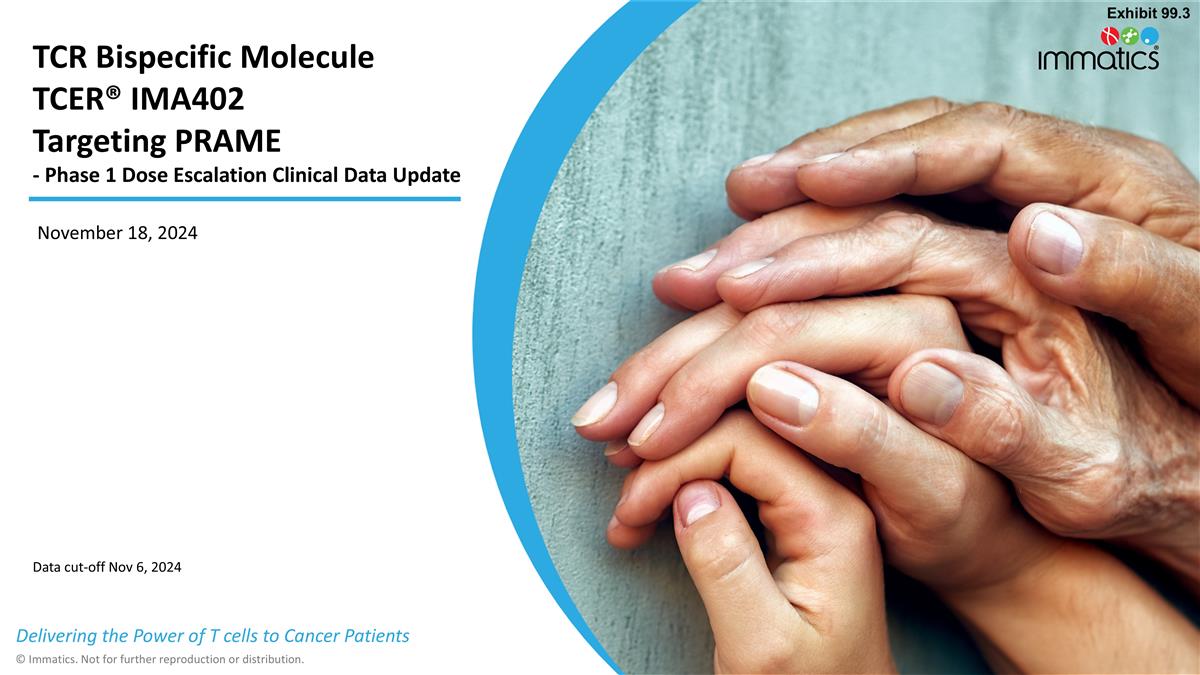
TCR Bispecific Molecule TCER®
IMA402 Targeting PRAME - Phase 1 Dose Escalation Clinical Data Update November 18, 2024 Data cut-off Nov 6, 2024 Exhibit 99.3
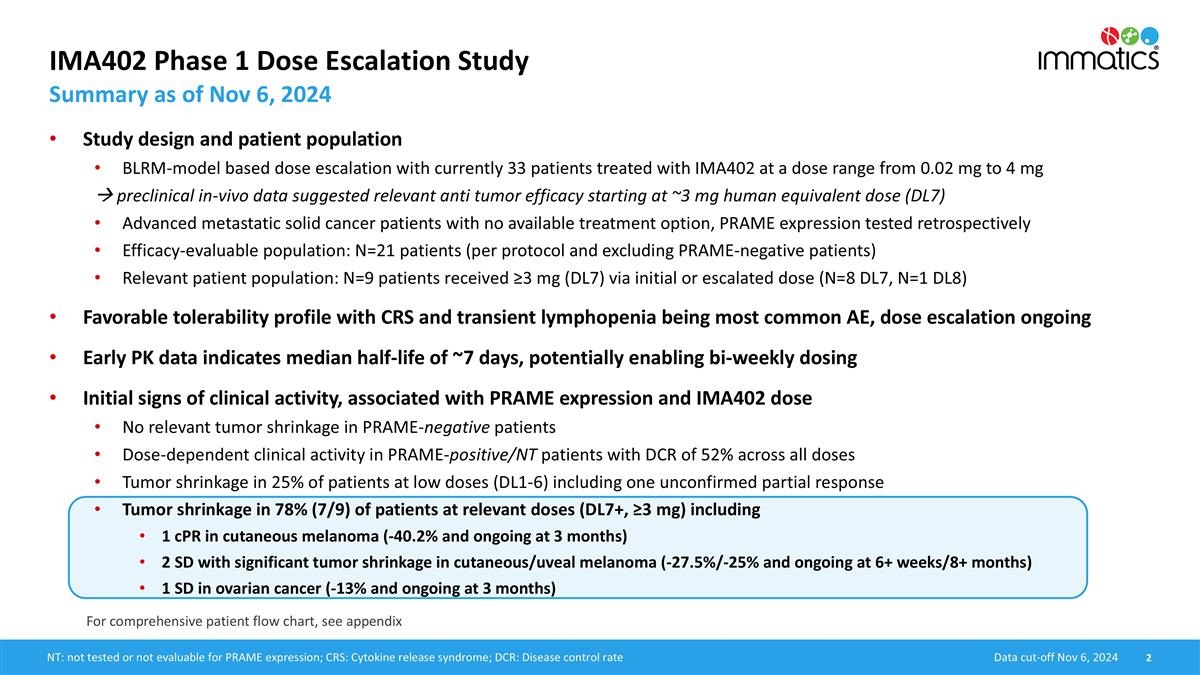
IMA402 Phase 1 Dose Escalation Study
Summary as of Nov 6, 2024 Data cut-off Nov 6, 2024 NT: not tested or not evaluable for PRAME expression; CRS: Cytokine release syndrome; DCR: Disease control rate For comprehensive patient flow chart, see appendix Study design and patient population
BLRM-model based dose escalation with currently 33 patients treated with IMA402 at a dose range from 0.02 mg to 4 mg à preclinical in-vivo data suggested relevant anti tumor efficacy starting at ~3 mg human equivalent dose (DL7) Advanced
metastatic solid cancer patients with no available treatment option, PRAME expression tested retrospectively Efficacy-evaluable population: N=21 patients (per protocol and excluding PRAME-negative patients) Relevant patient population: N=9 patients
received ≥3 mg (DL7) via initial or escalated dose (N=8 DL7, N=1 DL8) Favorable tolerability profile with CRS and transient lymphopenia being most common AE, dose escalation ongoing Early PK data indicates median half-life of ~7 days,
potentially enabling bi-weekly dosing Initial signs of clinical activity, associated with PRAME expression and IMA402 dose No relevant tumor shrinkage in PRAME-negative patients Dose-dependent clinical activity in PRAME-positive/NT patients with DCR
of 52% across all doses Tumor shrinkage in 25% of patients at low doses (DL1-6) including one unconfirmed partial response Tumor shrinkage in 78% (7/9) of patients at relevant doses (DL7+, ≥3 mg) including 1 cPR in cutaneous melanoma (-40.2%
and ongoing at 3 months) 2 SD with significant tumor shrinkage in cutaneous/uveal melanoma (-27.5%/-25% and ongoing at 6+ weeks/8+ months) 1 SD in ovarian cancer (-13% and ongoing at 3 months)
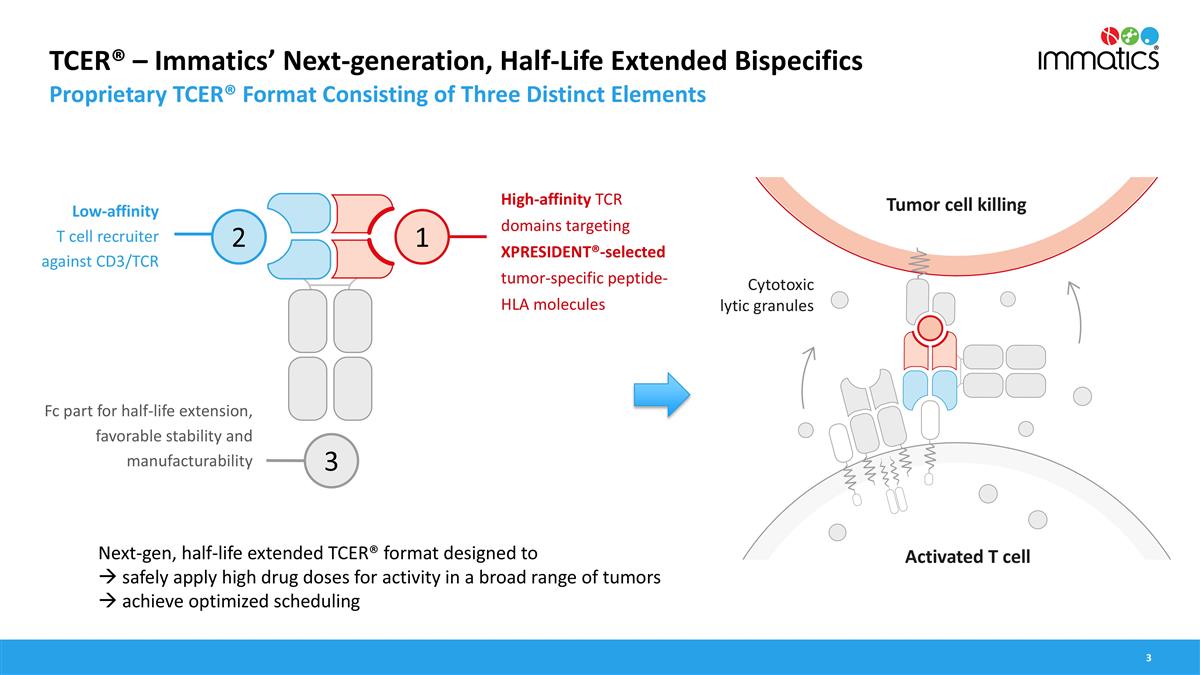
TCER® – Immatics’
Next-generation, Half-Life Extended Bispecifics Proprietary TCER® Format Consisting of Three Distinct Elements High-affinity TCR domains targeting XPRESIDENT®-selected tumor-specific peptide-HLA molecules Low-affinity T cell recruiter
against CD3/TCR Fc part for half-life extension, favorable stability and manufacturability Next-gen, half-life extended TCER® format designed to à safely apply high drug doses for activity in a broad range of tumors à achieve
optimized scheduling 2 1 3 Cytotoxic lytic granules Tumor cell killing Activated T cell

TCER® IMA402 Achieves
Dose-Dependent Durable Tumor Control in vivo Dose-response Relationship in Mouse Xenograft Model 0.01 mg/kg mouse dose à equivalent to approximately 0.6 mg human dose (~DL5) 0.05 mg/kg mouse dose à equivalent to approximately 3 mg human
dose (DL7) Data presented at ESMO 2022 Preclinical data suggest that a dose of ≥3mg of IMA402 (DL7 in Phase 1 trial) is expected to start showing relevant efficacy in humans
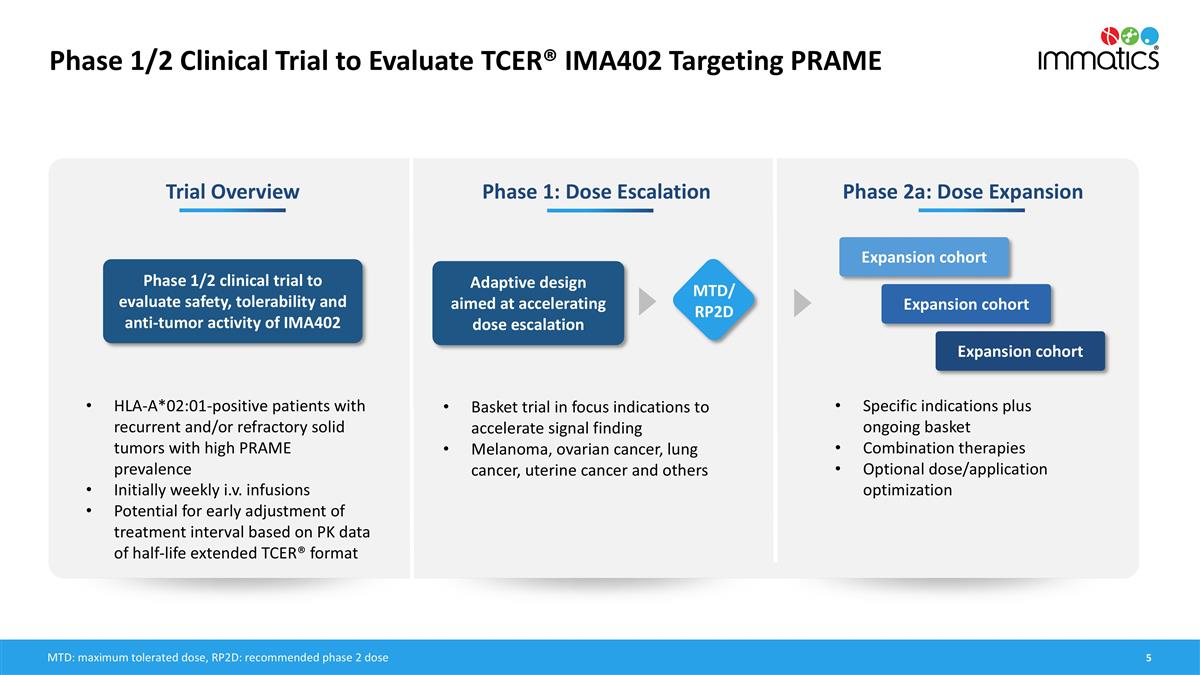
Phase 1/2 Clinical Trial to Evaluate
TCER® IMA402 Targeting PRAME Phase 1: Dose Escalation Phase 2a: Dose Expansion Adaptive design aimed at accelerating dose escalation Specific indications plus ongoing basket Combination therapies Optional dose/application optimization Expansion
cohort Expansion cohort Expansion cohort Trial Overview Phase 1/2 clinical trial to evaluate safety, tolerability and anti-tumor activity of IMA402 HLA-A*02:01-positive patients with recurrent and/or refractory solid tumors with high PRAME
prevalence Initially weekly i.v. infusions Potential for early adjustment of treatment interval based on PK data of half-life extended TCER® format MTD/ RP2D Basket trial in focus indications to accelerate signal finding Melanoma, ovarian
cancer, lung cancer, uterine cancer and others MTD: maximum tolerated dose, RP2D: recommended phase 2 dose
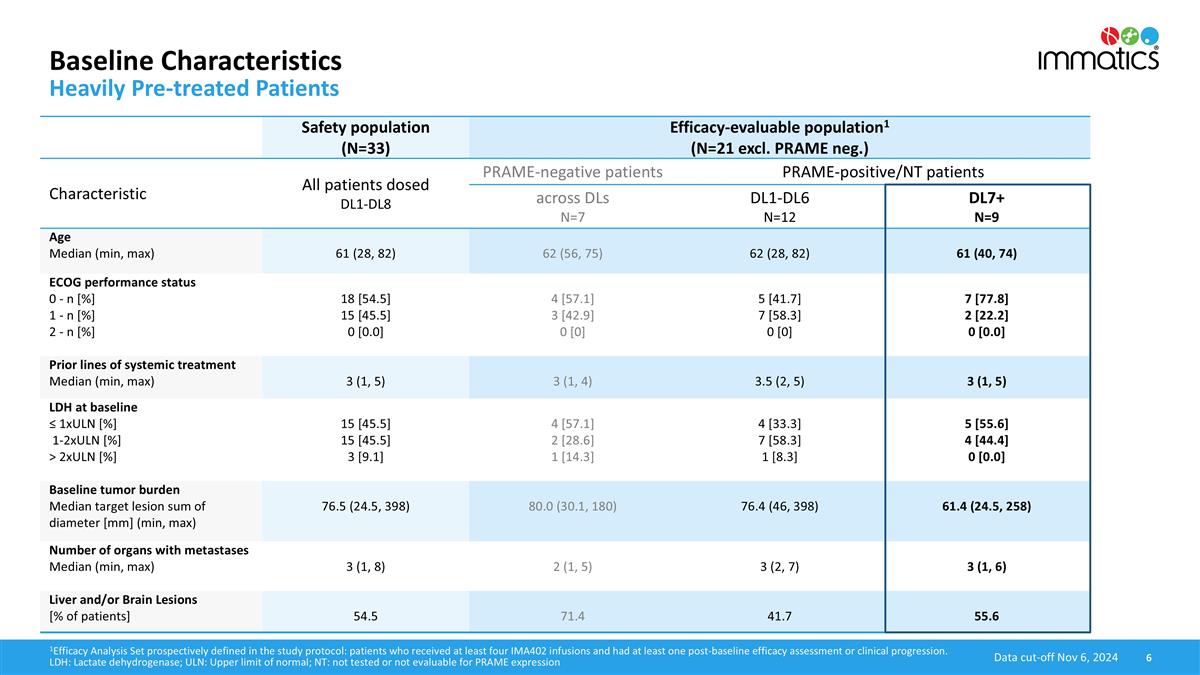
Baseline Characteristics Heavily
Pre-treated Patients 1Efficacy Analysis Set prospectively defined in the study protocol: patients who received at least four IMA402 infusions and had at least one post-baseline efficacy assessment or clinical progression. LDH: Lactate dehydrogenase;
ULN: Upper limit of normal; NT: not tested or not evaluable for PRAME expression Data cut-off Nov 6, 2024 Safety population (N=33) Efficacy-evaluable population1 (N=21 excl. PRAME neg.) Characteristic All patients dosed DL1-DL8 PRAME-negative
patients PRAME-positive/NT patients across DLs N=7 DL1-DL6 N=12 DL7+ N=9 Age Median (min, max) 61 (28, 82) 62 (56, 75) 62 (28, 82) 61 (40, 74) ECOG performance status 0 - n [%] 1 - n [%] 2 - n [%] 18 [54.5] 15 [45.5] 0 [0.0] 4 [57.1] 3 [42.9]
0 [0] 5 [41.7] 7 [58.3] 0 [0] 7 [77.8] 2 [22.2] 0 [0.0] Prior lines of systemic treatment Median (min, max) 3 (1, 5) 3 (1, 4) 3.5 (2, 5) 3 (1, 5) LDH at baseline ≤ 1xULN [%] 1-2xULN [%] > 2xULN [%] 15 [45.5] 15 [45.5] 3 [9.1] 4 [57.1]
2 [28.6] 1 [14.3] 4 [33.3] 7 [58.3] 1 [8.3] 5 [55.6] 4 [44.4] 0 [0.0] Baseline tumor burden Median target lesion sum of diameter [mm] (min, max) 76.5 (24.5, 398) 80.0 (30.1, 180) 76.4 (46, 398) 61.4 (24.5, 258) Number of organs with metastases
Median (min, max) 3 (1, 8) 2 (1, 5) 3 (2, 7) 3 (1, 6) Liver and/or Brain Lesions [% of patients] 54.5 71.4 41.7 55.6
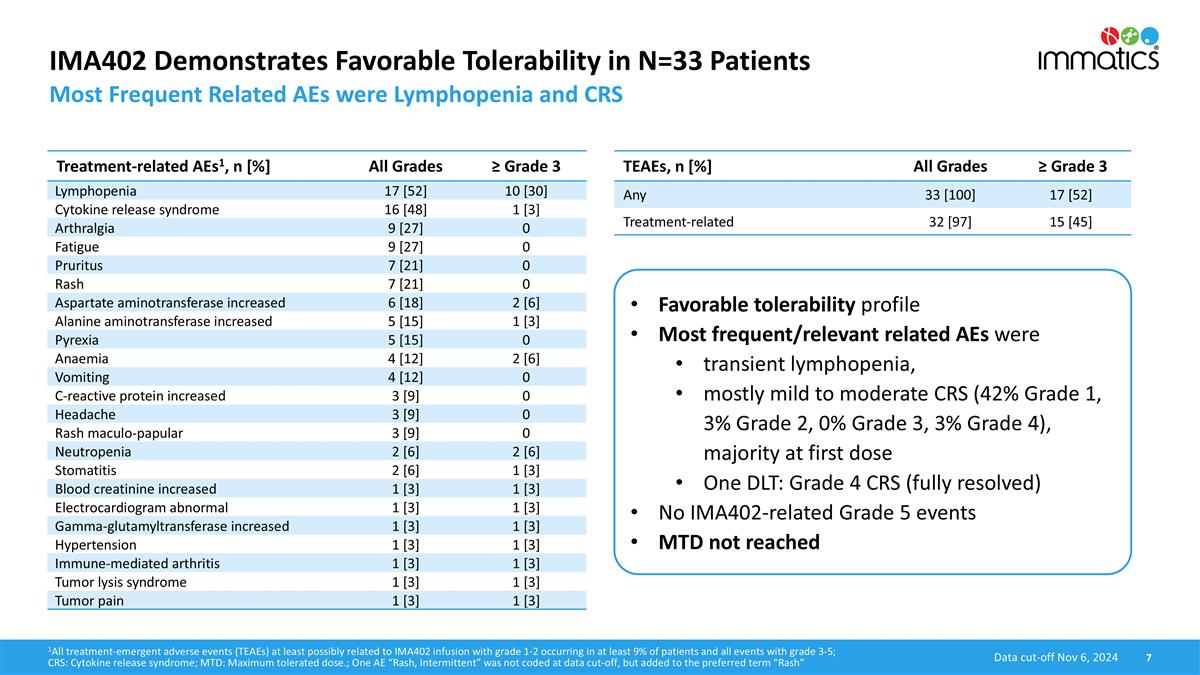
IMA402 Demonstrates Favorable
Tolerability in N=33 Patients Most Frequent Related AEs were Lymphopenia and CRS TEAEs, n [%] All Grades ≥ Grade 3 Any 33 [100] 17 [52] Treatment-related 32 [97] 15 [45] Treatment-related AEs1, n [%] All Grades ≥ Grade 3 Lymphopenia 17
[52] 10 [30] Cytokine release syndrome 16 [48] 1 [3] Arthralgia 9 [27] 0 Fatigue 9 [27] 0 Pruritus 7 [21] 0 Rash 7 [21] 0 Aspartate aminotransferase increased 6 [18] 2 [6] Alanine aminotransferase increased 5 [15] 1 [3] Pyrexia 5 [15] 0 Anaemia 4
[12] 2 [6] Vomiting 4 [12] 0 C-reactive protein increased 3 [9] 0 Headache 3 [9] 0 Rash maculo-papular 3 [9] 0 Neutropenia 2 [6] 2 [6] Stomatitis 2 [6] 1 [3] Blood creatinine increased 1 [3] 1 [3] Electrocardiogram abnormal 1 [3] 1 [3]
Gamma-glutamyltransferase increased 1 [3] 1 [3] Hypertension 1 [3] 1 [3] Immune-mediated arthritis 1 [3] 1 [3] Tumor lysis syndrome 1 [3] 1 [3] Tumor pain 1 [3] 1 [3] Favorable tolerability profile Most frequent/relevant related AEs were transient
lymphopenia, mostly mild to moderate CRS (42% Grade 1, 3% Grade 2, 0% Grade 3, 3% Grade 4), majority at first dose One DLT: Grade 4 CRS (fully resolved) No IMA402-related Grade 5 events MTD not reached 1All treatment-emergent adverse events (TEAEs)
at least possibly related to IMA402 infusion with grade 1-2 occurring in at least 9% of patients and all events with grade 3-5; CRS: Cytokine release syndrome; MTD: Maximum tolerated dose.; One AE “Rash, Intermittent” was not coded
at data cut-off, but added to the preferred term “Rash” Data cut-off Nov 6, 2024
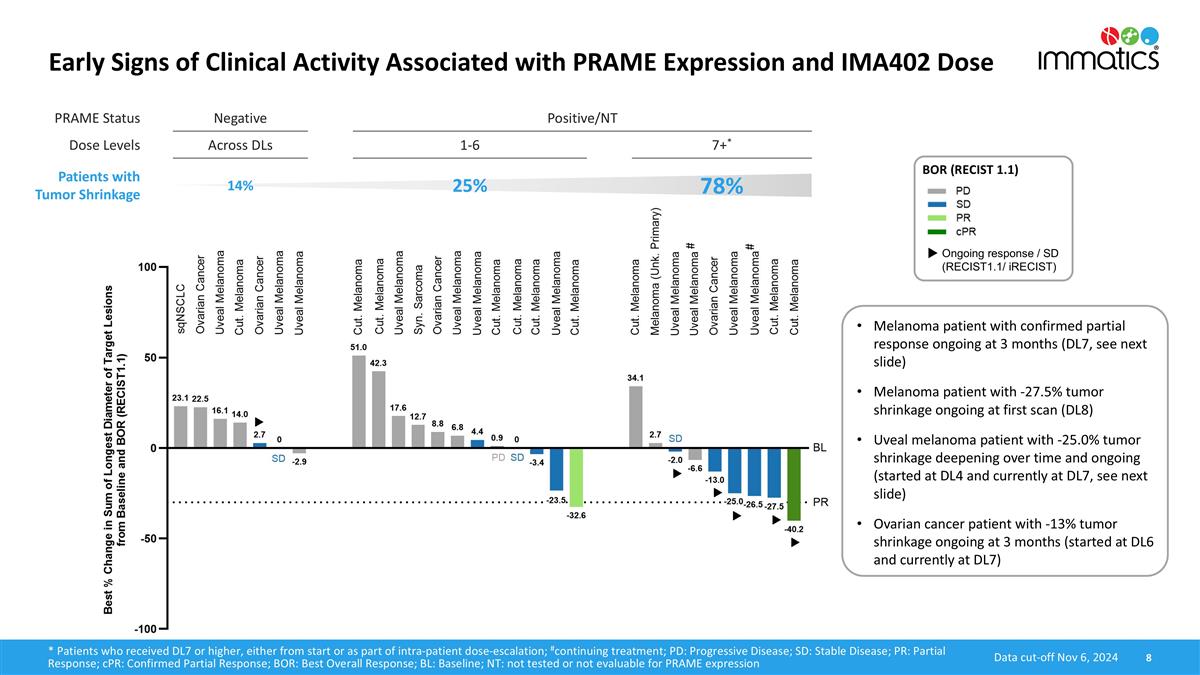
PRAME Status Negative Positive/NT Dose
Levels Across DLs 1-6 7+* Patients with Tumor Shrinkage 14% 25% 78% Early Signs of Clinical Activity Associated with PRAME Expression and IMA402 Dose 8 BOR (RECIST 1.1) Ongoing response / SD (RECIST1.1/ iRECIST) Data cut-off Nov 6, 2024 * Patients
who received DL7 or higher, either from start or as part of intra-patient dose-escalation; #continuing treatment; PD: Progressive Disease; SD: Stable Disease; PR: Partial Response; cPR: Confirmed Partial Response; BOR: Best Overall Response; BL:
Baseline; NT: not tested or not evaluable for PRAME expression # # Melanoma patient with confirmed partial response ongoing at 3 months (DL7, see next slide) Melanoma patient with -27.5% tumor shrinkage ongoing at first scan (DL8) Uveal
melanoma patient with -25.0% tumor shrinkage deepening over time and ongoing (started at DL4 and currently at DL7, see next slide) Ovarian cancer patient with -13% tumor shrinkage ongoing at 3 months (started at DL6 and currently at DL7)
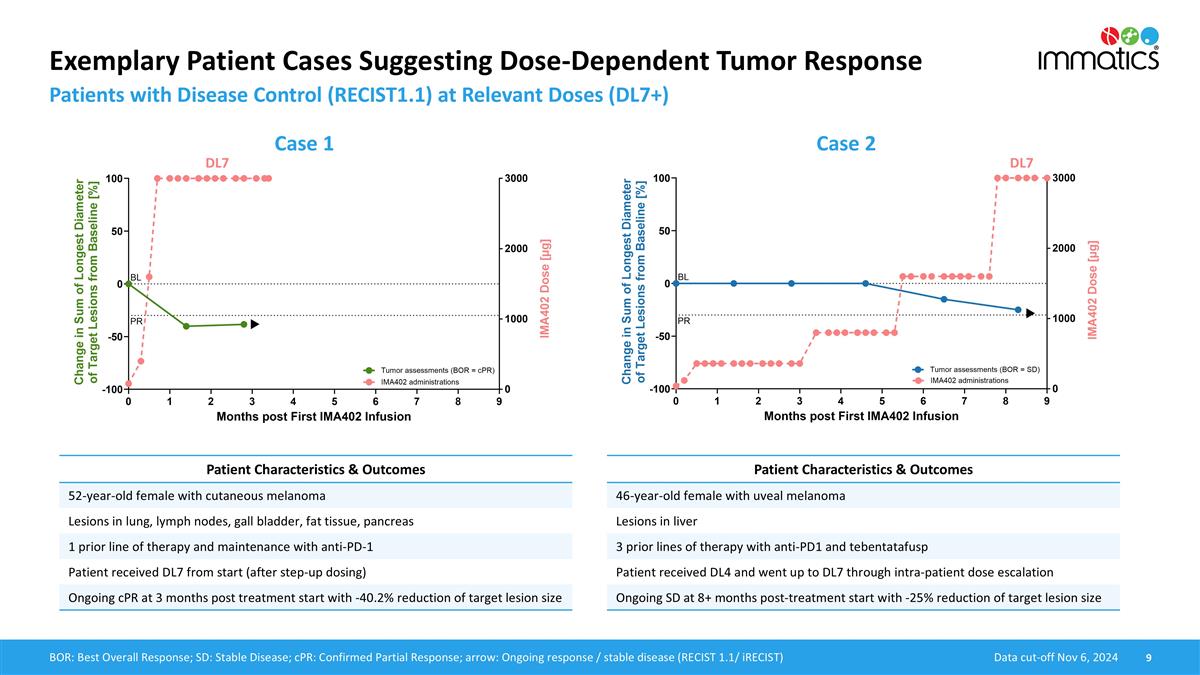
Exemplary Patient Cases Suggesting
Dose-Dependent Tumor Response Patients with Disease Control (RECIST1.1) at Relevant Doses (DL7+) Data cut-off Nov 6, 2024 BOR: Best Overall Response; SD: Stable Disease; cPR: Confirmed Partial Response; arrow: Ongoing response / stable disease
(RECIST 1.1/ iRECIST) Case 1 Case 2 DL7 DL7 Patient Characteristics & Outcomes 52-year-old female with cutaneous melanoma Lesions in lung, lymph nodes, gall bladder, fat tissue, pancreas 1 prior line of therapy and maintenance with anti-PD-1
Patient received DL7 from start (after step-up dosing) Ongoing cPR at 3 months post treatment start with -40.2% reduction of target lesion size Patient Characteristics & Outcomes 46-year-old female with uveal melanoma Lesions in liver 3 prior
lines of therapy with anti-PD1 and tebentatafusp Patient received DL4 and went up to DL7 through intra-patient dose escalation Ongoing SD at 8+ months post-treatment start with -25% reduction of target lesion size

Appendix
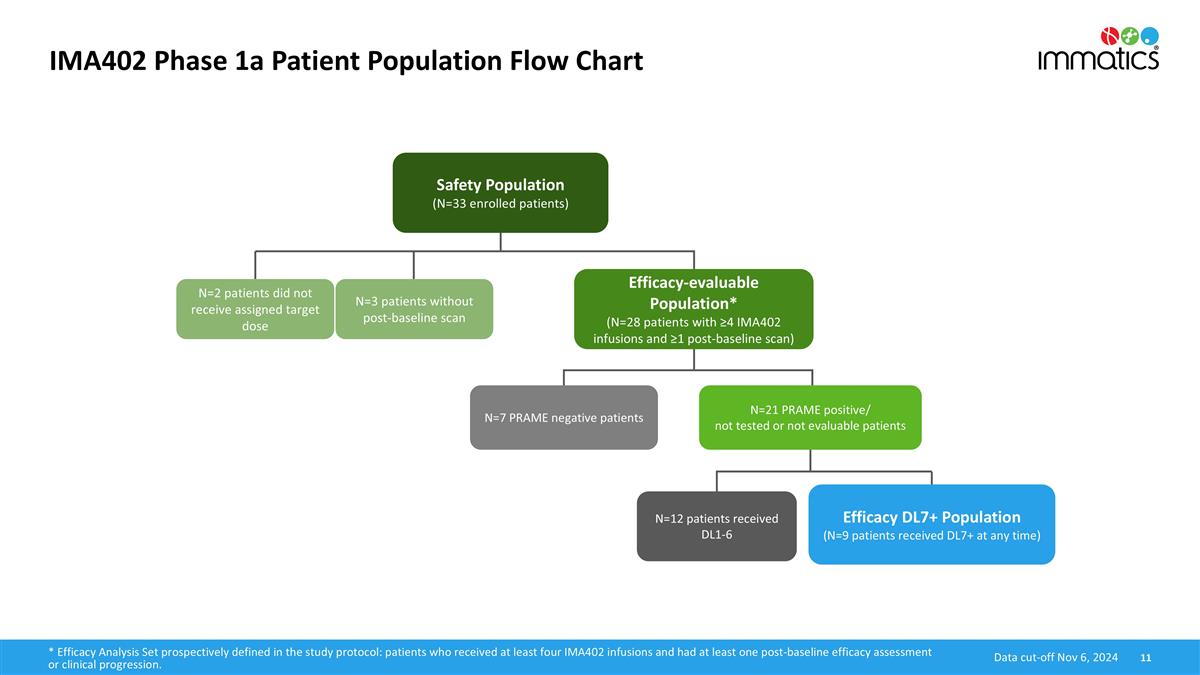
IMA402 Phase 1a Patient Population
Flow Chart Safety Population (N=33 enrolled patients) Efficacy-evaluable Population* (N=28 patients with ≥4 IMA402 infusions and ≥1 post-baseline scan) N=21 PRAME positive/ not tested or not evaluable patients N=2 patients did not
receive assigned target dose N=3 patients without post-baseline scan N=7 PRAME negative patients N=12 patients received DL1-6 Efficacy DL7+ Population (N=9 patients received DL7+ at any time) * Efficacy Analysis Set prospectively defined in the
study protocol: patients who received at least four IMA402 infusions and had at least one post-baseline efficacy assessment or clinical progression. Data cut-off Nov 6, 2024


Immatics Corporate Presentation
November 18, 2024 Exhibit 99.4
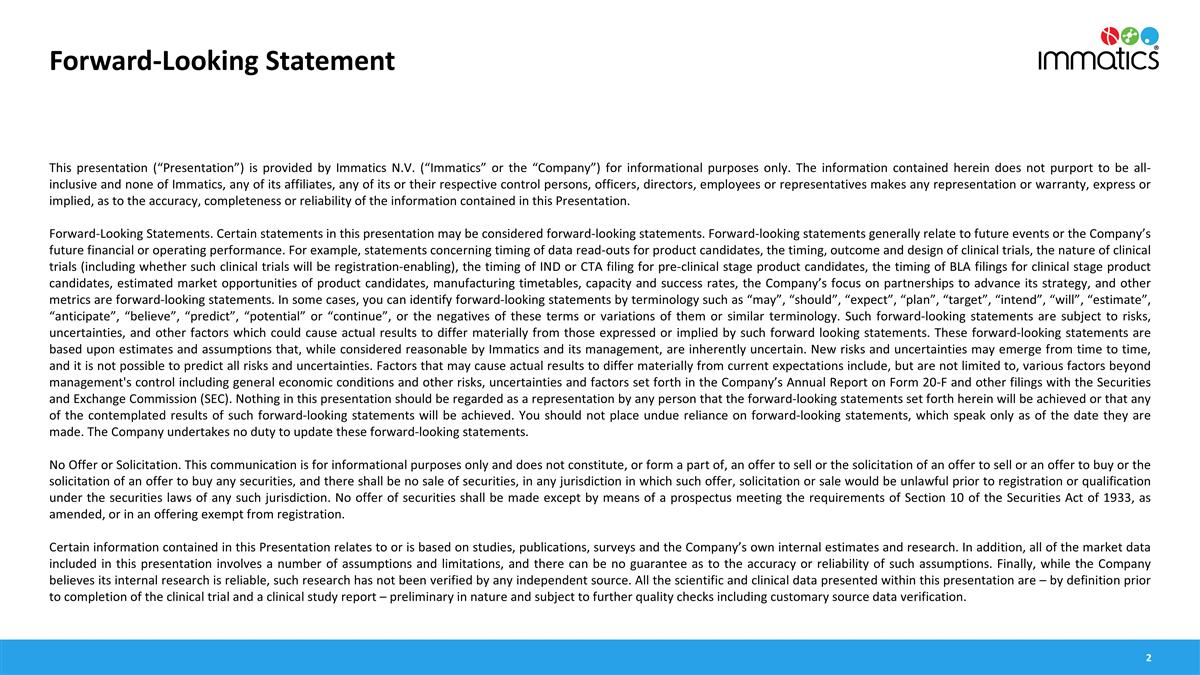
Forward-Looking Statement This
presentation (“Presentation”) is provided by Immatics N.V. (“Immatics” or the “Company”) for informational purposes only. The information contained herein does not purport to be all-inclusive and none of Immatics,
any of its affiliates, any of its or their respective control persons, officers, directors, employees or representatives makes any representation or warranty, express or implied, as to the accuracy, completeness or reliability of the information
contained in this Presentation. Forward-Looking Statements. Certain statements in this presentation may be considered forward-looking statements. Forward-looking statements generally relate to future events or the Company’s future financial or
operating performance. For example, statements concerning timing of data read-outs for product candidates, the timing, outcome and design of clinical trials, the nature of clinical trials (including whether such clinical trials will be
registration-enabling), the timing of IND or CTA filing for pre-clinical stage product candidates, the timing of BLA filings for clinical stage product candidates, estimated market opportunities of product candidates, manufacturing timetables,
capacity and success rates, the Company’s focus on partnerships to advance its strategy, and other metrics are forward-looking statements. In some cases, you can identify forward-looking statements by terminology such as “may”,
“should”, “expect”, “plan”, “target”, “intend”, “will”, “estimate”, “anticipate”, “believe”, “predict”, “potential”
or “continue”, or the negatives of these terms or variations of them or similar terminology. Such forward-looking statements are subject to risks, uncertainties, and other factors which could cause actual results to differ materially
from those expressed or implied by such forward looking statements. These forward-looking statements are based upon estimates and assumptions that, while considered reasonable by Immatics and its management, are inherently uncertain. New risks and
uncertainties may emerge from time to time, and it is not possible to predict all risks and uncertainties. Factors that may cause actual results to differ materially from current expectations include, but are not limited to, various factors beyond
management's control including general economic conditions and other risks, uncertainties and factors set forth in the Company’s Annual Report on Form 20-F and other filings with the Securities and Exchange Commission (SEC). Nothing in this
presentation should be regarded as a representation by any person that the forward-looking statements set forth herein will be achieved or that any of the contemplated results of such forward-looking statements will be achieved. You should not place
undue reliance on forward-looking statements, which speak only as of the date they are made. The Company undertakes no duty to update these forward-looking statements. No Offer or Solicitation. This communication is for informational purposes only
and does not constitute, or form a part of, an offer to sell or the solicitation of an offer to sell or an offer to buy or the solicitation of an offer to buy any securities, and there shall be no sale of securities, in any jurisdiction in which
such offer, solicitation or sale would be unlawful prior to registration or qualification under the securities laws of any such jurisdiction. No offer of securities shall be made except by means of a prospectus meeting the requirements of Section 10
of the Securities Act of 1933, as amended, or in an offering exempt from registration. Certain information contained in this Presentation relates to or is based on studies, publications, surveys and the Company’s own internal estimates and
research. In addition, all of the market data included in this presentation involves a number of assumptions and limitations, and there can be no guarantee as to the accuracy or reliability of such assumptions. Finally, while the Company believes
its internal research is reliable, such research has not been verified by any independent source. All the scientific and clinical data presented within this presentation are – by definition prior to completion of the clinical trial and a
clinical study report – preliminary in nature and subject to further quality checks including customary source data verification.
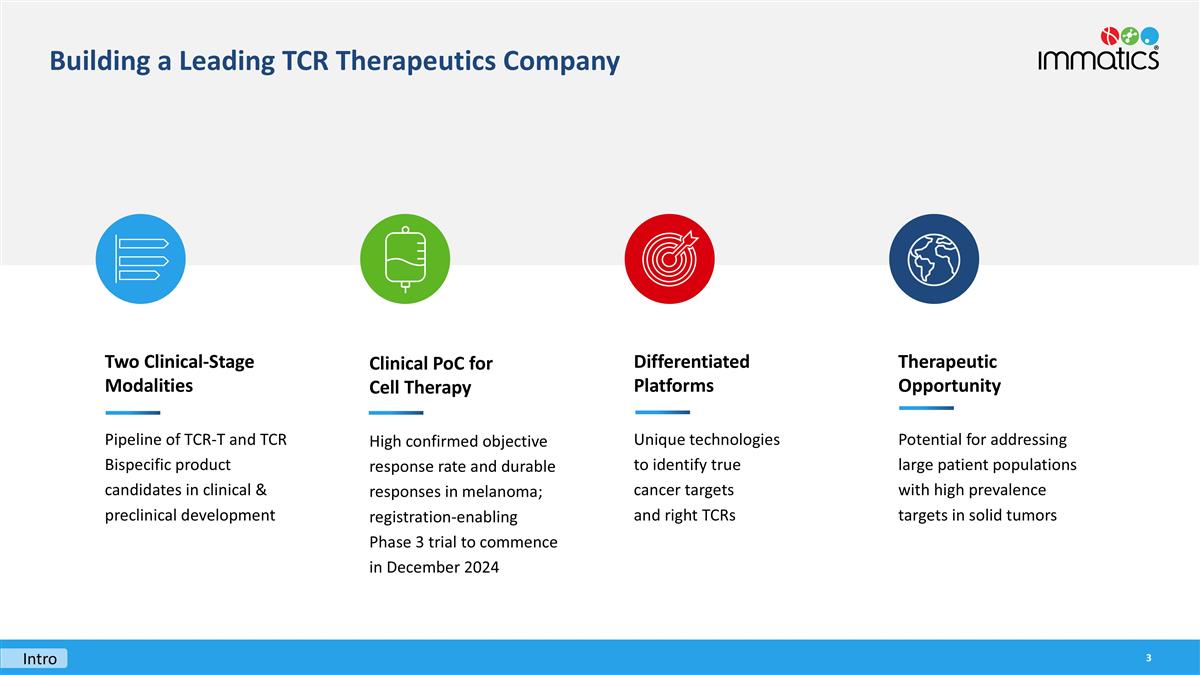
Therapeutic Opportunity Potential for
addressing large patient populations with high prevalence targets in solid tumors Two Clinical-Stage Modalities Pipeline of TCR-T and TCR Bispecific product candidates in clinical & preclinical development Building a Leading TCR Therapeutics
Company Intro Differentiated Platforms Unique technologies to identify true cancer targets and right TCRs Clinical PoC for Cell Therapy High confirmed objective response rate and durable responses in melanoma; registration-enabling Phase 3 trial to
commence in December 2024
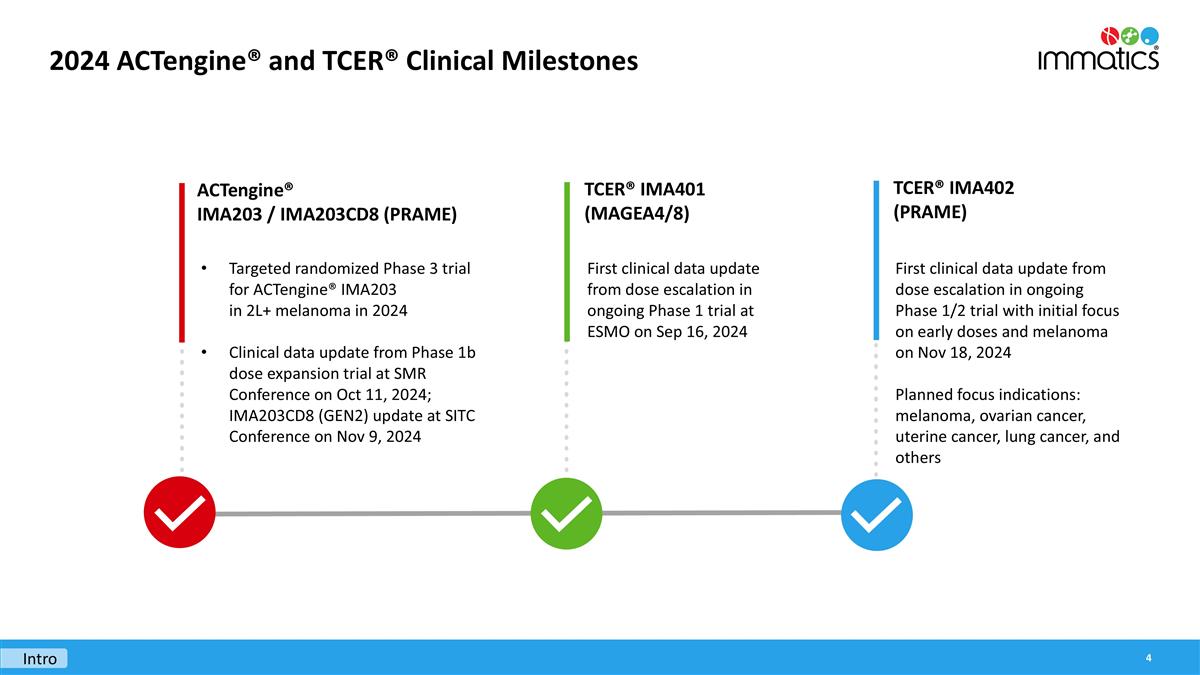
2024 ACTengine® and TCER®
Clinical Milestones Targeted randomized Phase 3 trial for ACTengine® IMA203 in 2L+ melanoma in 2024 Clinical data update from Phase 1b dose expansion trial at SMR Conference on Oct 11, 2024; IMA203CD8 (GEN2) update at SITC Conference on Nov 9,
2024 ACTengine® IMA203 / IMA203CD8 (PRAME) First clinical data update from dose escalation in ongoing Phase 1 trial at ESMO on Sep 16, 2024 TCER® IMA401 (MAGEA4/8) First clinical data update from dose escalation in ongoing Phase 1/2 trial
with initial focus on early doses and melanoma on Nov 18, 2024 Planned focus indications: melanoma, ovarian cancer, uterine cancer, lung cancer, and others TCER® IMA402 (PRAME) Intro
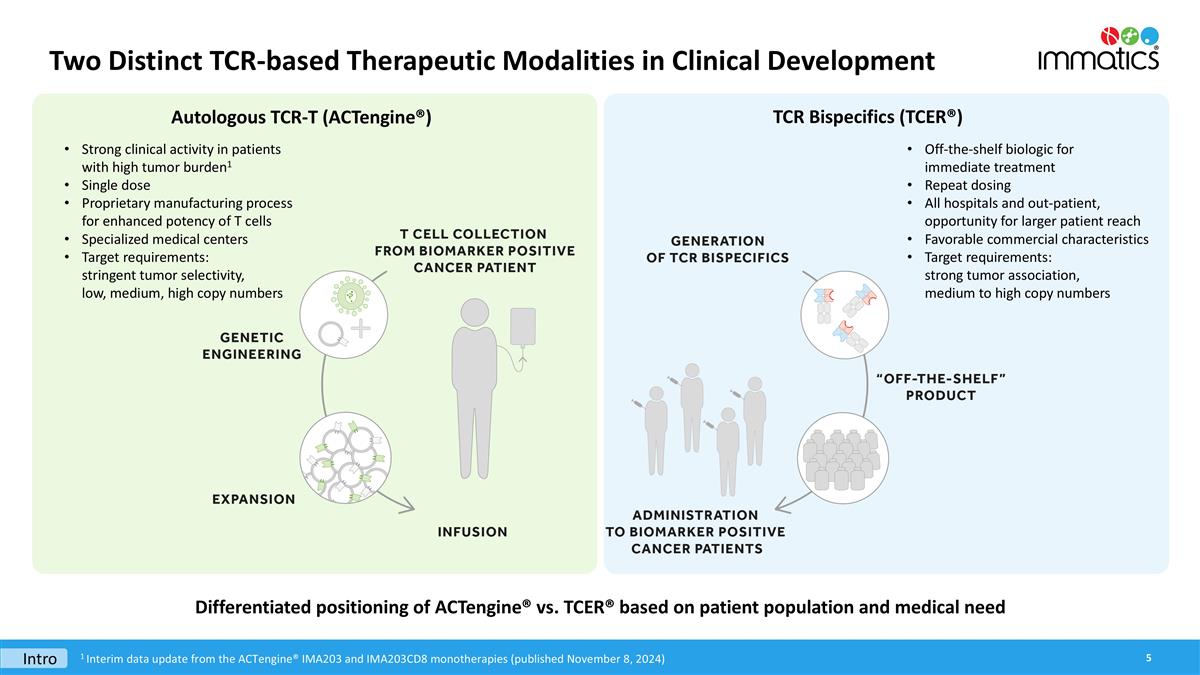
Two Distinct TCR-based Therapeutic
Modalities in Clinical Development Differentiated positioning of ACTengine® vs. TCER® based on patient population and medical need Intro 1 Interim data update from the ACTengine® IMA203 and IMA203CD8 monotherapies (published November
8, 2024) Autologous TCR-T (ACTengine®) TCR Bispecifics (TCER®) Strong clinical activity in patients with high tumor burden1 Single dose Proprietary manufacturing process for enhanced potency of T cells Specialized medical centers Target
requirements: stringent tumor selectivity, low, medium, high copy numbers Off-the-shelf biologic for immediate treatment Repeat dosing All hospitals and out-patient, opportunity for larger patient reach Favorable commercial characteristics Target
requirements: strong tumor association, medium to high copy numbers
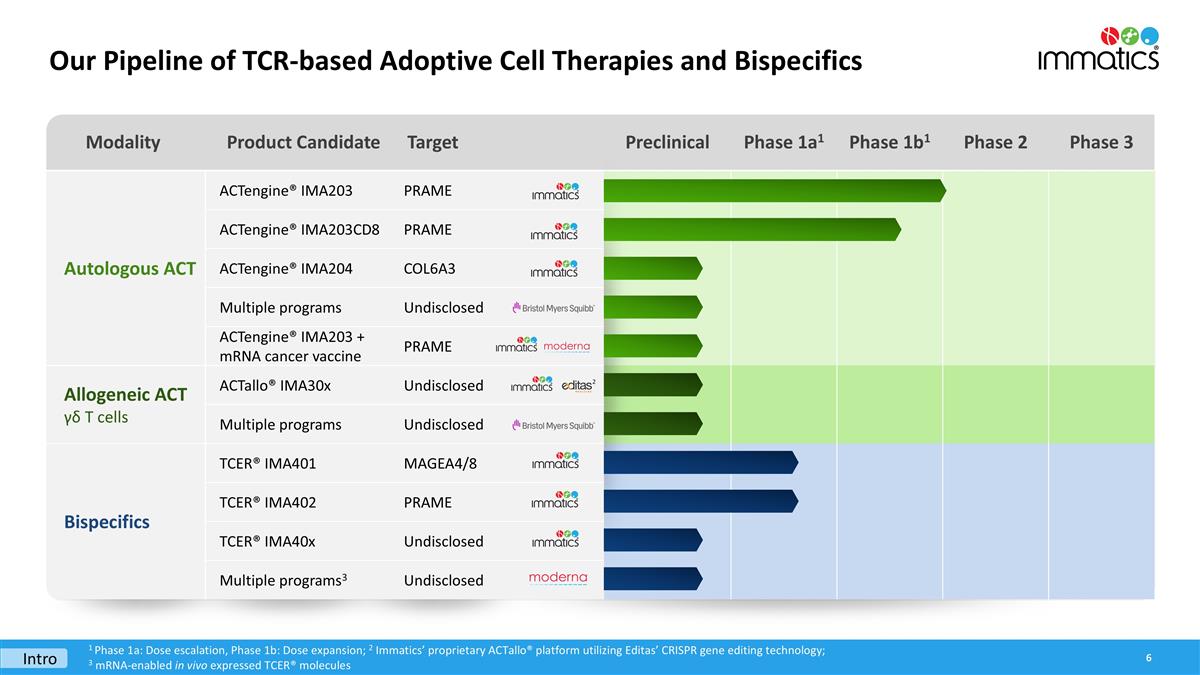
Modality Product Candidate Target
Preclinical Phase 1a1 Phase 1b1 Phase 2 Phase 3 Autologous ACT ACTengine® IMA203 PRAME ACTengine® IMA203CD8 PRAME ACTengine® IMA204 COL6A3 Autologous ACT Multiple programs Undisclosed ACTengine® IMA203 + mRNA cancer
vaccine PRAME Allogeneic ACT γδ T cells ACTallo® IMA30x Undisclosed Multiple programs Undisclosed Bispecifics TCER® IMA401 MAGEA4/8 TCER® IMA402 PRAME TCER® IMA40x Undisclosed Multiple programs3 Undisclosed
Our Pipeline of TCR-based Adoptive Cell Therapies and Bispecifics 1 Phase 1a: Dose escalation, Phase 1b: Dose expansion; 2 Immatics’ proprietary ACTallo® platform utilizing Editas’ CRISPR gene editing technology; 3 mRNA-enabled in
vivo expressed TCER® molecules 2 Intro
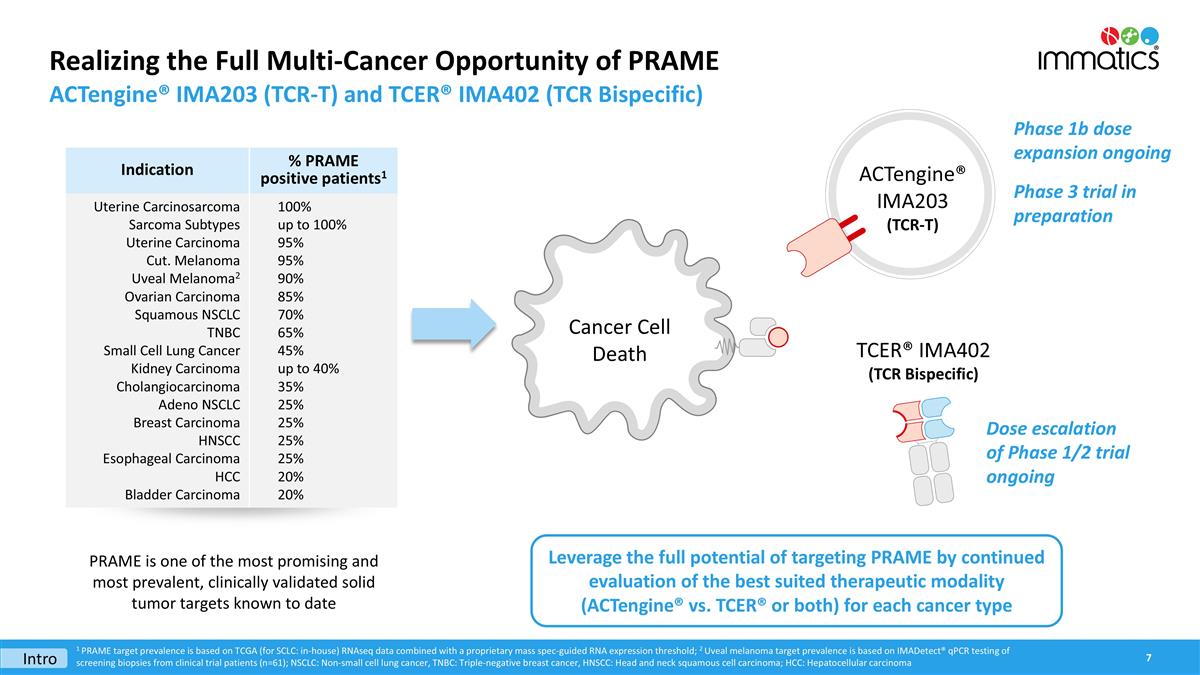
Realizing the Full Multi-Cancer
Opportunity of PRAME ACTengine® IMA203 (TCR-T) and TCER® IMA402 (TCR Bispecific) ACTengine® IMA203 (TCR-T) Cancer Cell Death PRAME is one of the most promising and most prevalent, clinically validated solid tumor targets known to date
Leverage the full potential of targeting PRAME by continued evaluation of the best suited therapeutic modality (ACTengine® vs. TCER® or both) for each cancer type Intro Phase 1b dose expansion ongoing Phase 3 trial in preparation
TCER® IMA402 (TCR Bispecific) 1 PRAME target prevalence is based on TCGA (for SCLC: in-house) RNAseq data combined with a proprietary mass spec-guided RNA expression threshold; 2 Uveal melanoma target prevalence is based on IMADetect® qPCR
testing of screening biopsies from clinical trial patients (n=61); NSCLC: Non-small cell lung cancer, TNBC: Triple-negative breast cancer, HNSCC: Head and neck squamous cell carcinoma; HCC: Hepatocellular carcinoma Indication % PRAME positive
patients1 Uterine Carcinosarcoma Sarcoma Subtypes Uterine Carcinoma Cut. Melanoma Uveal Melanoma2 Ovarian Carcinoma Squamous NSCLC TNBC Small Cell Lung Cancer Kidney Carcinoma Cholangiocarcinoma Adeno NSCLC Breast Carcinoma HNSCC Esophageal
Carcinoma HCC Bladder Carcinoma 100% up to 100% 95% 95% 90% 85% 70% 65% 45% up to 40% 35% 25% 25% 25% 25% 20% 20% Dose escalation of Phase 1/2 trial ongoing
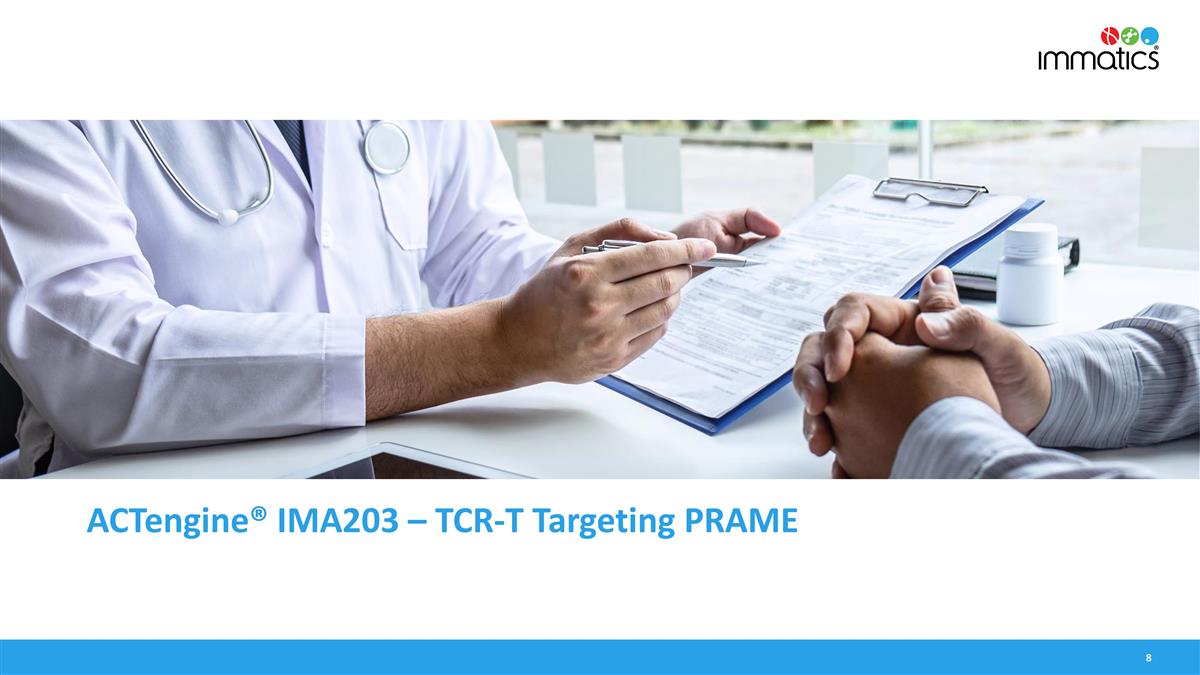
ACTengine® IMA203 – TCR-T
Targeting PRAME
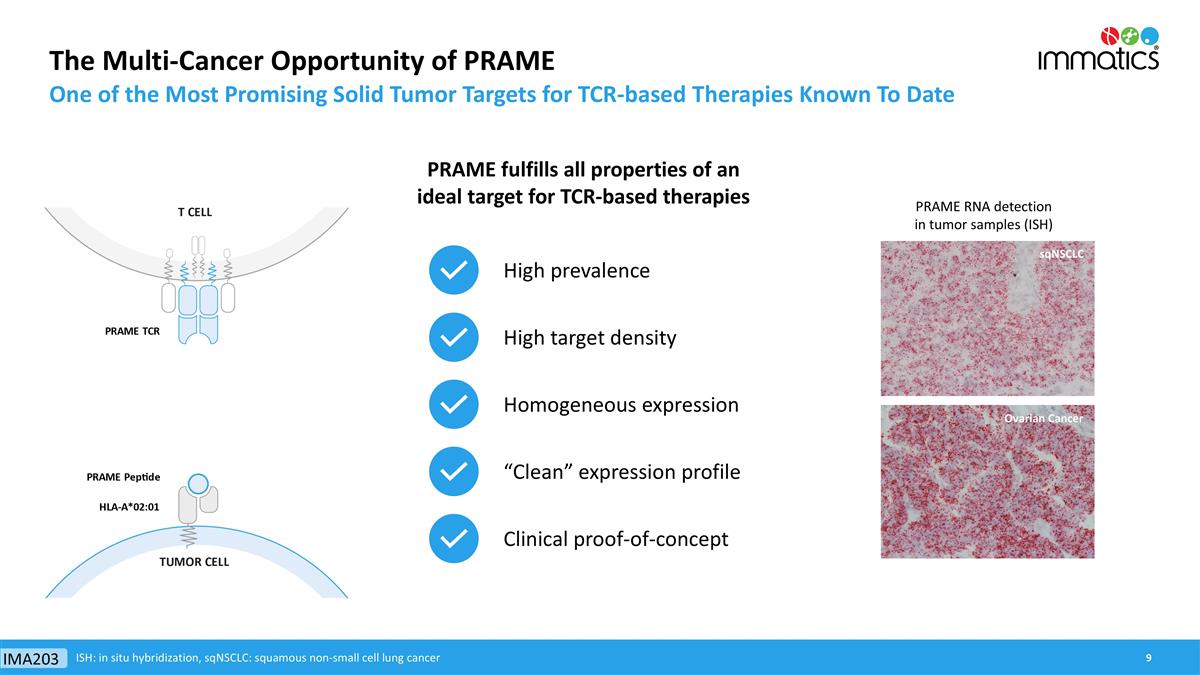
The Multi-Cancer Opportunity of PRAME
One of the Most Promising Solid Tumor Targets for TCR-based Therapies Known To Date High prevalence High target density Homogeneous expression “Clean” expression profile Clinical proof-of-concept sqNSCLC Ovarian Cancer PRAME fulfills all
properties of an ideal target for TCR-based therapies PRAME RNA detection in tumor samples (ISH) ISH: in situ hybridization, sqNSCLC: squamous non-small cell lung cancer IMA203
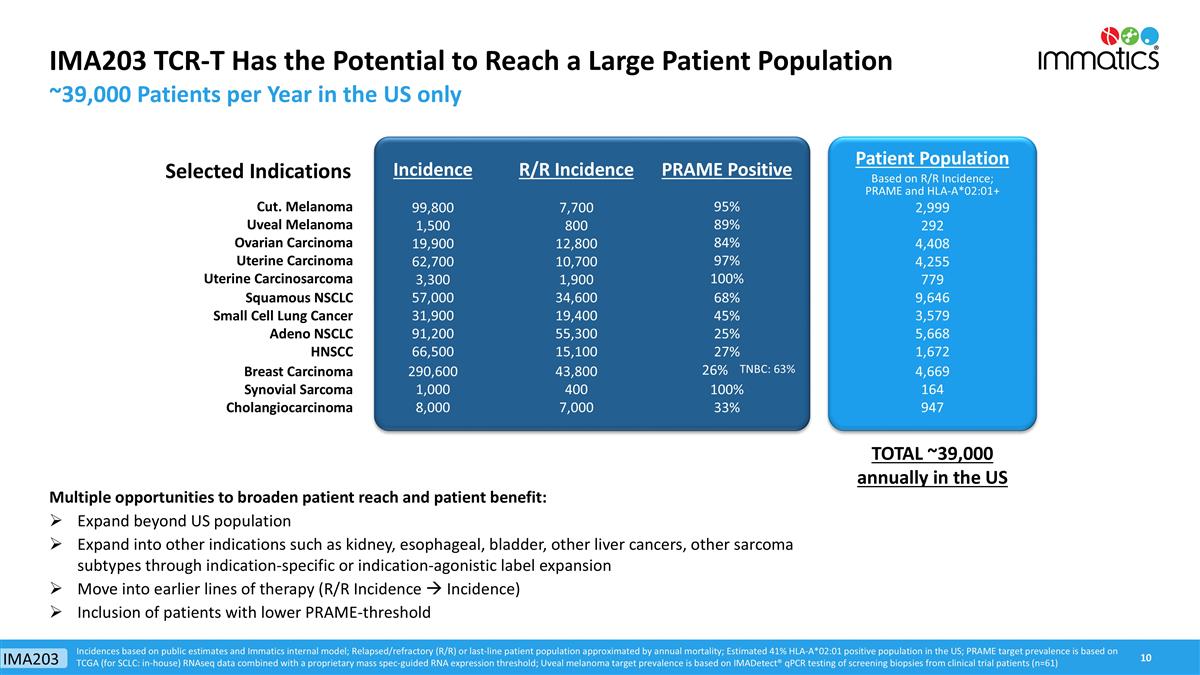
Selected Indications Incidence R/R
Incidence PRAME Positive Patient Population Based on R/R Incidence; PRAME and HLA-A*02:01+ Cut. Melanoma 99,800 7,700 95% 2,999 Uveal Melanoma 1,500 800 89% 292 Ovarian Carcinoma 19,900 12,800 84% 4,408 Uterine Carcinoma 62,700 10,700 97% 4,255
Uterine Carcinosarcoma 3,300 1,900 100% 779 Squamous NSCLC 57,000 34,600 68% 9,646 Small Cell Lung Cancer 31,900 19,400 45% 3,579 Adeno NSCLC 91,200 55,300 25% 5,668 HNSCC 66,500 15,100 27% 1,672 Breast Carcinoma 290,600 43,800 26% TNBC: 63% 4,669
Synovial Sarcoma 1,000 400 100% 164 Cholangiocarcinoma 8,000 7,000 33% 947 IMA203 TCR-T Has the Potential to Reach a Large Patient Population ~39,000 Patients per Year in the US only Incidences based on public estimates and Immatics internal model;
Relapsed/refractory (R/R) or last-line patient population approximated by annual mortality; Estimated 41% HLA-A*02:01 positive population in the US; PRAME target prevalence is based on TCGA (for SCLC: in-house) RNAseq data combined with a
proprietary mass spec-guided RNA expression threshold; Uveal melanoma target prevalence is based on IMADetect® qPCR testing of screening biopsies from clinical trial patients (n=61) Multiple opportunities to broaden patient reach and patient
benefit: Expand beyond US population Expand into other indications such as kidney, esophageal, bladder, other liver cancers, other sarcoma subtypes through indication-specific or indication-agonistic label expansion Move into earlier lines of
therapy (R/R Incidence à Incidence) Inclusion of patients with lower PRAME-threshold TOTAL ~39,000 annually in the US IMA203
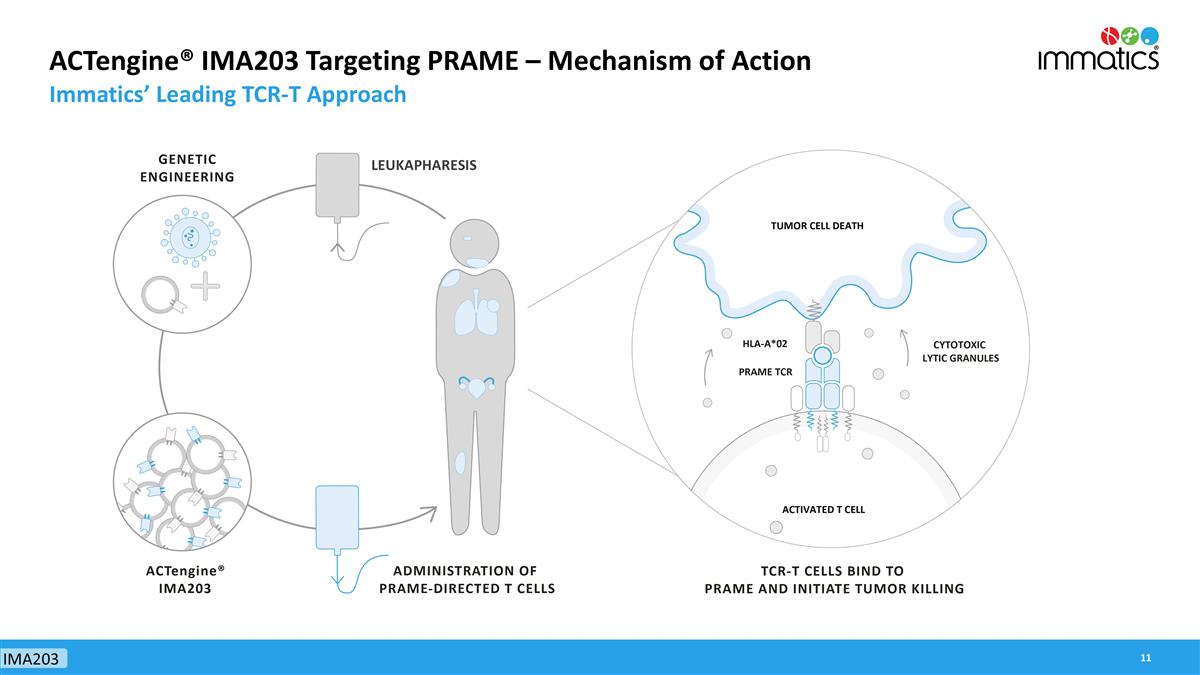
ACTengine® IMA203 Targeting
PRAME – Mechanism of Action Immatics’ Leading TCR-T Approach IMA203 LEUKAPHARESIS
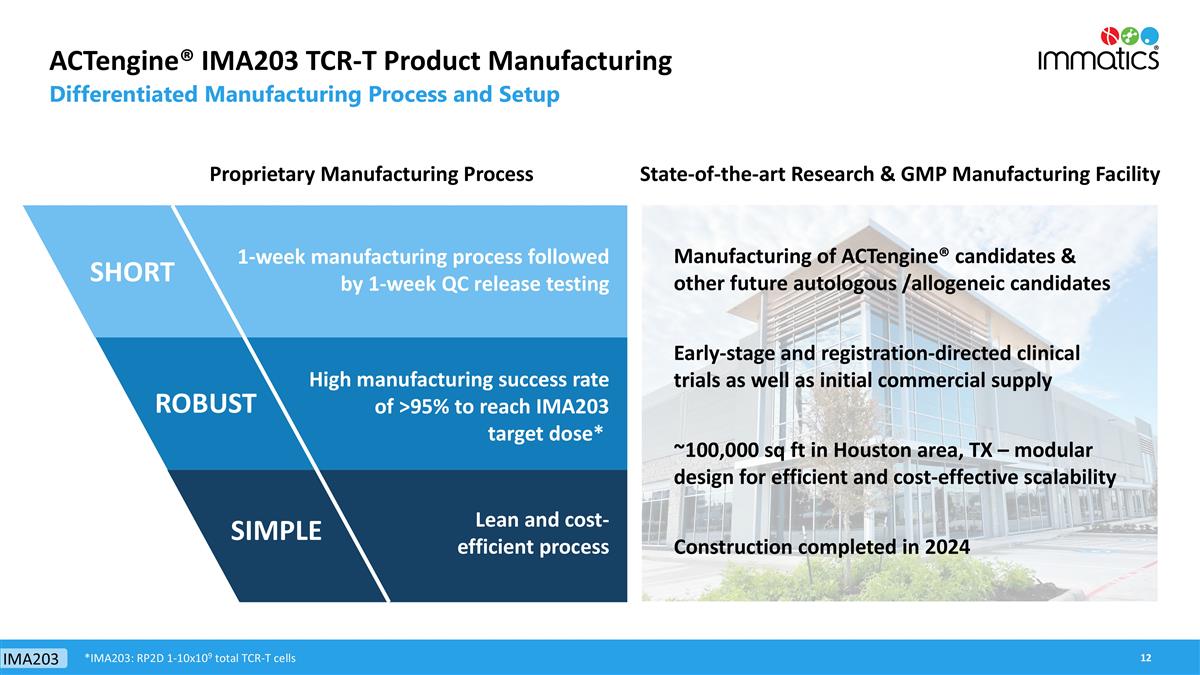
ACTengine® IMA203 TCR-T
Product Manufacturing Differentiated Manufacturing Process and Setup 1-week manufacturing process followed by 1-week QC release testing High manufacturing success rate of >95% to reach IMA203 target dose* Lean and cost-efficient process
Proprietary Manufacturing Process IMA203 SHORT SIMPLE ROBUST *IMA203: RP2D 1-10x109 total TCR-T cells Manufacturing of ACTengine® candidates & other future autologous /allogeneic candidates Construction completed in 2024 ~100,000 sq ft in
Houston area, TX – modular design for efficient and cost-effective scalability Early-stage and registration-directed clinical trials as well as initial commercial supply State-of-the-art Research & GMP Manufacturing Facility
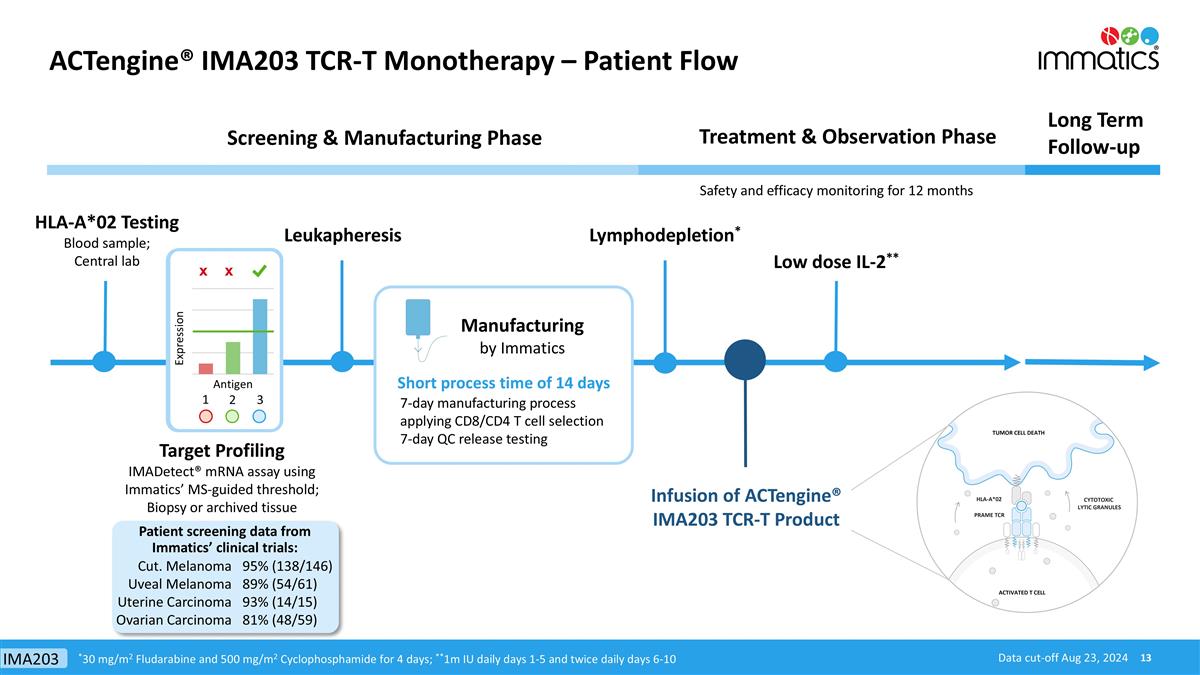
ACTengine® IMA203 TCR-T
Monotherapy – Patient Flow HLA-A*02 Testing Blood sample; Central lab Treatment & Observation Phase Long Term Follow-up Screening & Manufacturing Phase Manufacturing by Immatics Infusion of ACTengine® IMA203 TCR-T Product
Lymphodepletion* Target Profiling IMADetect® mRNA assay using Immatics’ MS-guided threshold; Biopsy or archived tissue Low dose IL-2** Safety and efficacy monitoring for 12 months Leukapheresis x x 1 3 2 Short process time of 14 days *30
mg/m2 Fludarabine and 500 mg/m2 Cyclophosphamide for 4 days; **1m IU daily days 1-5 and twice daily days 6-10 7-day manufacturing process applying CD8/CD4 T cell selection 7-day QC release testing Cut. Melanoma Uveal Melanoma Uterine Carcinoma
Ovarian Carcinoma 95% (138/146) 89% (54/61) 93% (14/15) 81% (48/59) Patient screening data from Immatics’ clinical trials: Data cut-off Aug 23, 2024 IMA203
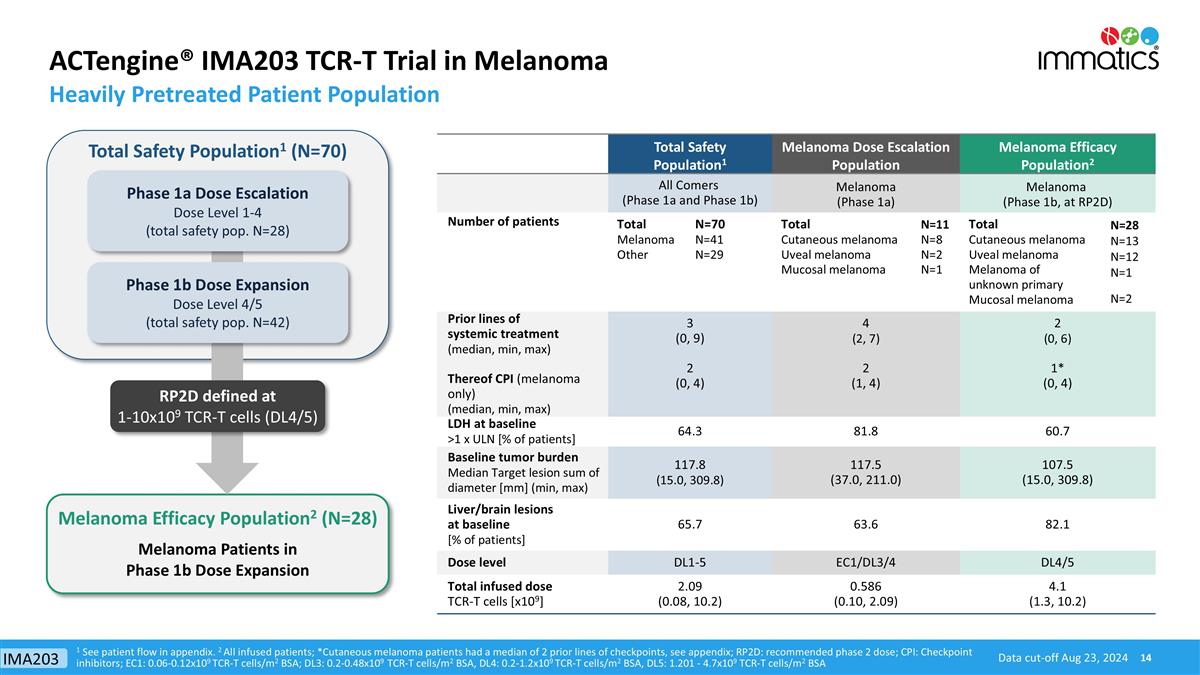
ACTengine® IMA203 TCR-T Trial
in Melanoma Heavily Pretreated Patient Population Data cut-off Aug 23, 2024 1 See patient flow in appendix. 2 All infused patients; *Cutaneous melanoma patients had a median of 2 prior lines of checkpoints, see appendix; RP2D: recommended phase 2
dose; CPI: Checkpoint inhibitors; EC1: 0.06-0.12x109 TCR-T cells/m2 BSA; DL3: 0.2-0.48x109 TCR-T cells/m2 BSA, DL4: 0.2-1.2x109 TCR-T cells/m2 BSA, DL5: 1.201 - 4.7x109 TCR-T cells/m2 BSA Total Safety Population1 Melanoma Dose Escalation Population
Melanoma Efficacy Population2 All Comers (Phase 1a and Phase 1b) Melanoma (Phase 1a) Melanoma (Phase 1b, at RP2D) Number of patients Total Melanoma Other N=70 N=41 N=29 Total Cutaneous melanoma Uveal melanoma Mucosal melanoma N=11 N=8
N=2 N=1 Total Cutaneous melanoma Uveal melanoma Melanoma of unknown primary Mucosal melanoma N=28 N=13 N=12 N=1 N=2 Prior lines of systemic treatment (median, min, max) Thereof CPI (melanoma only) (median, min, max) 3 (0, 9) 2 (0, 4) 4
(2, 7) 2 (1, 4) 2 (0, 6) 1* (0, 4) LDH at baseline >1 x ULN [% of patients] 64.3 81.8 60.7 Baseline tumor burden Median Target lesion sum of diameter [mm] (min, max) 117.8 (15.0, 309.8) 117.5 (37.0, 211.0) 107.5 (15.0, 309.8) Liver/brain
lesions at baseline [% of patients] 65.7 63.6 82.1 Dose level DL1-5 EC1/DL3/4 DL4/5 Total infused dose TCR-T cells [x109] 2.09 (0.08, 10.2) 0.586 (0.10, 2.09) 4.1 (1.3, 10.2) Melanoma Efficacy Population2 (N=28) Total Safety Population1 (N=70)
Melanoma Patients in Phase 1b Dose Expansion RP2D defined at 1-10x109 TCR-T cells (DL4/5) Phase 1b Dose Expansion Dose Level 4/5 (total safety pop. N=42) Phase 1a Dose Escalation Dose Level 1-4 (total safety pop. N=28) IMA203
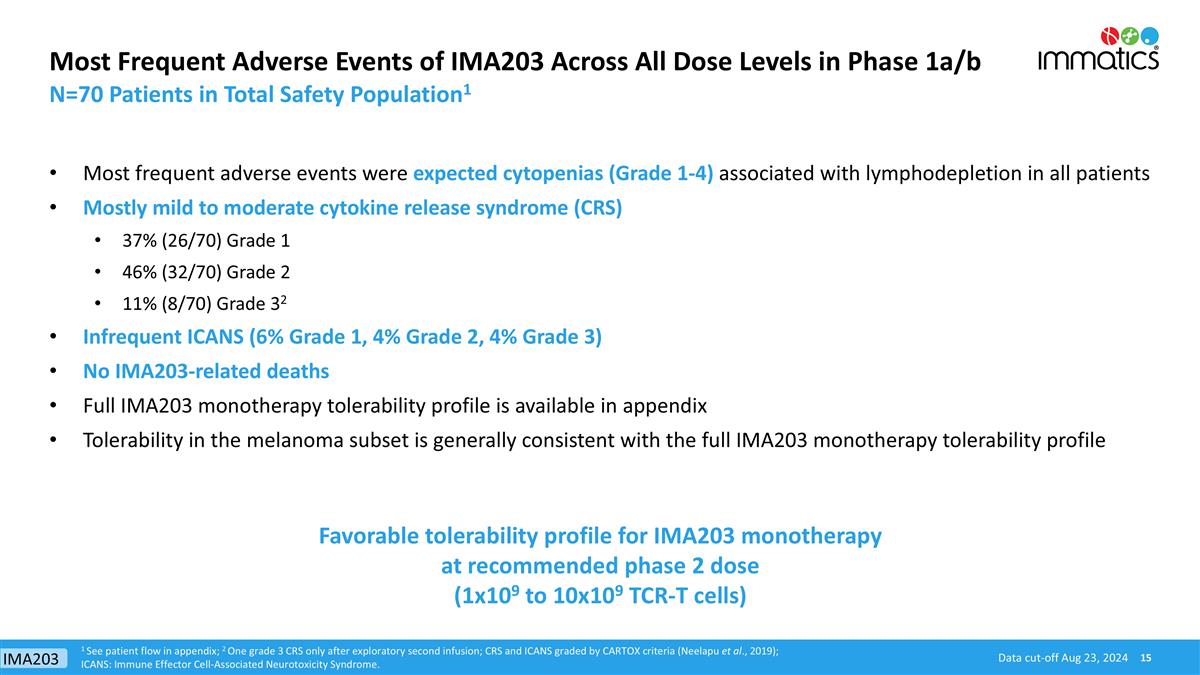
Data cut-off Aug 23, 2024 Most
Frequent Adverse Events of IMA203 Across All Dose Levels in Phase 1a/b Most frequent adverse events were expected cytopenias (Grade 1-4) associated with lymphodepletion in all patients Mostly mild to moderate cytokine release syndrome (CRS) 37%
(26/70) Grade 1 46% (32/70) Grade 2 11% (8/70) Grade 32 Infrequent ICANS (6% Grade 1, 4% Grade 2, 4% Grade 3) No IMA203-related deaths Full IMA203 monotherapy tolerability profile is available in appendix Tolerability in the melanoma subset is
generally consistent with the full IMA203 monotherapy tolerability profile 1 See patient flow in appendix; 2 One grade 3 CRS only after exploratory second infusion; CRS and ICANS graded by CARTOX criteria (Neelapu et al., 2019); ICANS: Immune
Effector Cell-Associated Neurotoxicity Syndrome. N=70 Patients in Total Safety Population1 Favorable tolerability profile for IMA203 monotherapy at recommended phase 2 dose (1x109 to 10x109 TCR-T cells) IMA203
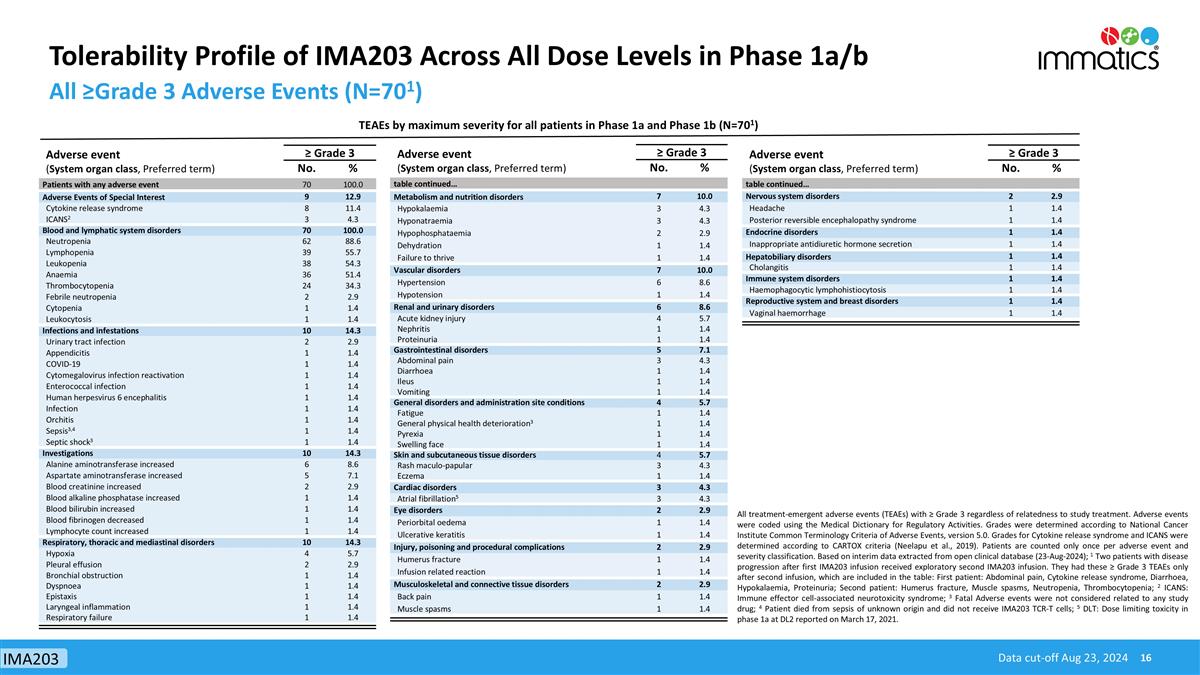
Tolerability Profile of IMA203
Across All Dose Levels in Phase 1a/b All ≥Grade 3 Adverse Events (N=701) All treatment-emergent adverse events (TEAEs) with ≥ Grade 3 regardless of relatedness to study treatment. Adverse events were coded using the Medical Dictionary
for Regulatory Activities. Grades were determined according to National Cancer Institute Common Terminology Criteria of Adverse Events, version 5.0. Grades for Cytokine release syndrome and ICANS were determined according to CARTOX criteria
(Neelapu et al., 2019). Patients are counted only once per adverse event and severity classification. Based on interim data extracted from open clinical database (23-Aug-2024); 1 Two patients with disease progression after first IMA203 infusion
received exploratory second IMA203 infusion. They had these ≥ Grade 3 TEAEs only after second infusion, which are included in the table: First patient: Abdominal pain, Cytokine release syndrome, Diarrhoea, Hypokalaemia, Proteinuria; Second
patient: Humerus fracture, Muscle spasms, Neutropenia, Thrombocytopenia; 2 ICANS: Immune effector cell-associated neurotoxicity syndrome; 3 Fatal Adverse events were not considered related to any study drug; 4 Patient died from sepsis of
unknown origin and did not receive IMA203 TCR-T cells; 5 DLT: Dose limiting toxicity in phase 1a at DL2 reported on March 17, 2021. TEAEs by maximum severity for all patients in Phase 1a and Phase 1b (N=701) Data cut-off Aug 23, 2024 Adverse event
(System organ class, Preferred term) ≥ Grade 3 No. % Patients with any adverse event 70 100.0 Adverse Events of Special Interest 9 12.9 Cytokine release syndrome 8 11.4 ICANS2 3 4.3 Blood and lymphatic system disorders 70 100.0 Neutropenia 62
88.6 Lymphopenia 39 55.7 Leukopenia 38 54.3 Anaemia 36 51.4 Thrombocytopenia 24 34.3 Febrile neutropenia 2 2.9 Cytopenia 1 1.4 Leukocytosis 1 1.4 Infections and infestations 10 14.3 Urinary tract infection 2 2.9 Appendicitis 1 1.4 COVID-19 1 1.4
Cytomegalovirus infection reactivation 1 1.4 Enterococcal infection 1 1.4 Human herpesvirus 6 encephalitis 1 1.4 Infection 1 1.4 Orchitis 1 1.4 Sepsis3,4 1 1.4 Septic shock3 1 1.4 Investigations 10 14.3 Alanine aminotransferase increased 6 8.6
Aspartate aminotransferase increased 5 7.1 Blood creatinine increased 2 2.9 Blood alkaline phosphatase increased 1 1.4 Blood bilirubin increased 1 1.4 Blood fibrinogen decreased 1 1.4 Lymphocyte count increased 1 1.4 Respiratory, thoracic and
mediastinal disorders 10 14.3 Hypoxia 4 5.7 Pleural effusion 2 2.9 Bronchial obstruction 1 1.4 Dyspnoea 1 1.4 Epistaxis 1 1.4 Laryngeal inflammation 1 1.4 Respiratory failure 1 1.4 Adverse event (System organ class, Preferred term) ≥ Grade 3
No. % table continued… Metabolism and nutrition disorders 7 10.0 Hypokalaemia 3 4.3 Hyponatraemia 3 4.3 Hypophosphataemia 2 2.9 Dehydration 1 1.4 Failure to thrive 1 1.4 Vascular disorders 7 10.0 Hypertension 6 8.6 Hypotension 1 1.4 Renal and
urinary disorders 6 8.6 Acute kidney injury 4 5.7 Nephritis 1 1.4 Proteinuria 1 1.4 Gastrointestinal disorders 5 7.1 Abdominal pain 3 4.3 Diarrhoea 1 1.4 Ileus 1 1.4 Vomiting 1 1.4 General disorders and administration site conditions 4 5.7 Fatigue 1
1.4 General physical health deterioration3 1 1.4 Pyrexia 1 1.4 Swelling face 1 1.4 Skin and subcutaneous tissue disorders 4 5.7 Rash maculo-papular 3 4.3 Eczema 1 1.4 Cardiac disorders 3 4.3 Atrial fibrillation5 3 4.3 Eye disorders 2 2.9 Periorbital
oedema 1 1.4 Ulcerative keratitis 1 1.4 Injury, poisoning and procedural complications 2 2.9 Humerus fracture 1 1.4 Infusion related reaction 1 1.4 Musculoskeletal and connective tissue disorders 2 2.9 Back pain 1 1.4 Muscle spasms 1 1.4 Adverse
event (System organ class, Preferred term) ≥ Grade 3 No. % table continued… Nervous system disorders 2 2.9 Headache 1 1.4 Posterior reversible encephalopathy syndrome 1 1.4 Endocrine disorders 1 1.4 Inappropriate antidiuretic hormone
secretion 1 1.4 Hepatobiliary disorders 1 1.4 Cholangitis 1 1.4 Immune system disorders 1 1.4 Haemophagocytic lymphohistiocytosis 1 1.4 Reproductive system and breast disorders 1 1.4 Vaginal haemorrhage 1 1.4 IMA203
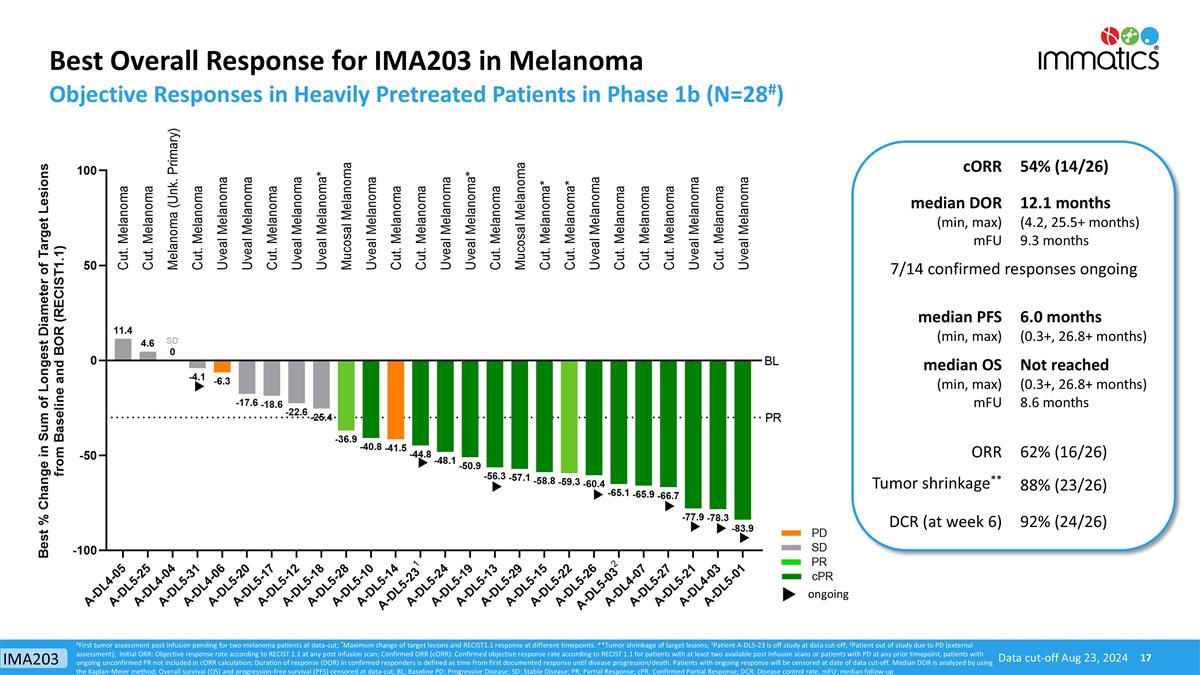
Best Overall Response for IMA203 in
Melanoma Objective Responses in Heavily Pretreated Patients in Phase 1b (N=28#) Data cut-off Aug 23, 2024 ongoing #First tumor assessment post infusion pending for two melanoma patients at data-cut; *Maximum change of target lesions and RECIST1.1
response at different timepoints. **Tumor shrinkage of target lesions; 1Patient A-DL5-23 is off study at data cut-off; 2Patient out of study due to PD (external assessment); Initial ORR: Objective response rate according to RECIST 1.1 at any post
infusion scan; Confirmed ORR (cORR): Confirmed objective response rate according to RECIST 1.1 for patients with at least two available post infusion scans or patients with PD at any prior timepoint, patients with ongoing unconfirmed PR not included
in cORR calculation; Duration of response (DOR) in confirmed responders is defined as time from first documented response until disease progression/death. Patients with ongoing response will be censored at date of data cut-off. Median DOR is
analyzed by using the Kaplan-Meier method; Overall survival (OS) and progression-free survival (PFS) censored at data-cut; BL: Baseline PD: Progressive Disease; SD: Stable Disease; PR: Partial Response; cPR: Confirmed Partial Response; DCR: Disease
control rate, mFU: median follow-up cORR 54% (14/26) median DOR (min, max) mFU 12.1 months (4.2, 25.5+ months) 9.3 months 7/14 confirmed responses ongoing median PFS (min, max) 6.0 months (0.3+, 26.8+ months) median OS (min, max) mFU Not reached
(0.3+, 26.8+ months) 8.6 months ORR 62% (16/26) Tumor shrinkage** 88% (23/26) DCR (at week 6) 92% (24/26) IMA203
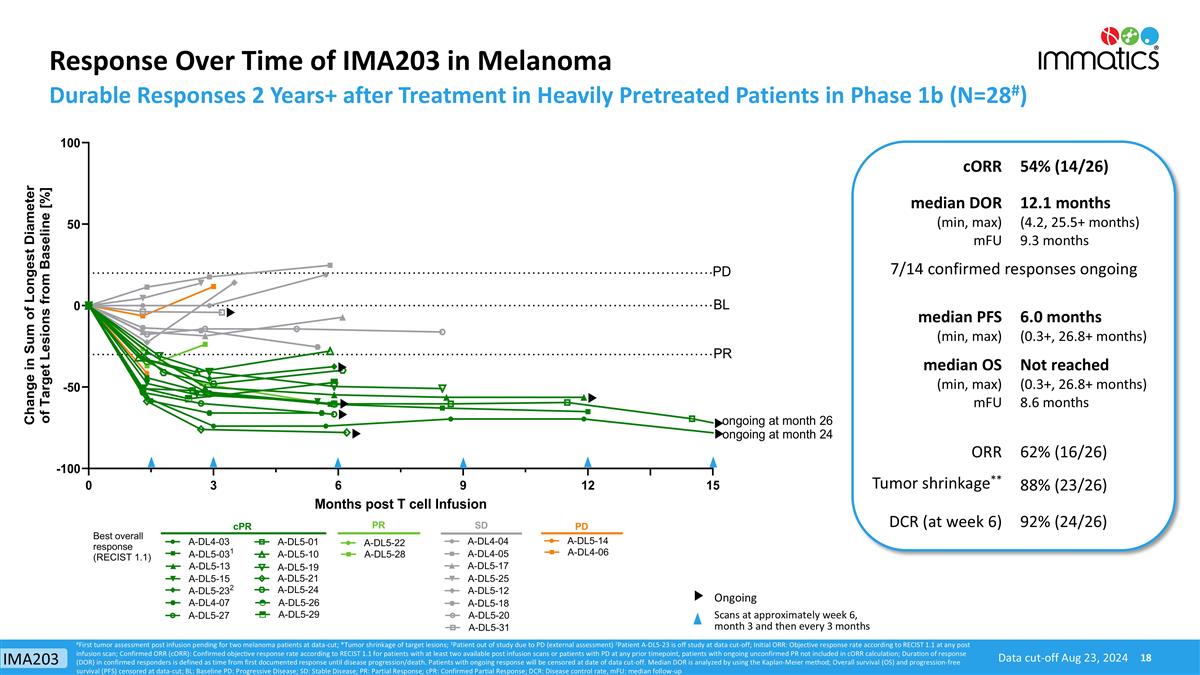
Response Over Time of IMA203 in
Melanoma Durable Responses 2 Years+ after Treatment in Heavily Pretreated Patients in Phase 1b (N=28#) Scans at approximately week 6, month 3 and then every 3 months Ongoing Data cut-off Aug 23, 2024 #First tumor assessment post infusion pending for
two melanoma patients at data-cut; *Tumor shrinkage of target lesions; 1Patient out of study due to PD (external assessment) 2Patient A-DL5-23 is off study at data cut-off; Initial ORR: Objective response rate according to RECIST 1.1 at any post
infusion scan; Confirmed ORR (cORR): Confirmed objective response rate according to RECIST 1.1 for patients with at least two available post infusion scans or patients with PD at any prior timepoint, patients with ongoing unconfirmed PR not included
in cORR calculation; Duration of response (DOR) in confirmed responders is defined as time from first documented response until disease progression/death. Patients with ongoing response will be censored at date of data cut-off. Median DOR is
analyzed by using the Kaplan-Meier method; Overall survival (OS) and progression-free survival (PFS) censored at data-cut; BL: Baseline PD: Progressive Disease; SD: Stable Disease; PR: Partial Response; cPR: Confirmed Partial Response; DCR: Disease
control rate, mFU: median follow-up cORR 54% (14/26) median DOR (min, max) mFU 12.1 months (4.2, 25.5+ months) 9.3 months 7/14 confirmed responses ongoing median PFS (min, max) 6.0 months (0.3+, 26.8+ months) median OS (min, max) mFU Not reached
(0.3+, 26.8+ months) 8.6 months ORR 62% (16/26) Tumor shrinkage** 88% (23/26) DCR (at week 6) 92% (24/26) IMA203
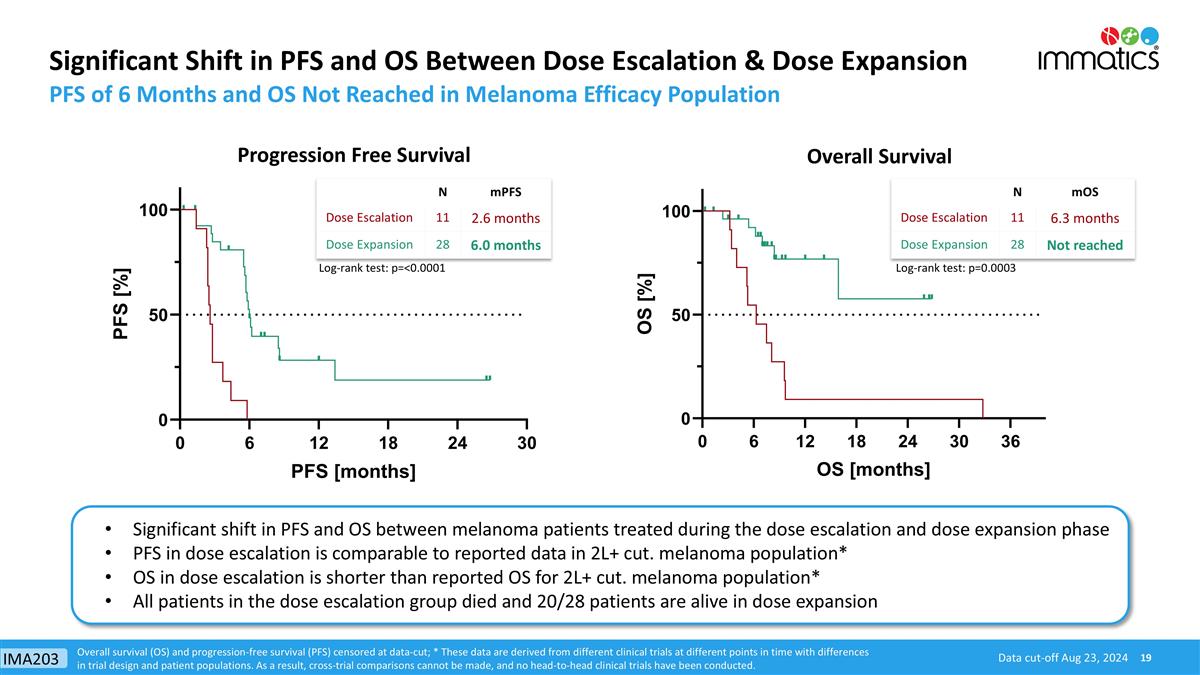
Significant Shift in PFS and OS
Between Dose Escalation & Dose Expansion PFS of 6 Months and OS Not Reached in Melanoma Efficacy Population Progression Free Survival Data cut-off Aug 23, 2024 Overall Survival Overall survival (OS) and progression-free survival (PFS) censored
at data-cut; * These data are derived from different clinical trials at different points in time with differences in trial design and patient populations. As a result, cross-trial comparisons cannot be made, and no head-to-head clinical trials have
been conducted. N mPFS Dose Escalation 11 2.6 months Dose Expansion 28 6.0 months N mOS Dose Escalation 11 6.3 months Dose Expansion 28 Not reached Log-rank test: p=<0.0001 Log-rank test: p=0.0003 Significant shift in PFS and OS between melanoma
patients treated during the dose escalation and dose expansion phase PFS in dose escalation is comparable to reported data in 2L+ cut. melanoma population* OS in dose escalation is shorter than reported OS for 2L+ cut. melanoma population* All
patients in the dose escalation group died and 20/28 patients are alive in dose expansion IMA203
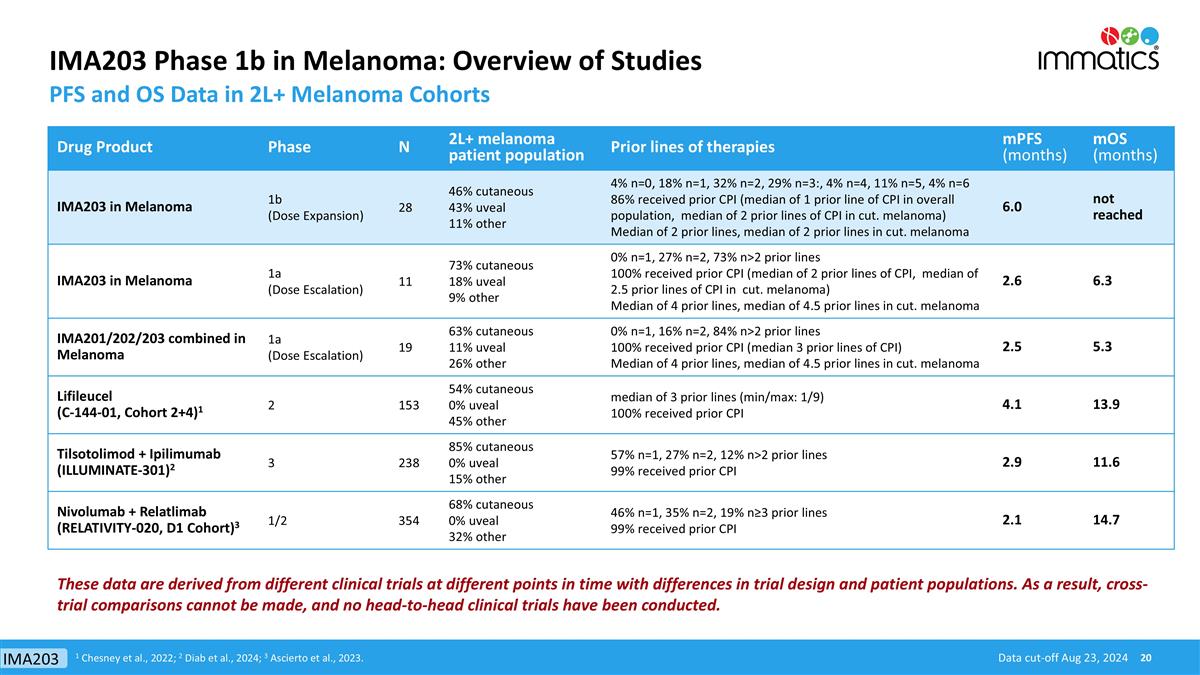
IMA203 Phase 1b in Melanoma:
Overview of Studies PFS and OS Data in 2L+ Melanoma Cohorts Drug Product Phase N 2L+ melanoma patient population Prior lines of therapies mPFS (months) mOS (months) IMA203 in Melanoma 1b (Dose Expansion) 28 46% cutaneous 43% uveal 11% other 4% n=0,
18% n=1, 32% n=2, 29% n=3:, 4% n=4, 11% n=5, 4% n=6 86% received prior CPI (median of 1 prior line of CPI in overall population, median of 2 prior lines of CPI in cut. melanoma) Median of 2 prior lines, median of 2 prior lines in cut. melanoma 6.0
not reached IMA203 in Melanoma 1a (Dose Escalation) 11 73% cutaneous 18% uveal 9% other 0% n=1, 27% n=2, 73% n>2 prior lines 100% received prior CPI (median of 2 prior lines of CPI, median of 2.5 prior lines of CPI in cut. melanoma) Median of 4
prior lines, median of 4.5 prior lines in cut. melanoma 2.6 6.3 IMA201/202/203 combined in Melanoma 1a (Dose Escalation) 19 63% cutaneous 11% uveal 26% other 0% n=1, 16% n=2, 84% n>2 prior lines 100% received prior CPI (median 3 prior lines of
CPI) Median of 4 prior lines, median of 4.5 prior lines in cut. melanoma 2.5 5.3 Lifileucel (C-144-01, Cohort 2+4)1 2 153 54% cutaneous 0% uveal 45% other median of 3 prior lines (min/max: 1/9) 100% received prior CPI 4.1 13.9 Tilsotolimod +
Ipilimumab (ILLUMINATE-301)2 3 238 85% cutaneous 0% uveal 15% other 57% n=1, 27% n=2, 12% n>2 prior lines 99% received prior CPI 2.9 11.6 Nivolumab + Relatlimab (RELATIVITY-020, D1 Cohort)3 1/2 354 68% cutaneous 0% uveal 32% other 46% n=1, 35%
n=2, 19% n≥3 prior lines 99% received prior CPI 2.1 14.7 Data cut-off Aug 23, 2024 1 Chesney et al., 2022; 2 Diab et al., 2024; 3 Ascierto et al., 2023. These data are derived from different clinical trials at different points in time with
differences in trial design and patient populations. As a result, cross-trial comparisons cannot be made, and no head-to-head clinical trials have been conducted. IMA203
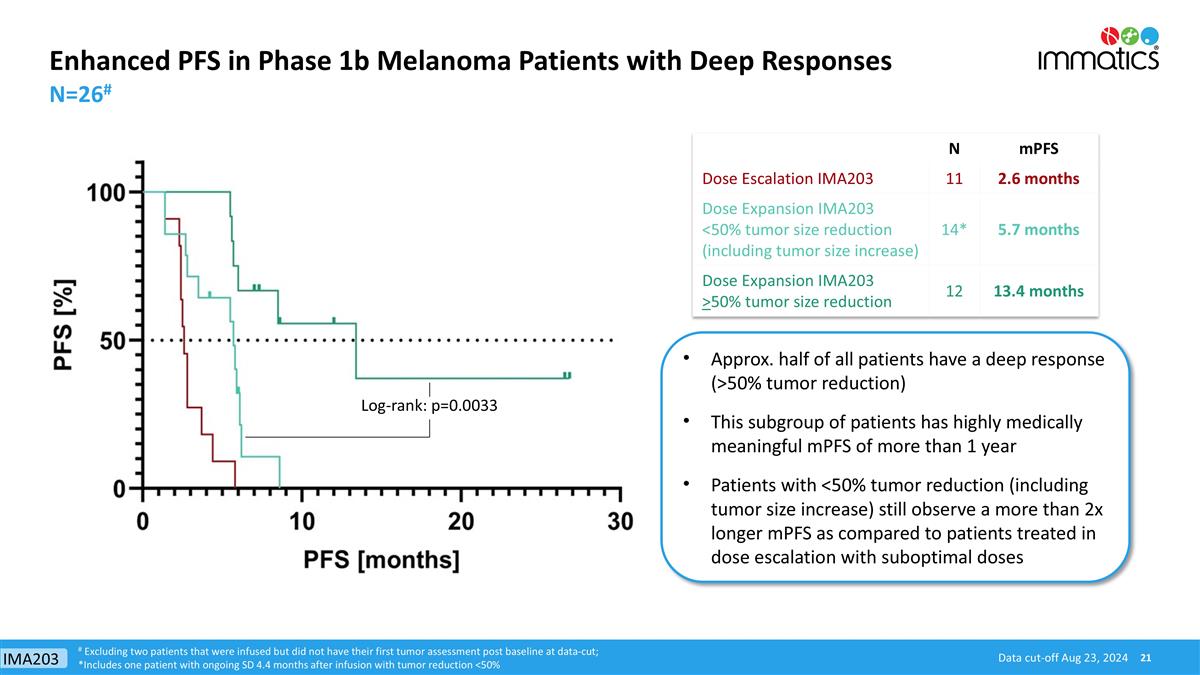
Enhanced PFS in Phase 1b Melanoma
Patients with Deep Responses N=26# Approx. half of all patients have a deep response (>50% tumor reduction) This subgroup of patients has highly medically meaningful mPFS of more than 1 year Patients with <50% tumor reduction (including tumor
size increase) still observe a more than 2x longer mPFS as compared to patients treated in dose escalation with suboptimal doses Data cut-off Aug 23, 2024 N mPFS Dose Escalation IMA203 11 2.6 months Dose Expansion IMA203 <50% tumor size reduction
(including tumor size increase) 14* 5.7 months Dose Expansion IMA203 >50% tumor size reduction 12 13.4 months # Excluding two patients that were infused but did not have their first tumor assessment post baseline at data-cut; *Includes one
patient with ongoing SD 4.4 months after infusion with tumor reduction <50% Log-rank: p=0.0033 IMA203
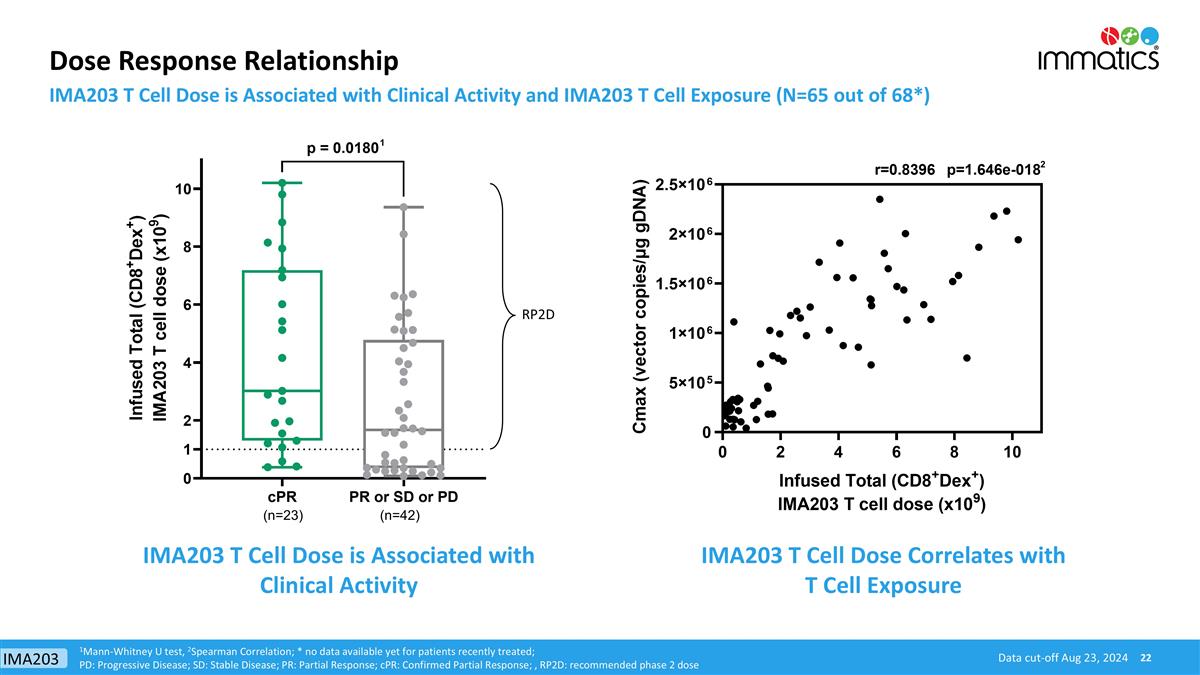
Dose Response Relationship IMA203 T
Cell Dose is Associated with Clinical Activity and IMA203 T Cell Exposure (N=65 out of 68*) RP2D (n=23) (n=42) IMA203 T Cell Dose is Associated with Clinical Activity IMA203 T Cell Dose Correlates with T Cell Exposure 1Mann-Whitney U test, 2Spearman
Correlation; * no data available yet for patients recently treated; PD: Progressive Disease; SD: Stable Disease; PR: Partial Response; cPR: Confirmed Partial Response; , RP2D: recommended phase 2 dose 1 2 Data cut-off Aug 23, 2024 IMA203
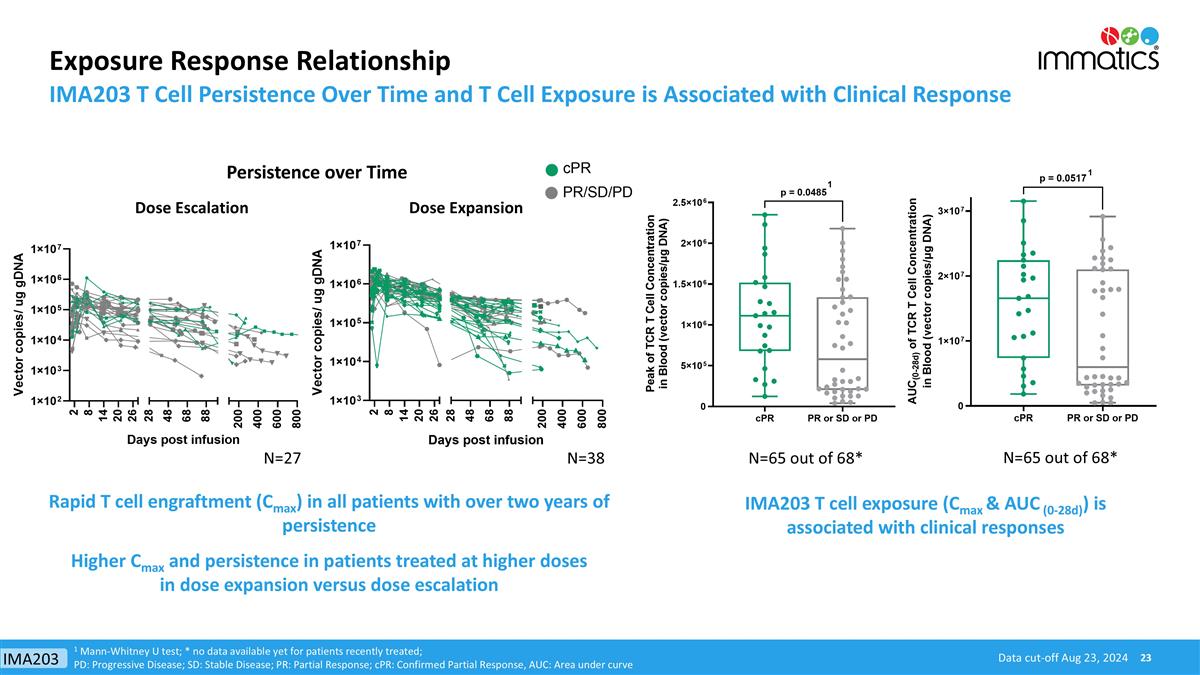
Exposure Response Relationship
IMA203 T Cell Persistence Over Time and T Cell Exposure is Associated with Clinical Response IMA203 T cell exposure (Cmax & AUC (0-28d)) is associated with clinical responses Rapid T cell engraftment (Cmax) in all patients with over two years of
persistence Higher Cmax and persistence in patients treated at higher doses in dose expansion versus dose escalation 1 Mann-Whitney U test; * no data available yet for patients recently treated; PD: Progressive Disease; SD: Stable Disease; PR:
Partial Response; cPR: Confirmed Partial Response, AUC: Area under curve Data cut-off Aug 23, 2024 1 1 N=65 out of 68* N=38 N=27 Persistence over Time Dose Escalation Dose Expansion N=65 out of 68* IMA203
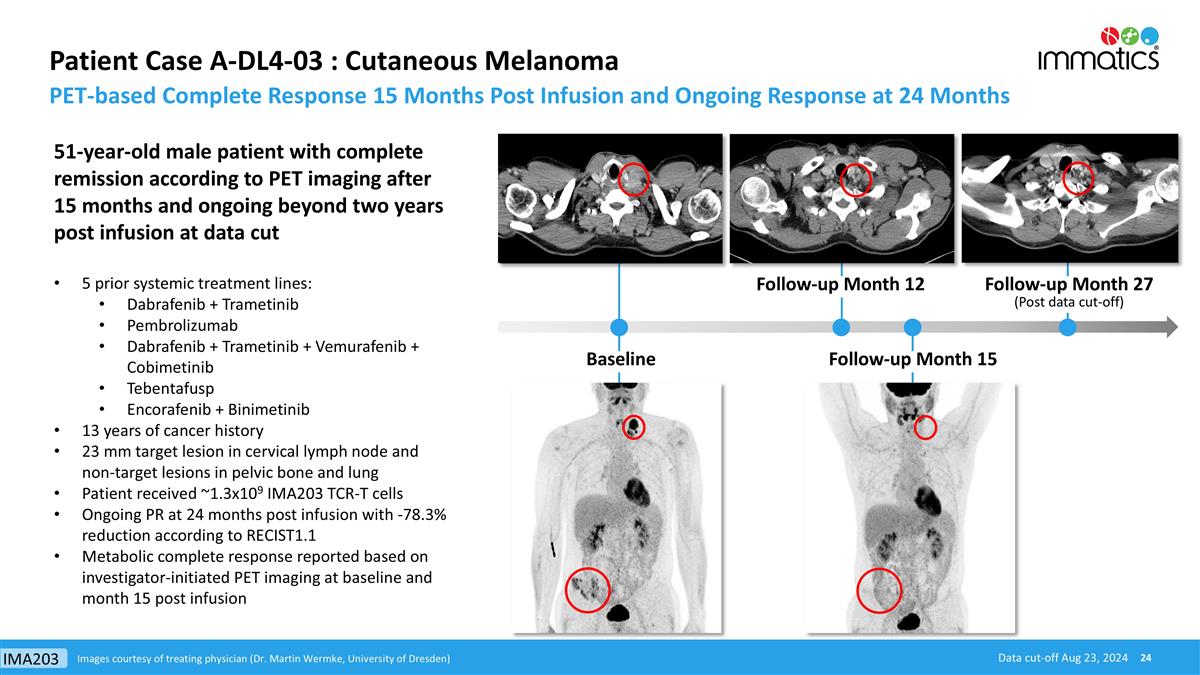
Patient Case A-DL4-03 : Cutaneous
Melanoma PET-based Complete Response 15 Months Post Infusion and Ongoing Response at 24 Months Images courtesy of treating physician (Dr. Martin Wermke, University of Dresden) 51-year-old male patient with complete remission according to PET imaging
after 15 months and ongoing beyond two years post infusion at data cut 5 prior systemic treatment lines: Dabrafenib + Trametinib Pembrolizumab Dabrafenib + Trametinib + Vemurafenib + Cobimetinib Tebentafusp Encorafenib + Binimetinib 13 years of
cancer history 23 mm target lesion in cervical lymph node and non-target lesions in pelvic bone and lung Patient received ~1.3x109 IMA203 TCR-T cells Ongoing PR at 24 months post infusion with -78.3% reduction according to RECIST1.1 Metabolic
complete response reported based on investigator-initiated PET imaging at baseline and month 15 post infusion Follow-up Month 15 Follow-up Month 27 (Post data cut-off) Baseline Follow-up Month 12 Data cut-off Aug 23, 2024 IMA203
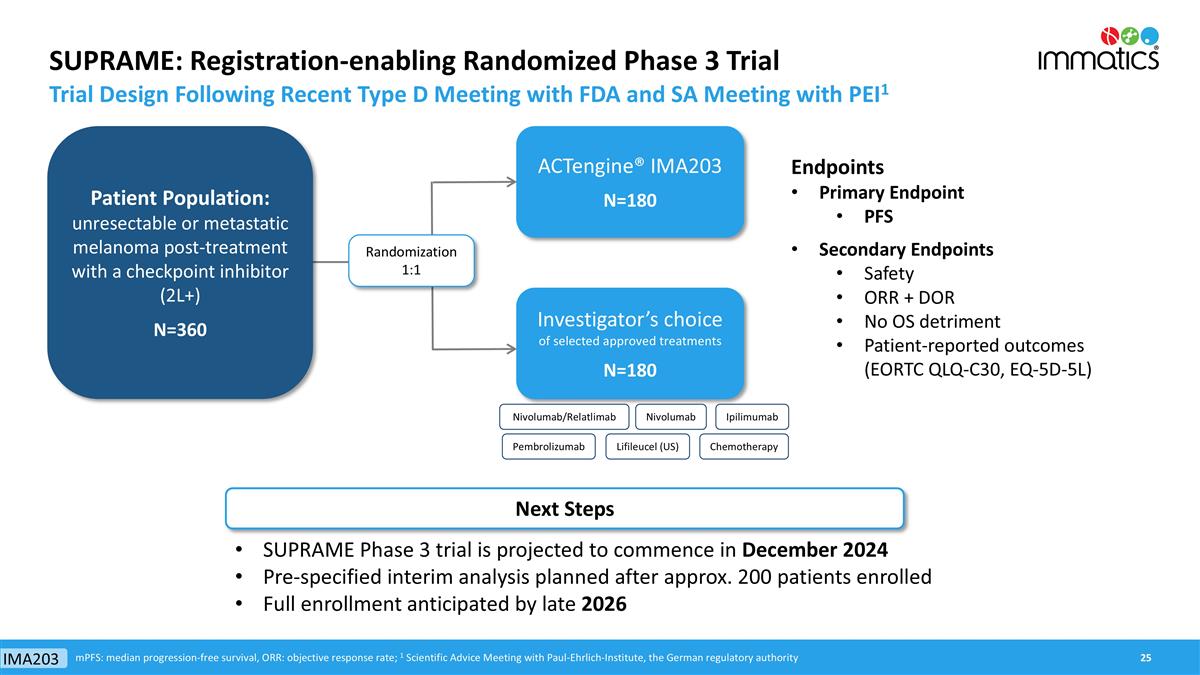
SUPRAME: Registration-enabling
Randomized Phase 3 Trial Trial Design Following Recent Type D Meeting with FDA and SA Meeting with PEI1 ACTengine® IMA203 N=180 Investigator’s choice of selected approved treatments N=180 Endpoints Primary Endpoint PFS Secondary
Endpoints Safety ORR + DOR No OS detriment Patient-reported outcomes (EORTC QLQ-C30, EQ-5D-5L) mPFS: median progression-free survival, ORR: objective response rate; 1 Scientific Advice Meeting with Paul-Ehrlich-Institute, the German regulatory
authority Randomization 1:1 SUPRAME Phase 3 trial is projected to commence in December 2024 Pre-specified interim analysis planned after approx. 200 patients enrolled Full enrollment anticipated by late 2026 Next Steps Patient Population:
unresectable or metastatic melanoma post-treatment with a checkpoint inhibitor (2L+) N=360 IMA203 Nivolumab/Relatlimab Nivolumab Pembrolizumab Ipilimumab Chemotherapy Lifileucel (US)
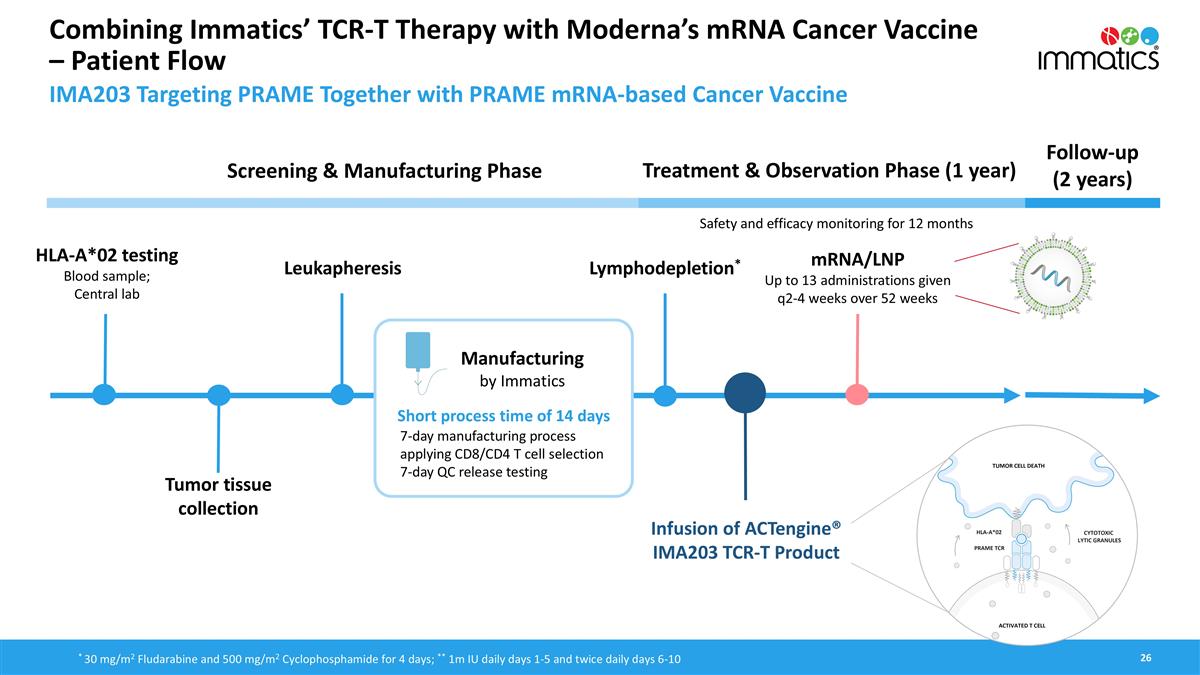
Combining Immatics’ TCR-T
Therapy with Moderna’s mRNA Cancer Vaccine – Patient Flow HLA-A*02 testing Blood sample; Central lab Treatment & Observation Phase (1 year) Follow-up (2 years) Screening & Manufacturing Phase Manufacturing by Immatics Infusion of
ACTengine® IMA203 TCR-T Product Lymphodepletion* mRNA/LNP Up to 13 administrations given q2-4 weeks over 52 weeks Safety and efficacy monitoring for 12 months Leukapheresis Short process time of 14 days * 30 mg/m2 Fludarabine and 500 mg/m2
Cyclophosphamide for 4 days; ** 1m IU daily days 1-5 and twice daily days 6-10 7-day manufacturing process applying CD8/CD4 T cell selection 7-day QC release testing IMA203 Targeting PRAME Together with PRAME mRNA-based Cancer Vaccine Tumor tissue
collection
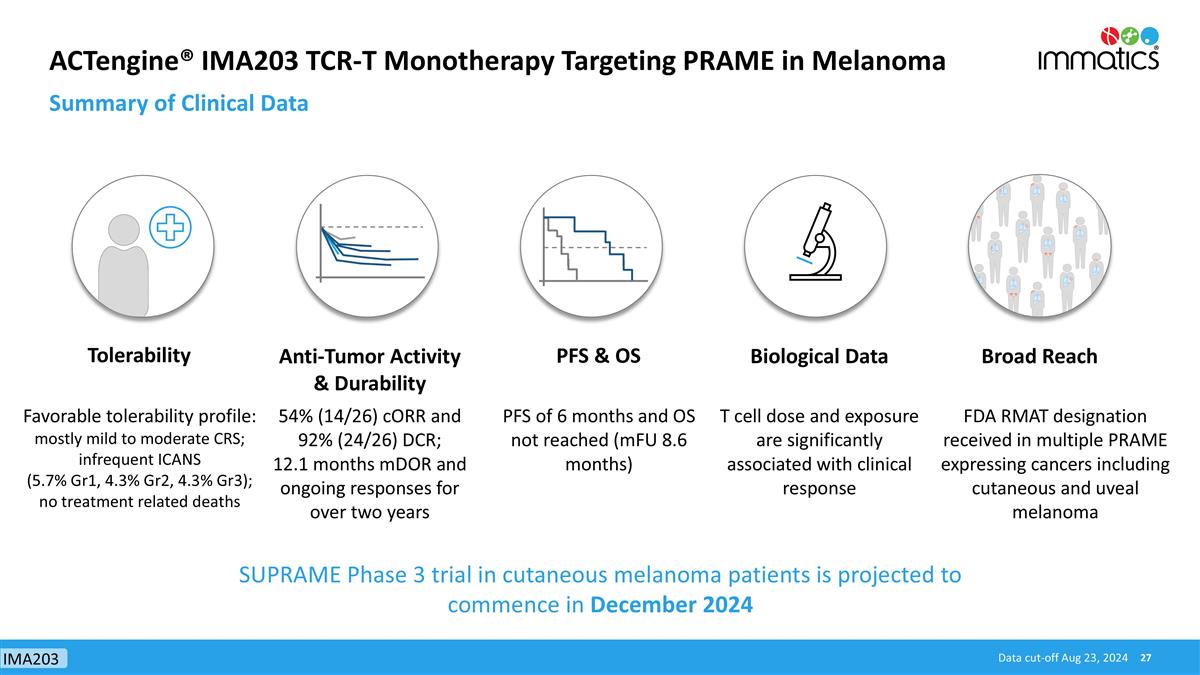
ACTengine® IMA203 TCR-T
Monotherapy Targeting PRAME in Melanoma Summary of Clinical Data Tolerability Anti-Tumor Activity & Durability PFS & OS Biological Data Broad Reach Favorable tolerability profile: mostly mild to moderate CRS; infrequent ICANS (5.7% Gr1, 4.3%
Gr2, 4.3% Gr3); no treatment related deaths 54% (14/26) cORR and 92% (24/26) DCR; 12.1 months mDOR and ongoing responses for over two years PFS of 6 months and OS not reached (mFU 8.6 months) T cell dose and exposure are significantly associated
with clinical response FDA RMAT designation received in multiple PRAME expressing cancers including cutaneous and uveal melanoma Data cut-off Aug 23, 2024 SUPRAME Phase 3 trial in cutaneous melanoma patients is projected to commence in December 2024
IMA203
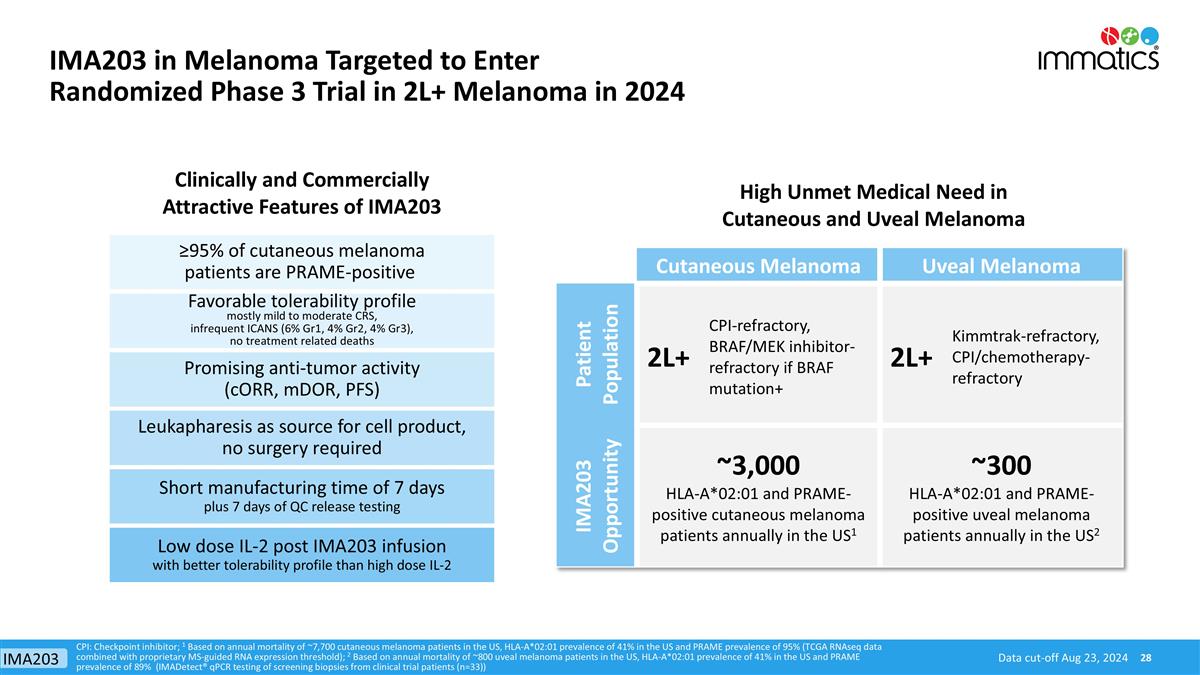
High Unmet Medical Need in
Cutaneous and Uveal Melanoma Clinically and Commercially Attractive Features of IMA203 Cutaneous Melanoma Uveal Melanoma Patient Population 2L+ CPI-refractory, BRAF/MEK inhibitor-refractory if BRAF mutation+ 2L+ Kimmtrak-refractory,
CPI/chemotherapy-refractory IMA203 Opportunity ~3,000 HLA-A*02:01 and PRAME-positive cutaneous melanoma patients annually in the US1 ~300 HLA-A*02:01 and PRAME-positive uveal melanoma patients annually in the US2 Favorable tolerability profile
mostly mild to moderate CRS, infrequent ICANS (6% Gr1, 4% Gr2, 4% Gr3), no treatment related deaths Promising anti-tumor activity (cORR, mDOR, PFS) Leukapharesis as source for cell product, no surgery required Short manufacturing time of 7 days plus
7 days of QC release testing Low dose IL-2 post IMA203 infusion with better tolerability profile than high dose IL-2 CPI: Checkpoint inhibitor; 1 Based on annual mortality of ~7,700 cutaneous melanoma patients in the US, HLA-A*02:01 prevalence of
41% in the US and PRAME prevalence of 95% (TCGA RNAseq data combined with proprietary MS-guided RNA expression threshold); 2 Based on annual mortality of ~800 uveal melanoma patients in the US, HLA-A*02:01 prevalence of 41% in the US and PRAME
prevalence of 89% (IMADetect® qPCR testing of screening biopsies from clinical trial patients (n=33)) ≥95% of cutaneous melanoma patients are PRAME-positive Data cut-off Aug 23, 2024 IMA203 in Melanoma Targeted to Enter Randomized
Phase 3 Trial in 2L+ Melanoma in 2024 IMA203
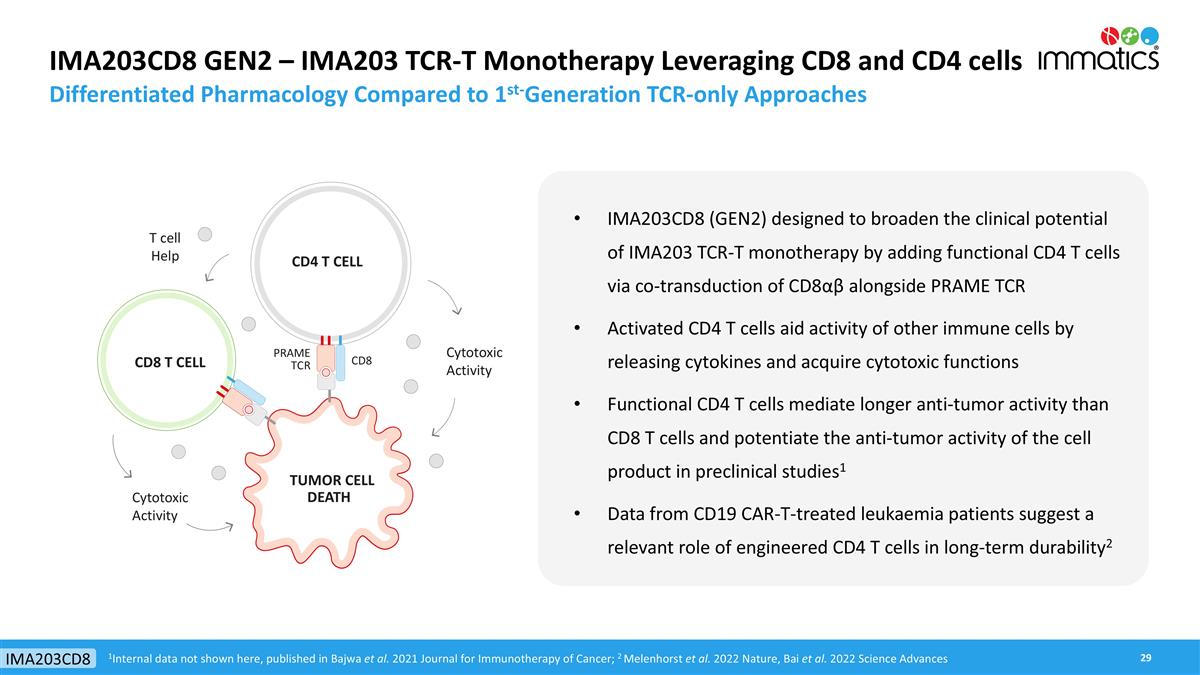
IMA203CD8 GEN2 – IMA203 TCR-T
Monotherapy Leveraging CD8 and CD4 cells Differentiated Pharmacology Compared to 1st-Generation TCR-only Approaches IMA203CD8 (GEN2) designed to broaden the clinical potential of IMA203 TCR-T monotherapy by adding functional CD4 T cells via
co-transduction of CD8αβ alongside PRAME TCR Activated CD4 T cells aid activity of other immune cells by releasing cytokines and acquire cytotoxic functions Functional CD4 T cells mediate longer anti-tumor activity than CD8 T cells and
potentiate the anti-tumor activity of the cell product in preclinical studies1 Data from CD19 CAR-T-treated leukaemia patients suggest a relevant role of engineered CD4 T cells in long-term durability2 TUMOR CELL DEATH CD4 T CELL Cytotoxic Activity
CD8 T CELL T cell Help Cytotoxic Activity 1Internal data not shown here, published in Bajwa et al. 2021 Journal for Immunotherapy of Cancer; 2 Melenhorst et al. 2022 Nature, Bai et al. 2022 Science Advances CD8 PRAME TCR IMA203CD8
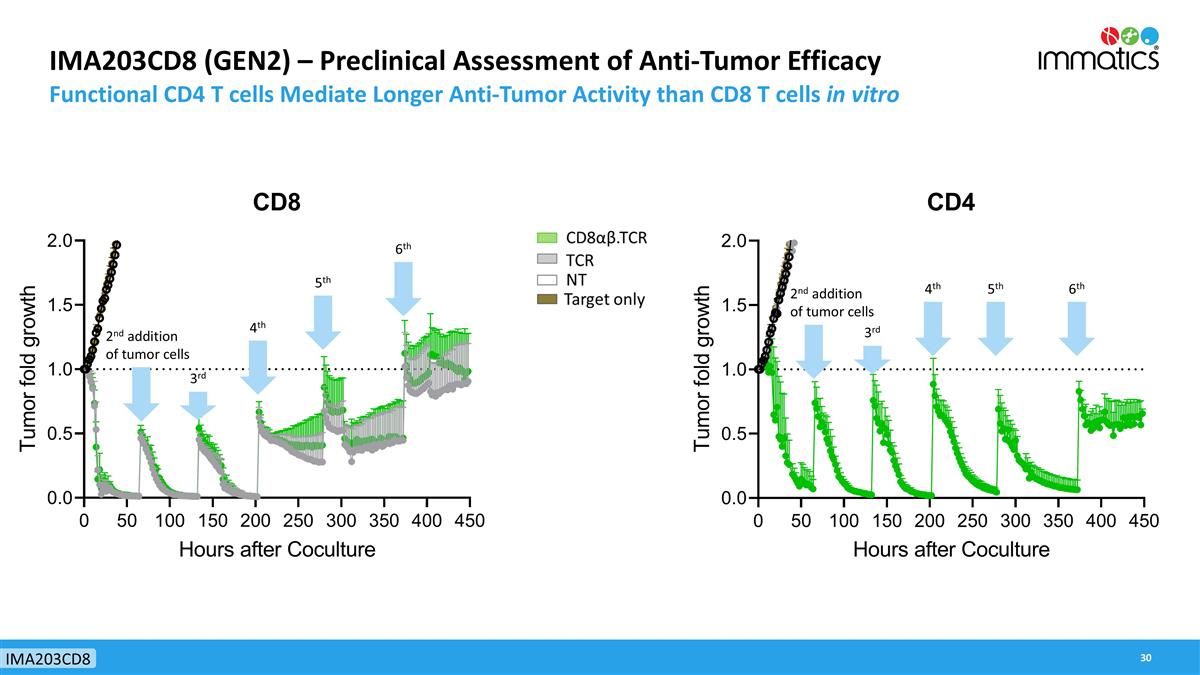
IMA203CD8 (GEN2) –
Preclinical Assessment of Anti-Tumor Efficacy Functional CD4 T cells Mediate Longer Anti-Tumor Activity than CD8 T cells in vitro 2nd addition of tumor cells 3rd 4th 5th 6th 2nd addition of tumor cells 3rd 4th 5th 6th IMA203CD8
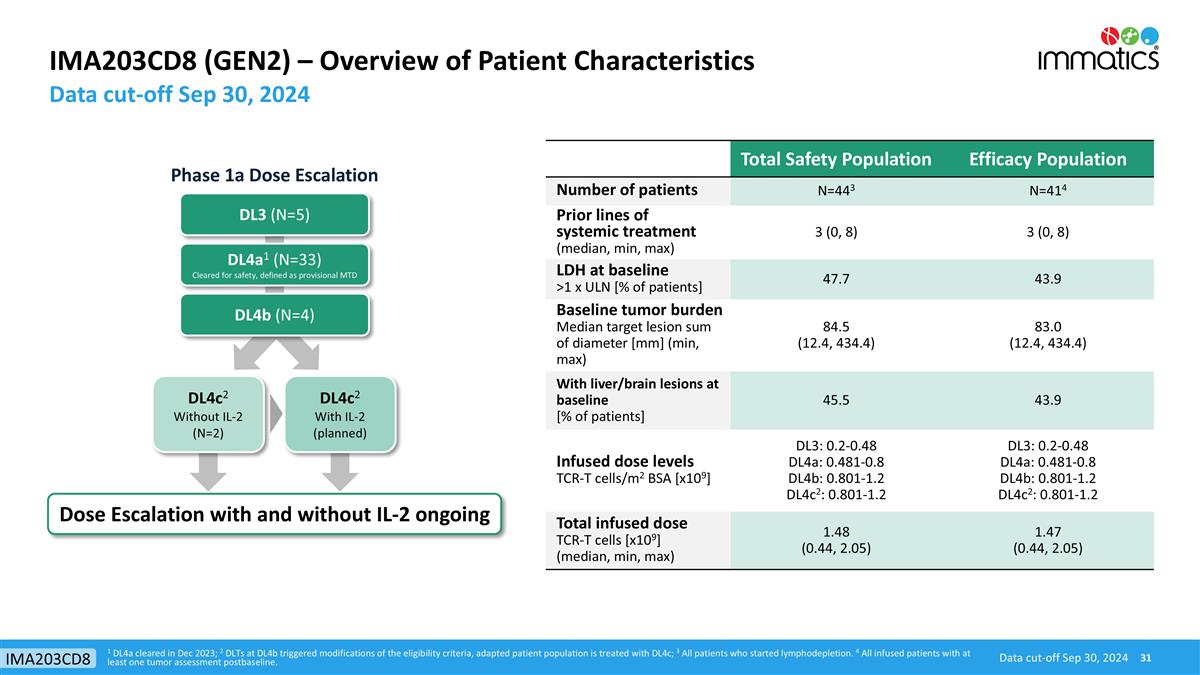
IMA203CD8 (GEN2) – Overview
of Patient Characteristics 1 DL4a cleared in Dec 2023; 2 DLTs at DL4b triggered modifications of the eligibility criteria, adapted patient population is treated with DL4c; 3 All patients who started lymphodepletion. 4 All infused patients with at
least one tumor assessment postbaseline. Data cut-off Sep 30, 2024 Data cut-off Sep 30, 2024 IMA203CD8 DL3 (N=5) DL4a1 (N=33) Cleared for safety, defined as provisional MTD Dose Escalation with and without IL-2 ongoing DL4b (N=4) DL4c2 Without IL-2
(N=2) DL4c2 With IL-2 (planned) Phase 1a Dose Escalation Total Safety Population Efficacy Population Number of patients N=443 N=414 Prior lines of systemic treatment (median, min, max) 3 (0, 8) 3 (0, 8) LDH at baseline >1 x ULN [% of patients]
47.7 43.9 Baseline tumor burden Median target lesion sum of diameter [mm] (min, max) 84.5 (12.4, 434.4) 83.0 (12.4, 434.4) With liver/brain lesions at baseline [% of patients] 45.5 43.9 Infused dose levels TCR-T cells/m2 BSA [x109] DL3:
0.2-0.48 DL4a: 0.481-0.8 DL4b: 0.801-1.2 DL4c2: 0.801-1.2 DL3: 0.2-0.48 DL4a: 0.481-0.8 DL4b: 0.801-1.2 DL4c2: 0.801-1.2 Total infused dose TCR-T cells [x109] (median, min, max) 1.48 (0.44, 2.05) 1.47 (0.44, 2.05)
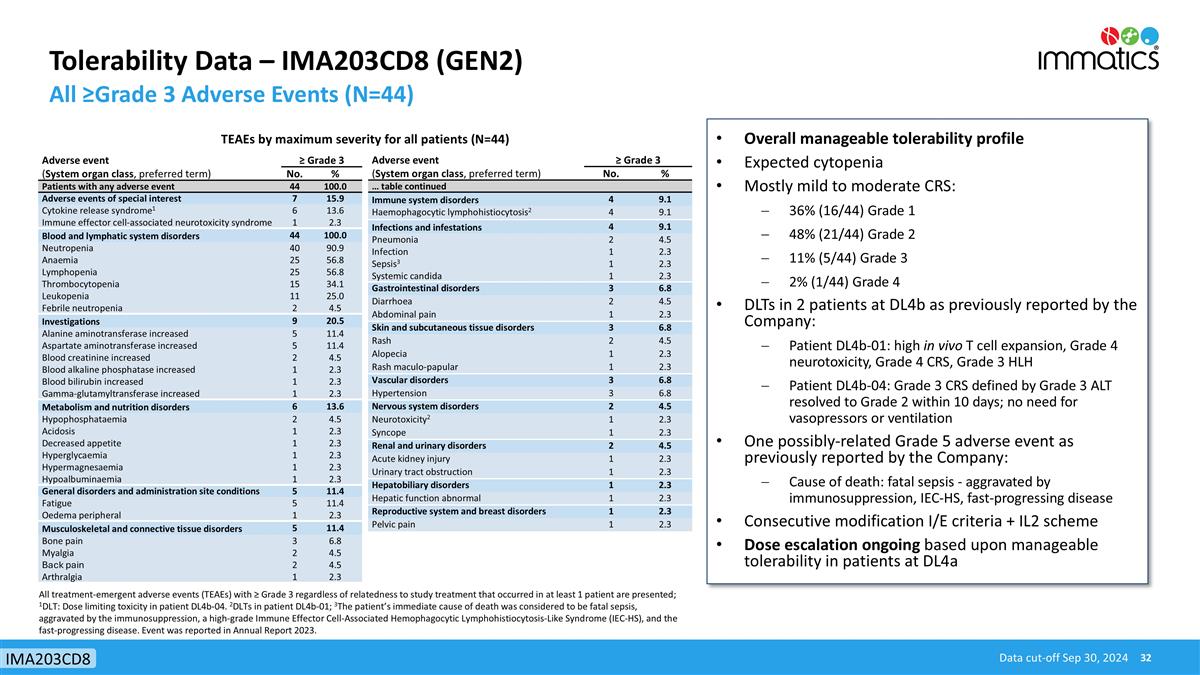
Tolerability Data – IMA203CD8
(GEN2) All ≥Grade 3 Adverse Events (N=44) Data cut-off Sep 30, 2024 IMA203CD8 Adverse event ≥ Grade 3 (System organ class, preferred term) No. % Patients with any adverse event 44 100.0 Adverse events of special interest 7 15.9 Cytokine
release syndrome1 6 13.6 Immune effector cell-associated neurotoxicity syndrome 1 2.3 Blood and lymphatic system disorders 44 100.0 Neutropenia 40 90.9 Anaemia 25 56.8 Lymphopenia 25 56.8 Thrombocytopenia 15 34.1 Leukopenia 11 25.0 Febrile
neutropenia 2 4.5 Investigations 9 20.5 Alanine aminotransferase increased 5 11.4 Aspartate aminotransferase increased 5 11.4 Blood creatinine increased 2 4.5 Blood alkaline phosphatase increased 1 2.3 Blood bilirubin increased 1 2.3
Gamma-glutamyltransferase increased 1 2.3 Metabolism and nutrition disorders 6 13.6 Hypophosphataemia 2 4.5 Acidosis 1 2.3 Decreased appetite 1 2.3 Hyperglycaemia 1 2.3 Hypermagnesaemia 1 2.3 Hypoalbuminaemia 1 2.3 General disorders and
administration site conditions 5 11.4 Fatigue 5 11.4 Oedema peripheral 1 2.3 Musculoskeletal and connective tissue disorders 5 11.4 Bone pain 3 6.8 Myalgia 2 4.5 Back pain 2 4.5 Arthralgia 1 2.3 TEAEs by maximum severity for all patients (N=44)
Adverse event ≥ Grade 3 (System organ class, preferred term) No. % … table continued Immune system disorders 4 9.1 Haemophagocytic lymphohistiocytosis2 4 9.1 Infections and infestations 4 9.1 Pneumonia 2 4.5 Infection 1 2.3 Sepsis3 1 2.3
Systemic candida 1 2.3 Gastrointestinal disorders 3 6.8 Diarrhoea 2 4.5 Abdominal pain 1 2.3 Skin and subcutaneous tissue disorders 3 6.8 Rash 2 4.5 Alopecia 1 2.3 Rash maculo-papular 1 2.3 Vascular disorders 3 6.8 Hypertension 3 6.8 Nervous system
disorders 2 4.5 Neurotoxicity2 1 2.3 Syncope 1 2.3 Renal and urinary disorders 2 4.5 Acute kidney injury 1 2.3 Urinary tract obstruction 1 2.3 Hepatobiliary disorders 1 2.3 Hepatic function abnormal 1 2.3 Reproductive system and breast disorders 1
2.3 Pelvic pain 1 2.3 All treatment-emergent adverse events (TEAEs) with ≥ Grade 3 regardless of relatedness to study treatment that occurred in at least 1 patient are presented; 1DLT: Dose limiting toxicity in patient DL4b-04. 2DLTs in
patient DL4b-01; 3The patient’s immediate cause of death was considered to be fatal sepsis, aggravated by the immunosuppression, a high-grade Immune Effector Cell-Associated Hemophagocytic Lymphohistiocytosis-Like Syndrome (IEC-HS), and the
fast-progressing disease. Event was reported in Annual Report 2023. Overall manageable tolerability profile Expected cytopenia Mostly mild to moderate CRS: 36% (16/44) Grade 1 48% (21/44) Grade 2 11% (5/44) Grade 3 2% (1/44) Grade 4 DLTs in 2
patients at DL4b as previously reported by the Company: Patient DL4b-01: high in vivo T cell expansion, Grade 4 neurotoxicity, Grade 4 CRS, Grade 3 HLH Patient DL4b-04: Grade 3 CRS defined by Grade 3 ALT resolved to Grade 2 within 10 days; no need
for vasopressors or ventilation One possibly-related Grade 5 adverse event as previously reported by the Company: Cause of death: fatal sepsis - aggravated by immunosuppression, IEC-HS, fast-progressing disease Consecutive modification I/E criteria
+ IL2 scheme Dose escalation ongoing based upon manageable tolerability in patients at DL4a
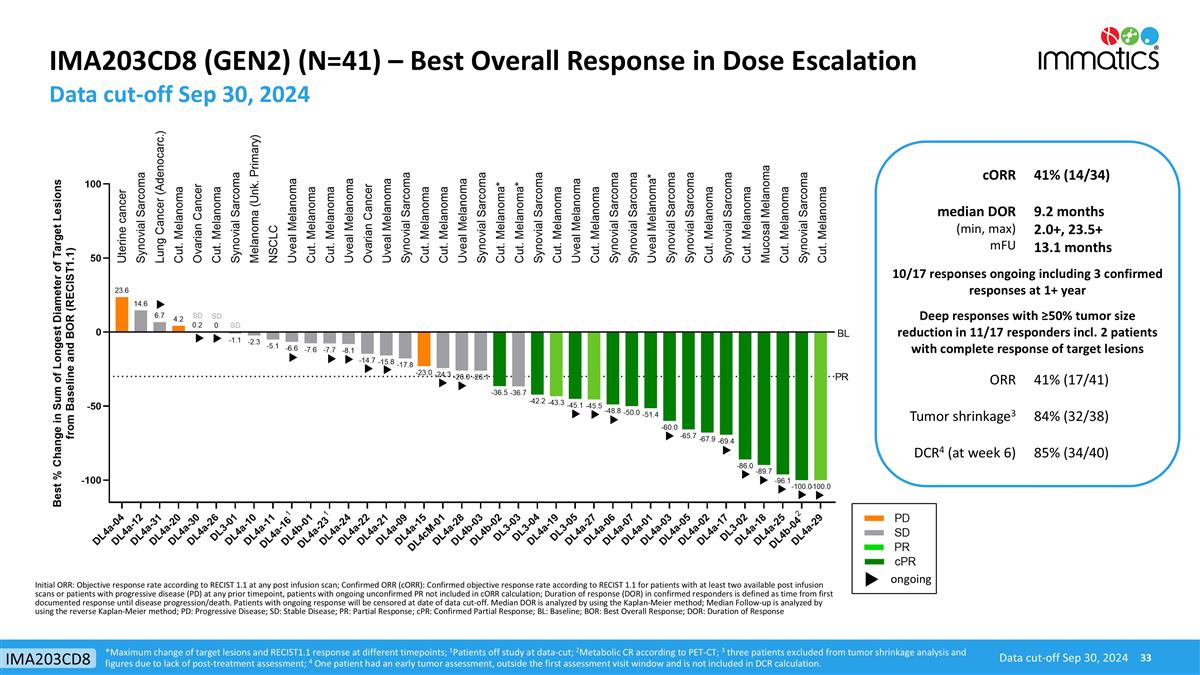
IMA203CD8 (GEN2) (N=41) –
Best Overall Response in Dose Escalation Data cut-off Sep 30, 2024 Data cut-off Sep 30, 2024 IMA203CD8 cORR 41% (14/34) median DOR (min, max) mFU 9.2 months 2.0+, 23.5+ 13.1 months 10/17 responses ongoing including 3 confirmed responses at 1+ year
Deep responses with ≥50% tumor size reduction in 11/17 responders incl. 2 patients with complete response of target lesions ORR 41% (17/41) Tumor shrinkage3 84% (32/38) DCR4 (at week 6) 85% (34/40) ongoing *Maximum change of target lesions and
RECIST1.1 response at different timepoints; 1Patients off study at data-cut; 2Metabolic CR according to PET-CT; 3 three patients excluded from tumor shrinkage analysis and figures due to lack of post-treatment assessment; 4 One patient had an early
tumor assessment, outside the first assessment visit window and is not included in DCR calculation. Initial ORR: Objective response rate according to RECIST 1.1 at any post infusion scan; Confirmed ORR (cORR): Confirmed objective response rate
according to RECIST 1.1 for patients with at least two available post infusion scans or patients with progressive disease (PD) at any prior timepoint, patients with ongoing unconfirmed PR not included in cORR calculation; Duration of response (DOR)
in confirmed responders is defined as time from first documented response until disease progression/death. Patients with ongoing response will be censored at date of data cut-off. Median DOR is analyzed by using the Kaplan-Meier method; Median
Follow-up is analyzed by using the reverse Kaplan-Meier method; PD: Progressive Disease; SD: Stable Disease; PR: Partial Response; cPR: Confirmed Partial Response; BL: Baseline; BOR: Best Overall Response; DOR: Duration of Response
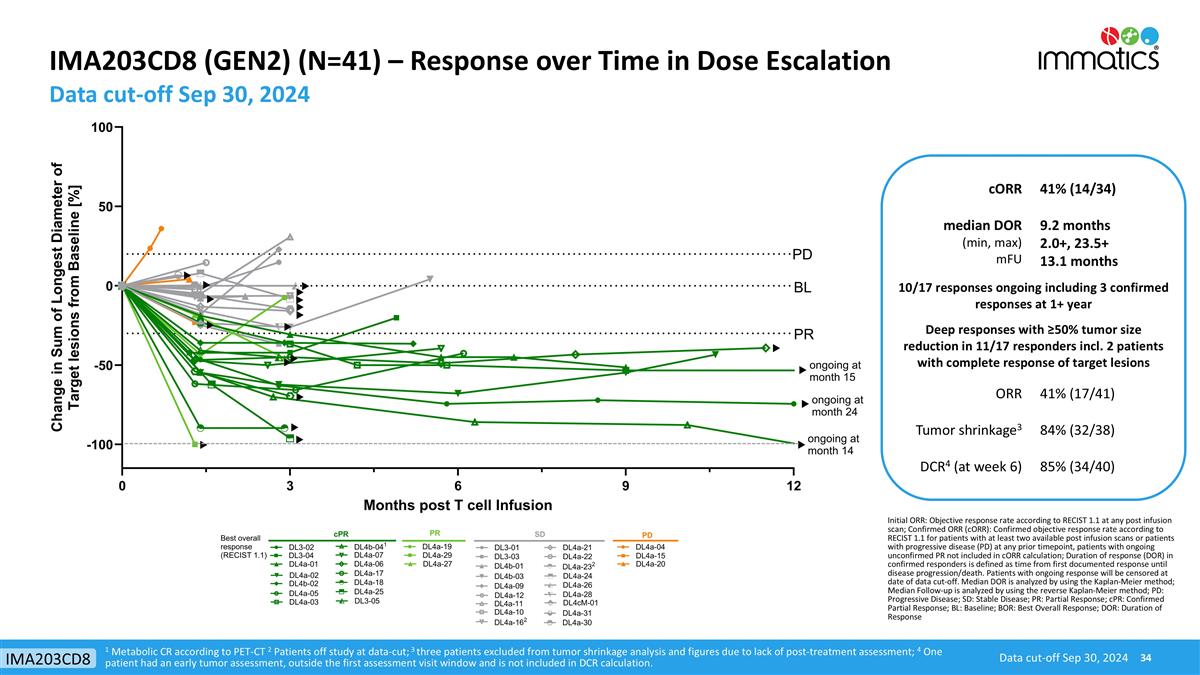
IMA203CD8 (GEN2) (N=41) –
Response over Time in Dose Escalation Data cut-off Sep 30, 2024 Data cut-off Sep 30, 2024 IMA203CD8 1 Metabolic CR according to PET-CT 2 Patients off study at data-cut; 3 three patients excluded from tumor shrinkage analysis and figures due to lack
of post-treatment assessment; 4 One patient had an early tumor assessment, outside the first assessment visit window and is not included in DCR calculation. cORR 41% (14/34) median DOR (min, max) mFU 9.2 months 2.0+, 23.5+ 13.1 months 10/17
responses ongoing including 3 confirmed responses at 1+ year Deep responses with ≥50% tumor size reduction in 11/17 responders incl. 2 patients with complete response of target lesions ORR 41% (17/41) Tumor shrinkage3 84% (32/38) DCR4 (at week
6) 85% (34/40) Initial ORR: Objective response rate according to RECIST 1.1 at any post infusion scan; Confirmed ORR (cORR): Confirmed objective response rate according to RECIST 1.1 for patients with at least two available post infusion scans or
patients with progressive disease (PD) at any prior timepoint, patients with ongoing unconfirmed PR not included in cORR calculation; Duration of response (DOR) in confirmed responders is defined as time from first documented response until disease
progression/death. Patients with ongoing response will be censored at date of data cut-off. Median DOR is analyzed by using the Kaplan-Meier method; Median Follow-up is analyzed by using the reverse Kaplan-Meier method; PD: Progressive Disease; SD:
Stable Disease; PR: Partial Response; cPR: Confirmed Partial Response; BL: Baseline; BOR: Best Overall Response; DOR: Duration of Response
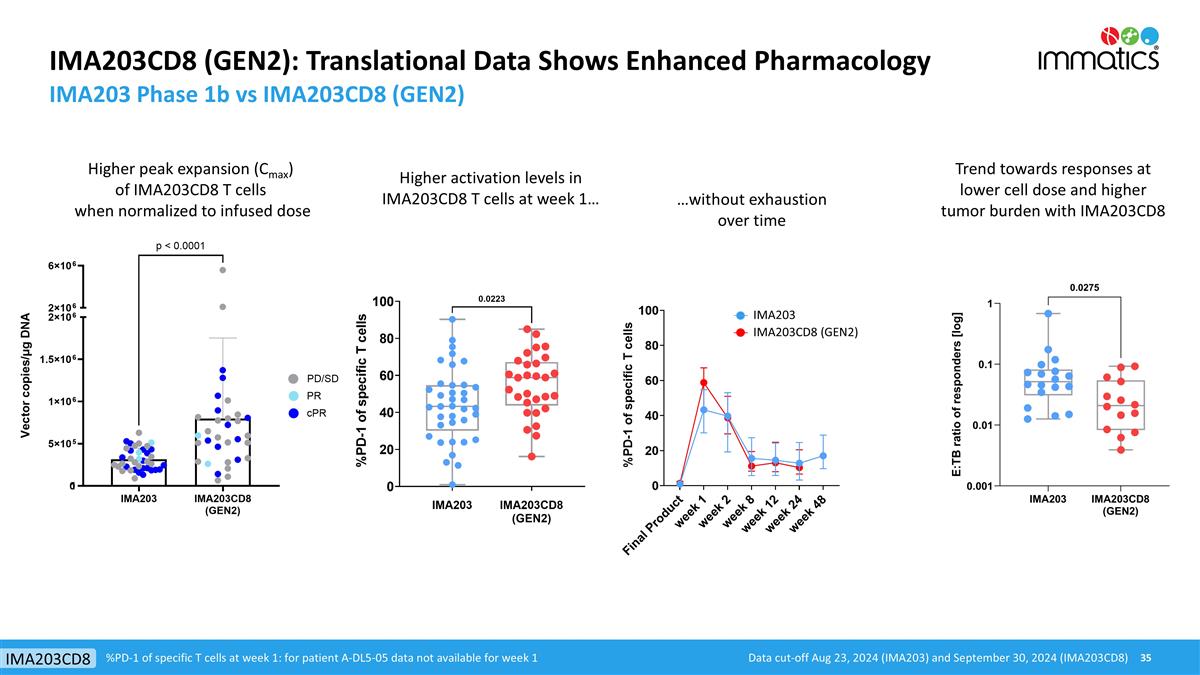
IMA203CD8 (GEN2): Translational
Data Shows Enhanced Pharmacology IMA203 Phase 1b vs IMA203CD8 (GEN2) Trend towards responses at lower cell dose and higher tumor burden with IMA203CD8 Higher peak expansion (Cmax) of IMA203CD8 T cells when normalized to infused dose Higher
activation levels in IMA203CD8 T cells at week 1… …without exhaustion over time %PD-1 of specific T cells at week 1: for patient A-DL5-05 data not available for week 1 Data cut-off Aug 23, 2024 (IMA203) and September 30, 2024 (IMA203CD8)
IMA203CD8 IMA203 IMA203CD8 (GEN2)
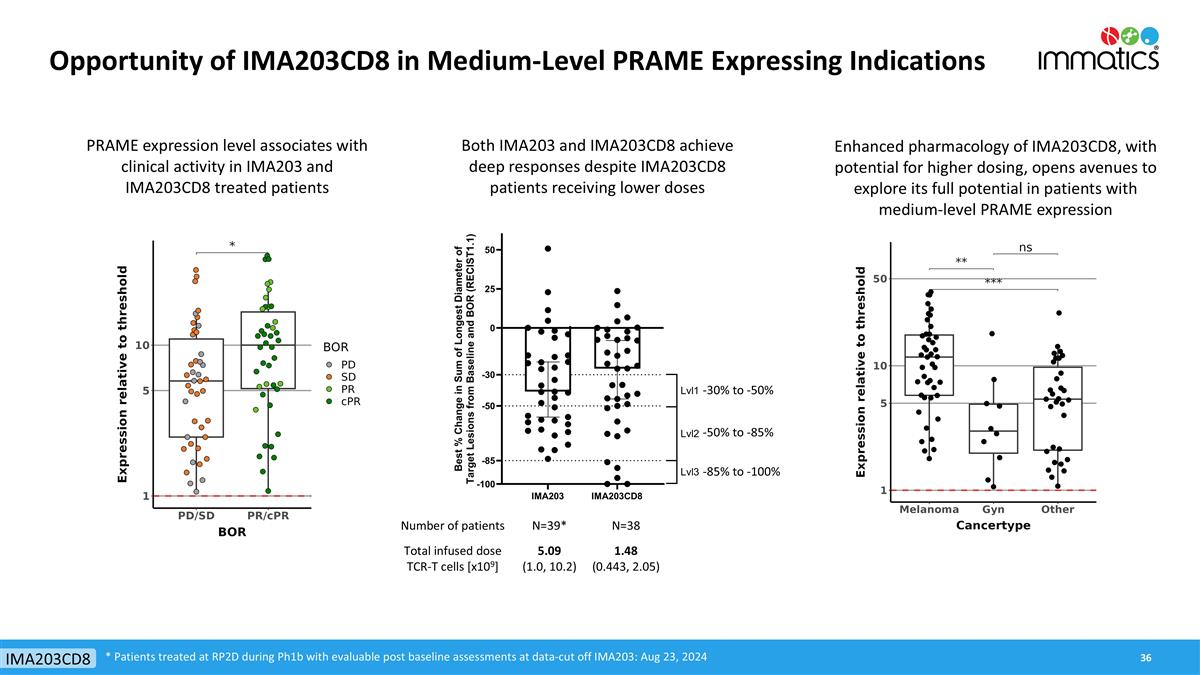
Opportunity of IMA203CD8 in
Medium-Level PRAME Expressing Indications * Patients treated at RP2D during Ph1b with evaluable post baseline assessments at data-cut off IMA203: Aug 23, 2024 IMA203CD8 PRAME expression level associates with clinical activity in IMA203 and IMA203CD8
treated patients Enhanced pharmacology of IMA203CD8, with potential for higher dosing, opens avenues to explore its full potential in patients with medium-level PRAME expression Both IMA203 and IMA203CD8 achieve deep responses despite IMA203CD8
patients receiving lower doses Number of patients N=39* N=38 Total infused dose TCR-T cells [x109] 5.09 (1.0, 10.2) 1.48 (0.443, 2.05) -30% to -50% -50% to -85% -85% to -100%
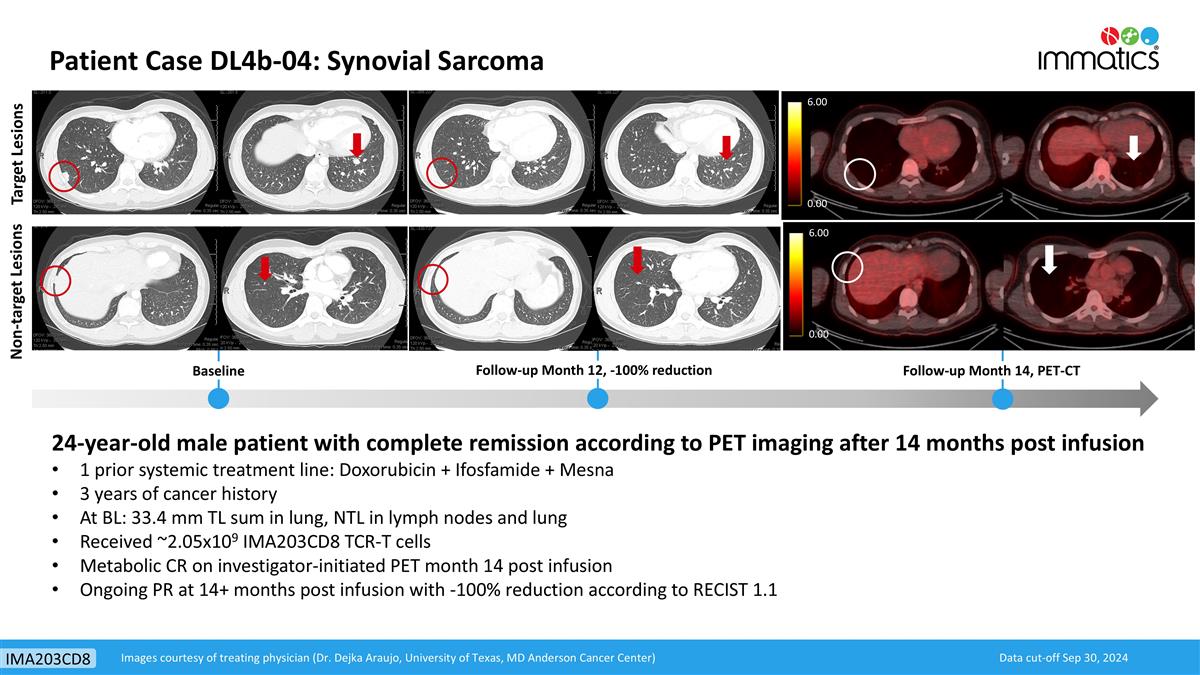
Non-target Lesions Target Lesions
Baseline Follow-up Month 12, -100% reduction 24-year-old male patient with complete remission according to PET imaging after 14 months post infusion 1 prior systemic treatment line: Doxorubicin + Ifosfamide + Mesna 3 years of cancer history At BL:
33.4 mm TL sum in lung, NTL in lymph nodes and lung Received ~2.05x109 IMA203CD8 TCR-T cells Metabolic CR on investigator-initiated PET month 14 post infusion Ongoing PR at 14+ months post infusion with -100% reduction according to RECIST 1.1
Follow-up Month 14, PET-CT 6.00 0.00 6.00 0.00 Data cut-off Sep 30, 2024 Images courtesy of treating physician (Dr. Dejka Araujo, University of Texas, MD Anderson Cancer Center) Patient Case DL4b-04: Synovial Sarcoma IMA203CD8
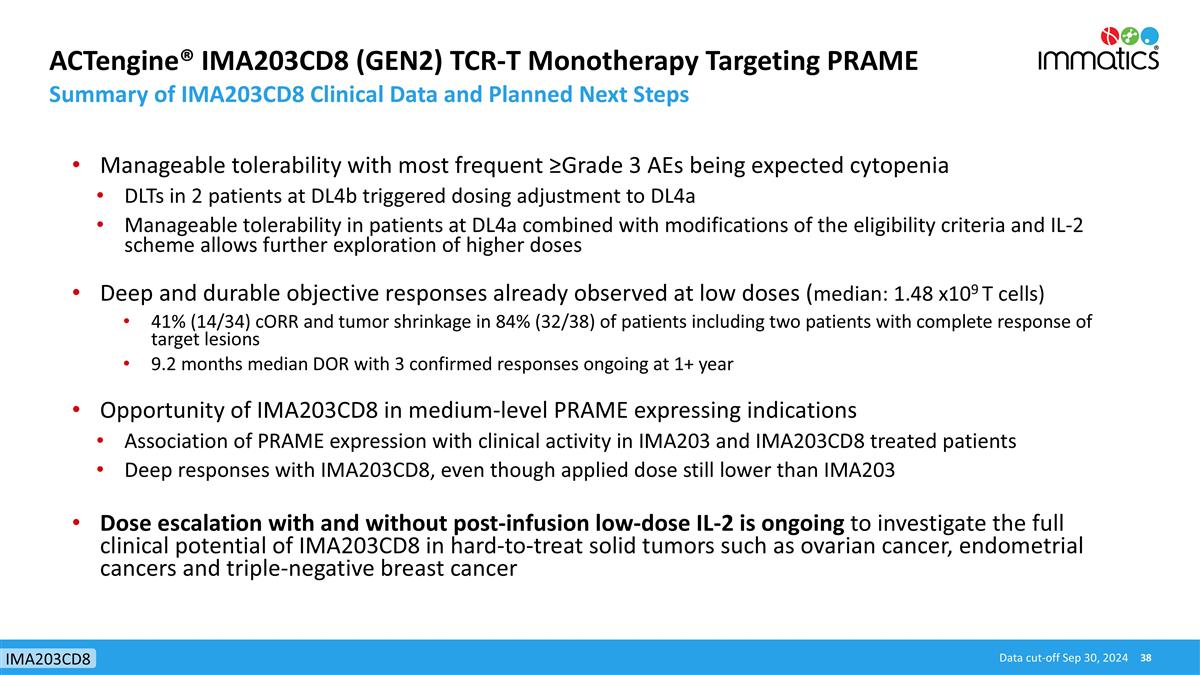
ACTengine® IMA203CD8 (GEN2)
TCR-T Monotherapy Targeting PRAME Summary of IMA203CD8 Clinical Data and Planned Next Steps Data cut-off Sep 30, 2024 IMA203CD8 Manageable tolerability with most frequent ≥Grade 3 AEs being expected cytopenia DLTs in 2 patients at DL4b
triggered dosing adjustment to DL4a Manageable tolerability in patients at DL4a combined with modifications of the eligibility criteria and IL-2 scheme allows further exploration of higher doses Deep and durable objective responses already observed
at low doses (median: 1.48 x109 T cells) 41% (14/34) cORR and tumor shrinkage in 84% (32/38) of patients including two patients with complete response of target lesions 9.2 months median DOR with 3 confirmed responses ongoing at 1+ year Opportunity
of IMA203CD8 in medium-level PRAME expressing indications Association of PRAME expression with clinical activity in IMA203 and IMA203CD8 treated patients Deep responses with IMA203CD8, even though applied dose still lower than IMA203 Dose escalation
with and without post-infusion low-dose IL-2 is ongoing to investigate the full clinical potential of IMA203CD8 in hard-to-treat solid tumors such as ovarian cancer, endometrial cancers and triple-negative breast cancer
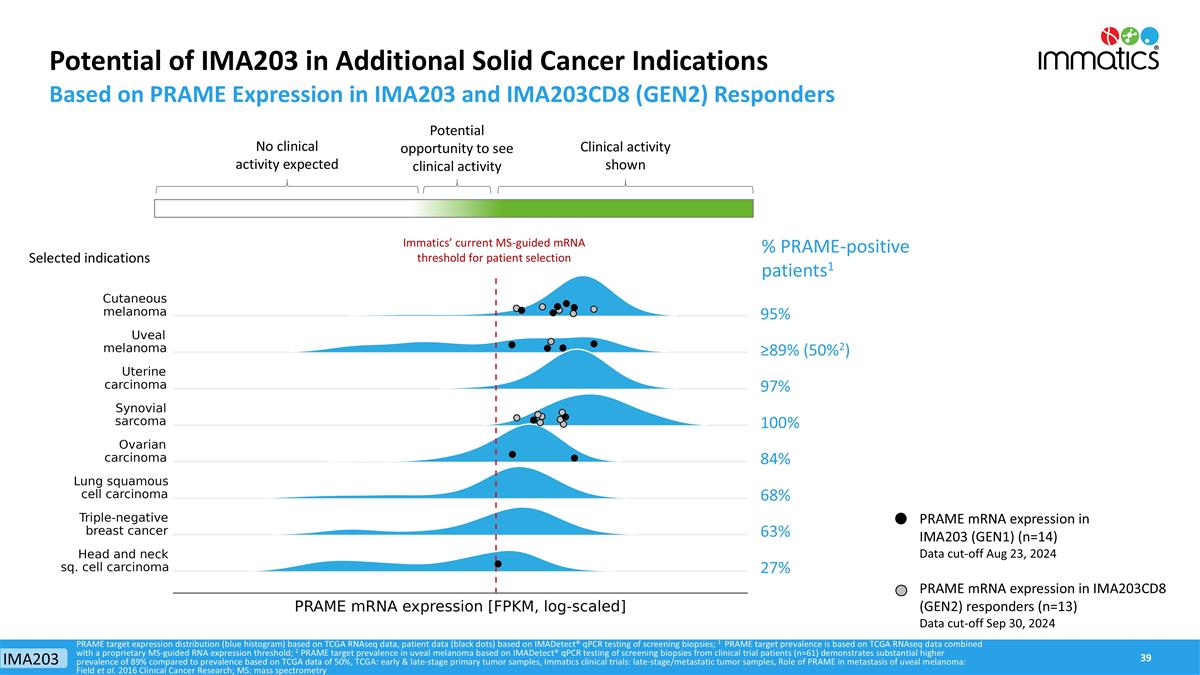
PRAME mRNA expression in IMA203
(GEN1) (n=14) Data cut-off Aug 23, 2024 PRAME mRNA expression in IMA203CD8 (GEN2) responders (n=13) Data cut-off Sep 30, 2024 Potential of IMA203 in Additional Solid Cancer Indications Based on PRAME Expression in IMA203 and IMA203CD8 (GEN2)
Responders % PRAME-positive patients1 PRAME target expression distribution (blue histogram) based on TCGA RNAseq data, patient data (black dots) based on IMADetect® qPCR testing of screening biopsies; 1 PRAME target prevalence is based on TCGA
RNAseq data combined with a proprietary MS-guided RNA expression threshold; 2 PRAME target prevalence in uveal melanoma based on IMADetect® qPCR testing of screening biopsies from clinical trial patients (n=61) demonstrates substantial higher
prevalence of 89% compared to prevalence based on TCGA data of 50%, TCGA: early & late-stage primary tumor samples, Immatics clinical trials: late-stage/metastatic tumor samples, Role of PRAME in metastasis of uveal melanoma: Field et al. 2016
Clinical Cancer Research; MS: mass spectrometry 95% ≥89% (50%2) 97% 100% 84% 68% 63% 27% Immatics’ current MS-guided mRNA threshold for patient selection Selected indications Clinical activity shown No clinical activity expected
Potential opportunity to see clinical activity IMA203
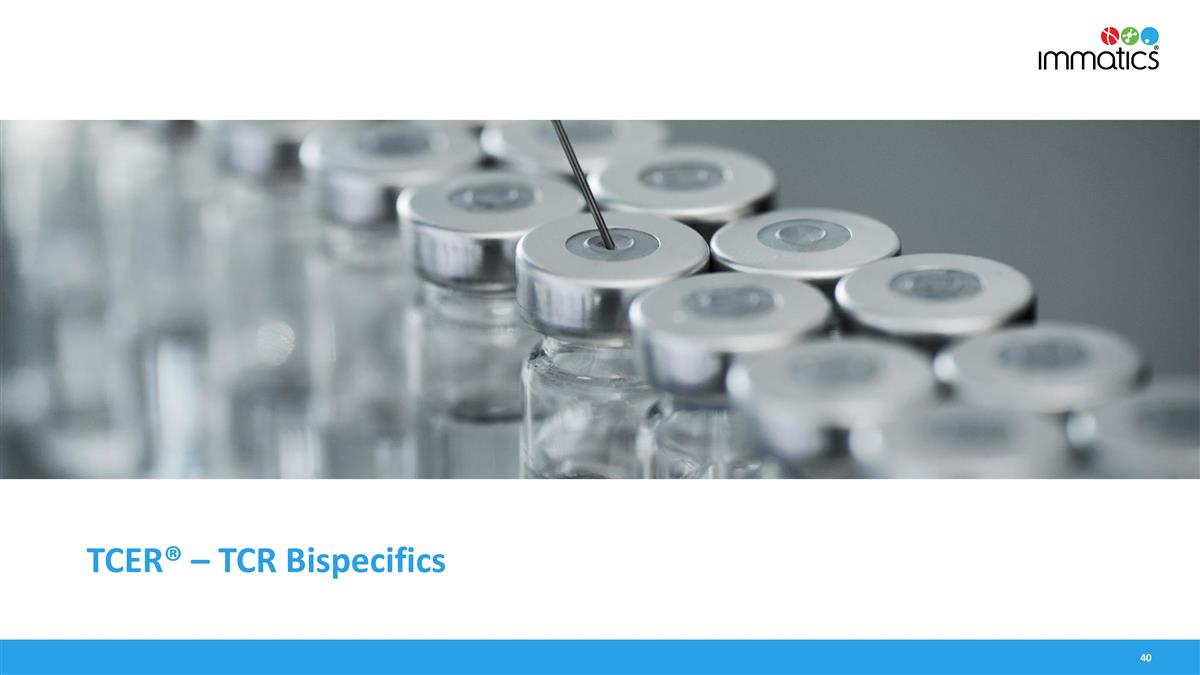
TCER® – TCR Bispecifics
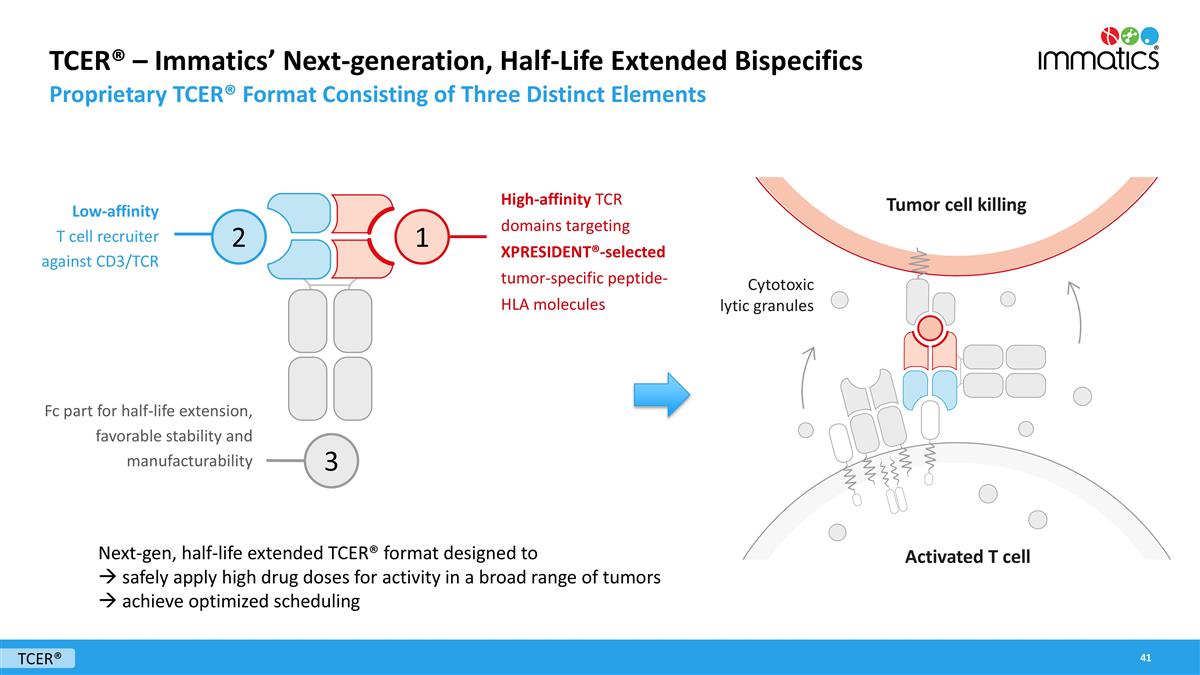
TCER® – Immatics’
Next-generation, Half-Life Extended Bispecifics Proprietary TCER® Format Consisting of Three Distinct Elements High-affinity TCR domains targeting XPRESIDENT®-selected tumor-specific peptide-HLA molecules Low-affinity T cell recruiter
against CD3/TCR Fc part for half-life extension, favorable stability and manufacturability Next-gen, half-life extended TCER® format designed to à safely apply high drug doses for activity in a broad range of tumors à achieve
optimized scheduling 2 1 3 Cytotoxic lytic granules Tumor cell killing Activated T cell TCER®
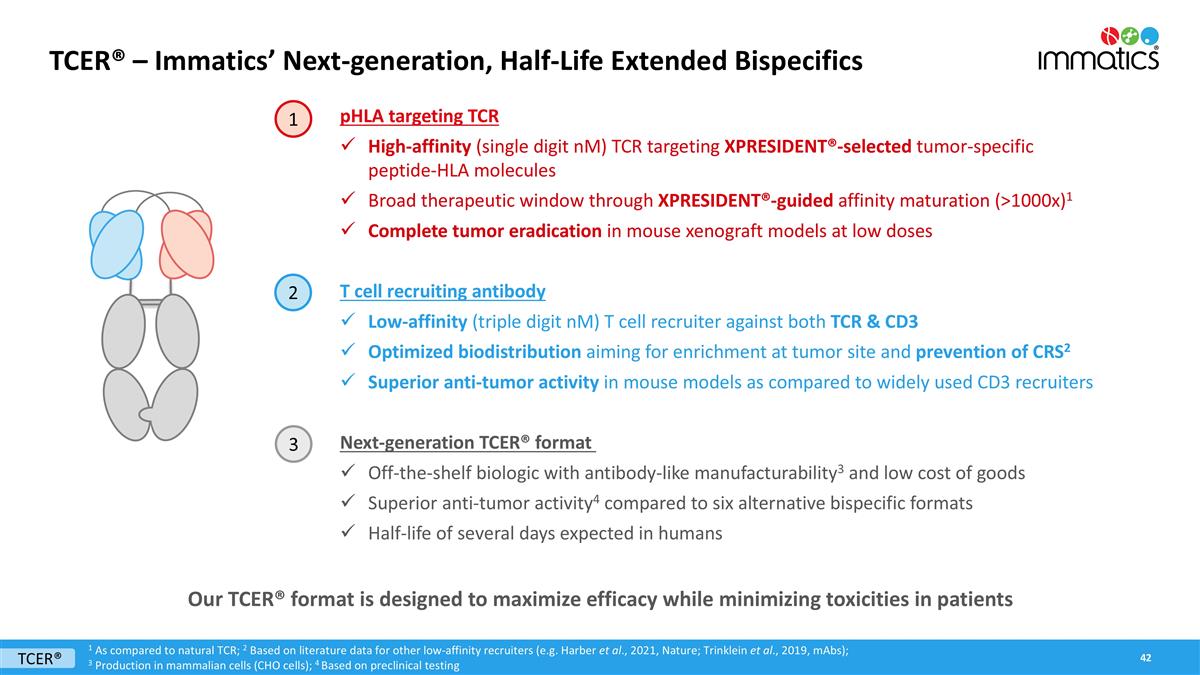
TCER® – Immatics’
Next-generation, Half-Life Extended Bispecifics pHLA targeting TCR High-affinity (single digit nM) TCR targeting XPRESIDENT®-selected tumor-specific peptide-HLA molecules Broad therapeutic window through XPRESIDENT®-guided affinity
maturation (>1000x)1 Complete tumor eradication in mouse xenograft models at low doses T cell recruiting antibody Low-affinity (triple digit nM) T cell recruiter against both TCR & CD3 Optimized biodistribution aiming for
enrichment at tumor site and prevention of CRS2 Superior anti-tumor activity in mouse models as compared to widely used CD3 recruiters Next-generation TCER® format Off-the-shelf biologic with antibody-like
manufacturability3 and low cost of goods Superior anti-tumor activity4 compared to six alternative bispecific formats Half-life of several days expected in humans Our TCER® format is designed to maximize efficacy while minimizing
toxicities in patients 1 As compared to natural TCR; 2 Based on literature data for other low-affinity recruiters (e.g. Harber et al., 2021, Nature; Trinklein et al., 2019, mAbs); 3 Production in mammalian cells (CHO cells); 4 Based on preclinical
testing TCER® 1 2 3
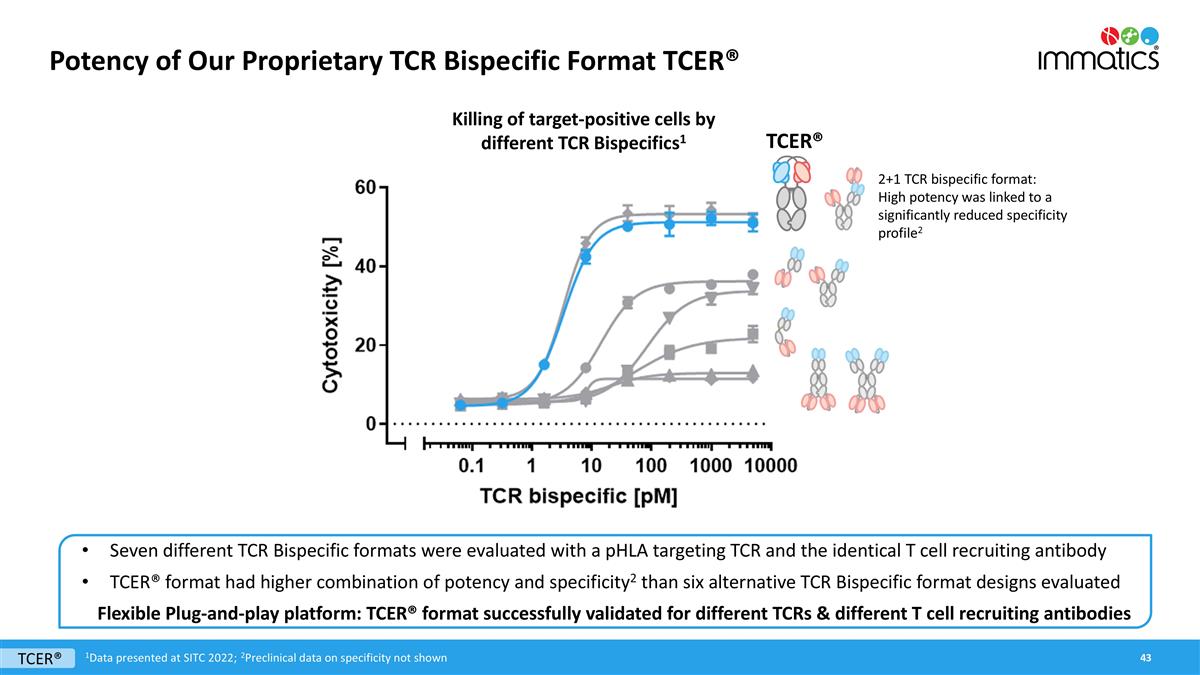
Potency of Our Proprietary TCR
Bispecific Format TCER® Seven different TCR Bispecific formats were evaluated with a pHLA targeting TCR and the identical T cell recruiting antibody TCER® format had higher combination of potency and specificity2 than six alternative TCR
Bispecific format designs evaluated Flexible Plug-and-play platform: TCER® format successfully validated for different TCRs & different T cell recruiting antibodies TCER® 2+1 TCR bispecific format: High potency was linked to a
significantly reduced specificity profile2 Killing of target-positive cells by different TCR Bispecifics1 1Data presented at SITC 2022; 2Preclinical data on specificity not shown TCER®
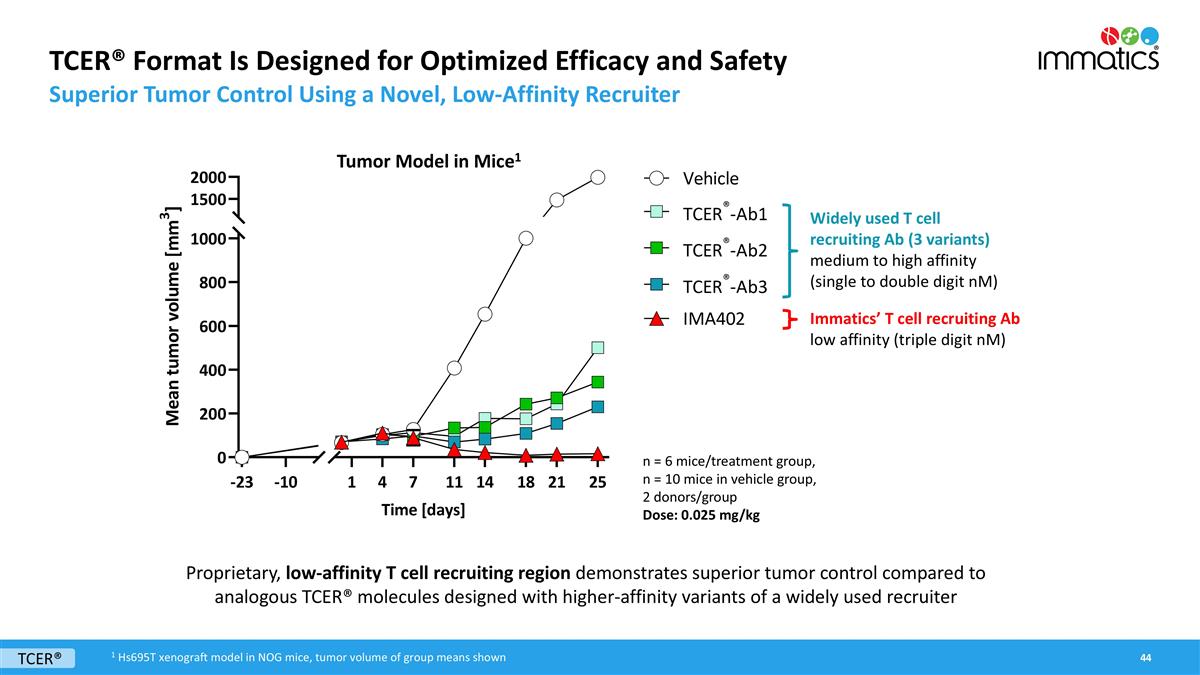
TCER® Format Is Designed for
Optimized Efficacy and Safety Superior Tumor Control Using a Novel, Low-Affinity Recruiter Widely used T cell recruiting Ab (3 variants) medium to high affinity (single to double digit nM) n = 6 mice/treatment group, n = 10 mice in vehicle group, 2
donors/group Dose: 0.025 mg/kg Proprietary, low-affinity T cell recruiting region demonstrates superior tumor control compared to analogous TCER® molecules designed with higher-affinity variants of a widely used recruiter Immatics’ T cell
recruiting Ab low affinity (triple digit nM) TCER® Tumor Model in Mice1 1 Hs695T xenograft model in NOG mice, tumor volume of group means shown
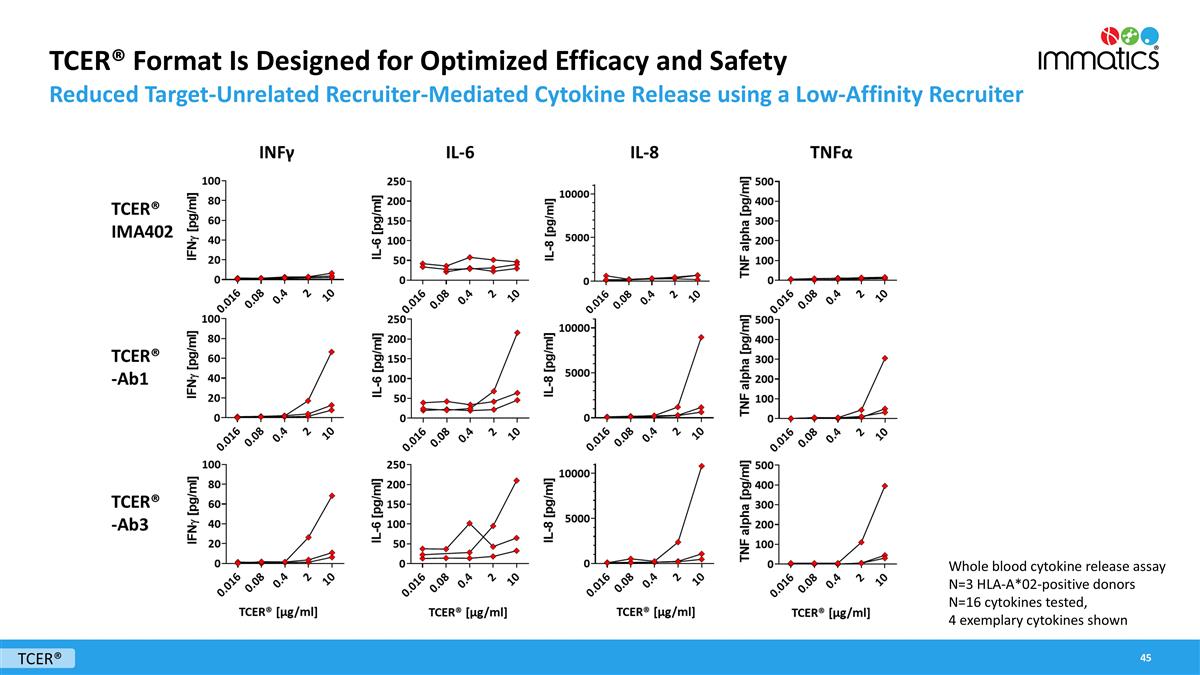
TCER® Format Is Designed for
Optimized Efficacy and Safety Reduced Target-Unrelated Recruiter-Mediated Cytokine Release using a Low-Affinity Recruiter TCER® Whole blood cytokine release assay N=3 HLA-A*02-positive donors N=16 cytokines tested, 4 exemplary cytokines
shown
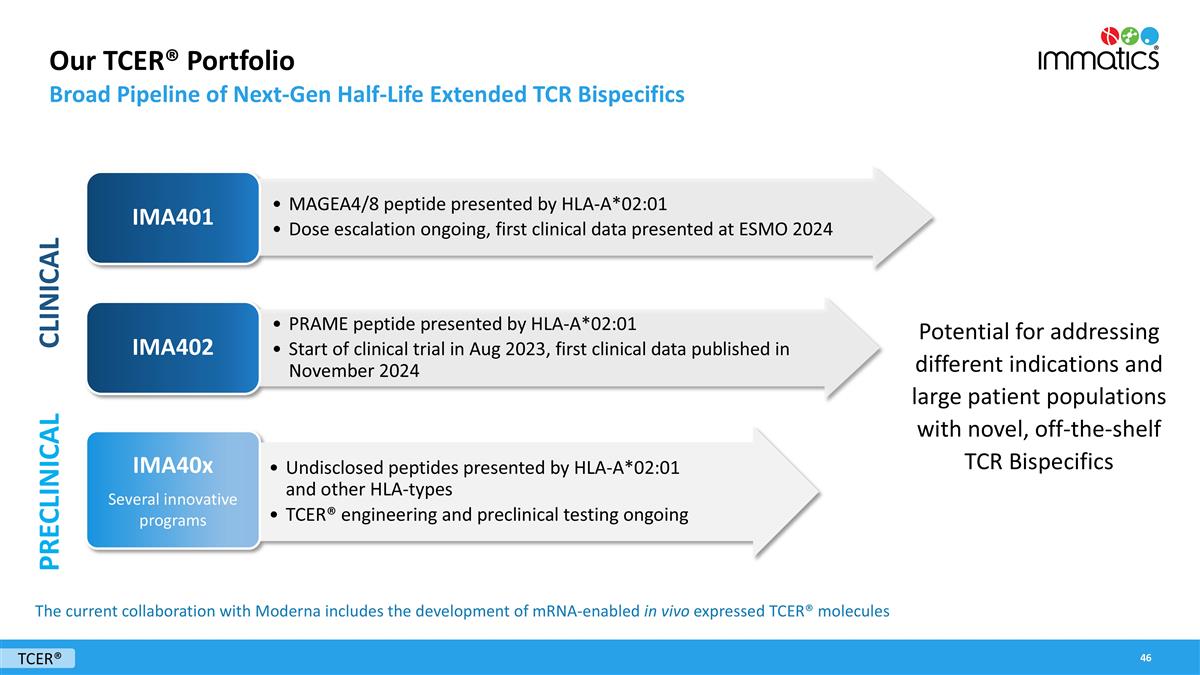
Our TCER® Portfolio Broad
Pipeline of Next-Gen Half-Life Extended TCR Bispecifics TCER® PRAME peptide presented by HLA-A*02:01 Start of clinical trial in Aug 2023, first clinical data published in November 2024 IMA402 Potential for addressing different indications and
large patient populations with novel, off-the-shelf TCR Bispecifics MAGEA4/8 peptide presented by HLA-A*02:01 Dose escalation ongoing, first clinical data presented at ESMO 2024 IMA401 Undisclosed peptides presented by HLA-A*02:01 and other
HLA-types TCER® engineering and preclinical testing ongoing IMA40x Several innovative programs CLINICAL PRECLINICAL The current collaboration with Moderna includes the development of mRNA-enabled in vivo expressed TCER®
molecules
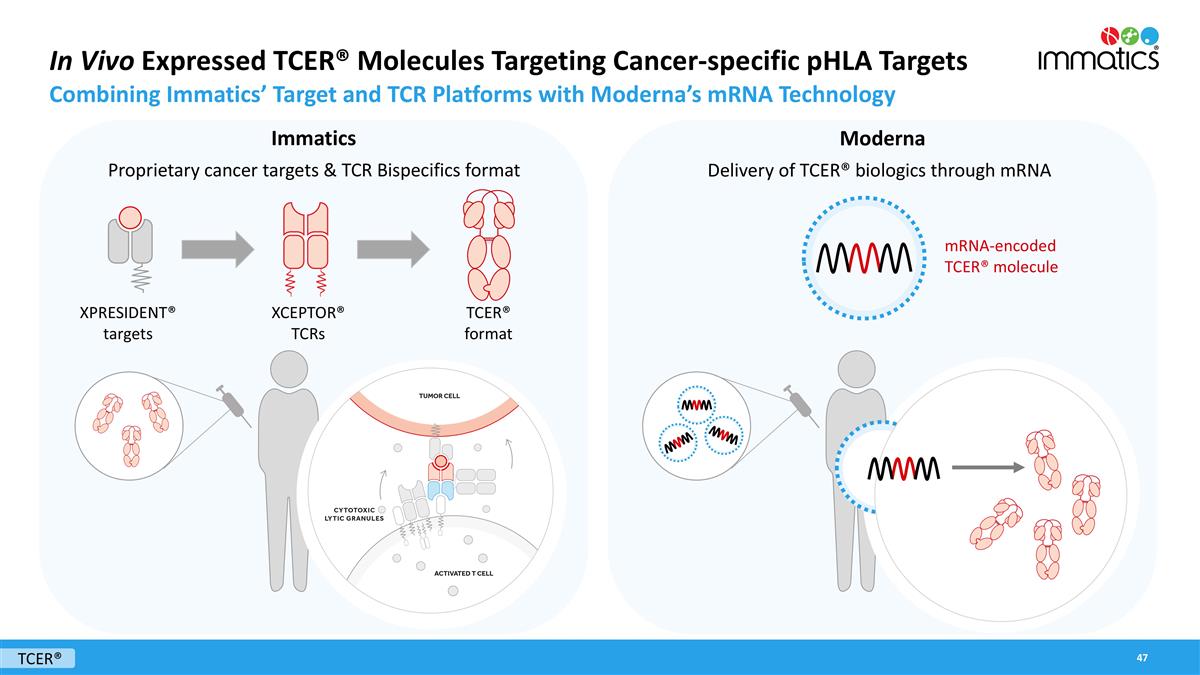
In Vivo Expressed TCER®
Molecules Targeting Cancer-specific pHLA Targets Combining Immatics’ Target and TCR Platforms with Moderna’s mRNA Technology Immatics Moderna Delivery of TCER® biologics through mRNA Proprietary cancer targets & TCR Bispecifics
format mRNA-encoded TCER® molecule XPRESIDENT® targets XCEPTOR® TCRs TCER® format TCER®
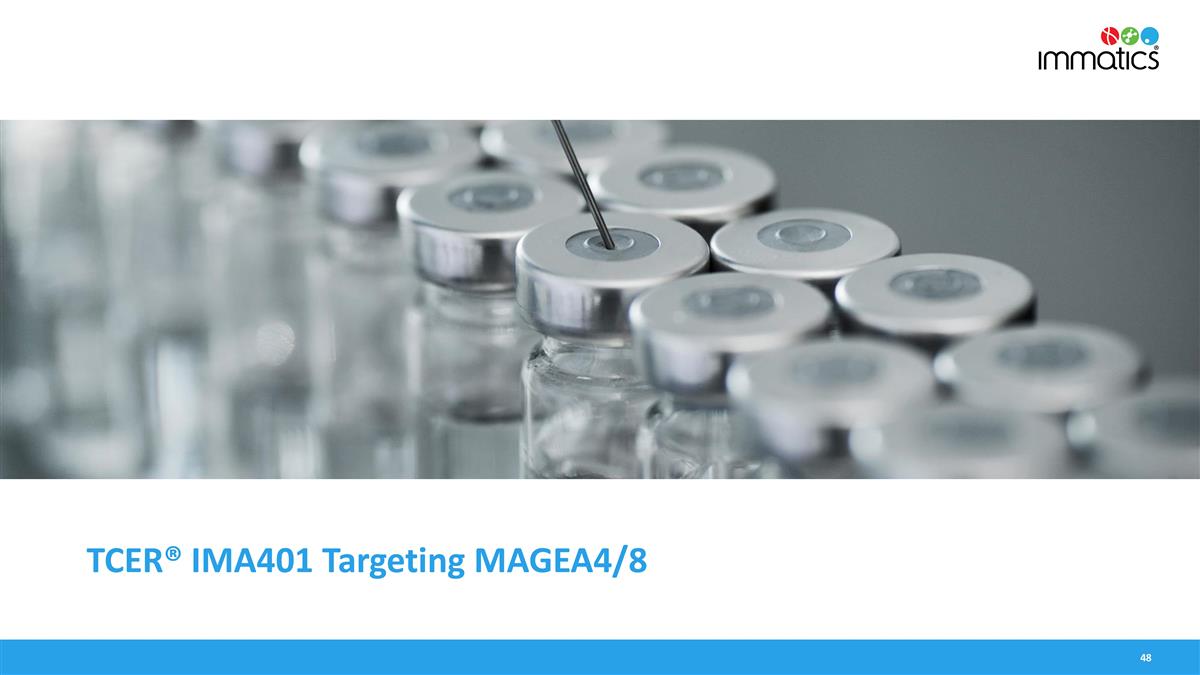
TCER® IMA401 Targeting
MAGEA4/8
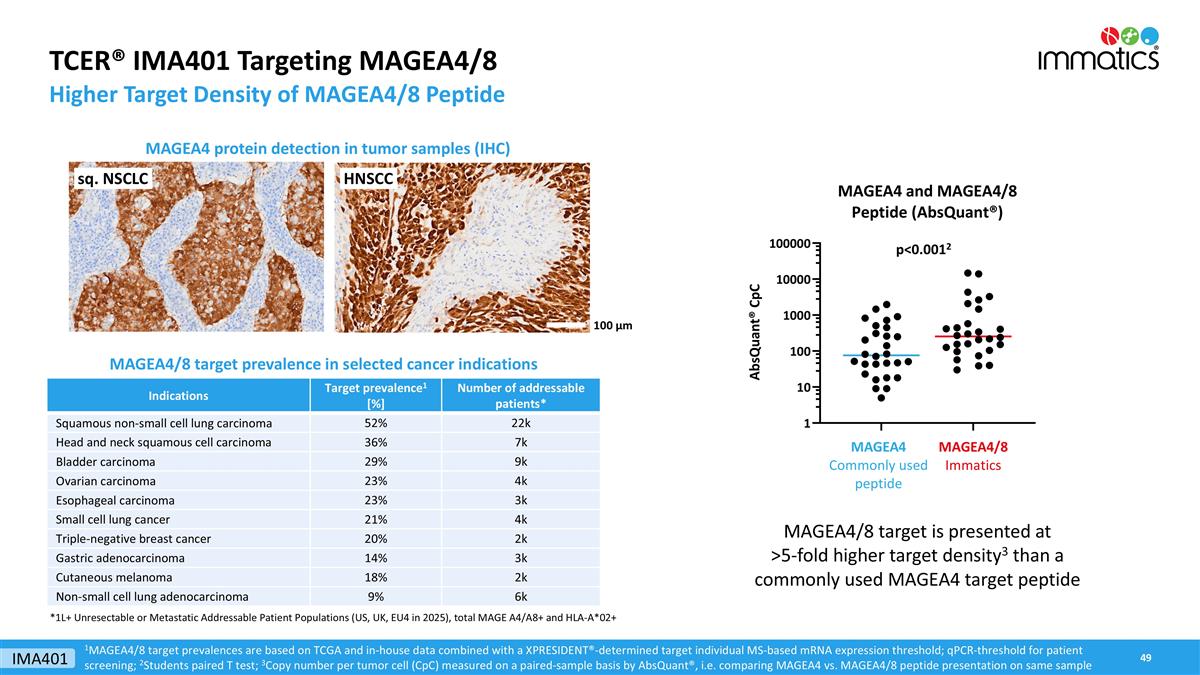
TCER® IMA401 Targeting
MAGEA4/8 Higher Target Density of MAGEA4/8 Peptide MAGEA4 protein detection in tumor samples (IHC) 1MAGEA4/8 target prevalences are based on TCGA and in-house data combined with a XPRESIDENT®-determined target individual MS-based mRNA
expression threshold; qPCR-threshold for patient screening; 2Students paired T test; 3Copy number per tumor cell (CpC) measured on a paired-sample basis by AbsQuant®, i.e. comparing MAGEA4 vs. MAGEA4/8 peptide presentation on same sample
p<0.0012 MAGEA4/8 target is presented at >5-fold higher target density3 than a commonly used MAGEA4 target peptide HNSCC sq. NSCLC 100 µm MAGEA4/8 target prevalence in selected cancer indications Indications Target prevalence1 [%] Number
of addressable patients* Squamous non-small cell lung carcinoma 52% 22k Head and neck squamous cell carcinoma 36% 7k Bladder carcinoma 29% 9k Ovarian carcinoma 23% 4k Esophageal carcinoma 23% 3k Small cell lung cancer 21% 4k Triple-negative breast
cancer 20% 2k Gastric adenocarcinoma 14% 3k Cutaneous melanoma 18% 2k Non-small cell lung adenocarcinoma 9% 6k *1L+ Unresectable or Metastatic Addressable Patient Populations (US, UK, EU4 in 2025), total MAGE A4/A8+ and HLA-A*02+ IMA401
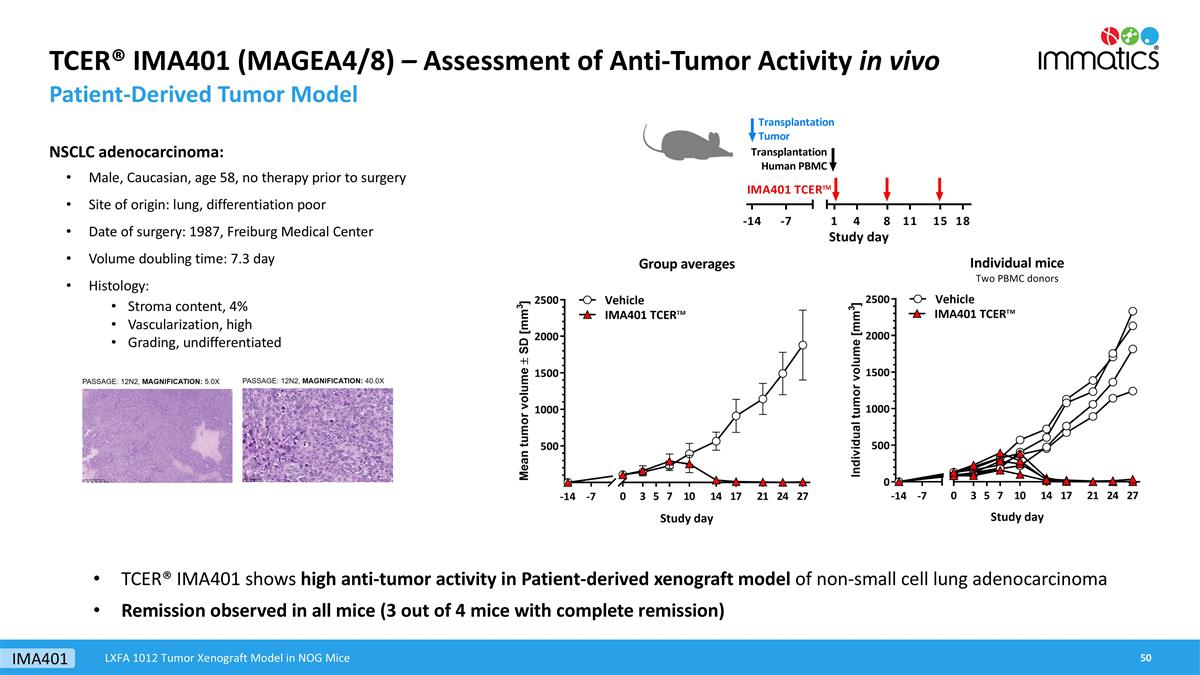
TCER® IMA401 (MAGEA4/8)
– Assessment of Anti-Tumor Activity in vivo Patient-Derived Tumor Model NSCLC adenocarcinoma: Male, Caucasian, age 58, no therapy prior to surgery Site of origin: lung, differentiation poor Date of surgery: 1987, Freiburg Medical Center Volume
doubling time: 7.3 day Histology: Stroma content, 4% Vascularization, high Grading, undifferentiated TCER® IMA401 shows high anti-tumor activity in Patient-derived xenograft model of non-small cell lung adenocarcinoma Remission observed
in all mice (3 out of 4 mice with complete remission) LXFA 1012 Tumor Xenograft Model in NOG Mice IMA401
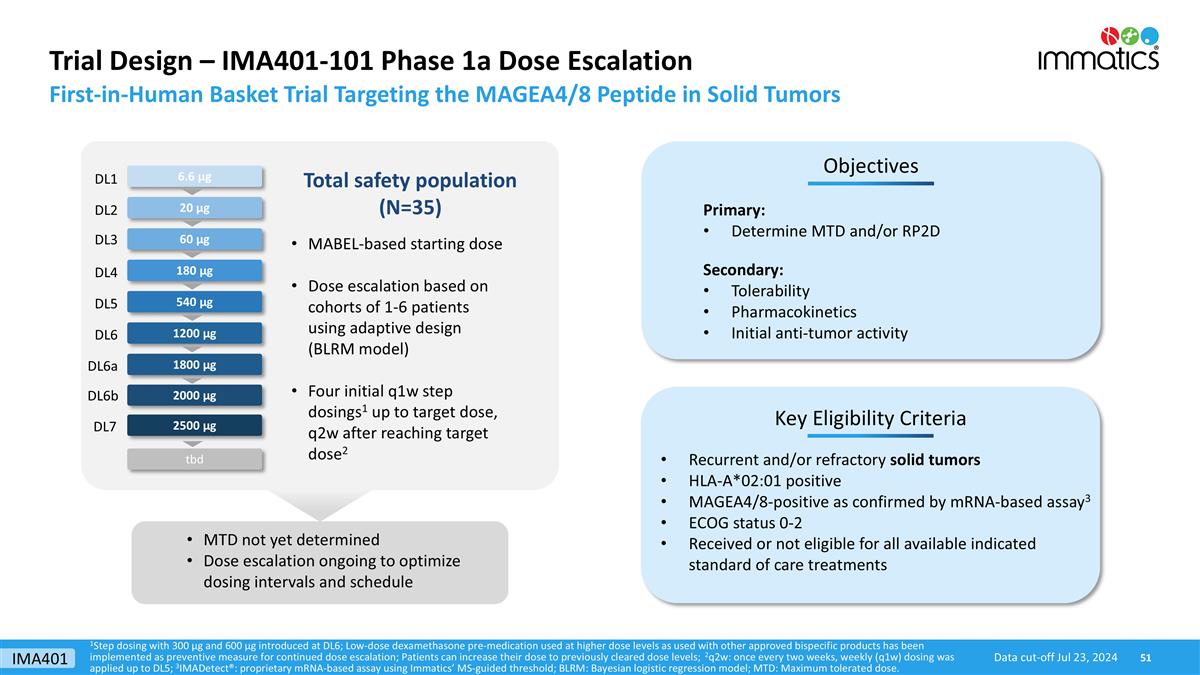
Trial Design – IMA401-101
Phase 1a Dose Escalation 180 µg 540 µg 1800 µg 2500 µg Key Eligibility Criteria Objectives Primary: Determine MTD and/or RP2D Secondary: Tolerability Pharmacokinetics Initial anti-tumor activity Recurrent and/or refractory
solid tumors HLA-A*02:01 positive MAGEA4/8-positive as confirmed by mRNA-based assay3 ECOG status 0-2 Received or not eligible for all available indicated standard of care treatments 60 µg 1200 µg Total safety population (N=35) 20 µg
6.6 µg MTD not yet determined Dose escalation ongoing to optimize dosing intervals and schedule MABEL-based starting dose Dose escalation based on cohorts of 1-6 patients using adaptive design (BLRM model) Four initial q1w
step dosings1 up to target dose, q2w after reaching target dose2 First-in-Human Basket Trial Targeting the MAGEA4/8 Peptide in Solid Tumors 1Step dosing with 300 µg and 600 µg introduced at DL6; Low-dose dexamethasone pre-medication used
at higher dose levels as used with other approved bispecific products has been implemented as preventive measure for continued dose escalation; Patients can increase their dose to previously cleared dose levels; 2q2w: once every two weeks, weekly
(q1w) dosing was applied up to DL5; 3IMADetect®: proprietary mRNA-based assay using Immatics’ MS-guided threshold; BLRM: Bayesian logistic regression model; MTD: Maximum tolerated dose. DL1 DL2 DL3 DL4 DL5 DL6a DL7 DL6 tbd 2000 µg
DL6b Data cut-off Jul 23, 2024 IMA401
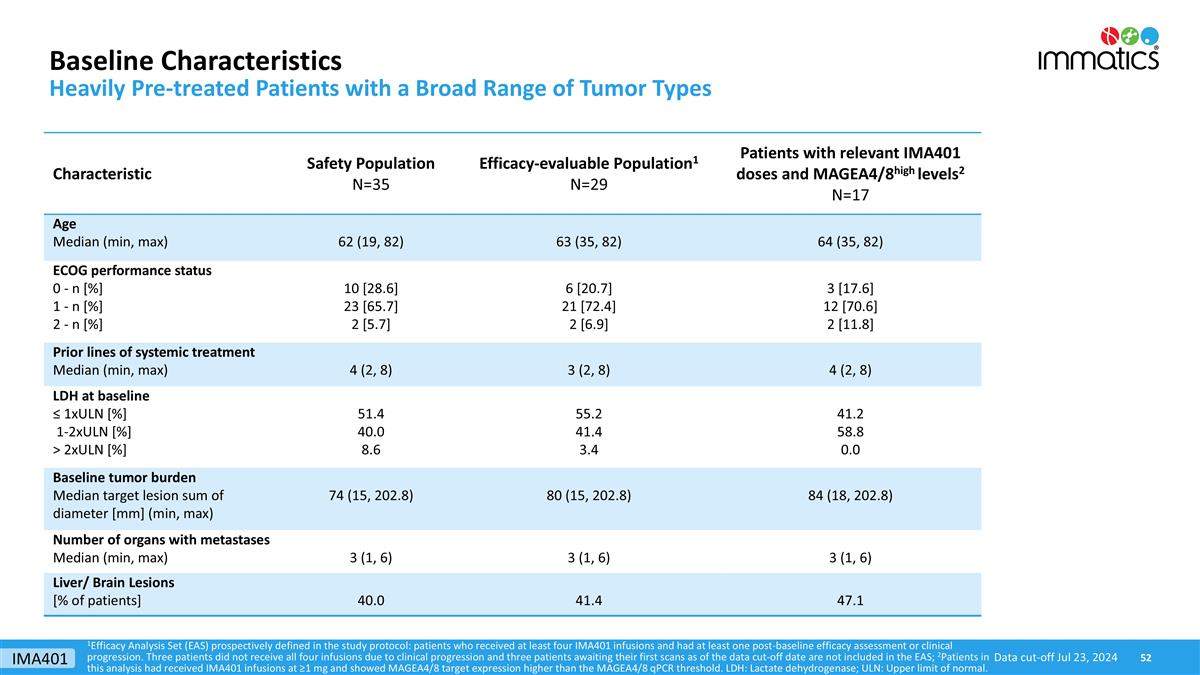
Baseline Characteristics Heavily
Pre-treated Patients with a Broad Range of Tumor Types 1Efficacy Analysis Set (EAS) prospectively defined in the study protocol: patients who received at least four IMA401 infusions and had at least one post-baseline efficacy assessment or clinical
progression. Three patients did not receive all four infusions due to clinical progression and three patients awaiting their first scans as of the data cut-off date are not included in the EAS; 2Patients in this analysis had received IMA401
infusions at ≥1 mg and showed MAGEA4/8 target expression higher than the MAGEA4/8 qPCR threshold. LDH: Lactate dehydrogenase; ULN: Upper limit of normal. Data cut-off Jul 23, 2024 Characteristic Safety Population N=35 Efficacy-evaluable
Population1 N=29 Patients with relevant IMA401 doses and MAGEA4/8high levels2 N=17 Age Median (min, max) 62 (19, 82) 63 (35, 82) 64 (35, 82) ECOG performance status 0 - n [%] 1 - n [%] 2 - n [%] 10 [28.6] 23 [65.7] 2 [5.7] 6 [20.7] 21 [72.4] 2
[6.9] 3 [17.6] 12 [70.6] 2 [11.8] Prior lines of systemic treatment Median (min, max) 4 (2, 8) 3 (2, 8) 4 (2, 8) LDH at baseline ≤ 1xULN [%] 1-2xULN [%] > 2xULN [%] 51.4 40.0 8.6 55.2 41.4 3.4 41.2 58.8 0.0 Baseline tumor burden
Median target lesion sum of diameter [mm] (min, max) 74 (15, 202.8) 80 (15, 202.8) 84 (18, 202.8) Number of organs with metastases Median (min, max) 3 (1, 6) 3 (1, 6) 3 (1, 6) Liver/ Brain Lesions [% of patients] 40.0 41.4 47.1 IMA401
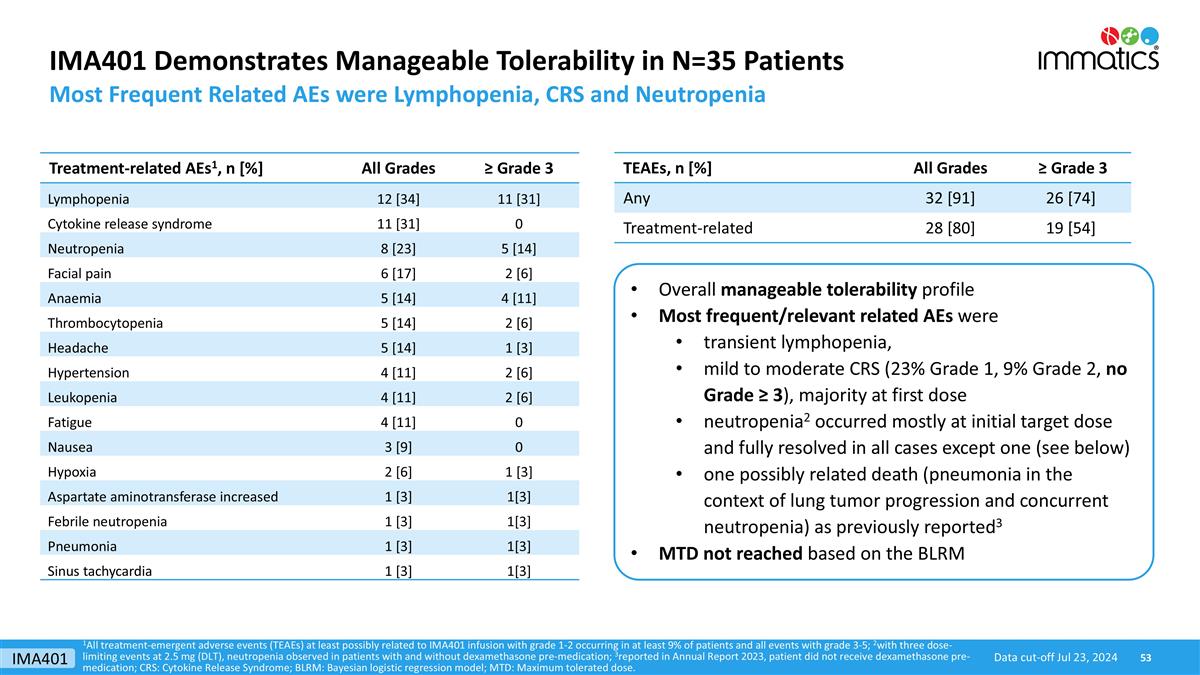
IMA401 Demonstrates Manageable
Tolerability in N=35 Patients Most Frequent Related AEs were Lymphopenia, CRS and Neutropenia TEAEs, n [%] All Grades ≥ Grade 3 Any 32 [91] 26 [74] Treatment-related 28 [80] 19 [54] Treatment-related AEs1, n [%] All Grades ≥ Grade 3
Lymphopenia 12 [34] 11 [31] Cytokine release syndrome 11 [31] 0 Neutropenia 8 [23] 5 [14] Facial pain 6 [17] 2 [6] Anaemia 5 [14] 4 [11] Thrombocytopenia 5 [14] 2 [6] Headache 5 [14] 1 [3] Hypertension 4 [11] 2 [6] Leukopenia 4 [11] 2 [6] Fatigue 4
[11] 0 Nausea 3 [9] 0 Hypoxia 2 [6] 1 [3] Aspartate aminotransferase increased 1 [3] 1[3] Febrile neutropenia 1 [3] 1[3] Pneumonia 1 [3] 1[3] Sinus tachycardia 1 [3] 1[3] Overall manageable tolerability profile Most frequent/relevant related AEs
were transient lymphopenia, mild to moderate CRS (23% Grade 1, 9% Grade 2, no Grade ≥ 3), majority at first dose neutropenia2 occurred mostly at initial target dose and fully resolved in all cases except one (see below) one possibly related
death (pneumonia in the context of lung tumor progression and concurrent neutropenia) as previously reported3 MTD not reached based on the BLRM 1All treatment-emergent adverse events (TEAEs) at least possibly related to IMA401 infusion with grade
1-2 occurring in at least 9% of patients and all events with grade 3-5; 2with three dose-limiting events at 2.5 mg (DLT), neutropenia observed in patients with and without dexamethasone pre-medication; 3reported in Annual Report 2023, patient
did not receive dexamethasone pre-medication; CRS: Cytokine Release Syndrome; BLRM: Bayesian logistic regression model; MTD: Maximum tolerated dose. Data cut-off Jul 23, 2024 IMA401
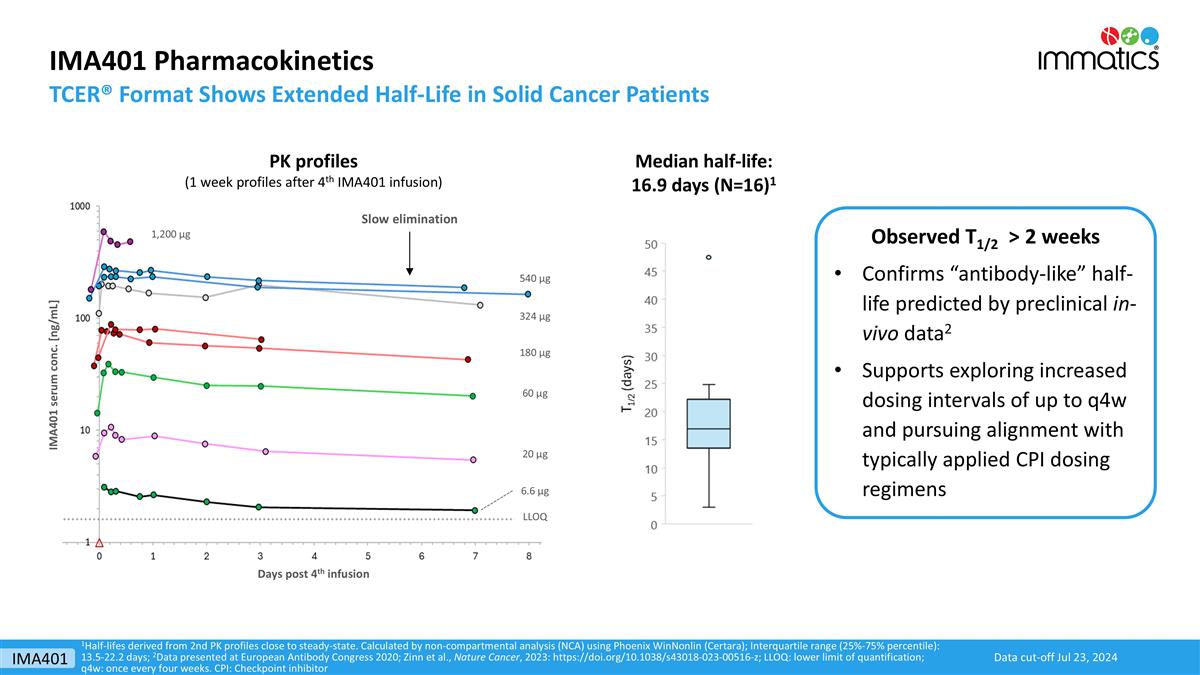
IMA401 Pharmacokinetics TCER®
Format Shows Extended Half-Life in Solid Cancer Patients 1Half-lifes derived from 2nd PK profiles close to steady-state. Calculated by non-compartmental analysis (NCA) using Phoenix WinNonlin (Certara); Interquartile range (25%-75% percentile):
13.5-22.2 days; 2Data presented at European Antibody Congress 2020; Zinn et al., Nature Cancer, 2023: https://doi.org/10.1038/s43018-023-00516-z; LLOQ: lower limit of quantification; q4w: once every four weeks. CPI: Checkpoint inhibitor Median
half-life: 16.9 days (N=16)1 Slow elimination Days post 4th infusion IMA401 serum conc. [ng/mL] 6.6 µg 20 µg 60 µg 180 µg LLOQ 324 µg 540 µg 1,200 µg PK profiles (1 week profiles after 4th IMA401 infusion) Observed
T1/2 > 2 weeks Confirms “antibody-like” half-life predicted by preclinical in-vivo data2 Supports exploring increased dosing intervals of up to q4w and pursuing alignment with typically applied CPI dosing regimens Data cut-off Jul 23,
2024 IMA401
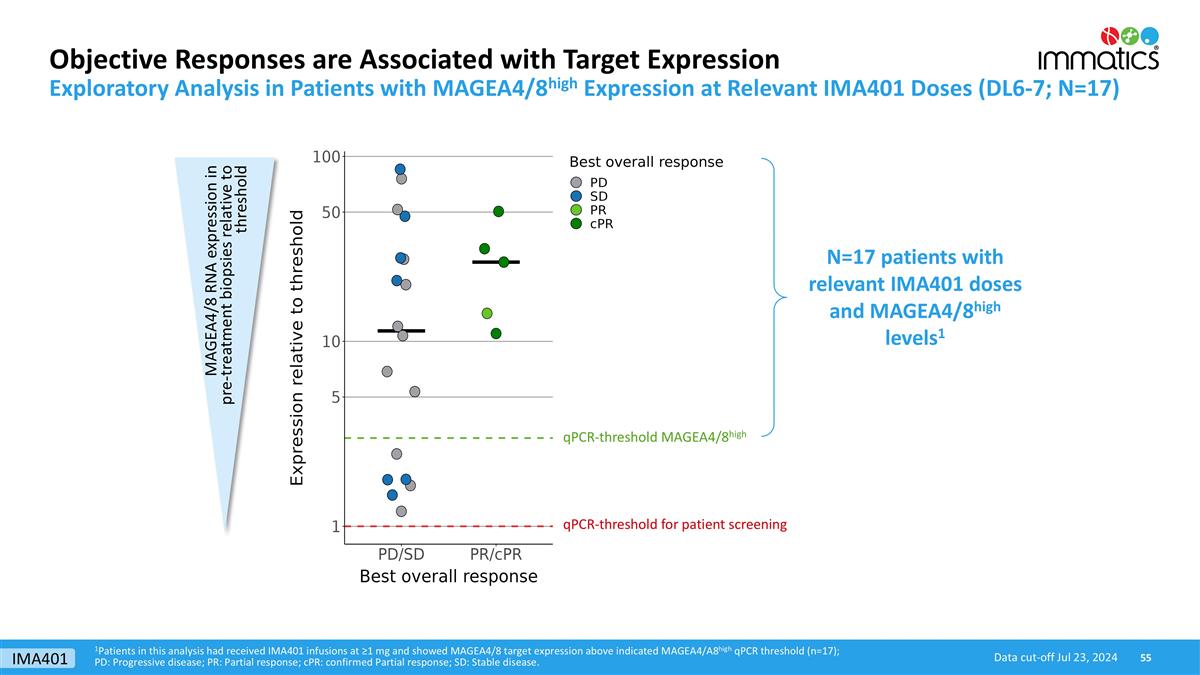
1Patients in this analysis had
received IMA401 infusions at ≥1 mg and showed MAGEA4/8 target expression above indicated MAGEA4/A8high qPCR threshold (n=17); PD: Progressive disease; PR: Partial response; cPR: confirmed Partial response; SD: Stable disease. Objective
Responses are Associated with Target Expression Data cut-off Jul 23, 2024 Exploratory Analysis in Patients with MAGEA4/8high Expression at Relevant IMA401 Doses (DL6-7; N=17) qPCR-threshold MAGEA4/8high qPCR-threshold for patient screening MAGEA4/8
RNA expression in pre-treatment biopsies relative to threshold N=17 patients with relevant IMA401 doses and MAGEA4/8high levels1 IMA401
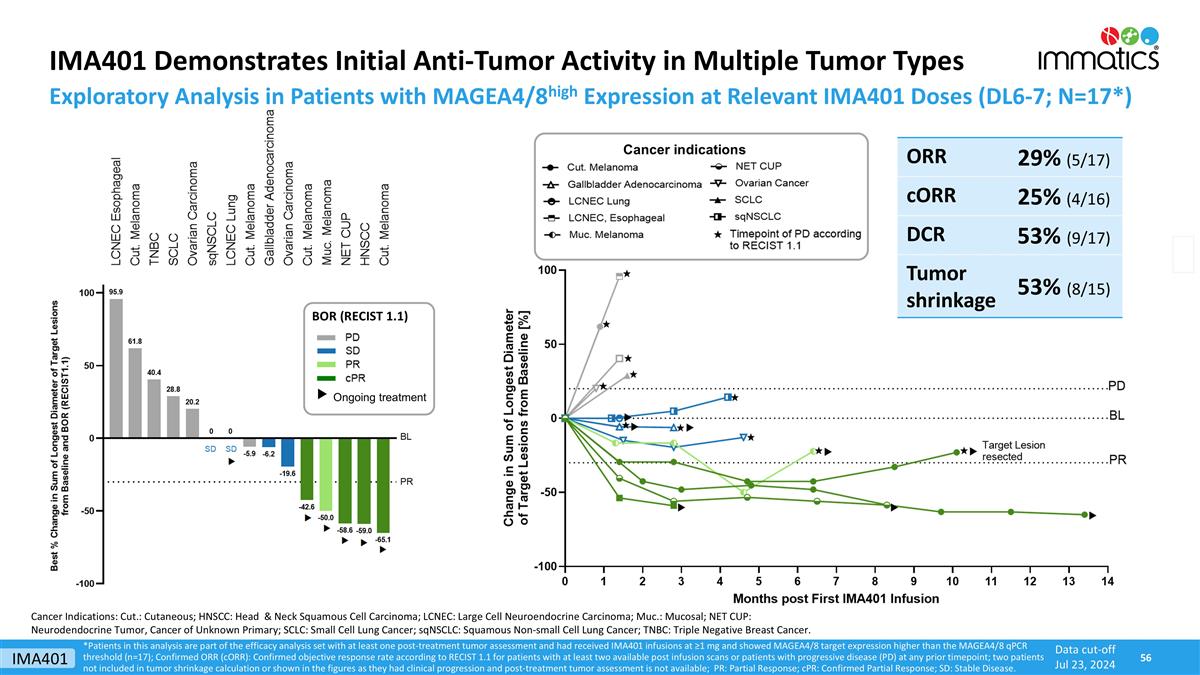
IMA401 Demonstrates Initial
Anti-Tumor Activity in Multiple Tumor Types *Patients in this analysis are part of the efficacy analysis set with at least one post-treatment tumor assessment and had received IMA401 infusions at ≥1 mg and showed MAGEA4/8 target expression
higher than the MAGEA4/8 qPCR threshold (n=17); Confirmed ORR (cORR): Confirmed objective response rate according to RECIST 1.1 for patients with at least two available post infusion scans or patients with progressive disease (PD) at any prior
timepoint; two patients not included in tumor shrinkage calculation or shown in the figures as they had clinical progression and post-treatment tumor assessment is not available; PR: Partial Response; cPR: Confirmed Partial Response; SD:
Stable Disease. Data cut-off Jul 23, 2024 Exploratory Analysis in Patients with MAGEA4/8high Expression at Relevant IMA401 Doses (DL6-7; N=17*) ORR 29% (5/17) cORR 25% (4/16) DCR 53% (9/17) Tumor shrinkage 53% (8/15) Cancer indications Cancer
Indications: Cut.: Cutaneous; HNSCC: Head & Neck Squamous Cell Carcinoma; LCNEC: Large Cell Neuroendocrine Carcinoma; Muc.: Mucosal; NET CUP: Neurodendocrine Tumor, Cancer of Unknown Primary; SCLC: Small Cell Lung Cancer; sqNSCLC: Squamous
Non-small Cell Lung Cancer; TNBC: Triple Negative Breast Cancer. BOR (RECIST 1.1) Ongoing treatment IMA401
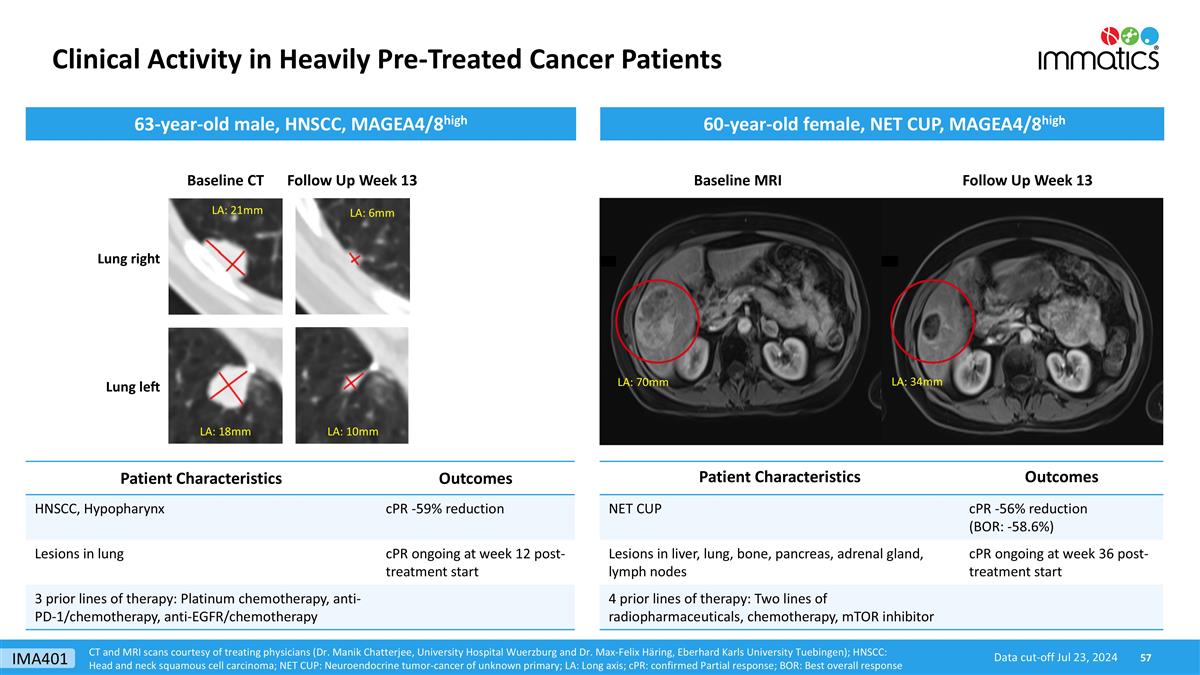
Clinical Activity in Heavily
Pre-Treated Cancer Patients CT and MRI scans courtesy of treating physicians (Dr. Manik Chatterjee, University Hospital Wuerzburg and Dr. Max-Felix Häring, Eberhard Karls University Tuebingen); HNSCC: Head and neck squamous cell carcinoma; NET
CUP: Neuroendocrine tumor-cancer of unknown primary; LA: Long axis; cPR: confirmed Partial response; BOR: Best overall response Baseline MRI Follow Up Week 13 Patient Characteristics Outcomes NET CUP cPR -56% reduction (BOR: -58.6%) Lesions in
liver, lung, bone, pancreas, adrenal gland, lymph nodes cPR ongoing at week 36 post-treatment start 4 prior lines of therapy: Two lines of radiopharmaceuticals, chemotherapy, mTOR inhibitor 60-year-old female, NET CUP, MAGEA4/8high 63-year-old male,
HNSCC, MAGEA4/8high Follow Up Week 13 Patient Characteristics Outcomes HNSCC, Hypopharynx cPR -59% reduction Lesions in lung cPR ongoing at week 12 post-treatment start 3 prior lines of therapy: Platinum chemotherapy, anti-PD-1/chemotherapy,
anti-EGFR/chemotherapy LA: 18mm LA: 21mm LA: 70mm LA: 34mm Data cut-off Jul 23, 2024 Baseline CT Lung right Lung left LA: 6mm LA: 10mm IMA401
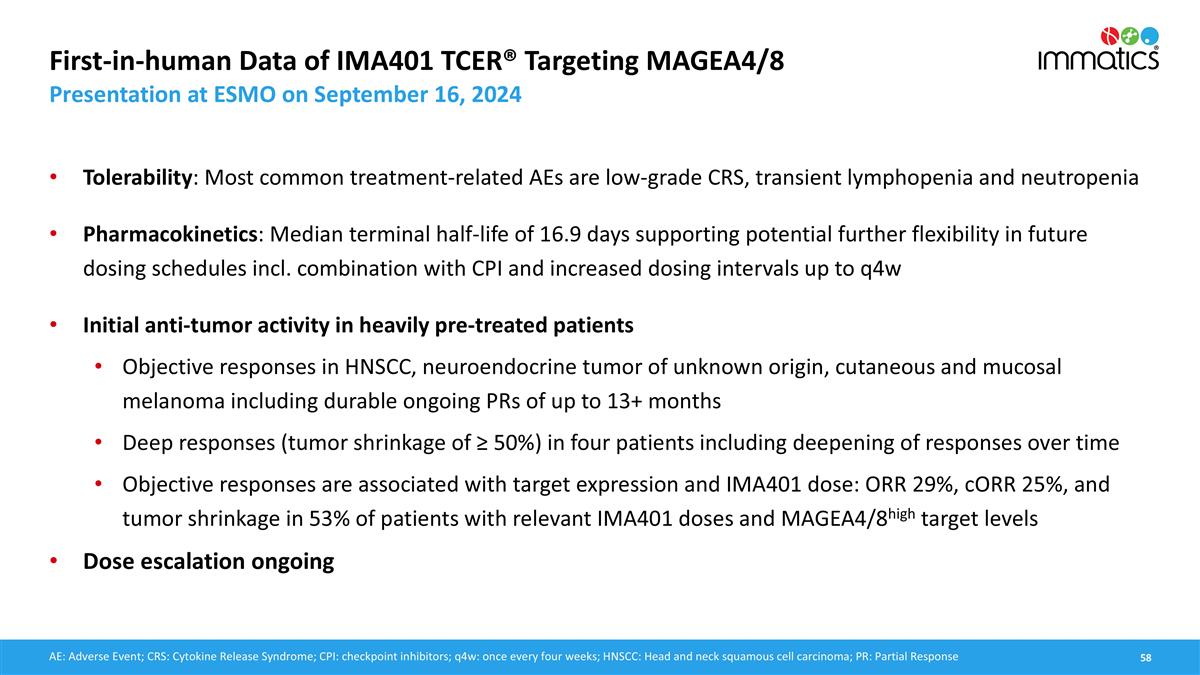
First-in-human Data of IMA401
TCER® Targeting MAGEA4/8 Presentation at ESMO on September 16, 2024 Tolerability: Most common treatment-related AEs are low-grade CRS, transient lymphopenia and neutropenia Pharmacokinetics: Median terminal half-life of 16.9 days supporting
potential further flexibility in future dosing schedules incl. combination with CPI and increased dosing intervals up to q4w Initial anti-tumor activity in heavily pre-treated patients Objective responses in HNSCC, neuroendocrine tumor of unknown
origin, cutaneous and mucosal melanoma including durable ongoing PRs of up to 13+ months Deep responses (tumor shrinkage of ≥ 50%) in four patients including deepening of responses over time Objective responses are associated with target
expression and IMA401 dose: ORR 29%, cORR 25%, and tumor shrinkage in 53% of patients with relevant IMA401 doses and MAGEA4/8high target levels Dose escalation ongoing AE: Adverse Event; CRS: Cytokine Release Syndrome; CPI: checkpoint inhibitors;
q4w: once every four weeks; HNSCC: Head and neck squamous cell carcinoma; PR: Partial Response
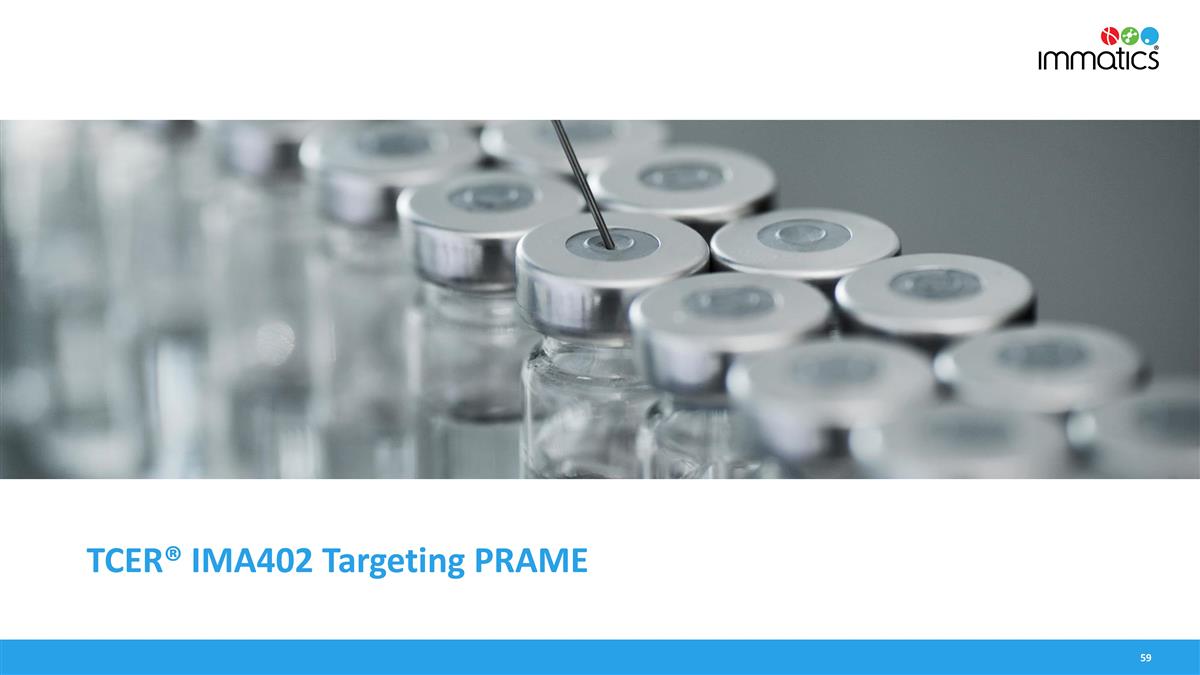
TCER® IMA402 Targeting PRAME
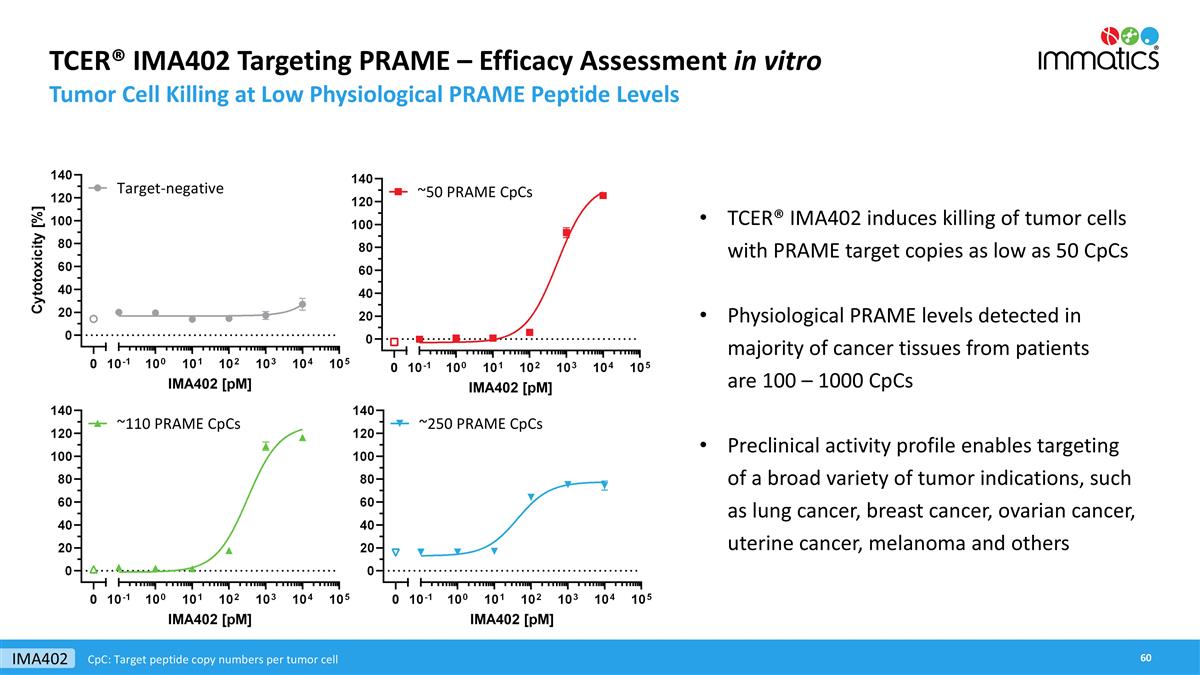
TCER® IMA402 Targeting PRAME
– Efficacy Assessment in vitro Tumor Cell Killing at Low Physiological PRAME Peptide Levels TCER® IMA402 induces killing of tumor cells with PRAME target copies as low as 50 CpCs Physiological PRAME levels detected in majority of cancer
tissues from patients are 100 – 1000 CpCs Preclinical activity profile enables targeting of a broad variety of tumor indications, such as lung cancer, breast cancer, ovarian cancer, uterine cancer, melanoma and others IMA402 CpC: Target
peptide copy numbers per tumor cell
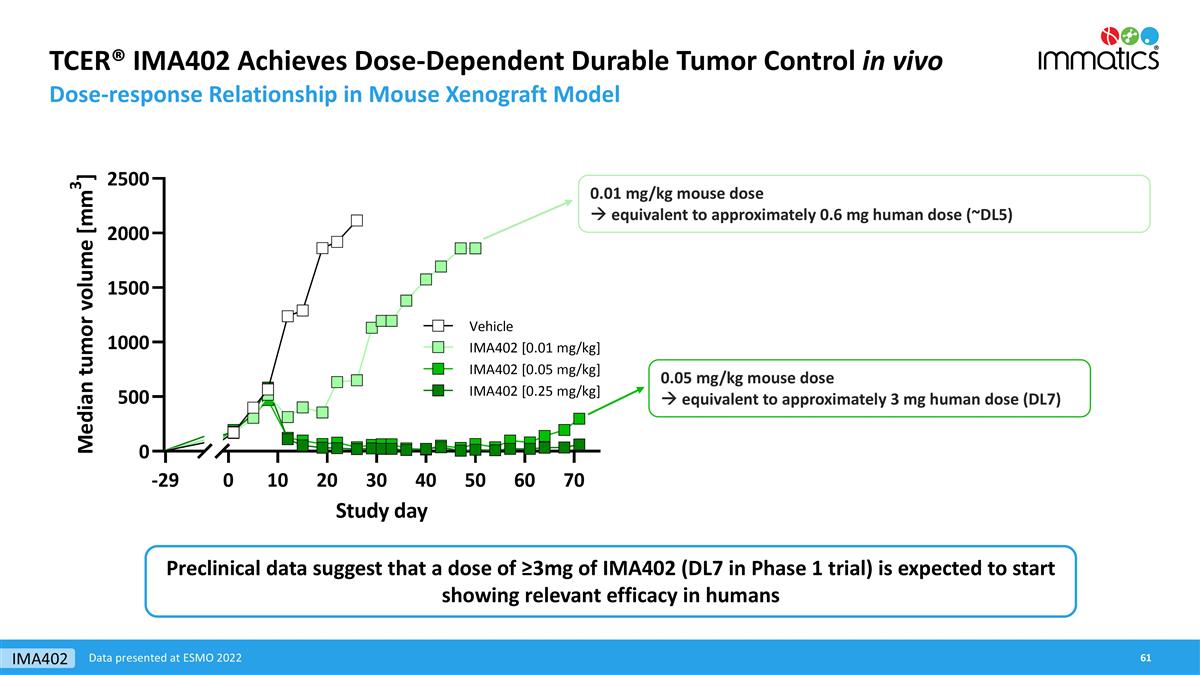
TCER® IMA402 Achieves
Dose-Dependent Durable Tumor Control in vivo Dose-response Relationship in Mouse Xenograft Model 0.01 mg/kg mouse dose à equivalent to approximately 0.6 mg human dose (~DL5) 0.05 mg/kg mouse dose à equivalent to approximately 3 mg human
dose (DL7) Data presented at ESMO 2022 Preclinical data suggest that a dose of ≥3mg of IMA402 (DL7 in Phase 1 trial) is expected to start showing relevant efficacy in humans IMA402
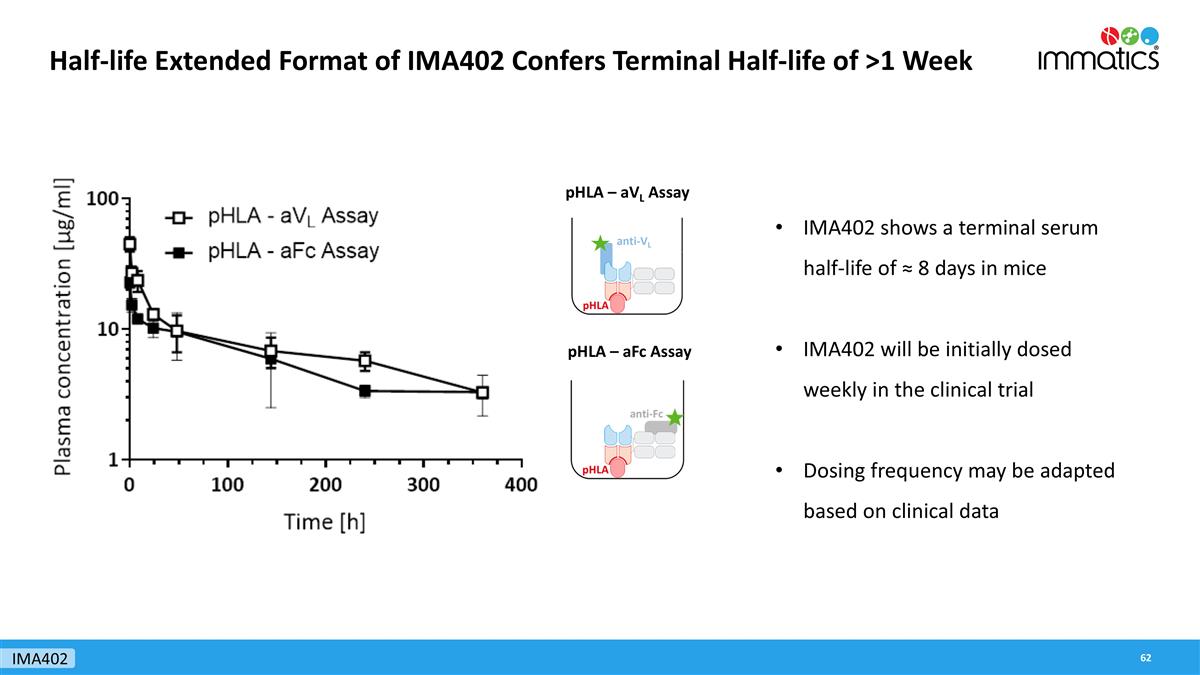
Half-life Extended Format of IMA402
Confers Terminal Half-life of >1 Week pHLA – aVL Assay pHLA – aFc Assay IMA402 shows a terminal serum half-life of ≈ 8 days in mice IMA402 will be initially dosed weekly in the clinical trial Dosing frequency may be adapted
based on clinical data IMA402
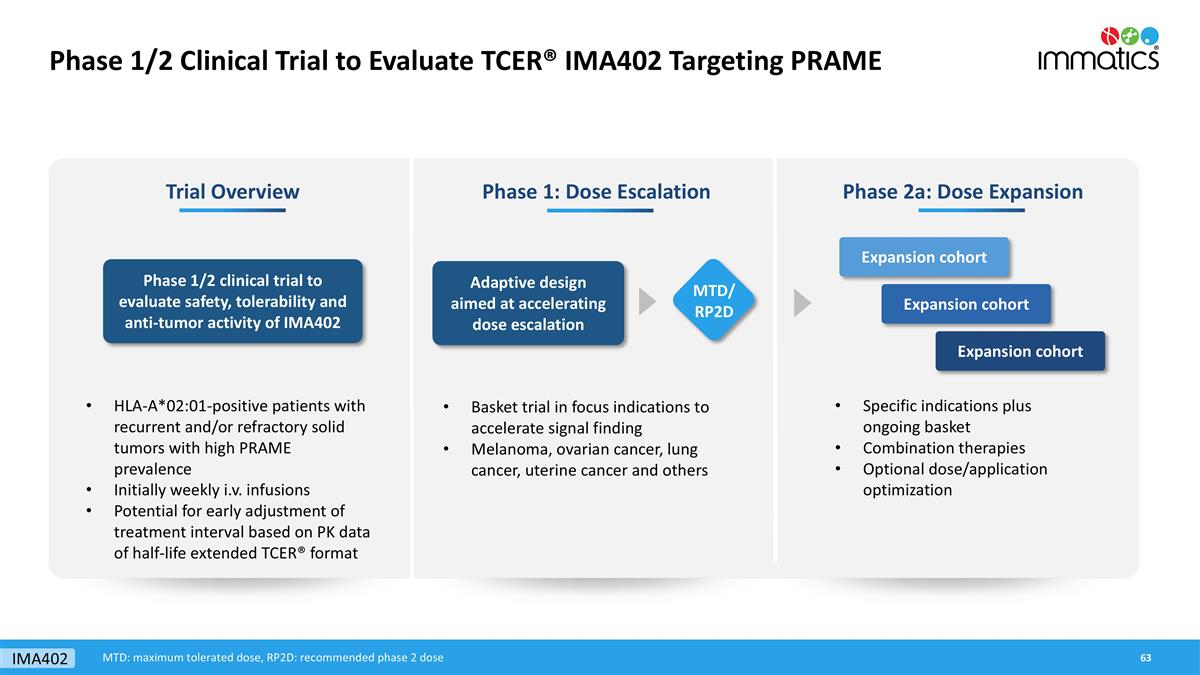
Phase 1/2 Clinical Trial to
Evaluate TCER® IMA402 Targeting PRAME Phase 1: Dose Escalation Phase 2a: Dose Expansion Adaptive design aimed at accelerating dose escalation Specific indications plus ongoing basket Combination therapies Optional dose/application optimization
Expansion cohort Expansion cohort Expansion cohort Trial Overview Phase 1/2 clinical trial to evaluate safety, tolerability and anti-tumor activity of IMA402 HLA-A*02:01-positive patients with recurrent and/or refractory solid tumors with high PRAME
prevalence Initially weekly i.v. infusions Potential for early adjustment of treatment interval based on PK data of half-life extended TCER® format MTD/ RP2D IMA402 Basket trial in focus indications to accelerate signal finding Melanoma,
ovarian cancer, lung cancer, uterine cancer and others MTD: maximum tolerated dose, RP2D: recommended phase 2 dose
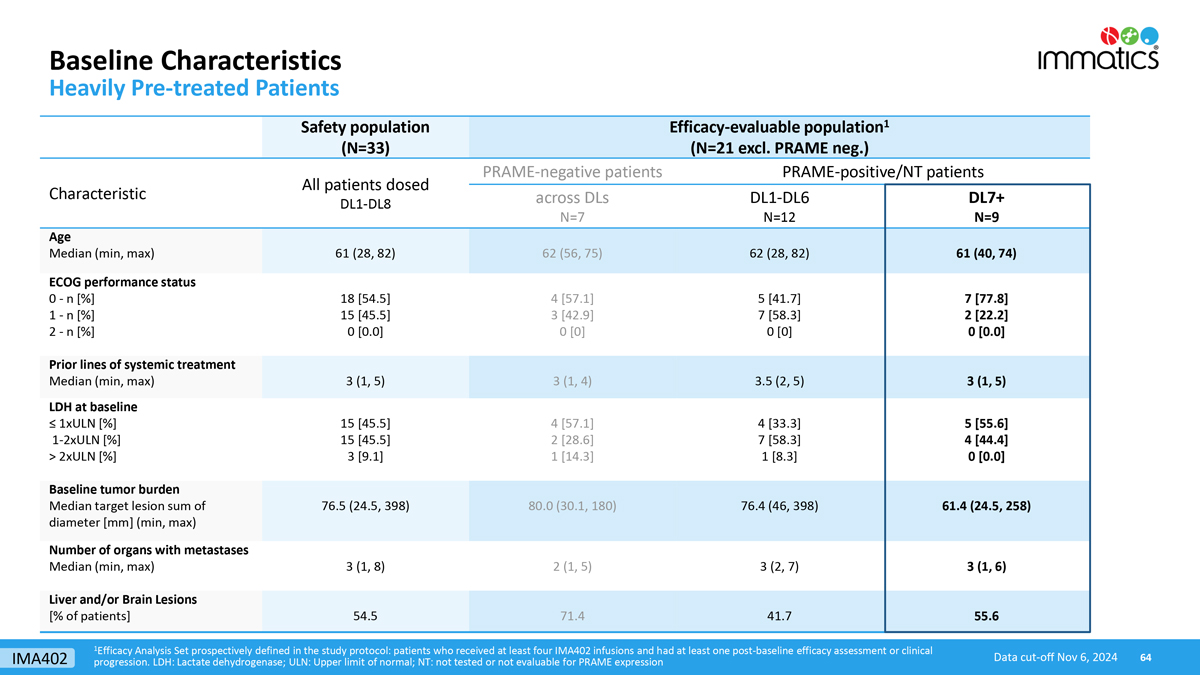
Baseline Characteristics Heavily
Pre-treated Patients 1Efficacy Analysis Set prospectively defined in the study protocol: patients who received at least four IMA402 infusions and had at least one post-baseline efficacy assessment or clinical progression. LDH: Lactate dehydrogenase;
ULN: Upper limit of normal; NT: not tested or not evaluable for PRAME expression Data cut-off Nov 6, 2024 Safety population (N=33) Efficacy-evaluable population1 (N=21 excl. PRAME neg.) Characteristic All patients dosed DL1-DL8 PRAME-negative
patients PRAME-positive/NT patients across DLs N=7 DL1-DL6 N=12 DL7+ N=9 Age Median (min, max) 61 (28, 82) 62 (56, 75) 62 (28, 82) 61 (40, 74) ECOG performance status 0 - n [%] 1 - n [%] 2 - n [%] 18 [54.5] 15 [45.5] 0 [0.0] 4 [57.1] 3 [42.9]
0 [0] 5 [41.7] 7 [58.3] 0 [0] 7 [77.8] 2 [22.2] 0 [0.0] Prior lines of systemic treatment Median (min, max) 3 (1, 5) 3 (1, 4) 3.5 (2, 5) 3 (1, 5) LDH at baseline ≤ 1xULN [%] 1-2xULN [%] > 2xULN [%] 15 [45.5] 15 [45.5] 3 [9.1] 4 [57.1]
2 [28.6] 1 [14.3] 4 [33.3] 7 [58.3] 1 [8.3] 5 [55.6] 4 [44.4] 0 [0.0] Baseline tumor burden Median target lesion sum of diameter [mm] (min, max) 76.5 (24.5, 398) 80.0 (30.1, 180) 76.4 (46, 398) 61.4 (24.5, 258) Number of organs with metastases
Median (min, max) 3 (1, 8) 2 (1, 5) 3 (2, 7) 3 (1, 6) Liver and/or Brain Lesions [% of patients] 54.5 71.4 41.7 55.6 IMA402
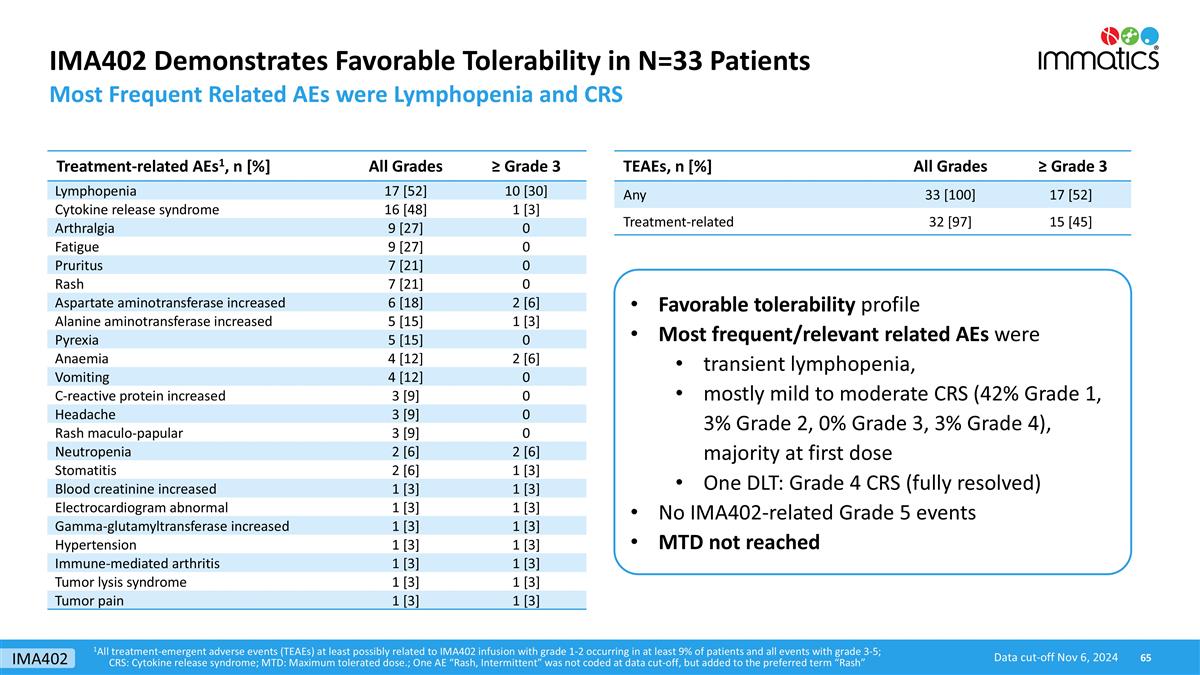
IMA402 Demonstrates Favorable
Tolerability in N=33 Patients Most Frequent Related AEs were Lymphopenia and CRS TEAEs, n [%] All Grades ≥ Grade 3 Any 33 [100] 17 [52] Treatment-related 32 [97] 15 [45] Treatment-related AEs1, n [%] All Grades ≥ Grade 3 Lymphopenia 17
[52] 10 [30] Cytokine release syndrome 16 [48] 1 [3] Arthralgia 9 [27] 0 Fatigue 9 [27] 0 Pruritus 7 [21] 0 Rash 7 [21] 0 Aspartate aminotransferase increased 6 [18] 2 [6] Alanine aminotransferase increased 5 [15] 1 [3] Pyrexia 5 [15] 0 Anaemia 4
[12] 2 [6] Vomiting 4 [12] 0 C-reactive protein increased 3 [9] 0 Headache 3 [9] 0 Rash maculo-papular 3 [9] 0 Neutropenia 2 [6] 2 [6] Stomatitis 2 [6] 1 [3] Blood creatinine increased 1 [3] 1 [3] Electrocardiogram abnormal 1 [3] 1 [3]
Gamma-glutamyltransferase increased 1 [3] 1 [3] Hypertension 1 [3] 1 [3] Immune-mediated arthritis 1 [3] 1 [3] Tumor lysis syndrome 1 [3] 1 [3] Tumor pain 1 [3] 1 [3] Favorable tolerability profile Most frequent/relevant related AEs were transient
lymphopenia, mostly mild to moderate CRS (42% Grade 1, 3% Grade 2, 0% Grade 3, 3% Grade 4), majority at first dose One DLT: Grade 4 CRS (fully resolved) No IMA402-related Grade 5 events MTD not reached 1All treatment-emergent adverse events (TEAEs)
at least possibly related to IMA402 infusion with grade 1-2 occurring in at least 9% of patients and all events with grade 3-5; CRS: Cytokine release syndrome; MTD: Maximum tolerated dose.; One AE “Rash, Intermittent” was not coded
at data cut-off, but added to the preferred term “Rash” Data cut-off Nov 6, 2024 IMA402
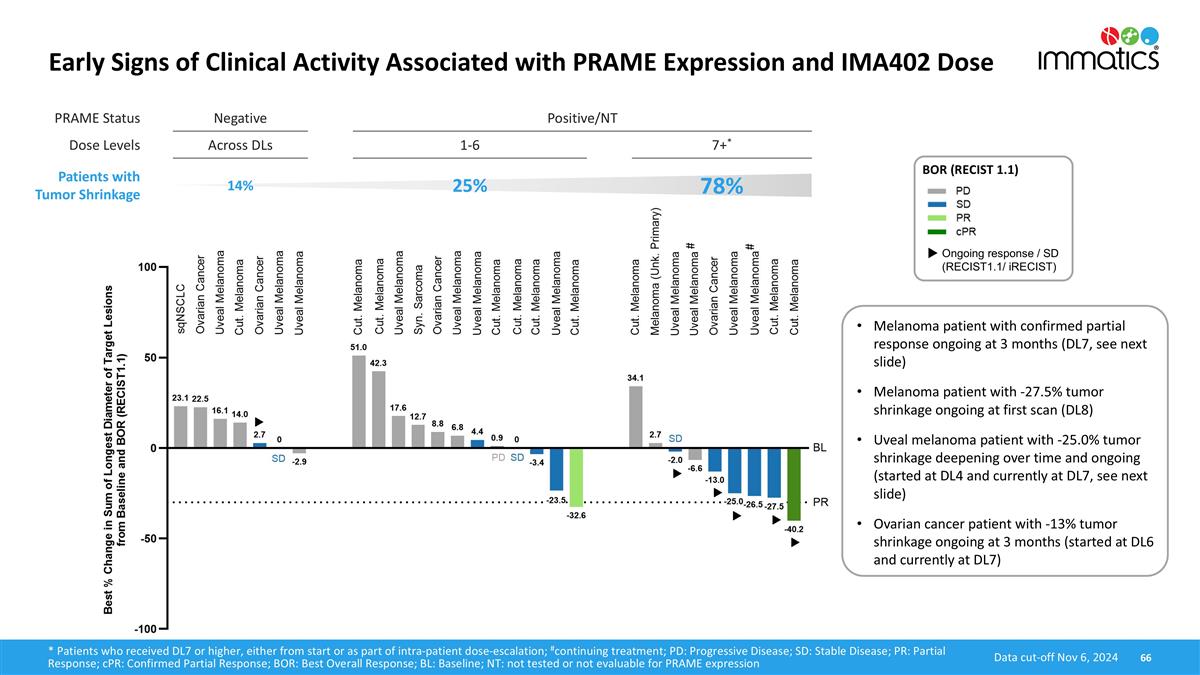
PRAME Status Negative Positive/NT
Dose Levels Across DLs 1-6 7+* Patients with Tumor Shrinkage 14% 25% 78% Early Signs of Clinical Activity Associated with PRAME Expression and IMA402 Dose 66 BOR (RECIST 1.1) Ongoing response / SD (RECIST1.1/ iRECIST) Data cut-off Nov 6, 2024 *
Patients who received DL7 or higher, either from start or as part of intra-patient dose-escalation; #continuing treatment; PD: Progressive Disease; SD: Stable Disease; PR: Partial Response; cPR: Confirmed Partial Response; BOR: Best Overall
Response; BL: Baseline; NT: not tested or not evaluable for PRAME expression # # Melanoma patient with confirmed partial response ongoing at 3 months (DL7, see next slide) Melanoma patient with -27.5% tumor shrinkage ongoing at first scan (DL8)
Uveal melanoma patient with -25.0% tumor shrinkage deepening over time and ongoing (started at DL4 and currently at DL7, see next slide) Ovarian cancer patient with -13% tumor shrinkage ongoing at 3 months (started at DL6 and currently at DL7)
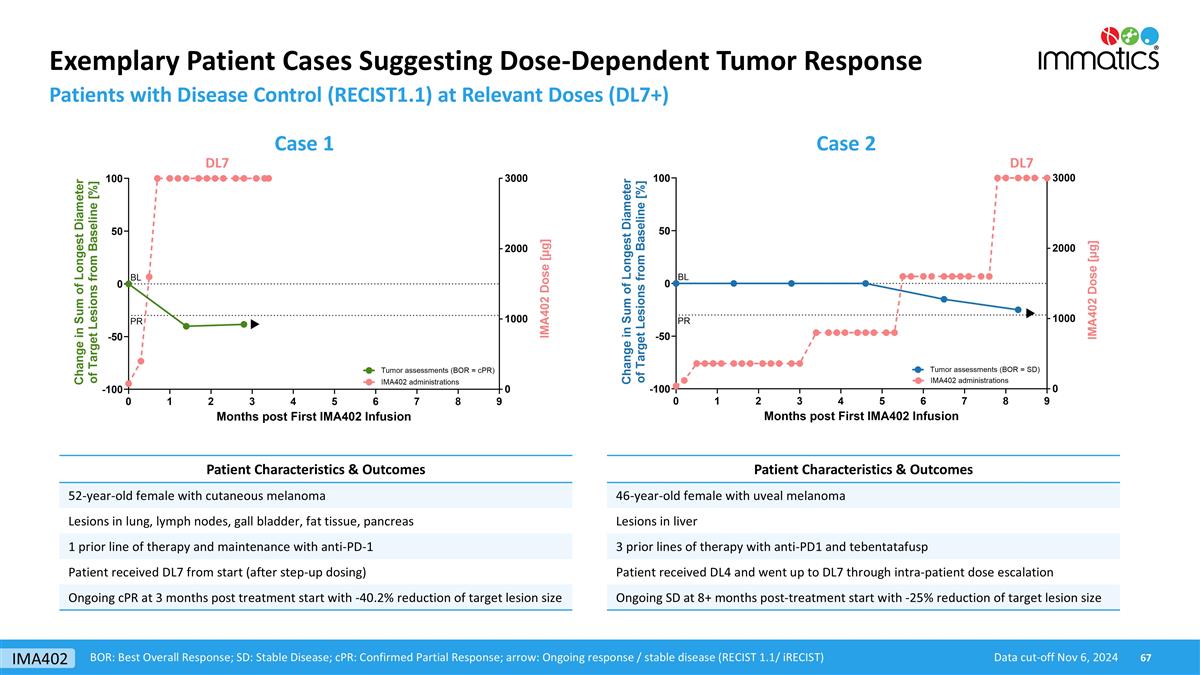
Exemplary Patient Cases Suggesting
Dose-Dependent Tumor Response Patients with Disease Control (RECIST1.1) at Relevant Doses (DL7+) Data cut-off Nov 6, 2024 BOR: Best Overall Response; SD: Stable Disease; cPR: Confirmed Partial Response; arrow: Ongoing response / stable disease
(RECIST 1.1/ iRECIST) Case 1 Case 2 DL7 DL7 Patient Characteristics & Outcomes 52-year-old female with cutaneous melanoma Lesions in lung, lymph nodes, gall bladder, fat tissue, pancreas 1 prior line of therapy and maintenance with anti-PD-1
Patient received DL7 from start (after step-up dosing) Ongoing cPR at 3 months post treatment start with -40.2% reduction of target lesion size Patient Characteristics & Outcomes 46-year-old female with uveal melanoma Lesions in liver 3 prior
lines of therapy with anti-PD1 and tebentatafusp Patient received DL4 and went up to DL7 through intra-patient dose escalation Ongoing SD at 8+ months post-treatment start with -25% reduction of target lesion size IMA402
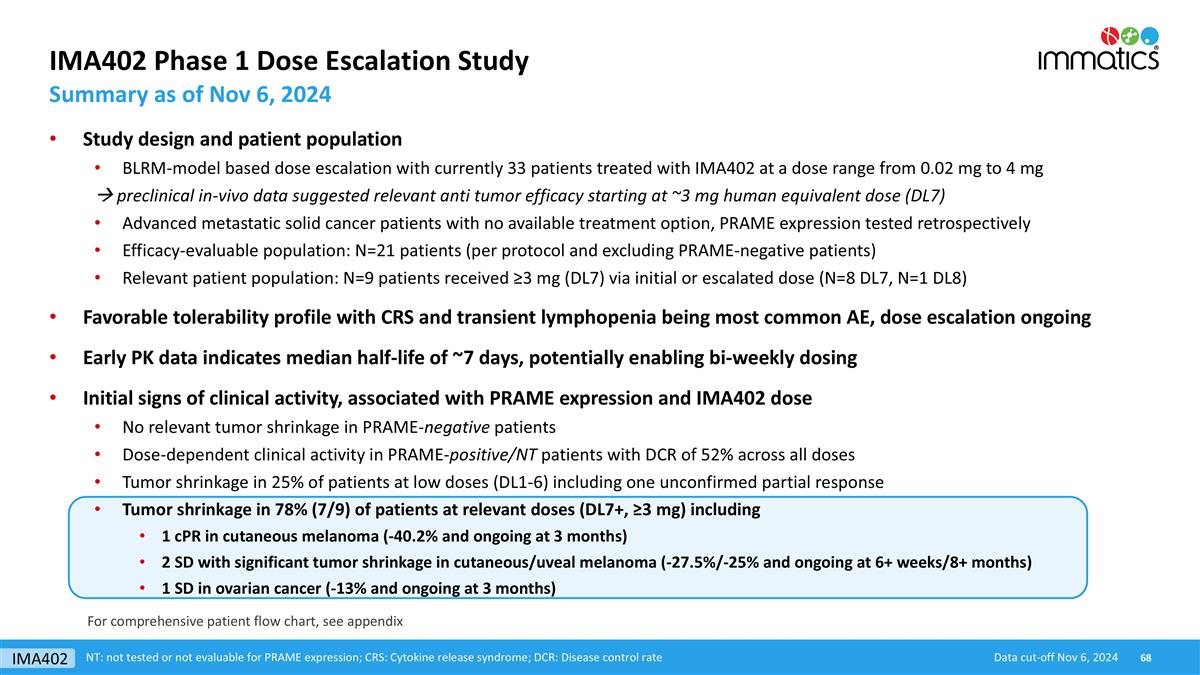
IMA402 Phase 1 Dose Escalation
Study Summary as of Nov 6, 2024 Data cut-off Nov 6, 2024 NT: not tested or not evaluable for PRAME expression; CRS: Cytokine release syndrome; DCR: Disease control rate For comprehensive patient flow chart, see appendix Study design and patient
population BLRM-model based dose escalation with currently 33 patients treated with IMA402 at a dose range from 0.02 mg to 4 mg à preclinical in-vivo data suggested relevant anti tumor efficacy starting at ~3 mg human equivalent dose (DL7)
Advanced metastatic solid cancer patients with no available treatment option, PRAME expression tested retrospectively Efficacy-evaluable population: N=21 patients (per protocol and excluding PRAME-negative patients) Relevant patient population: N=9
patients received ≥3 mg (DL7) via initial or escalated dose (N=8 DL7, N=1 DL8) Favorable tolerability profile with CRS and transient lymphopenia being most common AE, dose escalation ongoing Early PK data indicates median half-life of ~7 days,
potentially enabling bi-weekly dosing Initial signs of clinical activity, associated with PRAME expression and IMA402 dose No relevant tumor shrinkage in PRAME-negative patients Dose-dependent clinical activity in PRAME-positive/NT patients with DCR
of 52% across all doses Tumor shrinkage in 25% of patients at low doses (DL1-6) including one unconfirmed partial response Tumor shrinkage in 78% (7/9) of patients at relevant doses (DL7+, ≥3 mg) including 1 cPR in cutaneous melanoma (-40.2%
and ongoing at 3 months) 2 SD with significant tumor shrinkage in cutaneous/uveal melanoma (-27.5%/-25% and ongoing at 6+ weeks/8+ months) 1 SD in ovarian cancer (-13% and ongoing at 3 months) IMA402
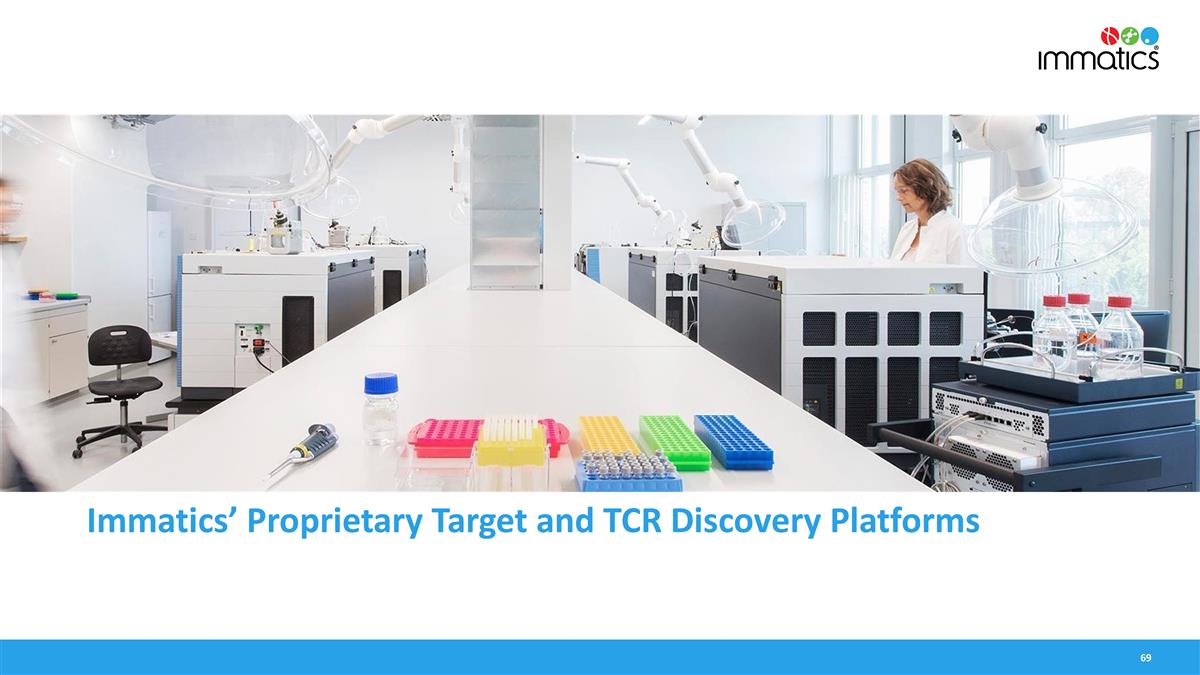
Immatics’ Proprietary Target
and TCR Discovery Platforms
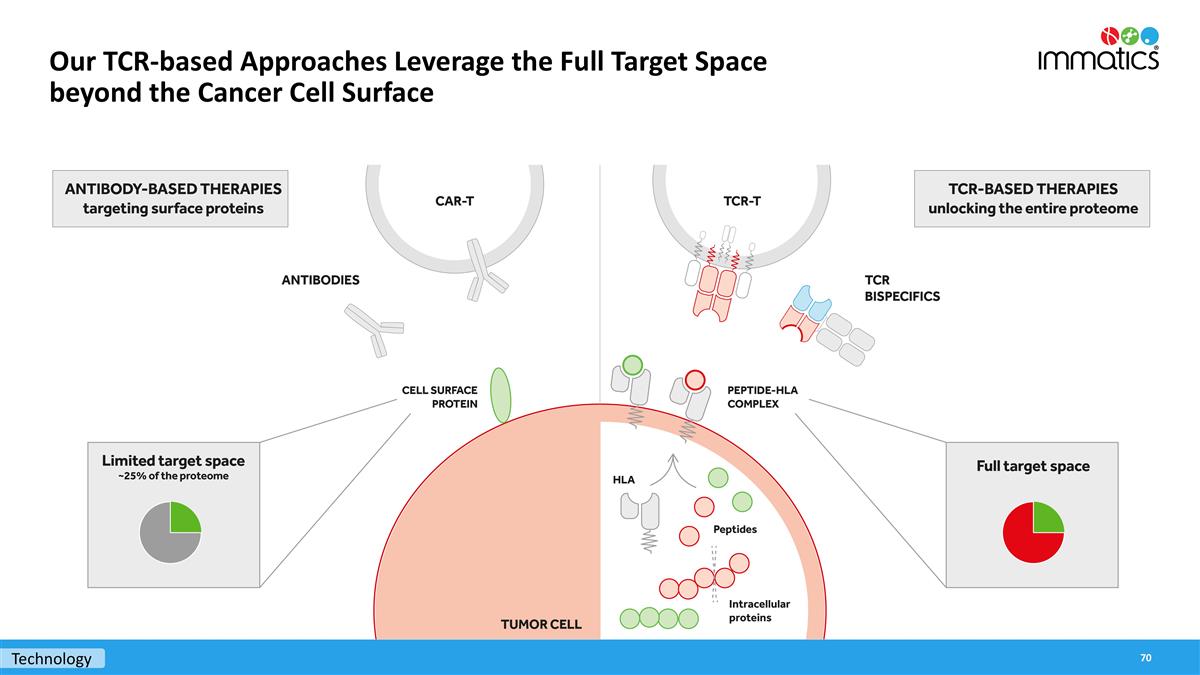
Our TCR-based Approaches Leverage
the Full Target Space beyond the Cancer Cell Surface Technology
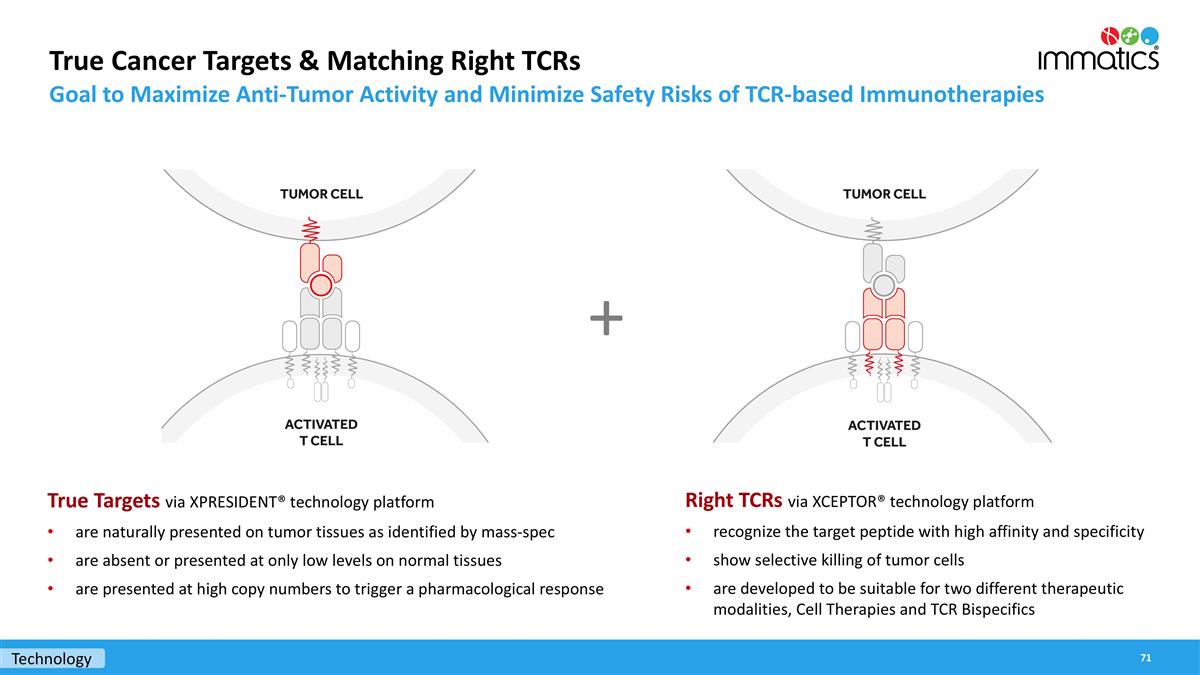
True Cancer Targets & Matching
Right TCRs Goal to Maximize Anti-Tumor Activity and Minimize Safety Risks of TCR-based Immunotherapies True Targets via XPRESIDENT® technology platform are naturally presented on tumor tissues as identified by mass-spec are absent or presented
at only low levels on normal tissues are presented at high copy numbers to trigger a pharmacological response + Technology Right TCRs via XCEPTOR® technology platform recognize the target peptide with high affinity and specificity show
selective killing of tumor cells are developed to be suitable for two different therapeutic modalities, Cell Therapies and TCR Bispecifics
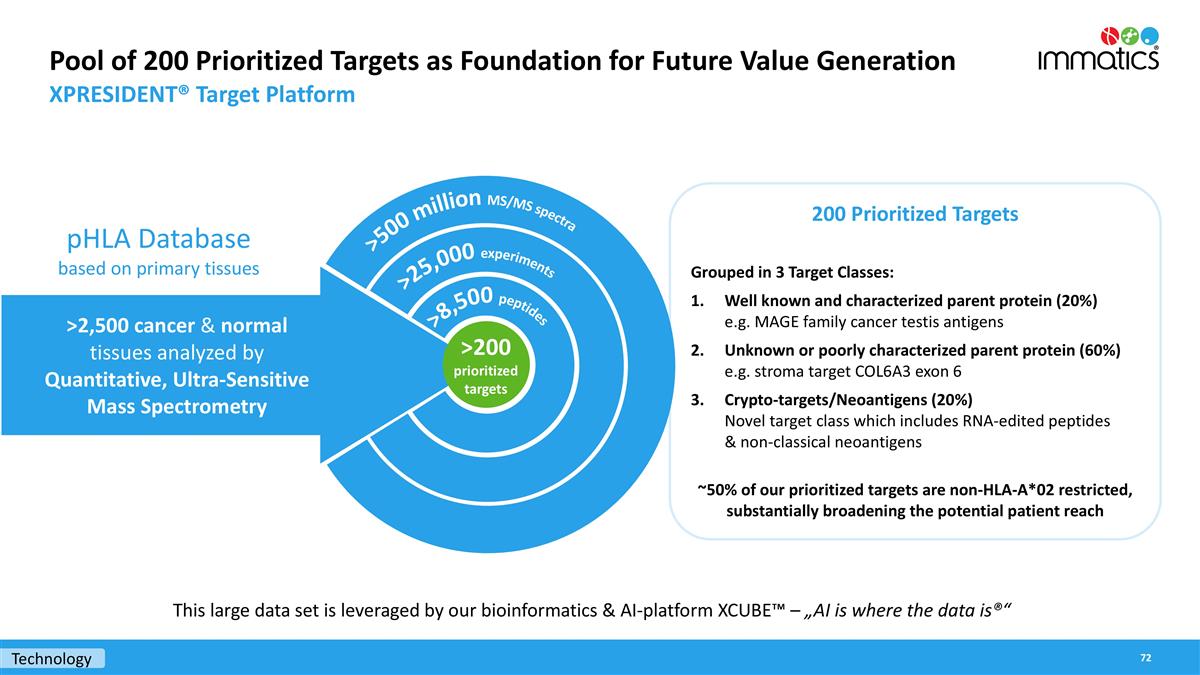
Technology Pool of 200 Prioritized
Targets as Foundation for Future Value Generation XPRESIDENT® Target Platform 200 Prioritized Targets Grouped in 3 Target Classes: Well known and characterized parent protein (20%) e.g. MAGE family cancer testis antigens Unknown or poorly
characterized parent protein (60%) e.g. stroma target COL6A3 exon 6 Crypto-targets/Neoantigens (20%) Novel target class which includes RNA-edited peptides & non-classical neoantigens ~50% of our prioritized targets are non-HLA-A*02
restricted, substantially broadening the potential patient reach >500 million MS/MS spectra >25,000 experiments >8,500 peptides >2,500 cancer & normal tissues analyzed by Quantitative, Ultra-Sensitive Mass Spectrometry pHLA Database
based on primary tissues >200 prioritized targets This large data set is leveraged by our bioinformatics & AI-platform XCUBE™ – „AI is where the data is®“
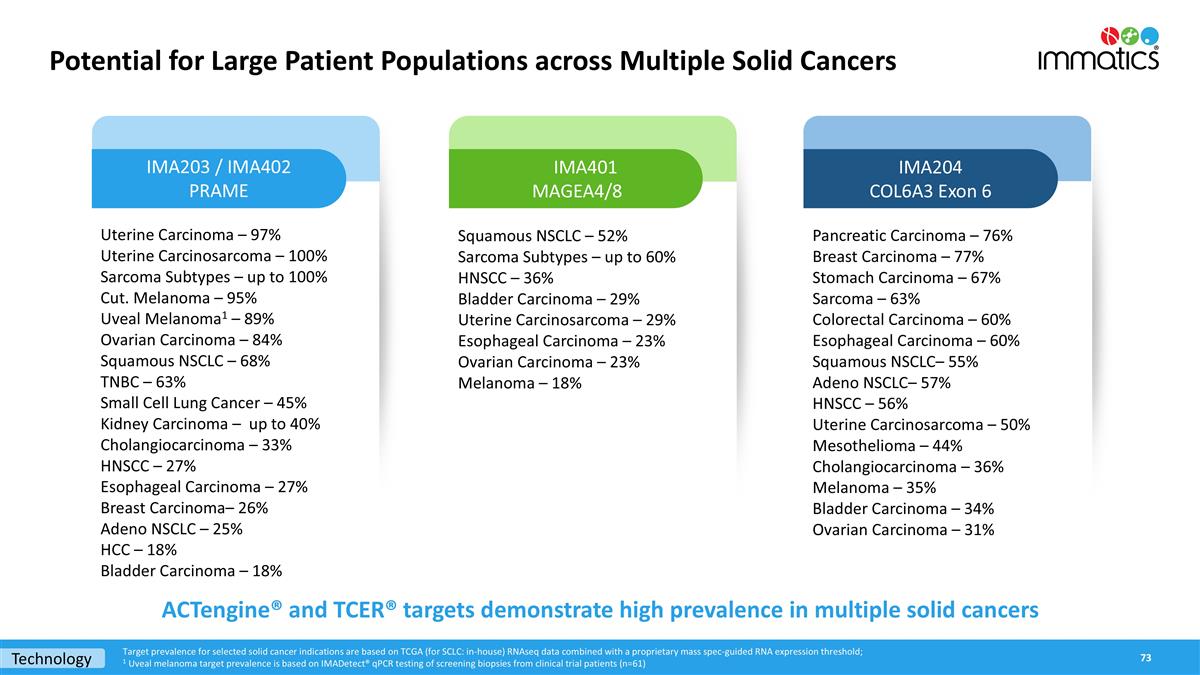
Potential for Large Patient
Populations across Multiple Solid Cancers Uterine Carcinoma – 97% Uterine Carcinosarcoma – 100% Sarcoma Subtypes – up to 100% Cut. Melanoma – 95% Uveal Melanoma1 – 89% Ovarian Carcinoma – 84% Squamous NSCLC
– 68% TNBC – 63% Small Cell Lung Cancer – 45% Kidney Carcinoma – up to 40% Cholangiocarcinoma – 33% HNSCC – 27% Esophageal Carcinoma – 27% Breast Carcinoma– 26% Adeno NSCLC – 25% HCC
– 18% Bladder Carcinoma – 18% Squamous NSCLC – 52% Sarcoma Subtypes – up to 60% HNSCC – 36% Bladder Carcinoma – 29% Uterine Carcinosarcoma – 29% Esophageal Carcinoma – 23% Ovarian Carcinoma – 23%
Melanoma – 18% IMA203 / IMA402 PRAME IMA401 MAGEA4/8 IMA204 COL6A3 Exon 6 ACTengine® and TCER® targets demonstrate high prevalence in multiple solid cancers Target prevalence for selected solid cancer indications are based on TCGA
(for SCLC: in-house) RNAseq data combined with a proprietary mass spec-guided RNA expression threshold; 1 Uveal melanoma target prevalence is based on IMADetect® qPCR testing of screening biopsies from clinical trial patients (n=61) Pancreatic
Carcinoma – 76% Breast Carcinoma – 77% Stomach Carcinoma – 67% Sarcoma – 63% Colorectal Carcinoma – 60% Esophageal Carcinoma – 60% Squamous NSCLC– 55% Adeno NSCLC– 57% HNSCC – 56% Uterine
Carcinosarcoma – 50% Mesothelioma – 44% Cholangiocarcinoma – 36% Melanoma – 35% Bladder Carcinoma – 34% Ovarian Carcinoma – 31% Technology
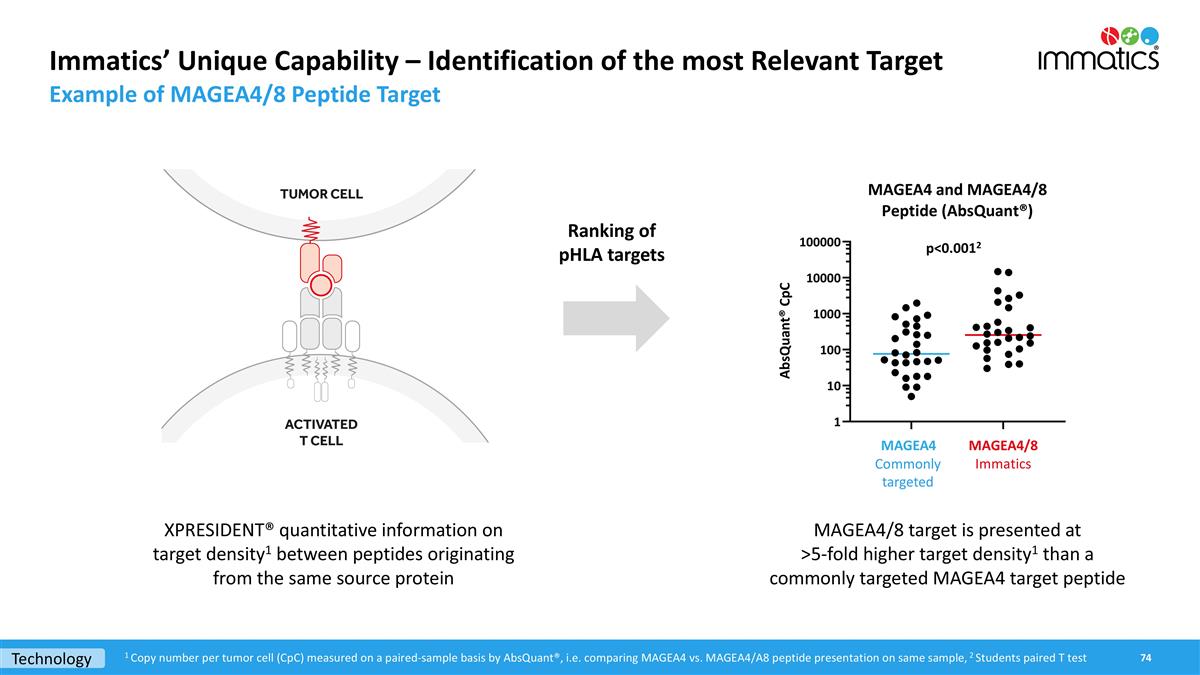
Immatics’ Unique Capability
– Identification of the most Relevant Target Example of MAGEA4/8 Peptide Target 1 Copy number per tumor cell (CpC) measured on a paired-sample basis by AbsQuant®, i.e. comparing MAGEA4 vs. MAGEA4/A8 peptide presentation on same sample, 2
Students paired T test p<0.0012 Technology MAGEA4/8 target is presented at >5-fold higher target density1 than a commonly targeted MAGEA4 target peptide XPRESIDENT® quantitative information on target density1 between peptides originating
from the same source protein Ranking of pHLA targets Commonly targeted
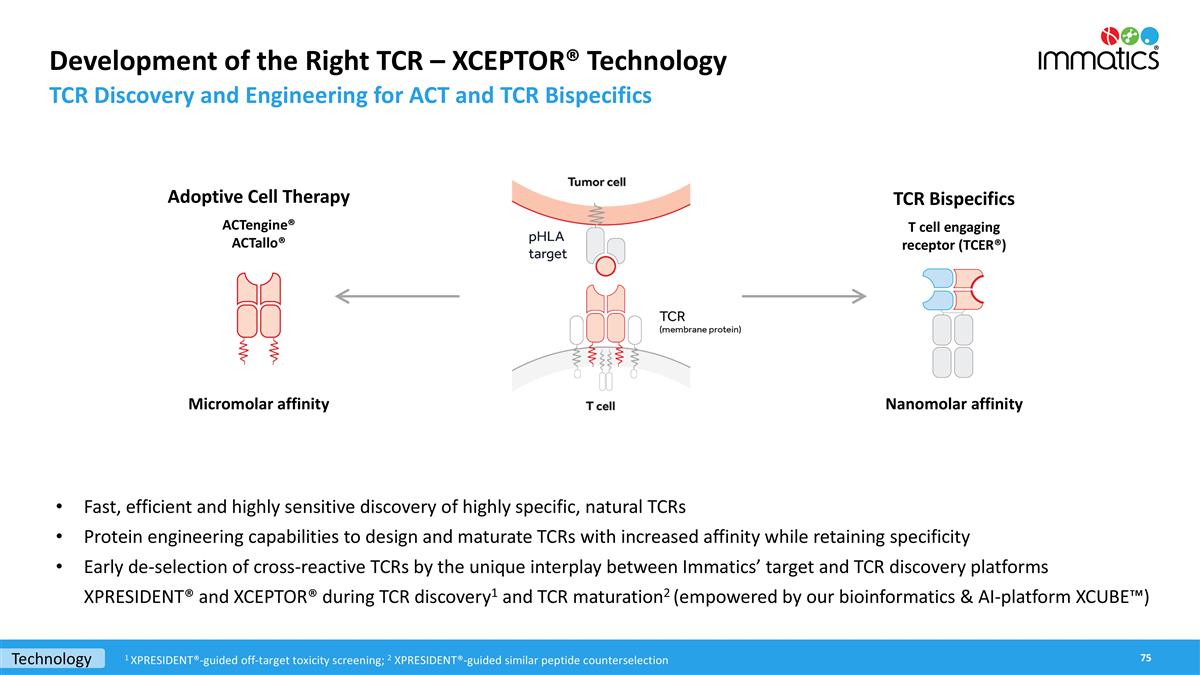
Development of the Right TCR
– XCEPTOR® Technology TCR Discovery and Engineering for ACT and TCR Bispecifics TCR Bispecifics T cell engaging receptor (TCER®) Adoptive Cell Therapy ACTengine® ACTallo® Fast, efficient and highly sensitive discovery of
highly specific, natural TCRs Protein engineering capabilities to design and maturate TCRs with increased affinity while retaining specificity Early de-selection of cross-reactive TCRs by the unique interplay between Immatics’ target and TCR
discovery platforms XPRESIDENT® and XCEPTOR® during TCR discovery1 and TCR maturation2 (empowered by our bioinformatics & AI-platform XCUBE™) Micromolar affinity Nanomolar affinity Technology 1 XPRESIDENT®-guided off-target
toxicity screening; 2 XPRESIDENT®-guided similar peptide counterselection
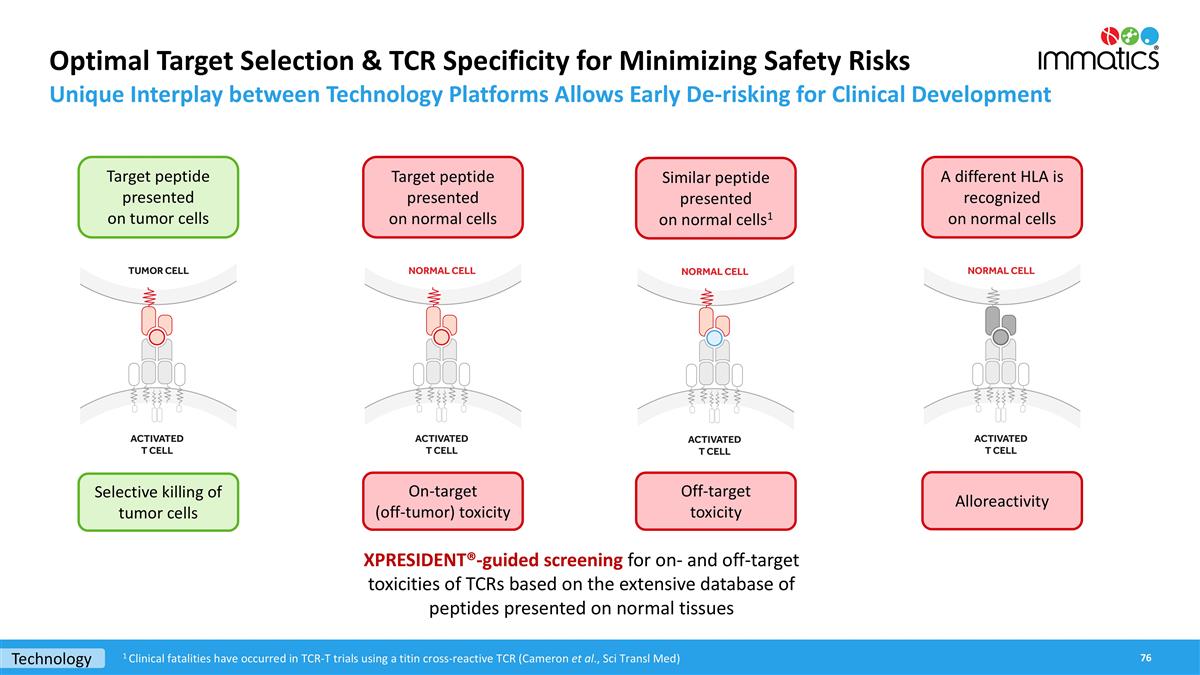
Optimal Target Selection & TCR
Specificity for Minimizing Safety Risks Unique Interplay between Technology Platforms Allows Early De-risking for Clinical Development Target peptide presented on tumor cells Selective killing of tumor cells Target peptide presented on normal cells
Off-target toxicity On-target (off-tumor) toxicity A different HLA is recognized on normal cells Alloreactivity Similar peptide presented on normal cells1 XPRESIDENT®-guided screening for on- and off-target toxicities of TCRs based on the
extensive database of peptides presented on normal tissues Technology 1 Clinical fatalities have occurred in TCR-T trials using a titin cross-reactive TCR (Cameron et al., Sci Transl Med)
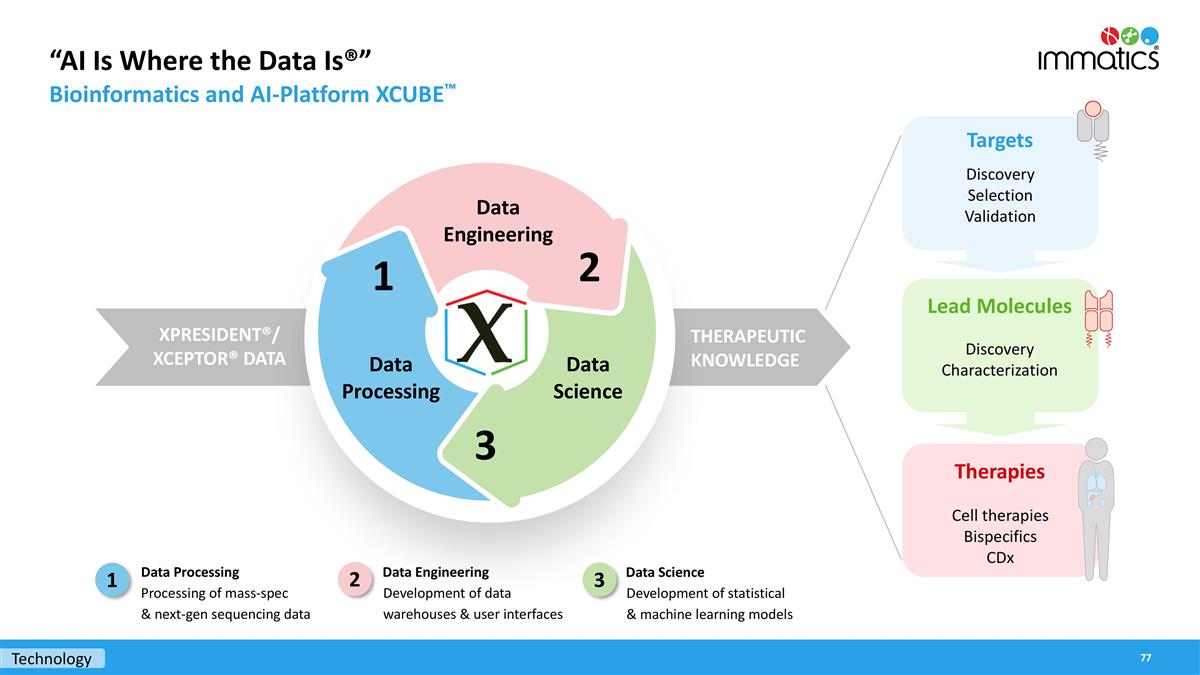
“AI Is Where the Data
Is®” Bioinformatics and AI-Platform XCUBE™ Data Engineering Development of data warehouses & user interfaces Data Science Development of statistical & machine learning models Data Processing Processing of mass-spec &
next-gen sequencing data 1 THERAPEUTIC KNOWLEDGE XPRESIDENT®/ XCEPTOR® DATA Data Engineering Data Science Data Processing 2 3 1 Cell therapies Bispecifics CDx Therapies Targets Lead Molecules Discovery Characterization Discovery Selection
Validation 2 3 Technology
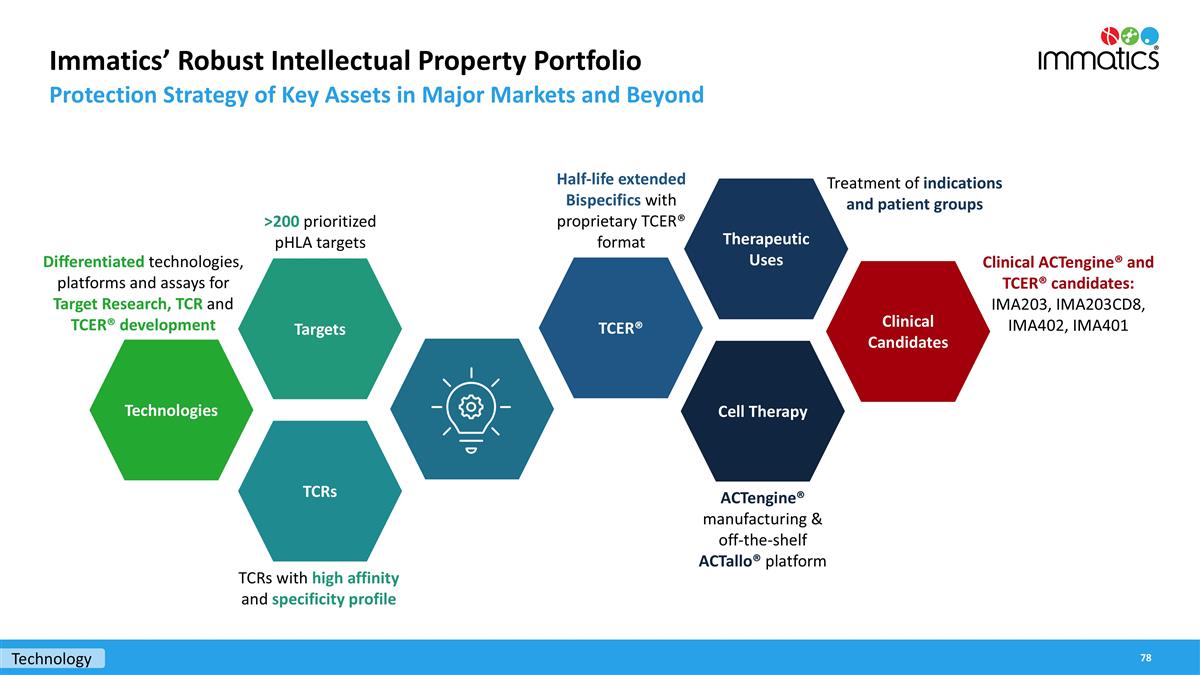
Immatics’ Robust Intellectual
Property Portfolio Protection Strategy of Key Assets in Major Markets and Beyond Technologies Targets TCRs TCER® Therapeutic Uses Cell Therapy TCRs with high affinity and specificity profile Differentiated technologies, platforms and
assays for Target Research, TCR and TCER® development >200 prioritized pHLA targets Half-life extended Bispecifics with proprietary TCER® format Treatment of indications and patient groups Clinical ACTengine® and
TCER® candidates: IMA203, IMA203CD8, IMA402, IMA401 Clinical Candidates ACTengine® manufacturing & off-the-shelf ACTallo® platform Technology

ACTengine® IMA204 –
TCR-T Targeting COL6A3 Exon 6
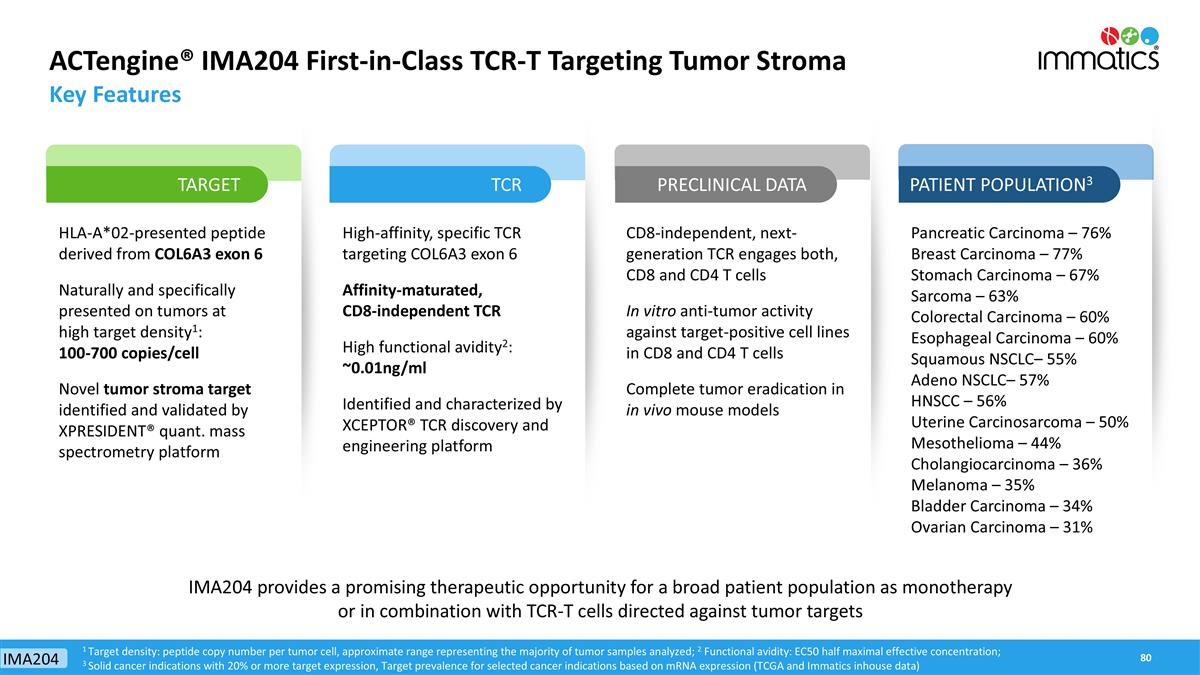
ACTengine® IMA204
First-in-Class TCR-T Targeting Tumor Stroma Key Features HLA-A*02-presented peptide derived from COL6A3 exon 6 Naturally and specifically presented on tumors at high target density1: 100-700 copies/cell Novel tumor stroma target identified and
validated by XPRESIDENT® quant. mass spectrometry platform High-affinity, specific TCR targeting COL6A3 exon 6 Affinity-maturated, CD8-independent TCR High functional avidity2: ~0.01ng/ml Identified and characterized by XCEPTOR® TCR
discovery and engineering platform CD8-independent, next-generation TCR engages both, CD8 and CD4 T cells In vitro anti-tumor activity against target-positive cell lines in CD8 and CD4 T cells Complete tumor eradication in in vivo mouse models
Pancreatic Carcinoma – 76% Breast Carcinoma – 77% Stomach Carcinoma – 67% Sarcoma – 63% Colorectal Carcinoma – 60% Esophageal Carcinoma – 60% Squamous NSCLC– 55% Adeno NSCLC– 57% HNSCC – 56%
Uterine Carcinosarcoma – 50% Mesothelioma – 44% Cholangiocarcinoma – 36% Melanoma – 35% Bladder Carcinoma – 34% Ovarian Carcinoma – 31% 1 Target density: peptide copy number per tumor cell, approximate range
representing the majority of tumor samples analyzed; 2 Functional avidity: EC50 half maximal effective concentration; 3 Solid cancer indications with 20% or more target expression, Target prevalence for selected cancer indications based on mRNA
expression (TCGA and Immatics inhouse data) TARGET TCR PRECLINICAL DATA PATIENT POPULATION3 IMA204 provides a promising therapeutic opportunity for a broad patient population as monotherapy or in combination with TCR-T cells directed against tumor
targets IMA204
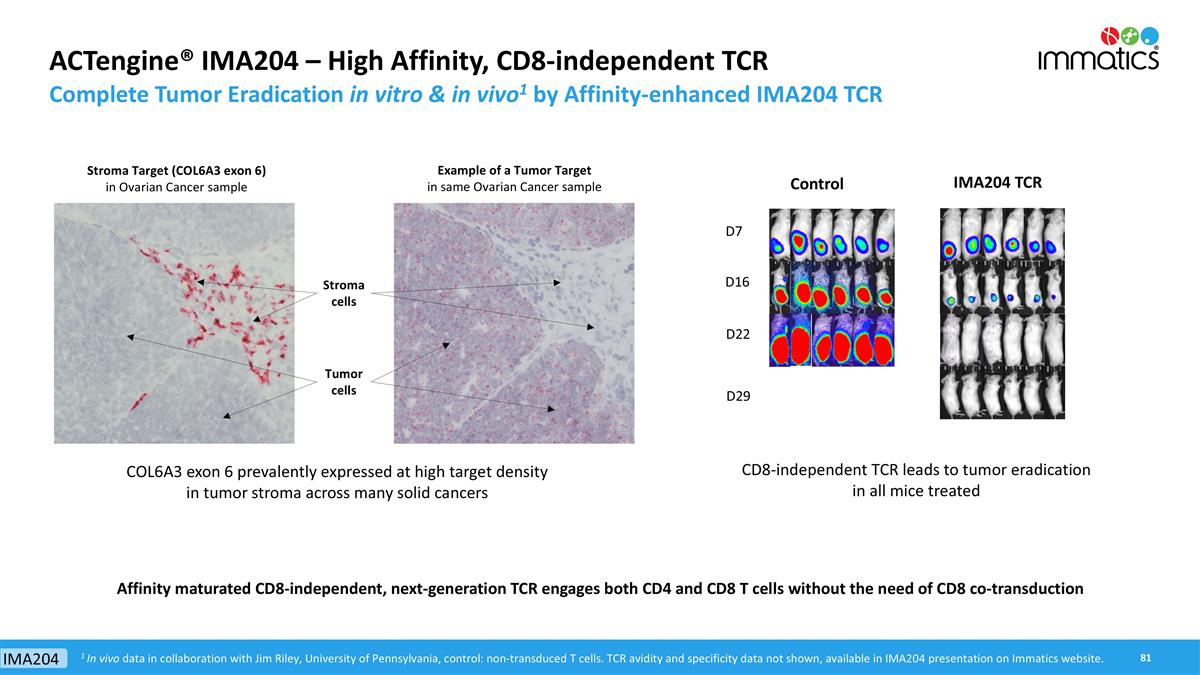
ACTengine® IMA204 – High
Affinity, CD8-independent TCR Complete Tumor Eradication in vitro & in vivo1 by Affinity-enhanced IMA204 TCR CD8-independent TCR leads to tumor eradication in all mice treated Control IMA204 TCR D7 D16 D22 D29 Affinity maturated CD8-independent,
next-generation TCR engages both CD4 and CD8 T cells without the need of CD8 co-transduction Stroma cells Tumor cells Stroma Target (COL6A3 exon 6) in Ovarian Cancer sample Example of a Tumor Target in same Ovarian Cancer sample 1 In vivo data in
collaboration with Jim Riley, University of Pennsylvania, control: non-transduced T cells. TCR avidity and specificity data not shown, available in IMA204 presentation on Immatics website. COL6A3 exon 6 prevalently expressed at high target density
in tumor stroma across many solid cancers IMA204
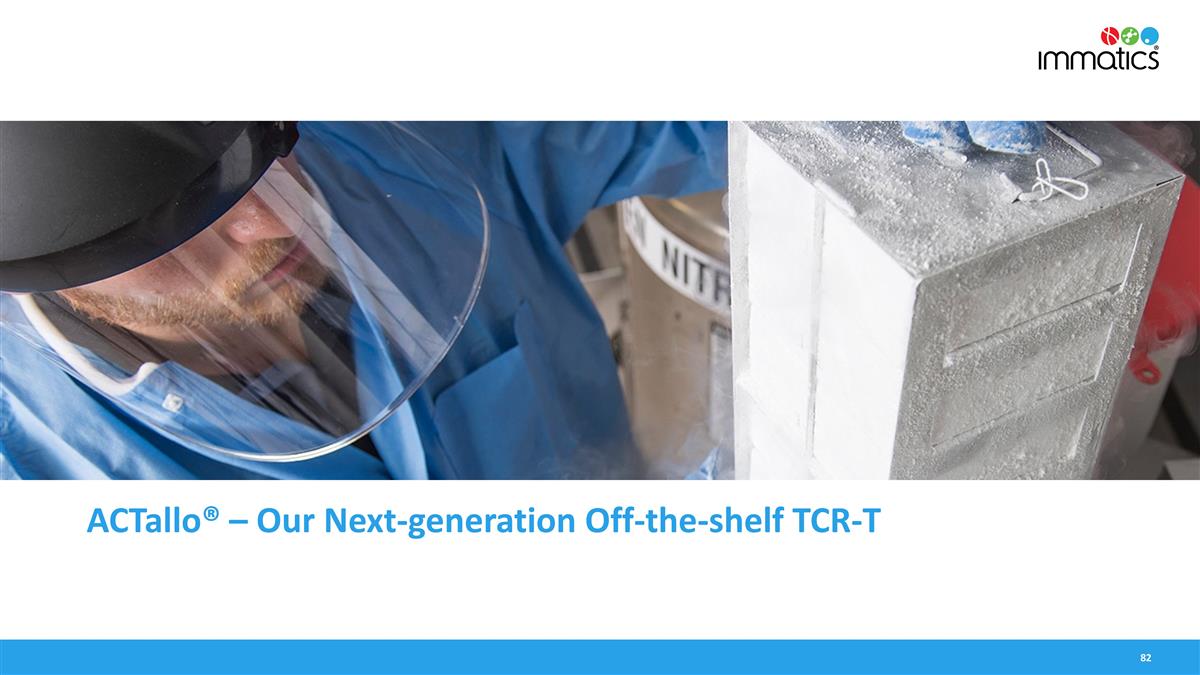
ACTallo® – Our
Next-generation Off-the-shelf TCR-T
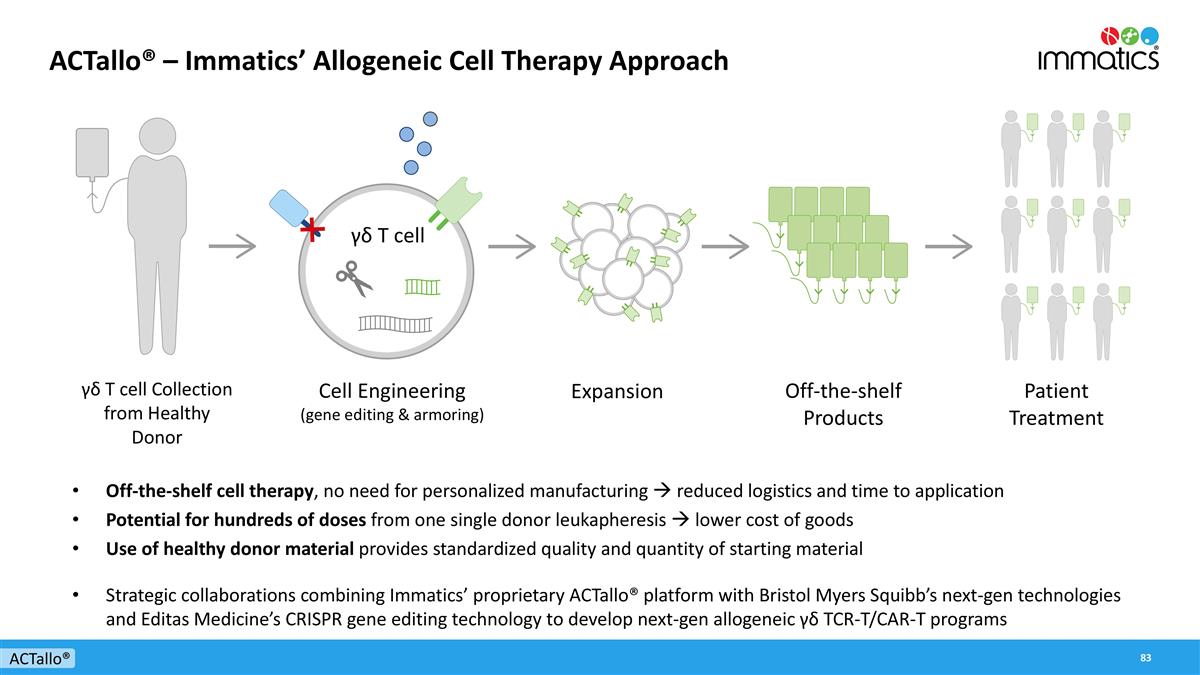
ACTallo® –
Immatics’ Allogeneic Cell Therapy Approach Off-the-shelf cell therapy, no need for personalized manufacturing à reduced logistics and time to application Potential for hundreds of doses from one single donor leukapheresis à lower
cost of goods Use of healthy donor material provides standardized quality and quantity of starting material Strategic collaborations combining Immatics’ proprietary ACTallo® platform with Bristol Myers Squibb’s next-gen technologies
and Editas Medicine’s CRISPR gene editing technology to develop next-gen allogeneic γδ TCR-T/CAR-T programs ACTallo® γδ T cell Cell Engineering (gene editing & armoring) γδ T cell Collection from Healthy
Donor Expansion Off-the-shelf Products Patient Treatment
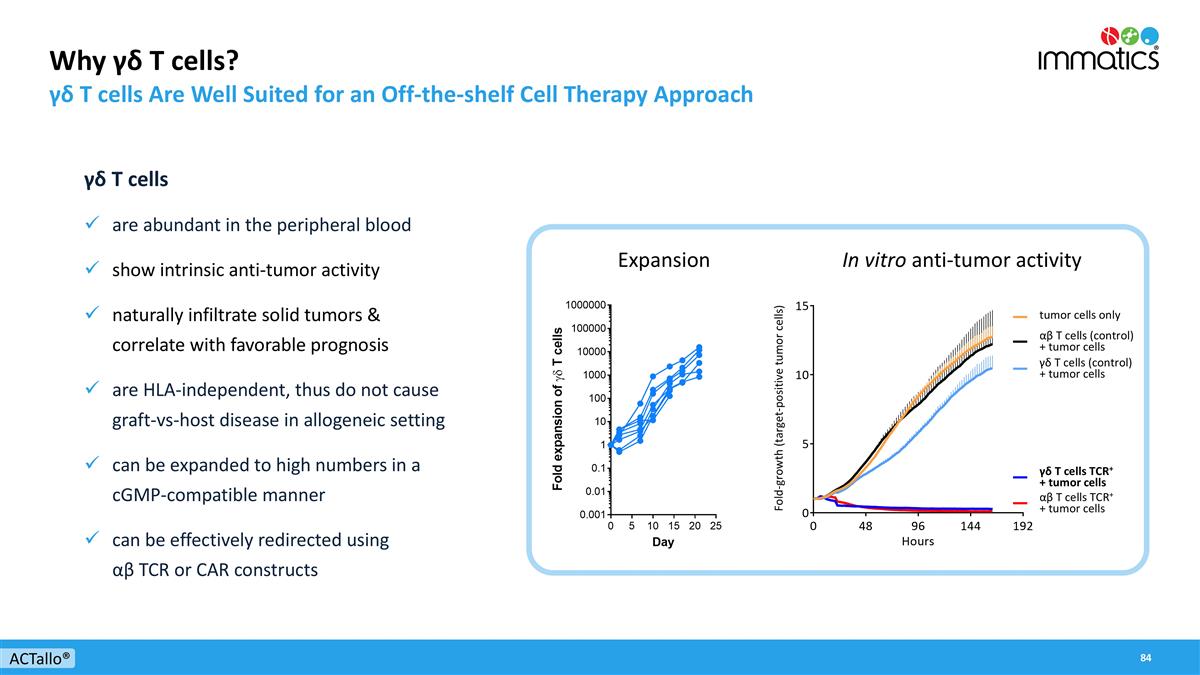
Why γδ T cells?
γδ T cells Are Well Suited for an Off-the-shelf Cell Therapy Approach γδ T cells are abundant in the peripheral blood show intrinsic anti-tumor activity naturally infiltrate solid tumors & correlate with favorable prognosis
are HLA-independent, thus do not cause graft-vs-host disease in allogeneic setting can be expanded to high numbers in a cGMP-compatible manner can be effectively redirected using αβ TCR or CAR constructs In vitro anti-tumor activity
γδ T cells (control) + tumor cells tumor cells only αβ T cells (control) + tumor cells γδ T cells TCR+ + tumor cells αβ T cells TCR+ + tumor cells ACTallo® Expansion Fold-growth (target-positive tumor
cells)

Corporate Information
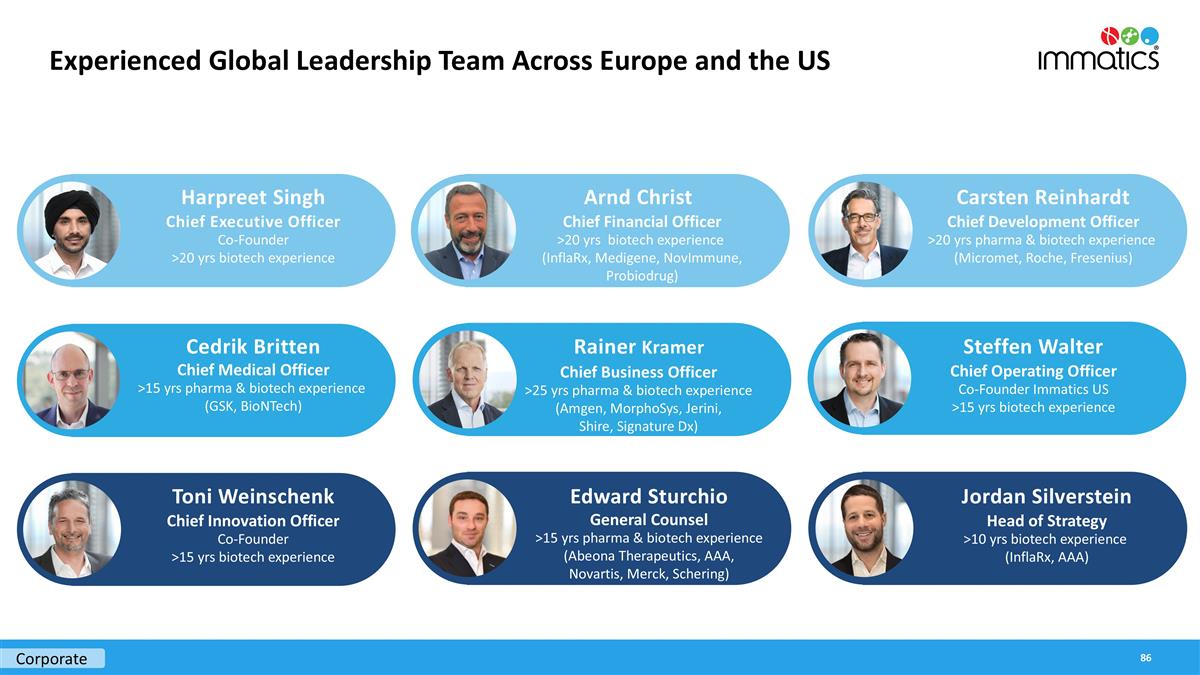
David Leitner Schuldirektor David
Leitner Schuldirektor David Leitner Schuldirektor Harpreet Singh Chief Executive Officer Co-Founder >20 yrs biotech experience Arnd Christ Chief Financial Officer >20 yrs biotech experience (InflaRx, Medigene, NovImmune,
Probiodrug) Carsten Reinhardt Chief Development Officer >20 yrs pharma & biotech experience (Micromet, Roche, Fresenius) Cedrik Britten Chief Medical Officer >15 yrs pharma & biotech experience (GSK, BioNTech) Rainer
Kramer Chief Business Officer >25 yrs pharma & biotech experience (Amgen, MorphoSys, Jerini, Shire, Signature Dx) Steffen Walter Chief Operating Officer Co-Founder Immatics US >15 yrs biotech experience Edward Sturchio General Counsel
>15 yrs pharma & biotech experience (Abeona Therapeutics, AAA, Novartis, Merck, Schering) ) Jordan Silverstein Head of Strategy >10 yrs biotech experience (InflaRx, AAA) Toni Weinschenk Chief Innovation Officer Co-Founder
>15 yrs biotech experience Experienced Global Leadership Team Across Europe and the US Corporate
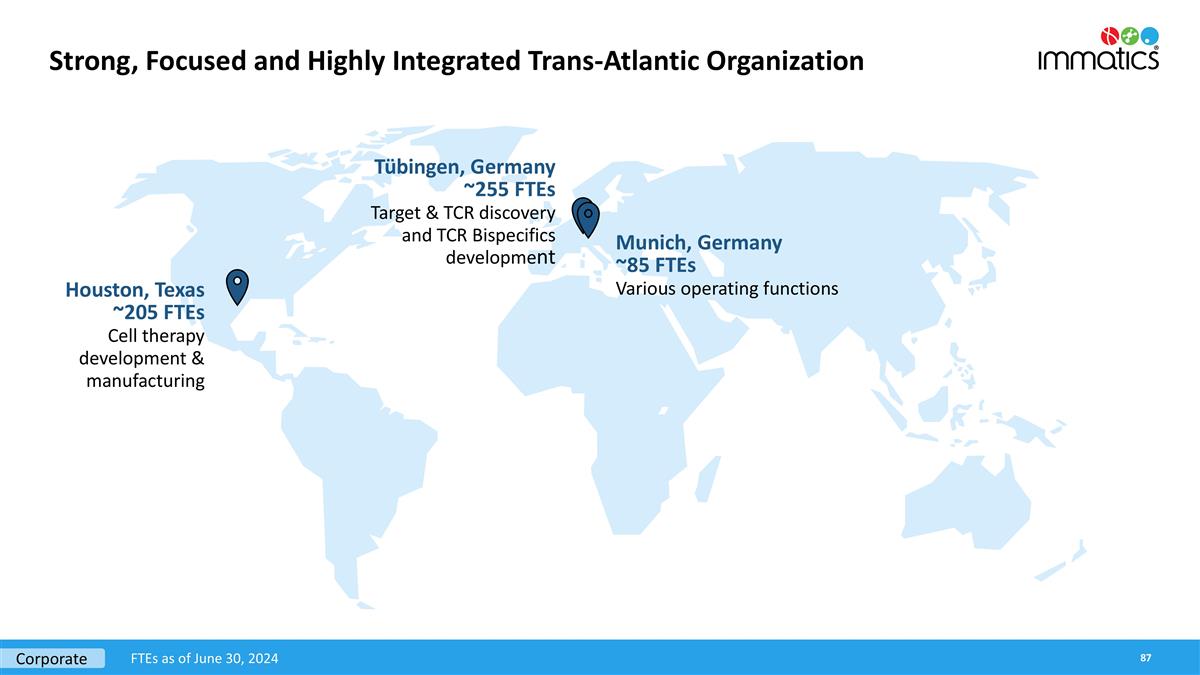
Strong, Focused and Highly
Integrated Trans-Atlantic Organization Houston, Texas ~205 FTEs Cell therapy development & manufacturing Munich, Germany ~85 FTEs Various operating functions Tübingen, Germany ~255 FTEs Target & TCR discovery and TCR Bispecifics
development Corporate FTEs as of June 30, 2024
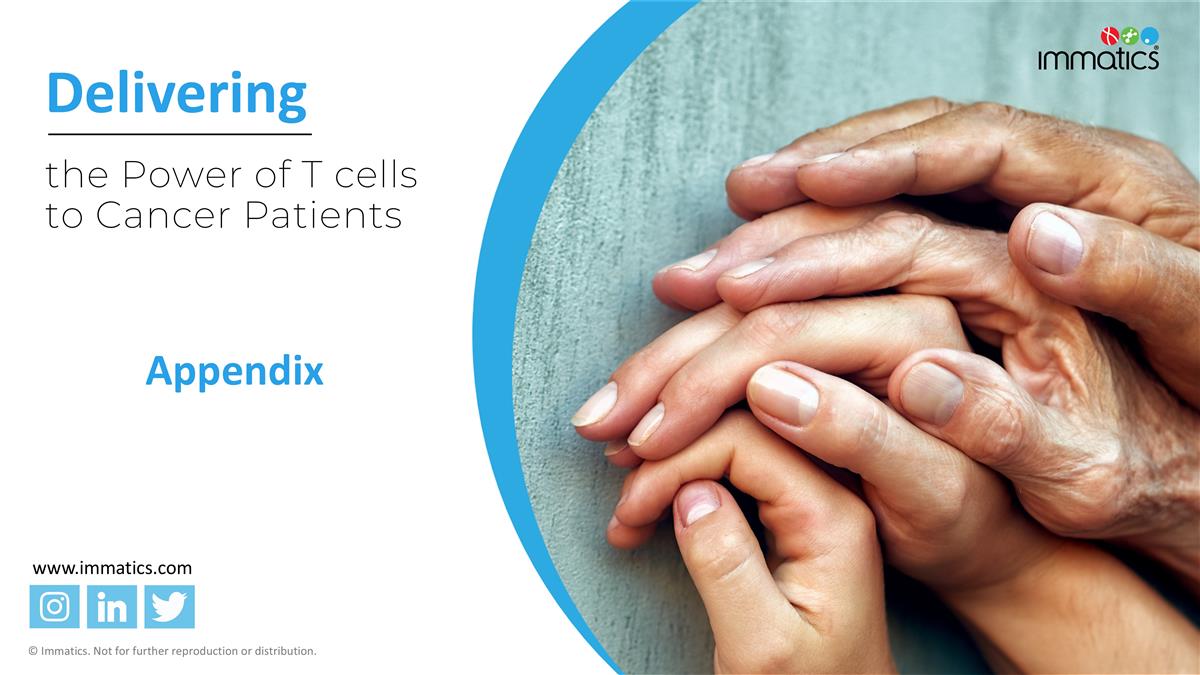
Appendix
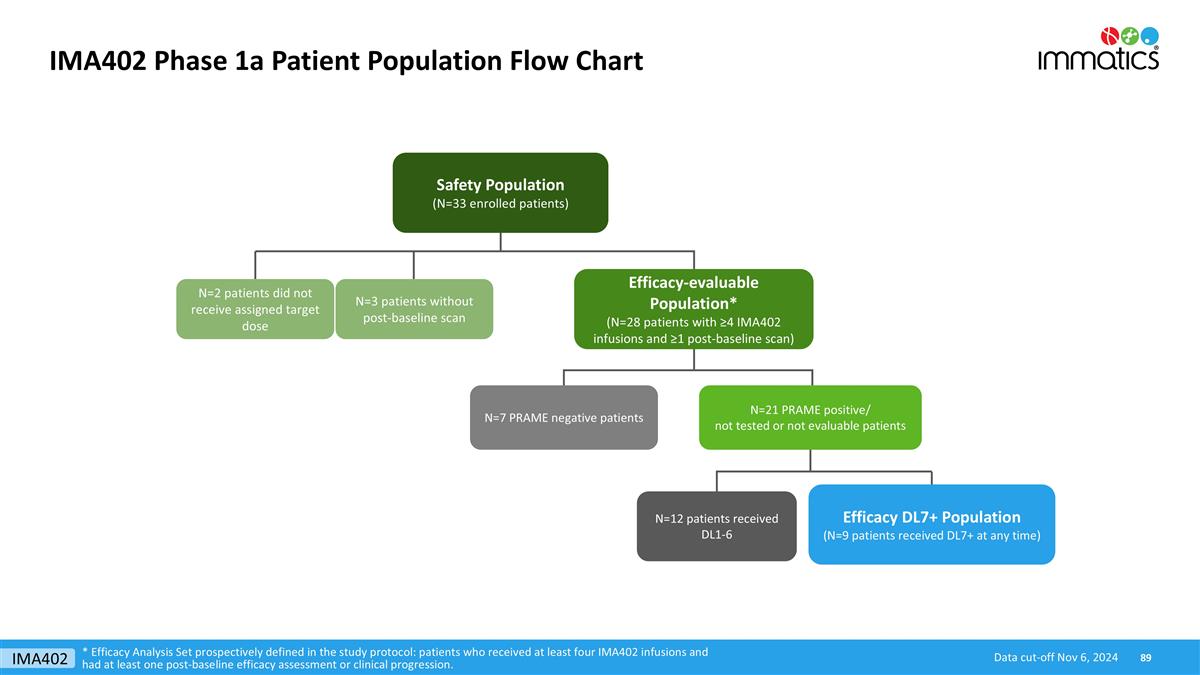
IMA402 Phase 1a Patient Population
Flow Chart Safety Population (N=33 enrolled patients) Efficacy-evaluable Population* (N=28 patients with ≥4 IMA402 infusions and ≥1 post-baseline scan) N=21 PRAME positive/ not tested or not evaluable patients N=2 patients did not
receive assigned target dose N=3 patients without post-baseline scan N=7 PRAME negative patients N=12 patients received DL1-6 Efficacy DL7+ Population (N=9 patients received DL7+ at any time) * Efficacy Analysis Set prospectively defined in the
study protocol: patients who received at least four IMA402 infusions and had at least one post-baseline efficacy assessment or clinical progression. Data cut-off Nov 6, 2024 IMA402
Immatics NV (NASDAQ:IMTXW)
Historical Stock Chart
From Feb 2025 to Mar 2025

Immatics NV (NASDAQ:IMTXW)
Historical Stock Chart
From Mar 2024 to Mar 2025
